

Travel Trailer Ratings: The Best to Worst [2024]
- February 1, 2024
- Travel Trailers
Picture this: you’re cruising down the open road, wind in your hair, and the freedom to explore wherever your heart desires. That’s the beauty of traveling in an RV, and specifically, a travel trailer. But with so many options out there, how do you know which travel trailer is the best fit for you? That’s where we come in. At RV Brands™, we’ve done the research and compiled a comprehensive guide to travel trailer ratings, from the best to the worst. So buckle up and let’s dive in!
Table of Contents
Quick answer, quick tips and facts, background: the evolution of travel trailers, what makes a travel trailer great, 1. airstream, 3. forest river, 4. grand design, 5. oliver travel trailers, the worst travel trailer brands, why you should try before you buy, which travel trailer manufacturer has the best quality, which travel trailers have the least problems, what travel trailer has the best reviews, what rv manufacturer has the most complaints.
- Recommended Links
- Reference Links
When it comes to travel trailer ratings, the best brands in 2024 are Airstream, Jayco, Forest River, Grand Design, and Oliver Travel Trailers. These brands have consistently delivered high-quality, reliable, and innovative travel trailers that cater to a wide range of needs and preferences. Whether you’re a solo traveler, a couple seeking adventure, or a family looking to create lasting memories, these brands have got you covered. So, without further ado, let’s explore what makes these travel trailer brands stand out from the rest.
CHECK PRICE on: Airstream | Jayco | Forest River | Grand Design | Oliver Travel Trailers
Before we dive into the nitty-gritty of travel trailer ratings, here are some quick tips and facts to keep in mind:
- Size Matters : Travel trailers come in various sizes, from compact teardrop trailers to spacious fifth wheels. Consider your towing capacity, storage needs, and living space requirements when choosing the right size for you.
- Budget Wisely : Set a budget and stick to it. Travel trailers can range from affordable to luxurious, so knowing your financial limits will help narrow down your options.
- Research, Research, Research : Read reviews, watch videos, and visit RV shows to get a feel for different travel trailer brands. Don’t be afraid to ask questions and seek advice from experienced RVers.
- Try Before You Buy : Renting a travel trailer before making a purchase is a great way to test the waters and see if the RV lifestyle is right for you. RVezy offers a wide selection of travel trailers for rent, allowing you to experience different brands and models firsthand.
Now that you’re armed with some handy tips, let’s delve into the world of travel trailer ratings and discover the best brands out there.

Travel trailers have come a long way since their humble beginnings. In the early 20th century, adventurous souls began attaching makeshift trailers to their cars, paving the way for the modern travel trailer. These early trailers were basic, with minimal amenities and limited comforts. However, as the popularity of RV travel grew, so did the demand for more luxurious and feature-packed travel trailers.
Today, travel trailers offer a home away from home, complete with all the modern conveniences you could ask for. From fully equipped kitchens and spacious living areas to luxurious bedrooms and state-of-the-art entertainment systems, travel trailers have truly evolved to meet the needs of today’s RV enthusiasts.
When it comes to travel trailer ratings, several factors contribute to a trailer’s greatness. Here are some key features and qualities to look for:
- Quality Construction : A well-built travel trailer is essential for long-lasting durability and reliability. Look for brands that use high-quality materials and employ skilled craftsmanship in their manufacturing process.
- Innovative Design : From space-saving layouts to clever storage solutions, innovative design features can make a big difference in your RVing experience. Look for brands that prioritize functionality and maximize the use of space.
- Comfort and Amenities : A comfortable and well-appointed interior can make your RV adventures feel like a home away from home. Look for features such as comfortable bedding, ample storage, modern appliances, and efficient heating and cooling systems.
- Towing Ease : Towing a travel trailer should be a breeze, even for beginners. Look for brands that offer lightweight and aerodynamic trailers, as well as advanced towing technologies that enhance stability and maneuverability.
- Customer Support : A reputable brand should provide excellent customer support, including warranty coverage, responsive service centers, and readily available replacement parts. Look for brands that prioritize customer satisfaction and have a strong support network.
By considering these factors, you can narrow down your options and find a travel trailer that ticks all the boxes for your needs and preferences.
The Best Travel Trailer Brands
Now, let’s dive into the best travel trailer brands of 2024. These brands have consistently delivered exceptional quality, innovative design, and outstanding customer satisfaction. Each brand offers a unique lineup of travel trailers, catering to different budgets, lifestyles, and preferences. So, without further ado, here are the top travel trailer brands to consider:
When it comes to iconic travel trailers, Airstream takes the crown. Known for their distinctive silver bullet design, Airstream trailers have been turning heads since the 1930s. Airstream’s commitment to quality craftsmanship, timeless design, and attention to detail has earned them a loyal following of RV enthusiasts.
Key Features and Benefits:
- Timeless Design : Airstream’s sleek and aerodynamic design not only turns heads but also enhances fuel efficiency and towing stability.
- Durable Construction : Airstream trailers are built to last, with aluminum shells that resist rust and corrosion.
- Luxurious Interiors : Airstream trailers offer luxurious interiors with high-end finishes, comfortable furnishings, and modern amenities.
- Community and Support : Airstream owners enjoy a strong sense of community and a dedicated support network.
CHECK PRICE on: Airstream
Jayco is a household name in the RV industry, known for its wide range of travel trailers that cater to every budget and lifestyle. With a focus on quality, innovation, and customer satisfaction, Jayco has earned a reputation as one of the top travel trailer brands in the market.
- Wide Range of Options : Jayco offers a diverse lineup of travel trailers, from compact and lightweight models to spacious and luxurious options.
- Family-Friendly Designs : Jayco understands the needs of families, with bunkhouse floor plans and kid-friendly features.
- Industry-Leading Warranty : Jayco’s industry-leading warranty provides peace of mind and reflects their commitment to quality and customer satisfaction.
CHECK PRICE on: Jayco
Forest River is a powerhouse in the RV industry, offering a wide range of travel trailers that cater to every budget and lifestyle. With numerous brands under its umbrella, Forest River provides options for everyone, from entry-level RVers to seasoned adventurers.
- Diverse Brand Portfolio : Forest River’s extensive brand portfolio includes popular names such as Rockwood, Flagstaff, and Salem, offering a wide range of travel trailer options.
- Innovative Features : Forest River is known for its innovative features, such as slide-out rooms, outdoor kitchens, and smart home technology.
- Affordability : Forest River offers travel trailers at various price points, making RVing accessible to a wide range of budgets.
CHECK PRICE on: Forest River
Grand Design is a relatively new player in the RV industry but has quickly made a name for itself with its commitment to quality, innovation, and customer satisfaction. Grand Design travel trailers are known for their spacious and well-designed interiors, luxurious features, and attention to detail.
- Residential Feel : Grand Design travel trailers offer residential-style interiors with high-end finishes, comfortable furnishings, and ample storage.
- Quality Construction : Grand Design is committed to quality, using high-quality materials and rigorous testing to ensure durability and reliability.
- Customer-Focused Design : Grand Design incorporates customer feedback into their designs, resulting in thoughtful layouts and user-friendly features.
CHECK PRICE on: Grand Design
Oliver Travel Trailers may be a lesser-known brand, but they have gained a loyal following for their exceptional quality, attention to detail, and innovative design. Handcrafted in Tennessee, Oliver Travel Trailers are built to withstand the test of time and provide a luxurious and comfortable RVing experience.
- Fiberglass Construction : Oliver Travel Trailers are constructed using fiberglass shells, providing durability, insulation, and resistance to the elements.
- Customizable Interiors : Oliver offers a range of interior options, allowing you to personalize your travel trailer to suit your style and preferences.
- Off-Grid Capabilities : Oliver Travel Trailers are designed for off-grid adventures, with solar power options, composting toilets, and efficient energy systems.
CHECK PRICE on: Oliver Travel Trailers
While we’ve covered the best travel trailer brands, it’s important to acknowledge that not all brands are created equal. Some brands may fall short in terms of quality, customer satisfaction, or innovation. However, it’s essential to remember that what may be a “worst” brand for one person may still be a great option for another. Personal preferences, budget constraints, and individual experiences can all influence perceptions of a brand. Therefore, we encourage you to do thorough research, read reviews, and consider your own needs and preferences when making a decision.
Purchasing a travel trailer is a significant investment, both financially and in terms of your RVing lifestyle. That’s why we highly recommend trying before you buy. Renting a travel trailer allows you to experience different brands and models firsthand, giving you a better understanding of what works for you and what doesn’t. RVezy offers a wide selection of travel trailers for rent, making it easy to test the best brands before making a purchase.

When it comes to quality, Airstream is often regarded as one of the top travel trailer manufacturers. Their commitment to craftsmanship, attention to detail, and use of high-quality materials sets them apart from the competition.
Read more about “What Are the Worst RV Brands in 2024?”
While no travel trailer is entirely problem-free, brands like Airstream, Jayco, and Grand Design have a reputation for producing travel trailers with fewer issues. However, it’s important to note that regular maintenance and proper care are crucial in minimizing problems and ensuring the longevity of your travel trailer.
Read more about “What RV Manufacturer Has the Most Complaints? …”
Oliver Travel Trailers consistently receive rave reviews from owners and industry experts alike. Their attention to detail, quality construction, and luxurious features have earned them a loyal following of satisfied customers.
It’s challenging to pinpoint a single RV manufacturer with the most complaints, as experiences can vary greatly from person to person. However, it’s always a good idea to research customer reviews, seek recommendations, and consider the overall reputation of a brand before making a purchase.
Read more about “What RV Manufacturer Has the Most Complaints?”
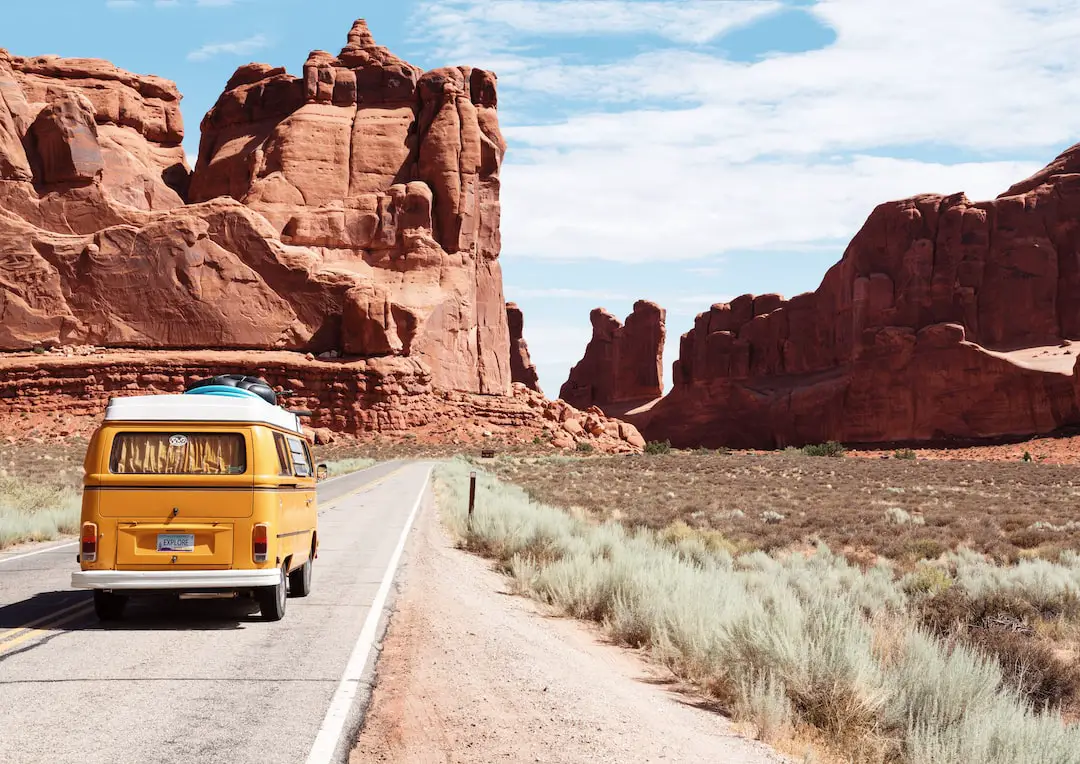
When it comes to travel trailer ratings, the best brands in 2024 are Airstream, Jayco, Forest River, Grand Design, and Oliver Travel Trailers. These brands have consistently delivered exceptional quality, innovative design, and outstanding customer satisfaction. Whether you’re a solo traveler, a couple seeking adventure, or a family looking to create lasting memories, these brands have got you covered. So, choose the travel trailer that suits your needs, hit the road, and embark on unforgettable RVing adventures.
Recommended Links:
- Full-Time RVing
- Fifth Wheel RVs
- What is a Good RV Brand?
Reference Links:
- Best RV Brands in 2023 [Ultimate Guide By RV Type] – RVezy
- Airstream Official Website
- Jayco Official Website
- Forest River Official Website
- Grand Design Official Website
- Oliver Travel Trailers Official Website
Now that you have the inside scoop on the best travel trailer brands, it’s time to hit the road and start making memories. Happy RVing!
Leave a Reply Cancel Reply
Your email address will not be published. Required fields are marked *
Add Comment *
Save my name, email, and website in this browser for the next time I comment.
Post Comment
This site uses Akismet to reduce spam. Learn how your comment data is processed .
Trending now
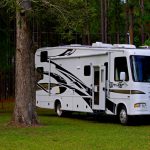
Ad-free. Influence-free. Powered by consumers.
The payment for your account couldn't be processed or you've canceled your account with us.
We don’t recognize that sign in. Your username maybe be your email address. Passwords are 6-20 characters with at least one number and letter.
We still don’t recognize that sign in. Retrieve your username. Reset your password.
Forgot your username or password ?
Don’t have an account?
- Account Settings
- My Benefits
- My Products
- Donate Donate
Save products you love, products you own and much more!
Other Membership Benefits:
Suggested Searches
- Become a Member
Car Ratings & Reviews
2024 Top Picks
Car Buying & Pricing
Which Car Brands Make the Best Vehicles?
Tires, Maintenance & Repair
Car Reliability Guide
Key Topics & News
Listen to the Talking Cars Podcast
Home & Garden
Bed & Bath
Top Picks From CR
Best Mattresses
Lawn & Garden
TOP PICKS FROM CR
Best Lawn Mowers and Tractors
Home Improvement
Home Improvement Essential
Best Wood Stains
Home Safety & Security
HOME SAFETY
Best DIY Home Security Systems
REPAIR OR REPLACE?
What to Do With a Broken Appliance
Small Appliances
Best Small Kitchen Appliances
Laundry & Cleaning
Best Washing Machines
Heating, Cooling & Air
Most Reliable Central Air-Conditioning Systems
Electronics
Home Entertainment
FIND YOUR NEW TV
Home Office
Cheapest Printers for Ink Costs
Smartphones & Wearables
BEST SMARTPHONES
Find the Right Phone for You
Digital Security & Privacy
MEMBER BENEFIT
CR Security Planner
Take Action
Beginner's Guide to RV Trailers
How to choose the right model for you
Traveling by RV is a resurging trend amid the coronavirus pandemic, with families seeking an escape while maintaining social distancing. A motorhome or travel trailer allows you to see the country without the need to use public lodging, restaurants, or even restrooms.
“We are noticing increased interest in the lifestyle both virtually through online resources and resuming interest in states where dealerships are open when compared to when the pandemic began,” says Sam Jefson, a spokesman for Winnebago Industries, maker of Winnebago and Grand Design motorhomes and travel trailers.
Trailers are the least expensive way to get into the recreational vehicle (RV) lifestyle. That’s because owners often need nothing more than the family SUV or truck to haul them. They’re much cheaper and simpler to get started with than a motorhome , and they come in a wide range of designs, sizes, and prices.
Because a trailer can be removed, the SUV or truck that hauls it can be used year-round rather than serving solely as a vacation coach, as is the case with an all-in-one RV. Plus, the vehicle towing the trailer is likely to have modern safety features that are just now arriving in some RVs, including forward collision warning , automatic emergency braking , blind spot warning , and robust crash protection. Tow vehicles also provide the ability to safely travel with kids and their car seats , an option that's often not available in motorhomes.
Trailers also offer a lot of flexibility when you’re on a campground. You can unhitch the trailer, leave it behind, and use the tow vehicle to explore. This means you don’t have to pack things away inside the camper and disconnect all the power and water lines each time you want to leave the park, like you have to do when traveling in a motorhome. And a tow vehicle will be a lot easier to handle when sightseeing, especially when navigating downtown roads, parking, and getting food at a drive-thru.
Still, there’s a compromise for that flexibility. Towing an RV trailer requires drivers to develop new skills that are very different from those needed to drive a car. A lot of space is needed to park a long tow vehicle and trailer combination. Learning how to reverse the trailer takes patience and practice. You also need to learn how to safely hitch and unhitch the trailer. Of course, you need to own a vehicle that's capable of safely towing the trailer you have in mind.
Approach this aspect with care, as it's very easy to buy more trailer than a vehicle can comfortably handle. (Learn more about what you need to know before you use your pickup to tow .) There are several types of recreational trailers to consider, outlined below.
Safe Practices for Traveling Now
The RV lifestyle has social distancing built in, but there are times when you'll be around other people.
"RVing and boating are great ways for families to get back out and enjoy the enrichment that comes with active outdoor lifestyle activities,” Jefson says. But he adds that campers should follow guidelines from federal and state governments and the Centers for Disease Control and Prevention in determining when and how to use an RV.
Traveling in an RV always involves certain logistics, such as scheduled maintenance, park reservations, route planning, and stocking up on provisions. But during this pandemic, you may need to be more methodical and self-sufficient.
Darryl Saunders, a traveler who pulls a 27-foot Airstream Globetrotter, shared several tips with Consumer Reports from his recent experiences on the road:
- Plan your stops. Park closures, restrictions, and crowding are all factors now.
- Double-check your reservations to make sure they are still valid.
- If you're traveling to a destination for a certain attraction, make sure it's open. Saunders mentioned that a place he wanted to see (Sequoia National Park) was closed.
- Plan ahead for food. Many businesses are now reopening, but there are still restrictions. And remember that you won't be able to go through a drive-thru with a large trailer.
Many travelers recommend checking with RV parks about their amenities because some, including restrooms, laundry facilities, and on-site convenience stores, may be closed. Ask about specific rules regarding social distancing, which can have an on impact on pool usage, playgrounds, and campfires.
Restrictions vary by region, and they'll certainly change throughout the year. They may include the need to self-quarantine after traveling in certain states. Check the restrictions for your state and those you plan to travel through, because they could have a significant impact on your plans.
Folding or Pop-Up Trailers
Jeep / Scott Lane Jeep / Scott Lane
Sitting only about 4 feet high when towed, pop-up trailers can be raised by hand crank or electrically at a campsite. Most have tentlike sides and extensions that pull out of either end. Some brands, such as Aliner and TrailManor , have hard sides, providing more durability and insulation.
Length: 8 to 20 feet Weight: 1,000 to 4,000 pounds Sleeps: Two to eight people Price: $10,000 to $30,000
- Least expensive type of trailer.
- Can be very lightweight; the smallest ones can be towed by many cars.
- Low aerodynamic profile helps fuel economy.
- Pull-out end extensions, which typically house beds, create large sleeping spaces for what is a relatively short trailer.
- Some hard-sided models can be put up very quickly.
- These often lack the luxuries of larger trailers, such as a private toilet (or any bathroom facility at all).
- There isn’t much insulation from noise or cold.
- Tent-sided models need more maintenance, and the fabric requires replacement eventually.
- Tent-sided models are prohibited in some campgrounds because of the danger posed by bears.
Travel Trailers
Winnebego / www.joehendricks.com Winnebego / www.joehendricks.com
Travel trailers are the most widely sold and most varied type of towable RV. They have solid walls and often feature a slide—a section of wall that either pulls out or motors out to provide more space inside when camping.
Travel trailers come in a wide variety of sizes and designs:
- Small retro-inspired “teardrop” trailers that are essentially a tent and bed on wheels.
- Small molded fiberglass trailers, such as the Casita and Scamp, have drawn passionate fan bases for their low-maintenance designs.
- Midpriced trailers from companies such as Forest River, Gulf Stream, and Jayco offer a lot of space and features for the money.
- The iconic Airstream has a distinctive aluminum body. Aerodynamic and low to the ground, these are easy to tow but are expensive for their size.
Smaller trailers typically have a single axle; larger trailers can have two (or even three). More axles increase towing stability and let you limp the trailer to safety in case of a single flat tire, but they can also add to tire replacement costs.
Many small trailers can be pulled by a midsized SUV. As trailers increase in size and weight, it is necessary to increase the capability of the tow vehicle. Make sure you pay attention to the key weights: the tongue’s and total trailer’s.
The tongue extends from the trailer and puts direct downward pressure on the hitch, so it’s essentially considered a payload. Then there is the weight of the entire trailer, which is how much the vehicle has to pull. Some vehicles may look appropriate until you factor in the added weight of passengers and cargo, including water in the tanks.
Many SUVs and trucks can be equipped with transmission coolers to ease the strain of a trailer on the drivetrain. Consider adding anti-sway bars or a load-leveling kit for a travel trailer, even a smaller one.
Consumer Reports / jb Consumer Reports / jb
Length: 8 to 40 feet Weight: 1,000 to 10,000 pounds Sleeps: Two to eight people Price: $10,000 to $150,000
- Rigid walls provide some insulation from cold and noise compared with a pop-up trailer or tent.
- Very little setup time.
- A wide variety of lengths and weights.
- A suitable tow vehicle is required, which may need to be larger and more powerful than you think.
- Towing requires drivers to learn (and practice) different driving skills.
- Larger trailers won’t fit into small campsites.
Hybrid or Expandable Trailers
Hybrid or expandable RV trailers increase sleeping space without the downsides—the added length and weight—that come with getting a bigger trailer. They do that by combining the hard-sided body of a conventional travel trailer with the pullout end extensions typically found on a folding trailer. This design can let you use a smaller tow vehicle while still providing enough sleeping space and amenities for the whole family.
Length: 8 to 26 feet Weight: 2,500 to 5,500 pounds Sleeps: Four to eight people Price: $10,000 to $40,000
- Extra sleeping space without added length and weight.
- Takes more setup time than a typical travel trailer.
- Tent-sided material needs to be maintained, and the fabric may need replacing eventually.
- Doesn’t do as good a job at blocking sound in noisy campgrounds as fully hard-sided trailers do.
Fifth-Wheel Trailers
AJ Mueller AJ Mueller
Fifth-wheel trailers are designed to be towed by pickup trucks. The front of this type of trailer extends over a pickup bed that has a hitch that sits beneath the forward quarters. The trailer slides into place in the pickup truck bed.
Fifth-wheel trailers are generally large and heavy, requiring at least a half-ton truck equipped by the factory to handle a heavy payload. A handful of manufacturers make smaller fifth-wheels that can be easily towed by smaller trucks, such as Escape fiberglass trailers. It's common to use a heavy-duty truck to tow a fifth-wheel. If you're shopping for a trailer and a tow vehicle, consider a pickup truck with dual rear wheels (often referred to as a “dually”) to pull the largest trailers for better stability and payload capacity. Look at the specific capabilities on the truck you own or plan to buy, because truck cargo and towing capacities can vary widely depending on the engine, the cab configuration, and transmission gearing.
Winnebego Winnebego
Length: 20 to 40 feet Weight: Typically 7,000 pounds and up, excluding a few small models Sleeps: Four to eight people Price: $20,000 to $150,000
- Provide more living space for their towing length.
- Fifth-wheel hitches tend to be very stable for towing.
- Typically has a dedicated bedroom in front.
- Often needs a heavy-duty truck.
- Tall height might not fit under some bridges.
- The truck bed’s use will be limited when you’re towing.
- Not many truly small fifth-wheel trailers are available; “lightweight” ones typically weigh at least 7,000 pounds.
Toy Haulers or 'Sport-Utility Trailers'
Toy haulers or “sport-utility trailers” can come in any travel trailer type. They usually have an enclosed garage in back, designed for carrying motorcycles, ATVs, or other outdoor playthings. A ramp is built in off the back of the trailer, letting you drive these toys out. The ramp itself can often be used as a porch once the toy is unloaded.
Length: 18 to 40 feet Weight: 3,000 to 10,000 pounds Sleeps: Four to eight people Price: $10,000 to $150,000
- Lots of storage space.
- Provides garage space to keep things dry or store tools.
- Garage can be used for additional sleeping space or a room to hang out in.
- Unique porch functionality.
- Shrinks available living space.
- Putting heavy ATVs or motorcycles at the rear can hurt trailer balance and handling.
Truck Campers
Truck campers slide into the back of a pickup truck’s bed—no towing needed. Often they stick out over the top of the truck’s cab to increase living space. Lightweight “expedition style” models usually have tentlike fabric sides that pop up to add headroom.
The key for truck-camper owners is having enough payload capacity. Some pop-top lightweight models fit into smaller trucks, but the typical hard-sided truck camper is too heavy for a half-ton truck, unless that truck is carefully optioned to maximize payload. Most owners tend to use heavy-duty trucks.
Length: 6 to 12 feet Weight: 1,000 to 3,000 pounds Sleeps: Two to four people Price: $15,000 to $50,000
- Compact and easy to drive; not much bigger than the truck itself.
- Allows for off-roading adventures.
- Some specialty models fit in midsized trucks, such as the Toyota Tacoma.
- Not much living space.
- It can be a high climb to get in.
- Typical hard-sided truck campers require a heavy-duty truck.
- It can be a hassle to install and remove from truck.
- Often expensive for their size.
Bottom Line
No matter which recreational trailer or RV you buy, take time making your decision. A common adage is to “buy your third trailer first” because many people who stick with this hobby go through two or three RVs before they find the right fit. In other words, pace yourself and do your research.
You can accelerate that process (and maybe save grief and money) by renting an RV before you buy. That will help you sort out which kind of floor plan and features are important for your type of camping and your family.
Shopping for a Pickup Truck?
See our pickup truck buying guide and ratings.
What to Know About Towing
There are so many vehicles to satisfy your inner adventurer. On the " Consumer 101 " TV show, Consumer Reports expert Mike Monticello explains to host Jack Rico what to know about getting these beauties from point A to point B.
Sharing is Nice
We respect your privacy . All email addresses you provide will be used just for sending this story.
Trending in Other motor vehicles
Beginner's Guide to Motorhomes
- Call (909) 428-6775
- 14620 Rancho Vista Drive Fontana, CA 92335

Motorhome vs Travel Trailer: The Complete Comparison Guide for RV Owners
The winding mountain passes, and endless horizons call to you. Another sweeping vista leaves you awestruck. A steep trail tempts your sense of adventure. The freedom of the open road continues to beckon – but is your current RV holding you back?
As a travel trailer owner, do you sometimes feel limited by towing capacity, storage space, or lack of amenities? Naturally, no RV is perfect. But perhaps your needs have evolved over time and outgrown the trailer you once adored.
Upgrading to a motorhome opens up an exciting new world of possibilities. There’s no shame in seeking more from your RVing lifestyle.
This guide will help you weigh the pros and cons of sticking with a trailer versus leveling up to a motorhome. We’ll explore key differences, benefits, costs, and important factors to consider. Let’s hit the road!
Motorhomes Vs. Trailers: Key Differences to Understand
Before comparing the pros and cons, it’s essential to understand what distinguishes these two recreational vehicle types. Clarity on the core features and purposes of each will provide the knowledge needed to make an informed decision. After all, a motorhome and a trailer are two entirely different animals. You wouldn’t want to compare apples to oranges, would you?
What Exactly is a Motorhome?
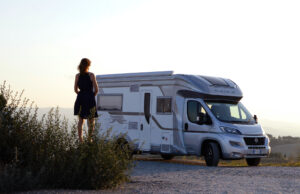
Motorhomes combine transportation and habitation into one self-contained vehicle. An integrated engine allows you to effortlessly drive your home on wheels wherever impulse takes you. There is no need for a tow vehicle or unhitching.
Motorhomes typically fall into three main classes:
Class A – The largest type, constructed on a heavy-duty bus chassis. Class A motorhomes feature spacious, luxury accommodations.
Class B – Also called camper vans. These nimble RVs have converted vans with raised roofs to allow standing. Tighter quarters but excellent maneuverability.
Class C – Built on a truck chassis with an attached cabover sleeping space. A happy medium offering good space and easier handling.
In addition to the living area, motorhomes contain a fully equipped kitchen, bathroom, bedrooms, seating, and entertainment space. The all-in-one convenience provides freedom and flexibility unmatched by any other RV type.
Note that almost any larger vehicle can be converted into a motorhome , so there are plenty of options.
How Do Travel Trailers Differ?

Travel trailers offer a towable alternative to motorhomes. Lightweight construction and compact floor plans improve fuel efficiency when hitched to an SUV or pickup truck. Without a built-in engine, trailers must rely on your tow vehicle to reach their destinations.
However, no mechanical components means trailers provide a smaller, more affordable option. While motorhomes aim to inhabit the journey itself, travel trailers prioritize comfortability once parked at your vacation spot. Two different RVing styles and goals.
Still, travel trailers offer all your basic amenities. You’ll find sleeping quarters, kitchenettes, seating dinettes, and some basic amenities. Bathrooms may be compact wet baths. Storage space is more limited. But the focused purpose results in budget-friendly prices for RVing.
Comparing Interior Layouts
An important difference to consider is how the living space is configured in each type of RV. As you evaluate upgrades, pay attention to standard floorplan options and decide what works best for your needs. However, you can always build a custom floor plan that meets your needs.
Motorhome Floor Plan Considerations
Class A motorhomes offer the most spacious floorplans, some over 40 feet long. Multiple slide-outs and separated rooms provide a true residential feel. Choose from master suites, walk-in closets, full bathrooms with showers, and residential appliances.
Class B camper vans sacrifice square footage for maneuverability. Floorplans creatively convert seating to beds and integrate space-saving bathrooms. The intimate layouts limit occupancy to 2-4 people.

Class C motorhomes balance livability and convenience. Floor Plans include cabover beds, sleeping areas, kitchens, and convertible dinettes. Bathrooms are compact. Overall, it is a happy medium suitable for families.
Travel Trailer Floorplans
Travel trailers range tremendously in size from small 10-foot trailers to expansive fifth-wheel suites. Bunkhouse models work well for families with kids, while couples may opt for just a master bedroom.
Kitchenettes include a fridge, stove, and sink with dinette seating nearby. Wet baths, which combine shower and toilet into one, are most common, but some floor plans have separate baths. The iconic Teardrop trailers (referring to their shape) allocate interior space efficiently with compact kitchens in the back and sleeping areas in front.
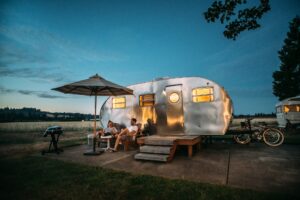
Consider your needs and research different trailer floorplans. Whether you desire two beds or 4, a trailer offers options on a budget; you should choose the layout that best suits your needs.
The Benefits of a Motorhome
It’s only natural to feel hesitant about change. Your trusted trailer still holds wonderful memories. But reminiscing about the “good old days” can prevent us from moving forward. Weigh the motorhome benefits below to see if your needs could be better fulfilled:
More Possibilities for Spontaneous Travel
Many RVers crave more freedom but feel limited by towing capacity or the need to reserve campsites. That’s where our first advantage point for motorhomes comes in. Owners can stop on a whim when something catches their eye. No need to unhitch or even find a designated area. Just pull over and relax like you would in any other vehicle.

Traveling in a motorhome means your home’s facilities are always onboard. Hungry? Whip up a snack without unhitching the trailer. Tired? Pull into a rest stop and nap in the bedroom. Need a bathroom? Use your own anytime. Play cards or watch a movie together while on the road. It simplifies travel tremendously.
With a motorhome, you have the flexibility to chase adventure wherever the open road leads. No strings attached. Just drive to create your own journey.
Liberation from the Hassles of Towing
Ask many RVers, and they’ll tell you a properly weighted motorhome drives much more easily than towing a trailer. That’s because motorhomes drive more like a car, while towing requires a different set of skills (Ever see a semi-truck driver reverse?). Making tight turns, changing lanes, and backing into sites are all simpler without a hitch pivot point.
You can also breathe easy without sway concerns that accompany trailers, especially at higher speeds or in windy conditions. And you don’t need to slowly creep along highways while other traffic zips past. Motorhomes make comfortable cruising speeds attainable again. Just load up and drive safely to your destination.
No more stressful white-knuckle driving or damage risks from exceeding your tow capacity. Just you, the horizon, and the welcoming road ahead.
Opportunity to Explore More Boondocking Locations
Do you enjoy getting off the grid but find trailer limitations restrict your options? It’s true; when you want to stop somewhere with a trailer, you must consider clearance to unhitch and a trailer-friendly parking space.

A motorhome’s exceptional maneuverability allows you to wind through remote areas inaccessible before. Narrow forest service roads. Secluded beaches. Quaint towns with tricky parking. Wherever your heart desires! No more avoiding picturesque areas due to trailer length restrictions or backing challenges.
With sufficient ground clearance, you can camp at unimproved sites lacking hookups. Your motorhome contains everything needed for comfortable off-grid stays. It makes it easy to wander freely and boondock to reconnect with nature.
Avoid the Burden of Towing a Second Vehicle
We all know how much of a nuisance it is to tow a vehicle along with a trailer. Repeatedly hitching, unhitching, and reparking the car wastes valuable playtime. Plus, it adds potential for accidents or damage.
With a motorhome, simplify travels down to one powered vehicle. No need to haul extra weight and complications. Plus, adding a second vehicle might mean buying a new one outright if you don’t already own one.
More Comfort for Passengers and Pets
For family travelers, children, and elderly passengers stay safer and more comfortable in motorhome seats than constantly belted into a tow vehicle. Pets also benefit from room to move about instead of getting frequently crated.
A motorhome allows everyone to stretch out and relax. Play games together at the dinette. Take a nap on the sofa. Grab water from the fridge. Use the bathroom anytime. Your home’s amenities and comforts are always within reach on the road.
Motorhome Perks for Different RVing Lifestyles
The next step in our motorhome vs. trailer debate involves considering your lifestyle. Not everyone requires the same features from their recreational vehicle. Maybe you only plan to camp once yearly at your favorite spot. Or maybe you want to travel full-time and never look back.
After reflecting on your travel priorities, you may find a motorhome better fulfills the following:
Full-Time RV Living
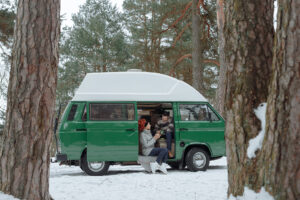
A motorhome provides residential space and storage capacity for full-time occupancy. Slide-outs create expansive living areas, and larger models boast separate bedrooms and multiple bathrooms.
Enjoy home amenities like laundry, entertainment centers, and plenty of kitchen space. Set up your motorhome homestead anywhere for months on end and live comfortably without the need for hotels or reservations.
Extended Travel
Speaking of which, wandering for weeks across the country is simpler when you don’t need lodging each night. Skip the hefty hotel fees, lengthy research, and troublesome reservations. Just drive to a new location whenever desired with your comfortable home rolling right along with you!
No more packing, hauling luggage, or constantly breaking down camp either. Wake up, brew some coffee, and hit the road rejuvenated. A motorhome allows you to focus on people, not logistics, during extended stays anywhere.
Frequent Weekend Getaways
With a motorhome, last-minute trips are a breeze! You won’t need to constantly spend time hitching up or packing prep. Simply toss in some clothes and food and immediately zip off. Spontaneity is the best spice for mini vacations!
Even quick day trips become more feasible without repeatedly hooking up your trailer to come and go. The convenience removes obstacles to getting away more often.
Important Things to Consider Before Upgrading
Now that you’re well-informed let’s close out with a few things you can write down or ponder as you plan a motorhome upgrade. While the benefits sound enticing, change also warrants pragmatic consideration.
Upfront Costs and Ongoing Expenses
There’s no skirting around the fact motorhomes require a hefty upfront investment. Look realistically at new and used pricing in your desired class.
While motorhomes simplify travel logistics, the upgrade also impacts your finances long-term. Weigh the costs and value for your individual situation. Will splurging now on convenience limit future funds for adventures? Or does it offer benefits that align with your savings? Here are some costs to consider:
Upfront Costs – Motorhomes have higher base prices . But, travel trailers still require an adequate tow vehicle. Consider total costs when starting from scratch.
Fuel Efficiency – Low mileage for motorhomes. But trailers reduce capacity and gas mileage for your tow rig. Fuel costs depend on the total miles driven.
Insurance – Motorhomes cost more to insure than trailers. Yet, you need policies for both trailer and tow vehicles, so determine total insurance costs.
Maintenance – More mechanical systems mean pricier motorhome maintenance. Repairs for truck vs SUV tow vehicles vary greatly, so assess your total maintenance obligations. Make sure to find an expert RV maintenance service in your area!
Camping Costs – Both allow boondocking to reduce site fees. But more amenities and higher capacity in a motorhome may encourage pricier camping.
Make a thorough cost comparison when budgeting for an upgrade. While motorhomes require greater upfront investment, benefits like simplified travel logistics can pay off long-term.
Finding the Ideal Floorplan
Once you select a motorhome class, take plenty of time to carefully assess different floorplans. Weigh your needs versus wants. Ask yourself:
- How many slide-outs are necessary?
- Do you require separate bedroom suites?
- What about laundry facilities?
- How much living and storage space is truly needed?
- What is the quality of construction materials and workmanship?
Comparison shop until your perfect new or used motorhome is found. Never settle out of impatience – this is your home! Wait for the right fit.
Where Will You Park and Store It?
Measure your garage, driveway, or storage space beforehand to ensure adequate room. If storing for months, evaluate winterizing logistics and security requirements. Storage facilities can usually accommodate motorhomes but always measure.
If downsizing due to limited space, consider a nimbler Class B camper van. While your new home is on wheels, practical factors like where to keep it still apply. Make sure parking and storage needs align.
Get Comfortable Handling a Larger Vehicle
Finally, test driving is a must before upgrading! Seek professional training on properly maneuvering and reversing your anticipated motorhome class. Take your time getting comfortable behind the wheel.
Consider starting with a compact Class C if you’re accustomed to a trailer. Ease into the transition before attempting a 40-foot Class A bus. Patience and practice are key. Soon, that initial fear will become confidence.
Let the Adventures Begin!
If your needs align better with a motorhome’s convenience after weighing options, then start getting excited! You are officially ready to trade limitations for liberation. There are countless floor plans and features to explore when you upgrade.
At Leisure Coachworks, we specialize in motorhome upgrades and remodeling. Our experienced team helps owners transform ordinary recreational vehicles into the motorhome of their dreams. From minor renovations to complete custom luxury conversions, we handle upgrades both big and small.
Contact us today for more information!

Compare the differences, benefits, and factors to consider when weighing upgrading from a travel...
Leave a Reply Cancel reply
Your email address will not be published. Required fields are marked *
Save my name, email, and website in this browser for the next time I comment.
- Website Disclaimer
- Terms of Use
- Cookie Policy
- Privacy Policy

This post may contain affiliate links or mention our own products, please check out our disclosure policy
10 Best Lightweight Travel Trailers Of 2022
- Bruce Smith
- January 29, 2022
Table of Contents
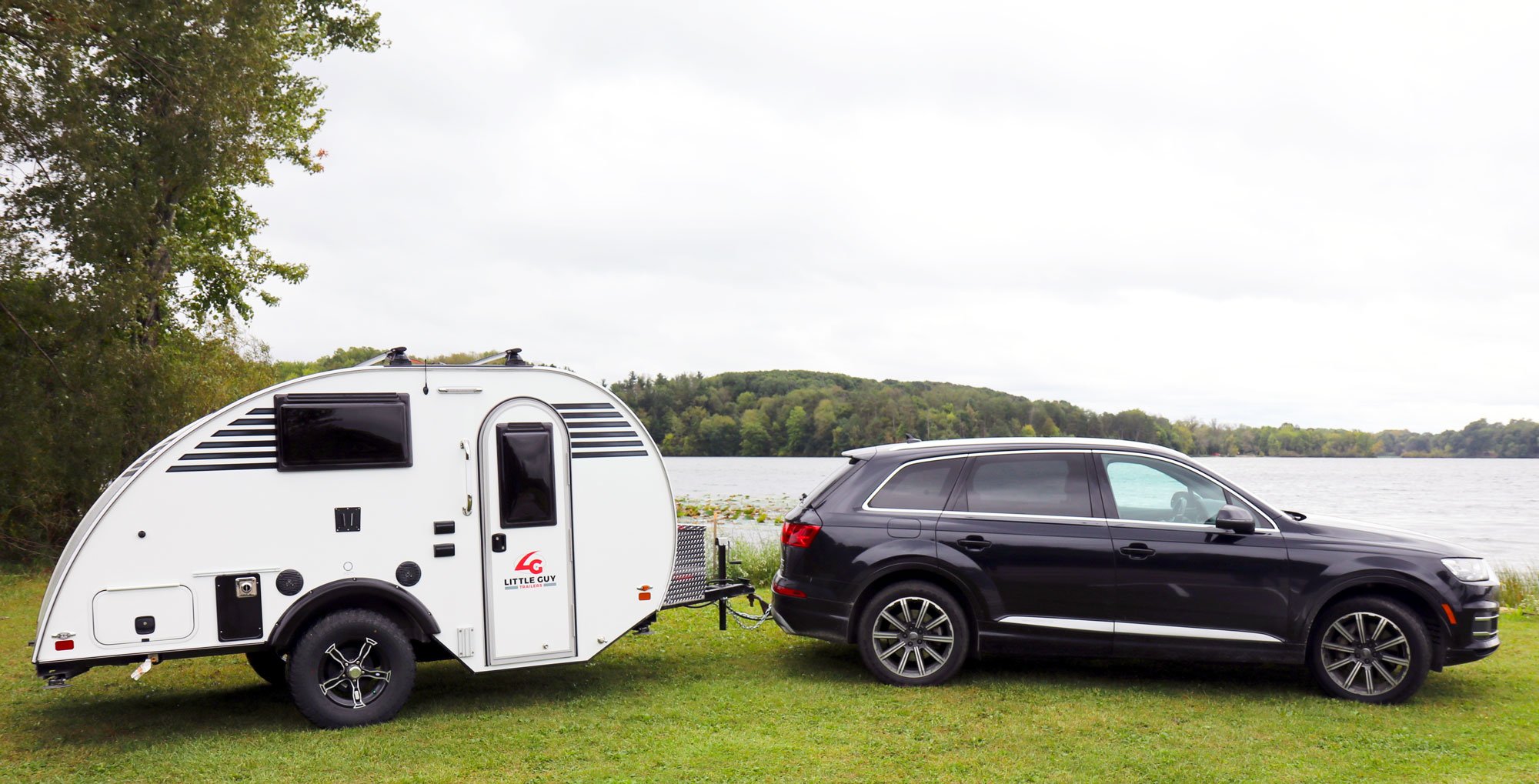
These lightweight travel trailers are lightweight and easy to tow. Photo courtesy of Little Guy.
Tread Lightly With These 10 Best Small Camper Trailers
The demand for small RVs is at an all-time high, and several RV manufacturers are responding to the demand for lightweight trailers that any car can pull. This list of the best lightweight travel trailers of 2022 spotlights the top-rated RVs for families, solo RVers, and adventure travelers.
- Each small RV trailer weighs less than 5,000 pounds.
- The ultralight trailers often cost less than a passenger car.
- Each trailer has one of the lightest gross vehicle weight ratings ( GVWR ) around. Just about any size truck or even some larger SUVs can pull them.
(If you’re looking for 2023 model-year lightweight travel trailers, check out our post 10 Best Lightweight Travel Trailers For 2023 .)
Top 10 Picks For Lightweight Travel Trailers (Under 5,000 Pounds GVWR)
Each small RV is listed in order by weight, from lightest to heaviest.
2022 nuCamp TAG XL: The Stargazer
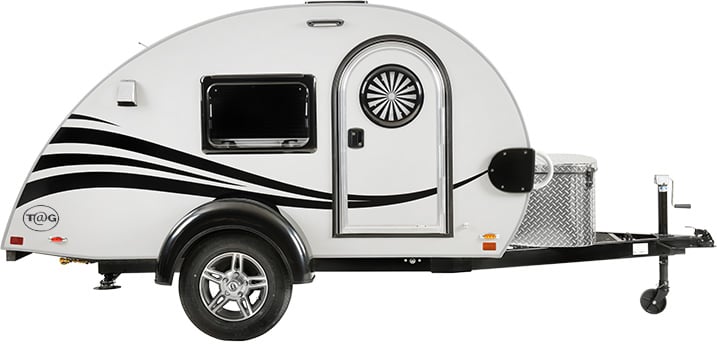
The TAG XL weighs less than 1,500 lbs – even with all of the bells and whistles.
At the top of our super light travel trailers list is the TAG. This small RV is lightweight and easy to tow. Built with custom Ohio-Amish cabinetry, under-bed storage, and an exterior shower, this teardrop trailer is the perfect way to bring some of the comforts of home when you hit the road.
Cook in nature while using the well-equipped rear galley. At night, you’ll climb into a warm and cozy interior. Watch the stars through a large stargazing window. There’s air conditioning, LED lighting, alloy wheels, electric brakes, and an optional solar roof package. No matter where you go, the TAG teardrop trailer is ready for adventure.
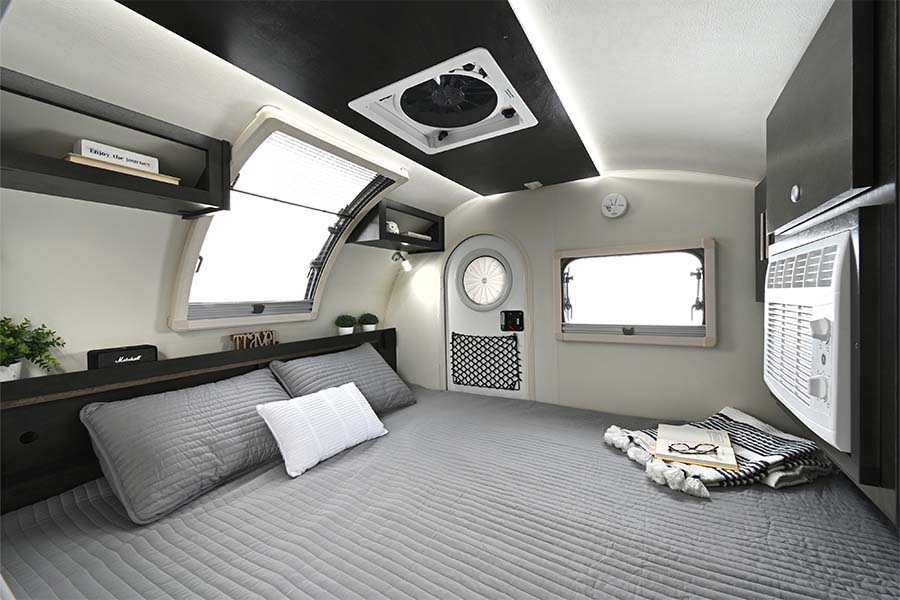
Climb into a warm, cozy interior – complete with a large window for stargazing.
- Hitch weight: 119 lbs.
- Gross vehicle weight rating: 2,200 lbs.
- Unloaded vehicle weight: 1,369 lbs.
- Exterior length: 13′ 7″
- Full exterior height: 6′ 3″
- Exterior width: 7′ 8″
- Interior height: 43″
- Freshwater capacity: 8 gallons
- Optional A/C and heater
- Base MSRP: $24,674
2022 TAXA TigerMoth Overland: The Ultimate Overlanding Vehicle
This rugged overland travel trailer is the ideal adventure home. The TigerMoth Overland Edition is a small RV with big features, including increased ground clearance thanks to the Timbren axle-less suspension with a 4″ lift.
You also get a number of premium accessories including a generous kitchen, roof cargo deck, and an optional tongue-mounted toolbox.
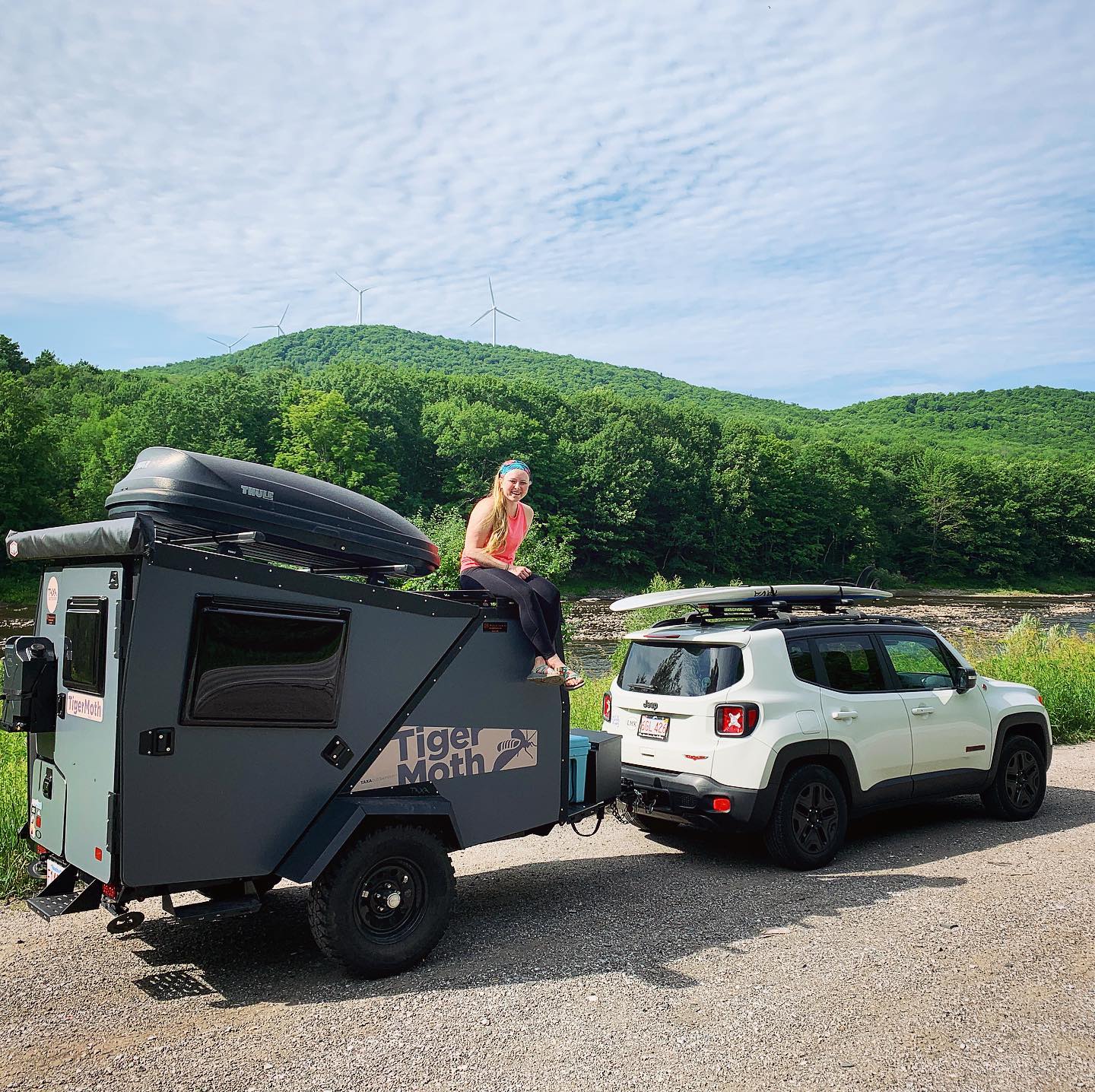
Enjoy 7+ off-grid days or longer
The TigerMoth can take you on a 7-day adventure or longer. The aerodynamic shape is fuel-efficient on the highway, and a generous interior space lets you do more with less. As a bonus, it’s also small enough to fit in a normal garage.
- Hitch weight: 195 lbs.
- Gross vehicle weight rating: 2,400 lbs.
- Unloaded vehicle weight: 1,458 lbs.
- Cargo capacity: 942 lbs.
- Exterior length: 12′ 0″
- Full exterior height: 7′
- Exterior width: 6′ 7″
- Freshwater capacity: 5 gallons
- 5 lbs propane tank & mount
- Pre-wired solar input
- Four acrylic, insulated windows with screens & shades
- 16″ alloy wheel with all-terrain tires
- Base MSRP: $29,350
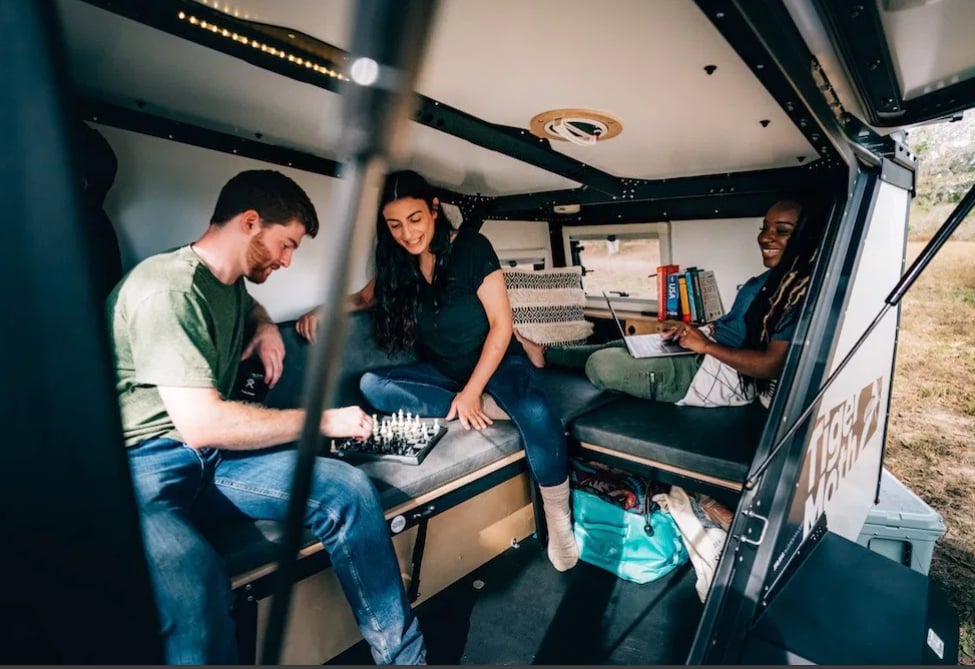
Go off-grid in comfort.
2022 Travel Lite RV Rove Lite: Lightweight And Easy To Tow
Travel Lite’s new Rove Lite ultra-lightweight travel trailer is one of the most affordable travel trailers on the market (under $20K). It’s light enough to pull behind even the smallest of vehicles. You only need a towing capacity of 2,000 pounds.
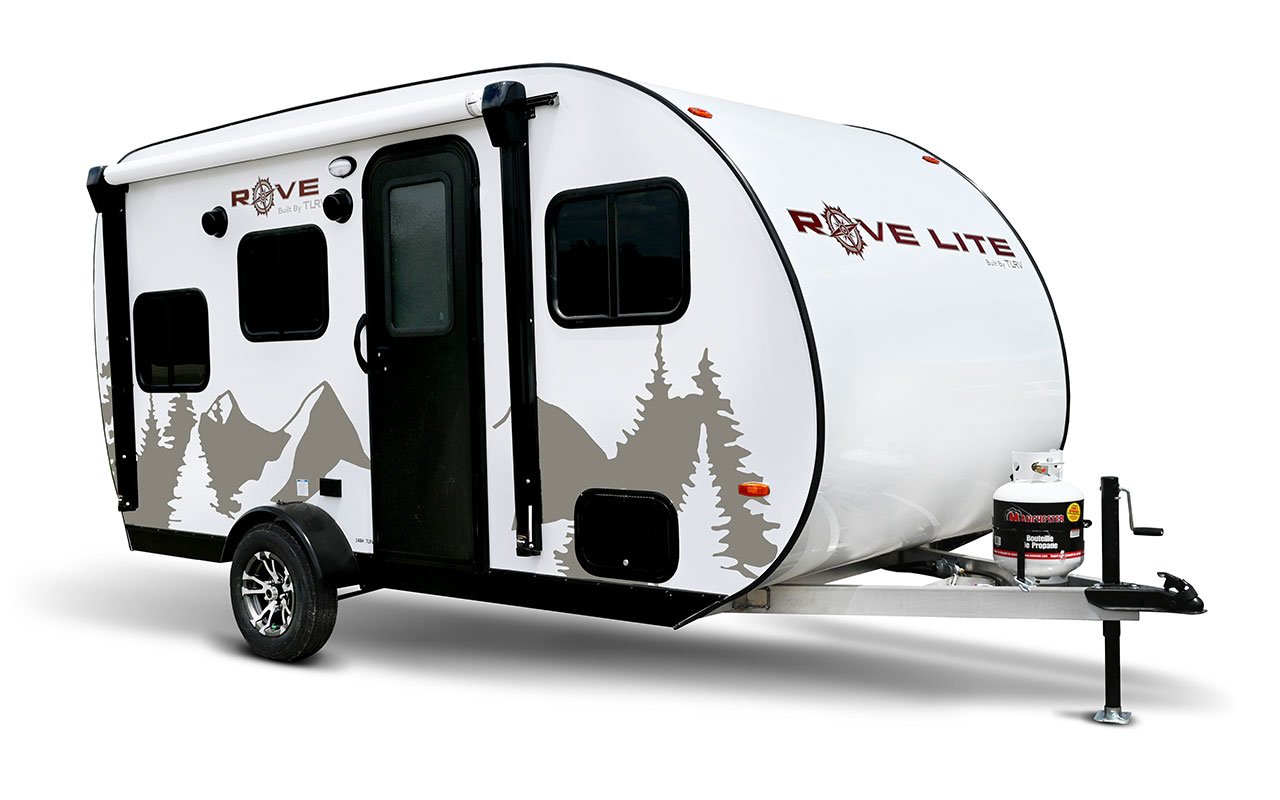
The new Rove Lite ultra-lightweight travel trailer is one of the most affordable RV trailers on the market. Photo courtesy of Travel Lite.
Enjoy the sleek Euro-style design made with state-of-the-art composite materials. There’s an aluminum chassis and a seamless poured-resin fiberglass roof. Interior features include a convertible bed and a bath with a shower. This small RV offers space-saving functionality at its best.
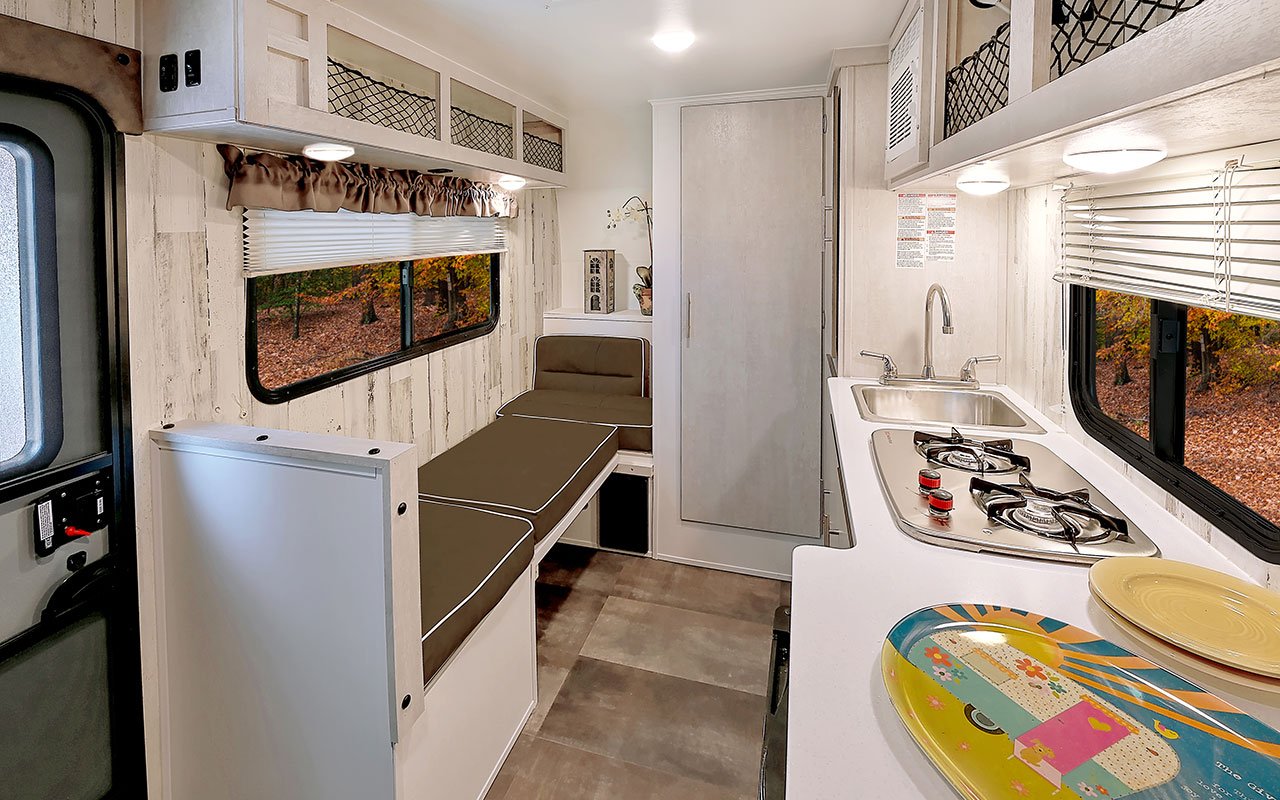
The 2022 Travel Lite RV Rove Lite ultra-lightweight travel trailer has a stylish and roomy interior. Photo courtesy of Travel Lite.
- Hitch weight: 160 lbs.
- Gross vehicle weight rating: 2,500 lbs.
- Unloaded vehicle weight: 1,707 lbs.
- Cargo capacity: 793 lbs.
- Exterior length: 15′ 4″
- Full exterior height: 8′ 1″
- Exterior width: 7′ 11″
- Freshwater capacity: 10 gallons
- Gray-water capacity: 30 gallons
- Black-water capacity: 5 gallons
- On-demand tankless water heater
- 20,000-BTU furnace
- Base MSRP: $19,424
Trillium Heritage Bunk 4500: New And Improved
Here’s a unique addition to our list of the best lightweight travel trailers of 2022: the ultralight, 15-foot, all fiberglass Trillium Heritage Bunk 4500 camper from L’air Camper Company in Ontario, Canada.
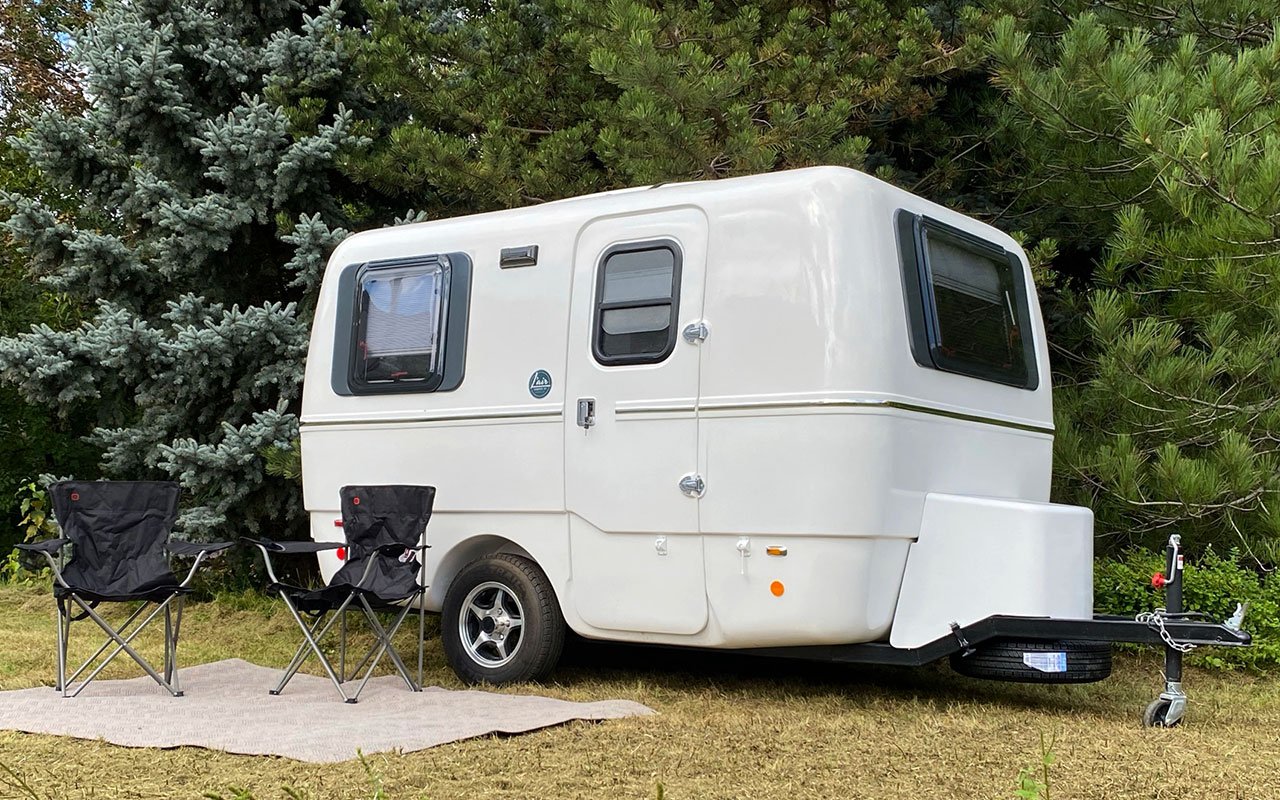
The L’air Trillium Heritage is an ultra-lightweight travel trailer that can be easily towed by many smaller SUVs and crossovers. Photo courtesy of L’air Camper Co.
This small RV received a complete facelift for 2022. It features dual-pane acrylic windows, a bigger solar panel, a 4.6-cubic-foot fridge with a freezer, and a galley makeover.
With a GVWR of just 2,700 pounds, the Trillium is an easy tow for many smaller SUVs and crossovers. Options abound for personalizing.
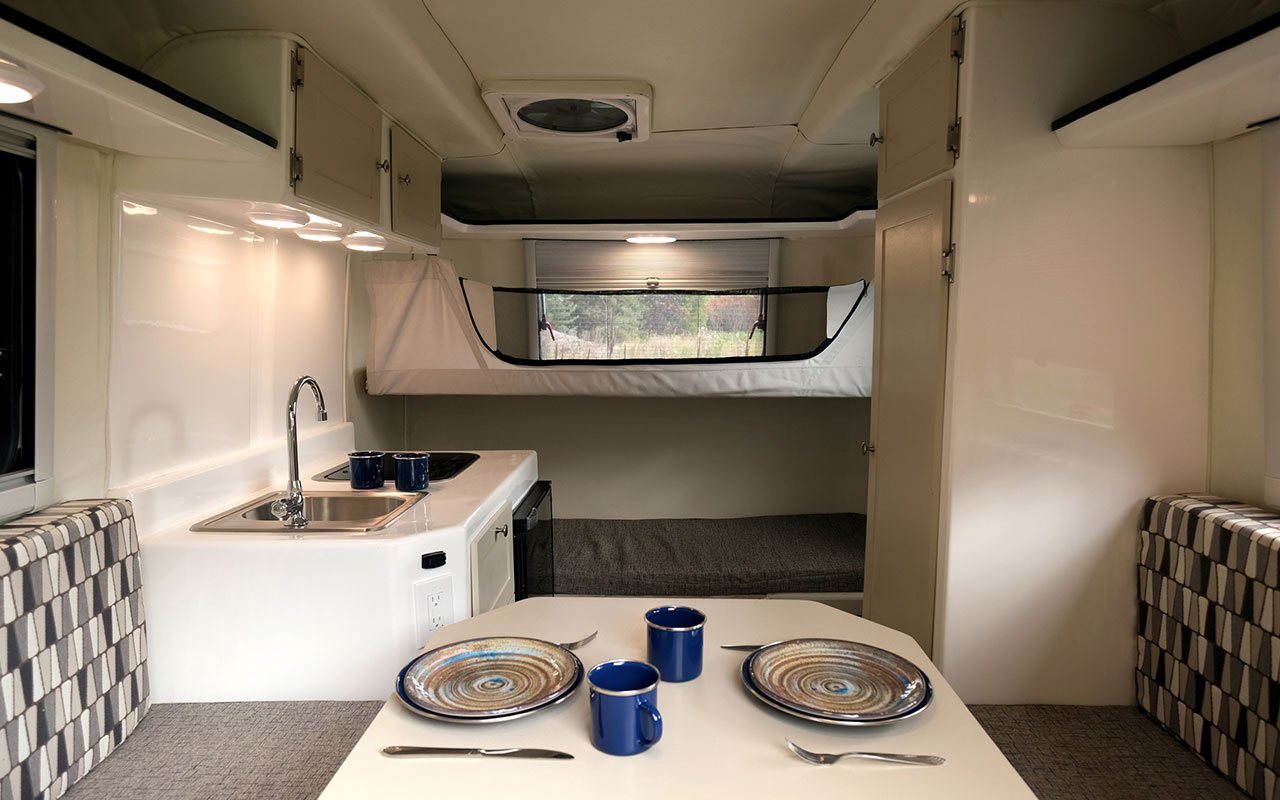
The living area of the Trillium Heritage has been updated with an all-new galley and 4.2-cubic-foot fridge. Photo courtesy of L’air Camper Co.
- Hitch weight: 180 lbs.
- Gross vehicle weight rating: 2,700 lbs.
- Unloaded vehicle weight: 1,650 lbs.
- Cargo capacity: 1,050 lbs.
- Exterior length: 15′ 2″
- Full exterior height: 6′ 2″
- Exterior width: 78″
- Freshwater capacity: 13 gallons
- Gray-water capacity: 5 gallons
- Single 130W solar panel with charge controller
- Base MSRP: $31,997
Venture Sonic Lite SL150VRB: Surprisingly Spacious
The Venture Sonic Lite SL150VRB has floorplans starting out at a fuel-saving 3,000 pounds! Both Sonic Lite and Sonic are engineered with a one-piece seamless fiberglass roof system. By arching the roof front to back, this system provides a more durable roof. When it rains, the water runs fore and aft.
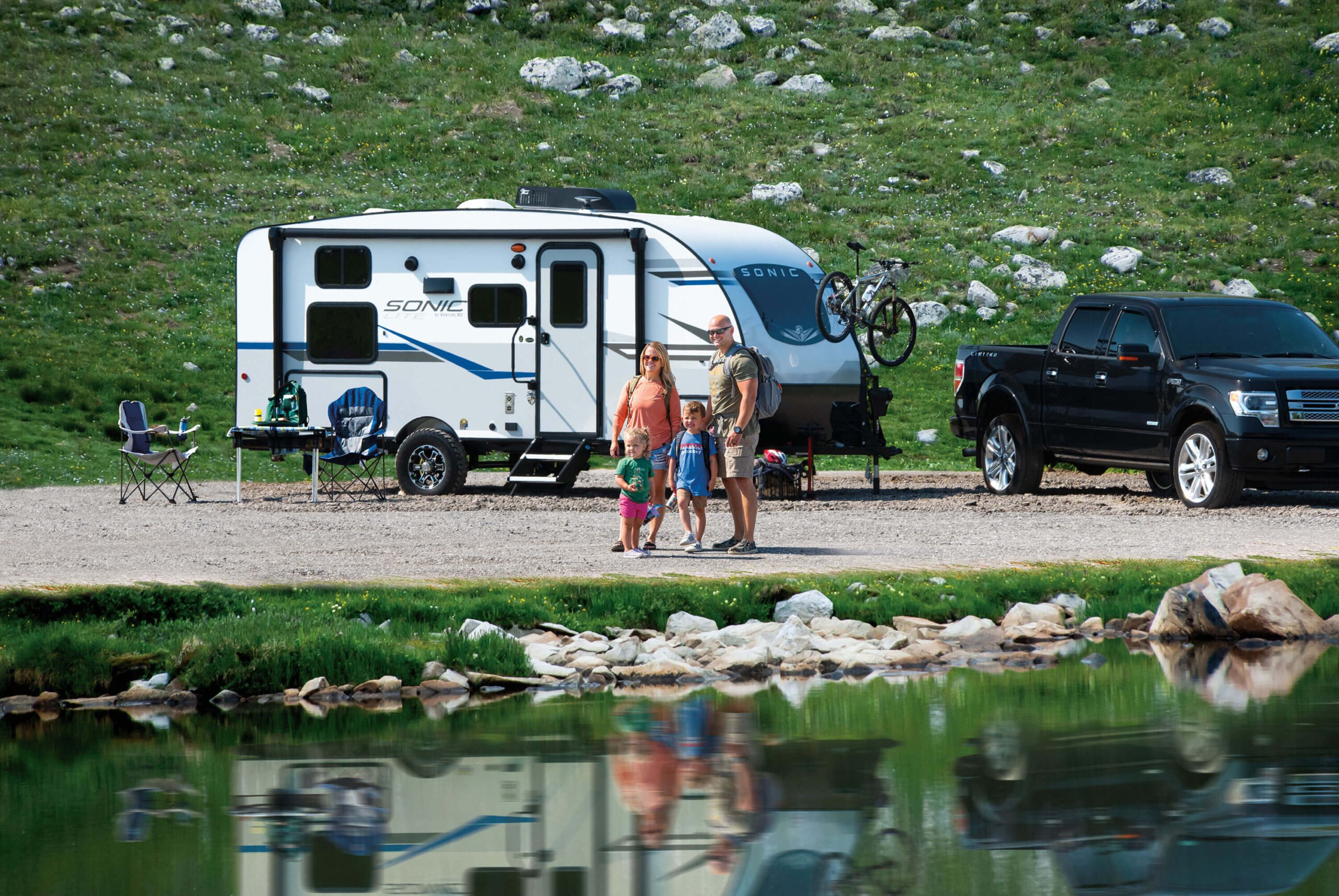
Sonic Lite trailers are engineered with a one-piece seamless fiberglass roof system.
- Hitch weight: 460 lbs.
- Gross vehicle weight rating: 3,735 lbs.
- Unloaded vehicle weight: 3,160 lbs.
- Cargo capacity: 575 lbs.
- Exterior length: 19′ 11″
- Full exterior height (with A/C): 9′ 11″
- Exterior width: 90″
- Freshwater capacity: 38 gallons
- Water heater capacity: 6 gallons
- Refrigerator: 8 cu ft
- LP gas capacity: 20 lbs
- Base MSRP: $34,059
2022 Little Guy Micro Max: Fits In Standard Garages
Finding a small travel trailer that can be parked inside a two-car garage isn’t easy unless you check out the new Little Guy Micro Max . This ultra-lightweight, four-season RV camper is a brand-new offering from Little Guy that will be coming out in early 2022.
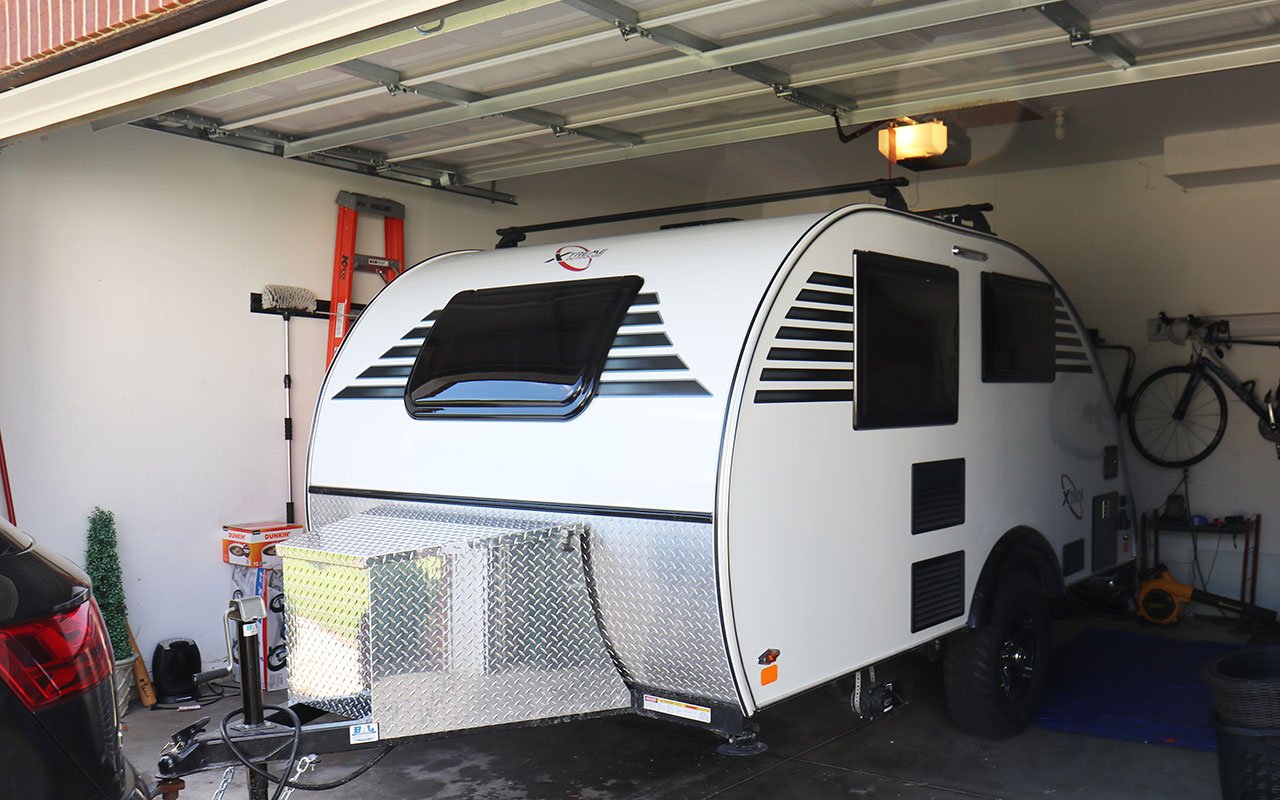
The Micro Max ultra-lightweight trailer fits inside a standard garage! Photo courtesy Little Guy Trailers.
Some of the features included in this fully equipped micro trailer are an air conditioner, a queen bed in the rear and twin bed up front, two dining areas, an interior galley, and an outdoor shower.
Headroom is a respectable 5′ 8″, which keeps the overall travel trailer height lower than the typical garage-door opening.
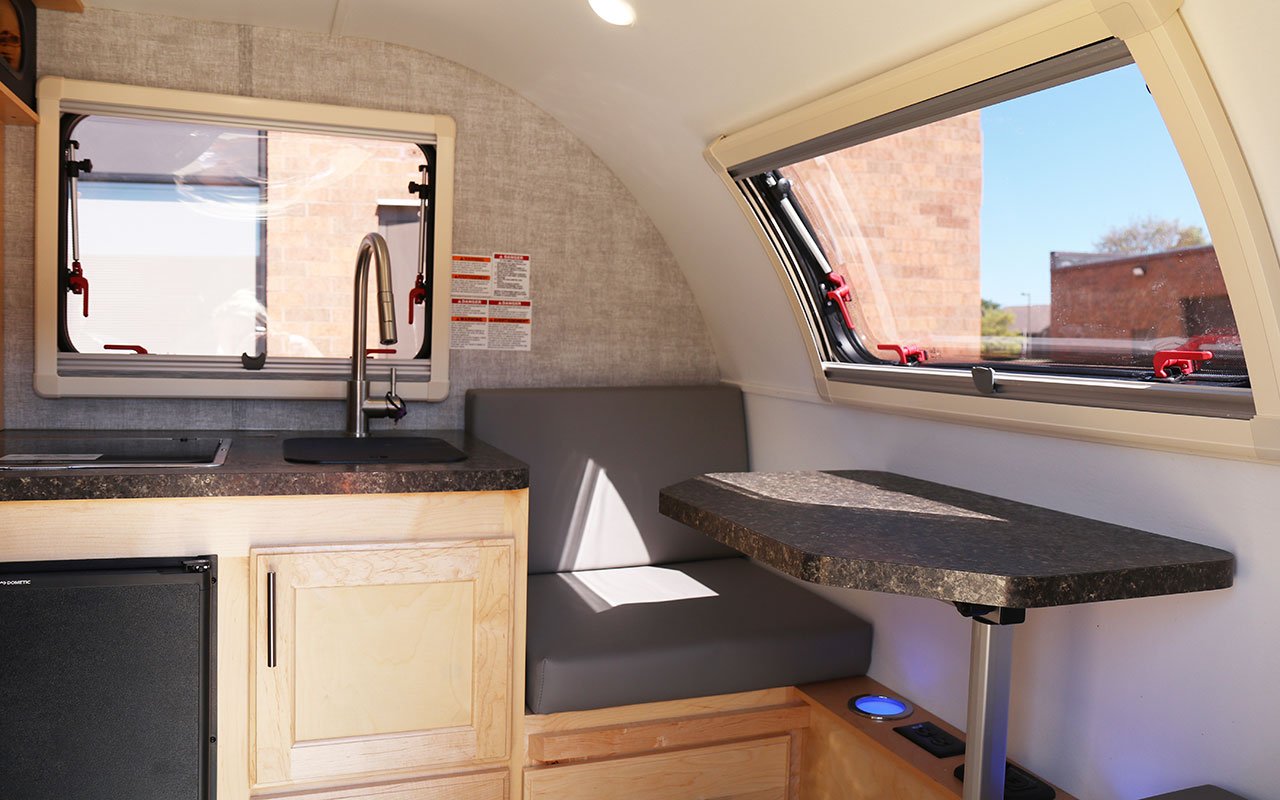
The interior of these lightweight travel trailers feels roomy with large windows. Photo courtesy of Little Guy Trailers.
- Hitch weight: 260 lbs.
- Gross vehicle weight rating: 3,500 lbs.
- Unloaded vehicle weight: 1,780 lbs.
- Cargo capacity: 1,720 lbs.
- Exterior length: 15′ 11″
- Full exterior height: 6′ 10.5″
- Exterior width: 80″
- Freshwater capacity: 12 gallons
- Gray-water capacity: 8 gallons
- Base MSRP: $25,000
Apex Nano 16R: Backcountry comfort
Be off-grid-camping ready with the Apex Nano 16R . This lightweight trailer comes with off-road tires and high-clearance suspension.
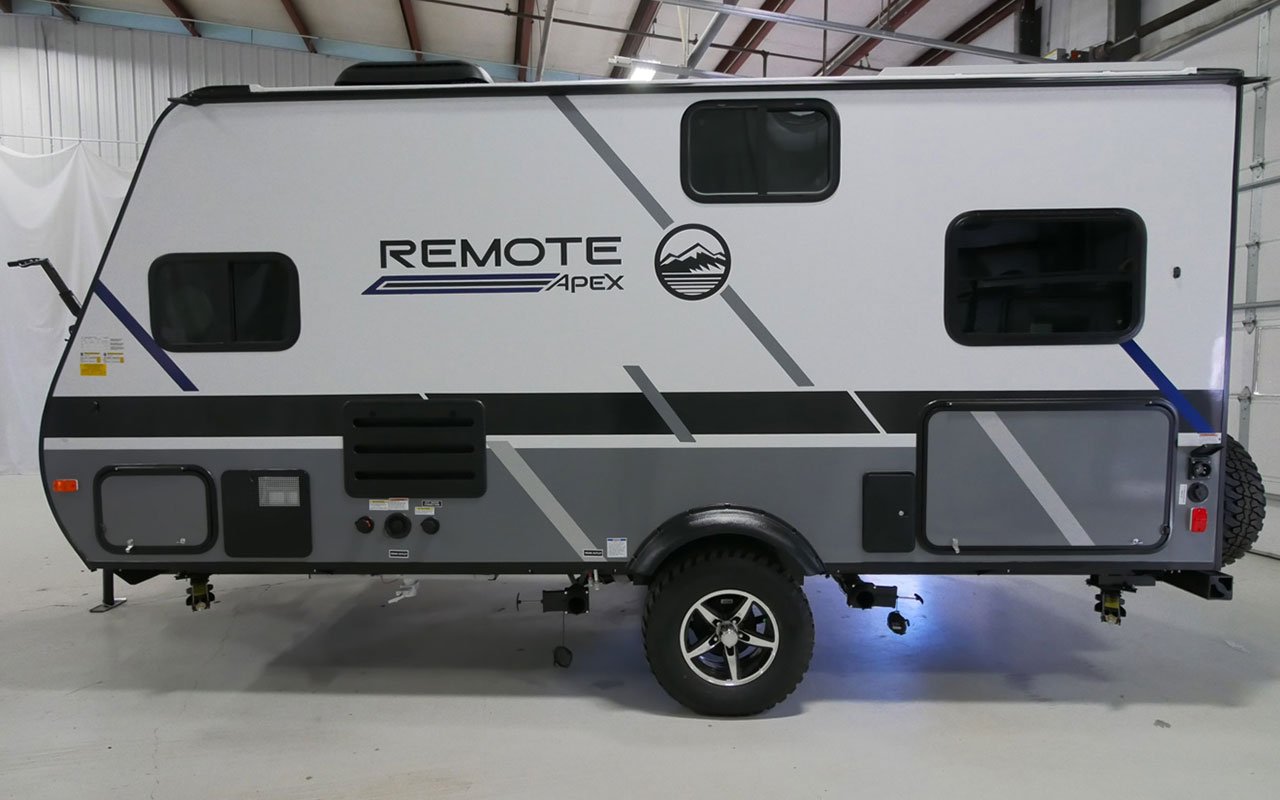
With a 3,800-pound GVWR, the Apex Nano 16R is compatible with most midsize pickups, SUVs, and some crossovers. Photo courtesy of Coachmen.
With heated freshwater and holding tanks, a 13.5K-BTU A/C, front bike rack, direct vent furnace, and sleeping accommodations for a family of four, the Apex Nano 16R travel trailer from the Coachmen line is a great choice for outdoor adventure-bound RVers. Its 3,800-pound GVWR is compatible with most midsize pickups, SUVs, and some crossovers.
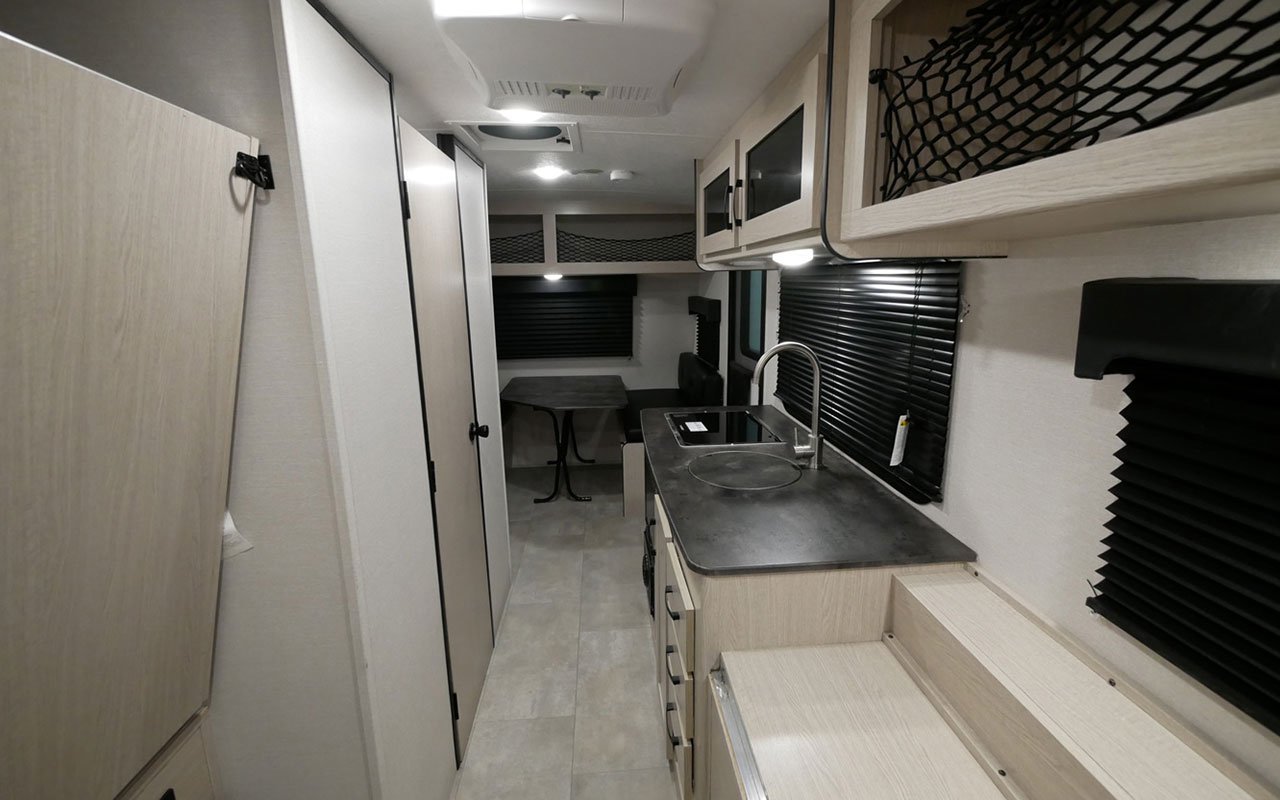
Coachmen’s Apex Nano 16R offers a 6-cubic-foot gas/electric fridge, two-burner cooktop, and microwave. Photo courtesy of Coachmen.
- Hitch weight: 330 lbs.
- Gross vehicle weight rating: 3,800 lbs.
- Unloaded vehicle weight: 2,860 lbs.
- Cargo capacity: 940 lbs.
- Exterior length: 19′ 7″
- Full exterior height: 9′ 10″
- Exterior width: 7′
- Freshwater capacity: 50 gallons
- Gray-water capacity: 35 gallons
- Black-water capacity: 35 gallons
- 6-cubic-foot gas/electric fridge
- Two-burner cooktop and microwave
- 12′ awning
- Base MSRP: $27,731
OPUS OP4: Adventure ready
There’s no other travel trailer setup like the Opus Camper’s OP4. After all, this innovative push-button, air-inflated tent camper inflates in less than two minutes and sleeps six.
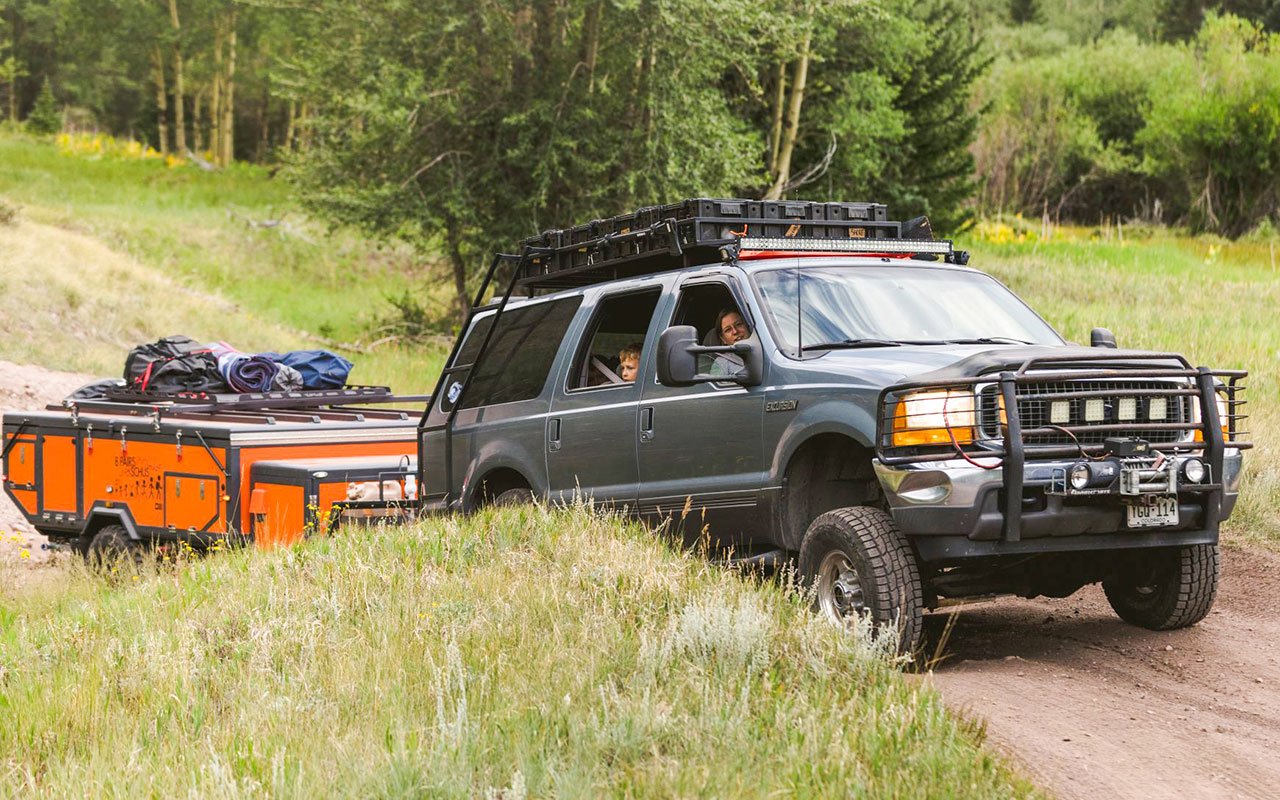
There’s no other lightweight travel trailer setup like the Opus Camper’s OP4. Photo courtesy of Opus Camper.
The OP4 has a spacious interior lounge area, high ceiling, and a ton of windows and skylights to make you feel like you’re outdoors. The external kitchen makes cooking for the family easy, and OPUS offers a long list of options, including heating, A/C, solar power, bike racks, and extension rooms to make any RV outing enjoyable.
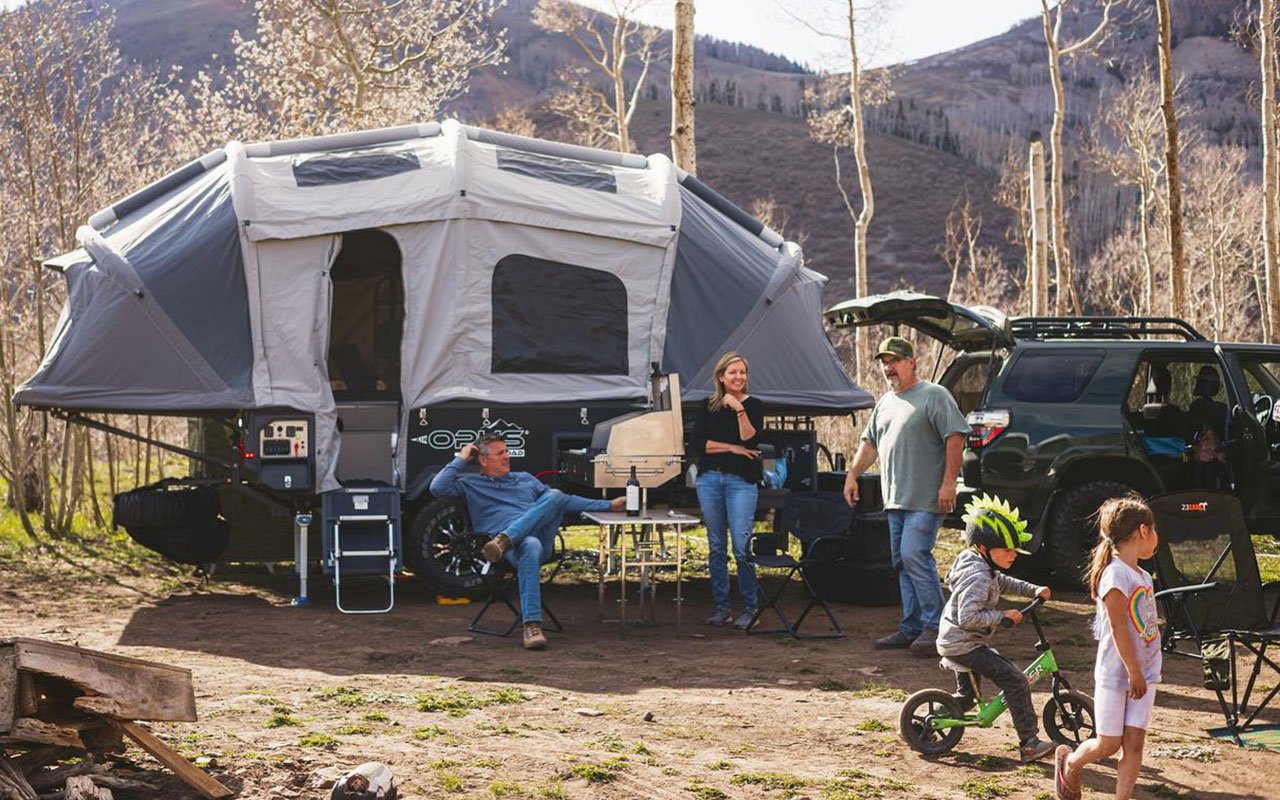
The external kitchen of the Opus OP4 makes cooking for the family easy. Photo courtesy of Opus Camper.
Features:
- Hitch weight: 400 lbs.
- Gross vehicle weight rating: 4,200 lbs.
- Unloaded vehicle weight: 3,100 lbs.
- Cargo capacity: 500 lbs.
- Exterior length: 17′ (closed)/ 21′ 4″ (open)
- Full exterior height: 5′ 4″ (closed)/ 7′ 10″ (open)
- Exterior width: 7′ 2″ (closed)/ 11′ 6″ (open)
- Freshwater capacity 40 gallons
- Cassette toilet
- Base MSRP: $27,999
Forest River Rpod RP153: Ultra lightweight
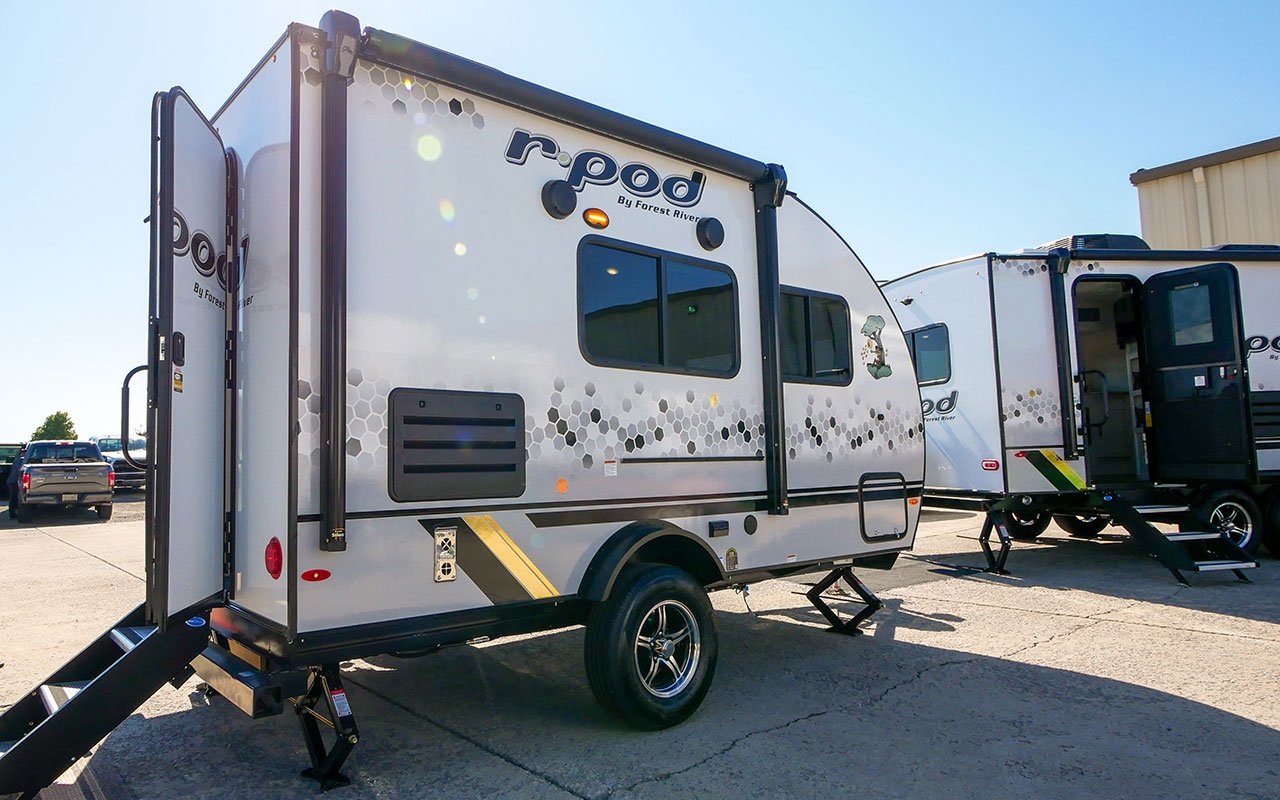
The 17-foot floorplan RPOD from Forest River is an ideal size for singles and couples. Photo courtesy of Forest River.
The RPOD is one of the best-selling ultra-lightweight travel trailers on the market. Forest River has expanded the line to seven models by adding a smaller version called the Rpod 153 . The 17-foot model has all the basic features of its bigger brethren, and its slightly smaller floorplan is ideal for singles and couples.
The rear bath is spacious, the galley very functional, and the Murphy bed in the front maximizes interior space. This is an RV camper that’s very well designed, appointed, and engineered. It’s a good match for half-ton pickups, midsize pickups, and SUVs.
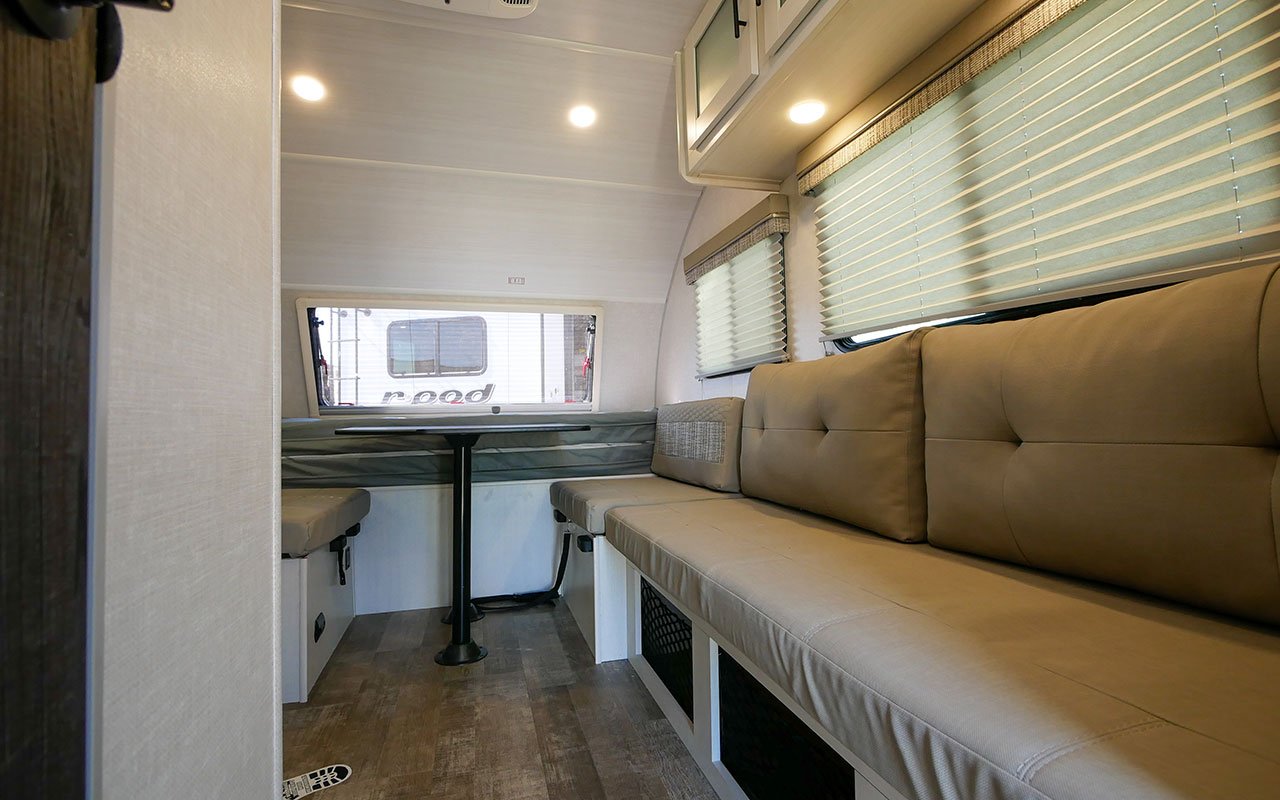
The 17-foot RPOD from Forest River is well-designed, appointed, and engineered. Photo courtesy of Forest River.
- Hitch weight: 300 lbs.
- Gross vehicle weight rating: 4,280 lbs.
- Unloaded vehicle weight: 2,880 lbs.
- Cargo capacity: 1,400 lbs.
- Exterior length: 17′ 3″
- Full exterior height: 9′ 8″
- Exterior width: 8′
- Freshwater capacity: 30 gallons
- Black-water capacity: 30 gallons
- 8′ awning
- Base MSRP: $25,500
2022 Rockwood Geo Pro 20FBS: Roomy and comfortable
Forest River’s spacious Rockwood Geo Pro 20FBS caught our attention. A walk-around bed is a real rarity in a single-axle travel trailer and a testament to the designers taking to heart what customers have been asking for in years past.
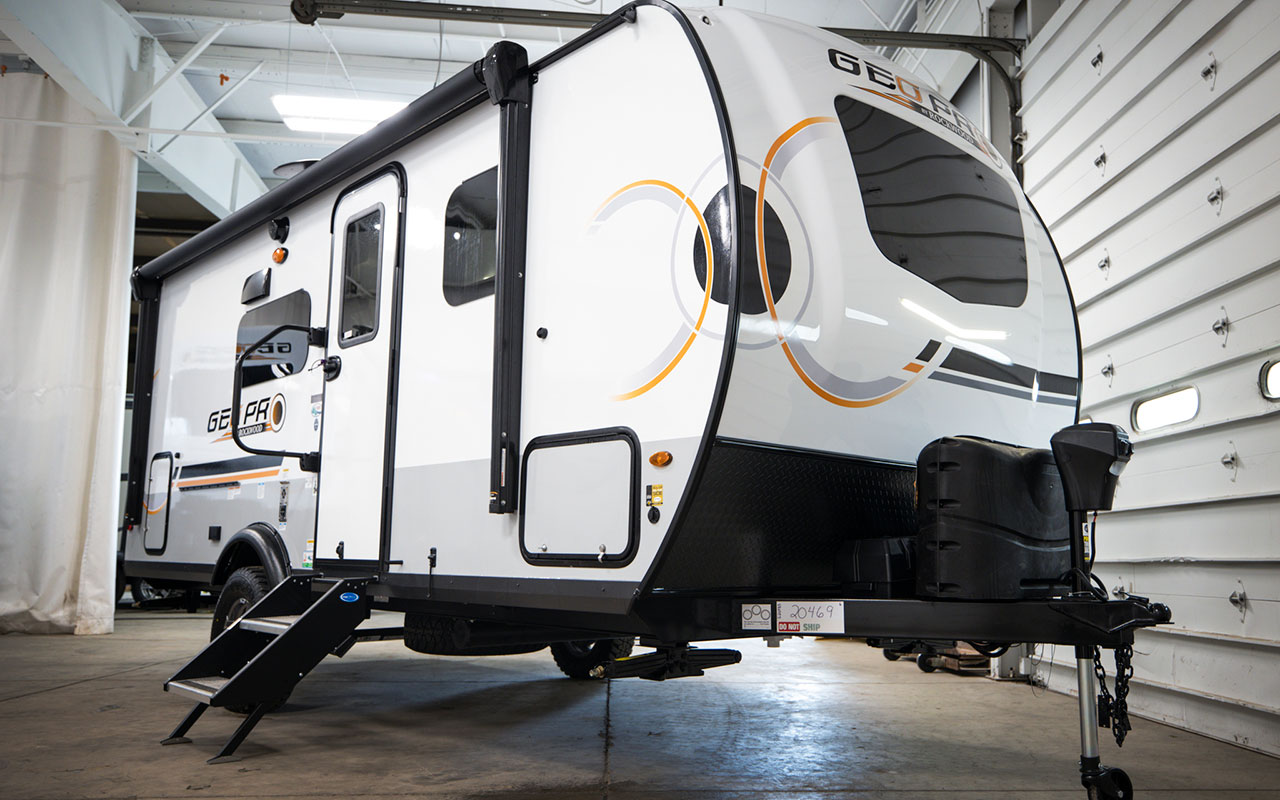
Forest River’s 2022 Rockwood Geo Pro 20FBS comes with a high-clearance axle setup and 15-inch Mud Rover Radial tires. Photo courtesy of Forest River.
The large bathroom across the rear of the RV has an oversized shower, and the 72-inch sofa in the slide-out can rotate into a comfortable hide-a-bed. The Geo Pros also come with a high-clearance axle setup and 15-inch Mud Rover Radial tires well suited for backcountry RV camping.
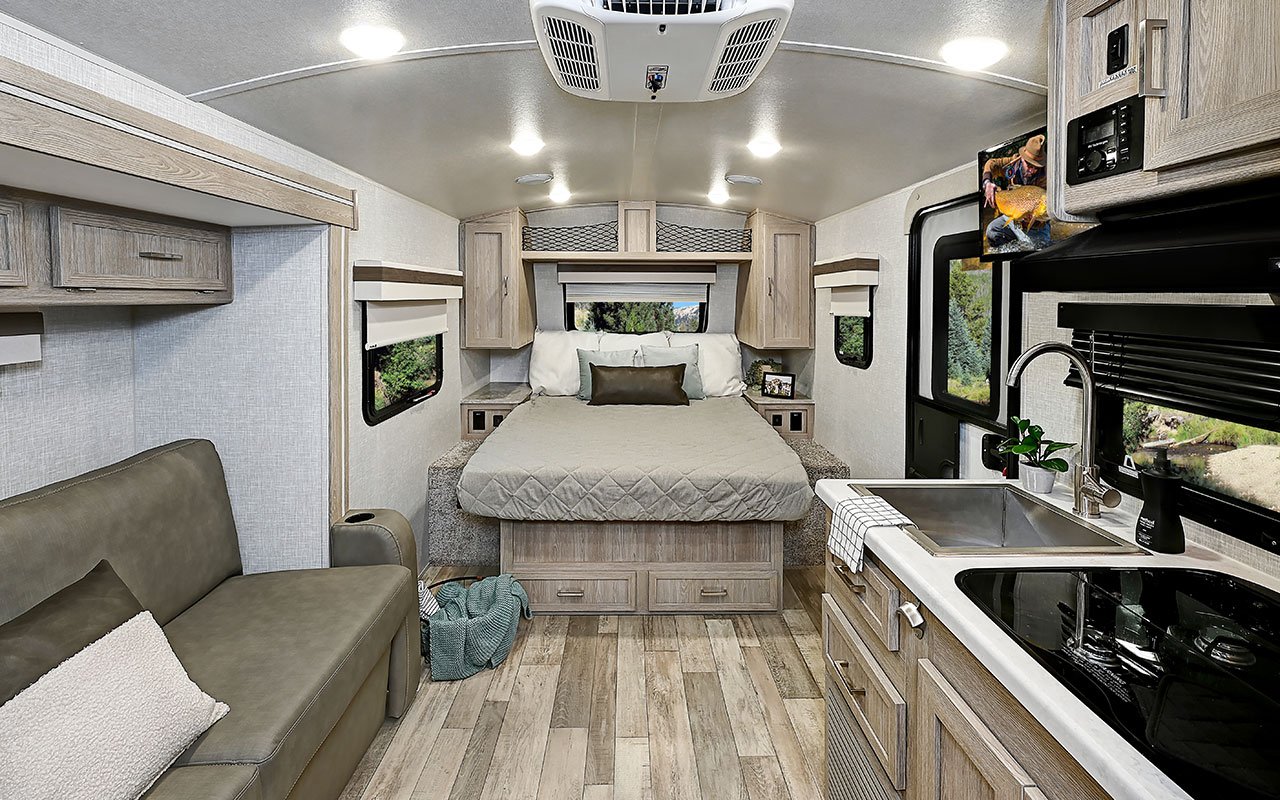
The 2022 Rockwood Geo Pro 20FBS has a walk-around bed, which is a rarity for a single-axle travel trailer. Photo courtesy of Forest River.
- Gross vehicle weight rating: 4,400 lbs.
- Unloaded vehicle weight: 3,442 lbs.
- Cargo capacity: 958 lbs.
- Exterior length: 21′ 8″
- Exterior width: 92″
- Freshwater capacity: 31 gallons
- 54″x74″ Full-size bed
- 14-foot awning
- Outside shower
- Tire pressure monitoring system
- Base MSRP: $32,675
That’s our list of the most innovative new lightweight travel trailers of 2022. These small RV models are big on affordability, convenience, and amenities.
As a bonus, the features are packaged in a small camper footprint. In most cases, you won’t need to purchase a tow vehicle for these trailers. To find out how much weight your car can pull, open your vehicle’s manual. Look for the maximum trailer towing capacity and you’ll find the answer.
Why lightweight travel trailers are in demand
If you’re thinking about buying one of these lightweight travel trailers, you’re in good company. Demand for big and small RV models is soaring.
For example, according to the latest issue of RV RoadSigns , the quarterly sales forecast published by the RV Industry Association (RVIA), RV manufacturers are still scrambling to meet consumer demand that started in 2020. This year, more than 600,000 new RVs will be sold. These figures are all-time high that will exceed the record-breaking RV sales of 2021.
“The remarkable production from the RV manufacturers and suppliers is nothing like we have ever seen before, and our new forecast shows the record-breaking streak will continue,” said RVIA President and CEO Craig Kirby.
Editor’s note: RV manufacturer materials costs are constantly increasing. The current base costs for the small, light travel trailers on our list may have changed since the time of this writing (Q4 2021).
Connect with other RVers
One of the best parts about RVing is engaging with the community of traveling enthusiasts. iRV2 forums allow folks to chat with other RVers online, and get other perspectives on everything RVing, including products, destinations, RV mods, and much more.
Related articles:
- 10 Best Lightweight Travel Trailers For 2023
- 8 Best Small Pull Behind Campers For 2022
- A Look At The New 2022 Keystone Campers
You May Also Like:

When Is The Best Time To Buy A Camper?
When is the best time to buy a camper? The answer to that question depends a lot on inventory, time of year, and market expectation.

Turn A Vintage Airstream Into A Place All Your Own
Since the company’s inception more than six decades ago, Airstream has been providing distinguished trailer designs to a variety of consumers–from RV

How to Avoid Trailer Sway and a Possible Accident
Want to get where you’re going in one piece? If you own a trailer or want to buy one, pay attention to these four tips to avoid a trailer sway wreck.
6 thoughts on “ 10 Best Lightweight Travel Trailers Of 2022 ”
we kinda like our Roo 183…when folded out it is breezy and spacious…just sayin’
Hello, it isn’t only the lightweight important, an aerodynamical design is also important when I travel an electric car. For a long distance it’s good to reach 400 miles or more. It has to include WC with shower, cooking-place, refrigerator and a seat-corner for 4 persons.
Missed 3 other molded fiberglass super light weight and strong hold their value for years and years. Escape Trailer – Canadian, Scamp – Minnesota & Casita -Texas.
Many of “stick and staple” TT are very lightweight construction-wise and kinda ticky tacky and fall apart.
What are the best buys for trailers in the 25 to 30ft range.
Have in mind what features you like and know your GVWR (Gross Vehicle Weight Rating). I was told by a camper salesman to use 1000 lbs below your max as your guide to try to avoid going over. I type in rvtrader.com and enter in my my length wanted. Minimum 25′ and maximum 30′. I often set the “Sorted By” at oldest or lowest price. You can say you want a slide or no slide. See what comes up!!
Keystone Sprindale Mini 1800BH. Queen bed, 2 twin bunks, wifi stereo, solar, 12′ awing with lights, no slide out to break. Logical layout. Under $20k. 💕
Leave a Reply Cancel reply
Your email address will not be published. Required fields are marked *
Save my name, email, and website in this browser for the next time I comment.
Welcome! Please follow these guidelines:
- Be kind and respectful.
- Keep comments relevant to the article.
- Avoid insults, threats, profanity, and offensive remarks.
- Refrain from discussing gun rights, politics, or religion.
- Do not post misleading information, personal details, or spam.
We may hide or remove comments at our discretion.
I have read and accepted the Comment Guidelines and Privacy Policy *
Recent Posts

Browse By Category

This post may contain affiliate links or mention our own products, please check out our disclosure policy .
What are the 10 Best Travel Trailer Brands and Models?
Published on May 23rd, 2022 by Ray & Tammy Roman This post was updated on October 5th, 2023
One of the most frequent questions we get from new and experienced RV enthusiasts alike is: What are the best travel trailer brands to consider buying? This is a crucial consideration because your travel trailer is more than just a vehicle—it’s your home on wheels. Let’s explore some brands that consistently receive high marks for quality, innovation, and customer satisfaction.
Discovering the Best Travel Trailer Brands in 2023: A Guide for Every RVer
Deciding on “the best brand” of anything is subjective. The answer is as unique as you are. Discovering it largely depends on your specific RV travel needs, budget, family size, and personal preferences. he answer also depends on finding the best truck for your camper .
Over the years my picks for the best travel trailers tends to remain unchanged. Many new brands are on the market, but they have not been around long enough to properly assess their quality. Each of the best travel trailer brands in our list has developed a unique approach to comfort, efficiency, and style.
DON’T MISS OUT ON RV LIVING UPDATES
Sign up for the newsletter today.
Please enter a valid email address.
An error occurred. Please try again later.

Thank you for subscribing to the RV Living newsletter, keep your eye on your inbox for updates.
Whether you are drawn to the classic charm of an Airstream, the durability of an Oliver, or the tech-forward approach of Jayco, the choice ultimately comes down to your personal preference and budget.
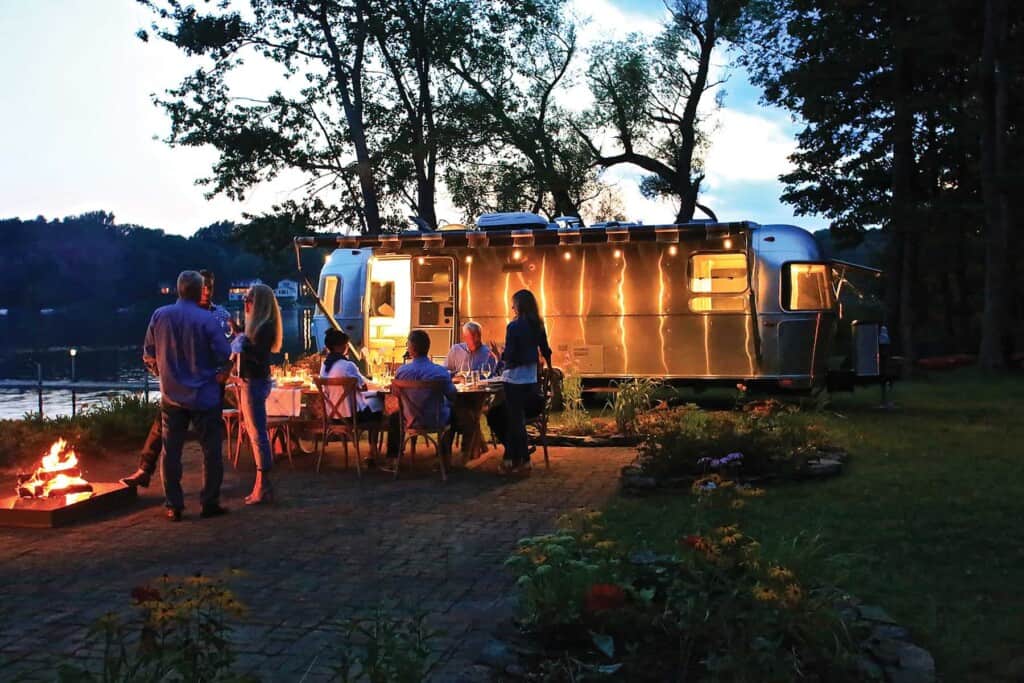
The Gold Standard: How Do You Choose the Best Travel Trailer Brands of 2023?
What distinguishes the elite from the average in the world of travel trailers? After analyzing feedback from RV enthusiasts and combing through industry reviews, we have identified three things to keep in mind as you shop for your ultimate travel trailer brand.
1. Road-Tested Reliability
When it comes to RVs, it’s not a question of if you’ll encounter issues, but when. With that in mind, the reliability of a travel trailer should be your most critical consideration. The most trusted travel trailer brands inspire confidence based on sterling reviews. That feedback isn’t just from RV industry cheerleaders, but from the real experts – everyday RV owners like you and me.
Don’t fall for the shiny objects shown in walk-through YouTube reviews. Instead, dig deeper and seek out firsthand experiences from actual owners. Start with RV communities such as the iRV2 Discussion Forums . This is one of many excellent ways to get unbiased ratings and insights from owners of the brands you are curious about. Start engaging in discussions about the real-world performance and reliability of the camper you’re interested in.
2. Value for Your Money
Price matters, but not always in the way you might think. While we all love a bargain, when it comes to travel trailers that a lower sticker price can often be a sign of mass production that leads to compromised quality. As with any purchase, affordability is important, but it shouldn’t come at the cost of quality. The best travel trailer brands offer the highest value for the price point with above-average durability, thoughtful design, and overall quality.
3. Customer-First Service
The best travel trailers in the world can’t make up for a poor customer service experience. When investing in a travel trailer, you’re not just buying an RV. You are entering into a relationship. The industry’s top-tier travel trailer brands on our list understand this and prioritize customer satisfaction. From the initial contact with the manufacturer to after-sales support from the dealer and any warranty work in the future, they make it a prioirty to keep customers happy.
Not all travel trailer brands or their affiliated dealers shine in this area. Explore Google reviews about your local RV dealers that carry the brand you are considering. An overwhelming amount of negative customer feedback may be a telltale sign to look elsewhere.
The Top 10 Best Travel Trailer Brands List
Choosing the best RV trailer brands isn’t easy. There are hundreds of trailer brands and thousands of models. I selected these brands and models based on hundreds of RV user reviews. The following list of camper brands is known for their commitment to quality and value. They are also known for providing excellent customer service and timely warranty repairs. Here are the manufacturers that make our cut.
Now let’s review these brands and their best models to consider buying for your next travel trailer purchase. Remember, take your time to research, visit dealerships, attend RV shows, and even rent different models. This will give you a feel for what suits you best. The adventure of RVing begins even before you hit the road. It starts right here with the exciting process of choosing your home on wheels from among the best travel trailer brands in 2023.
#1. Airstream Flying Cloud
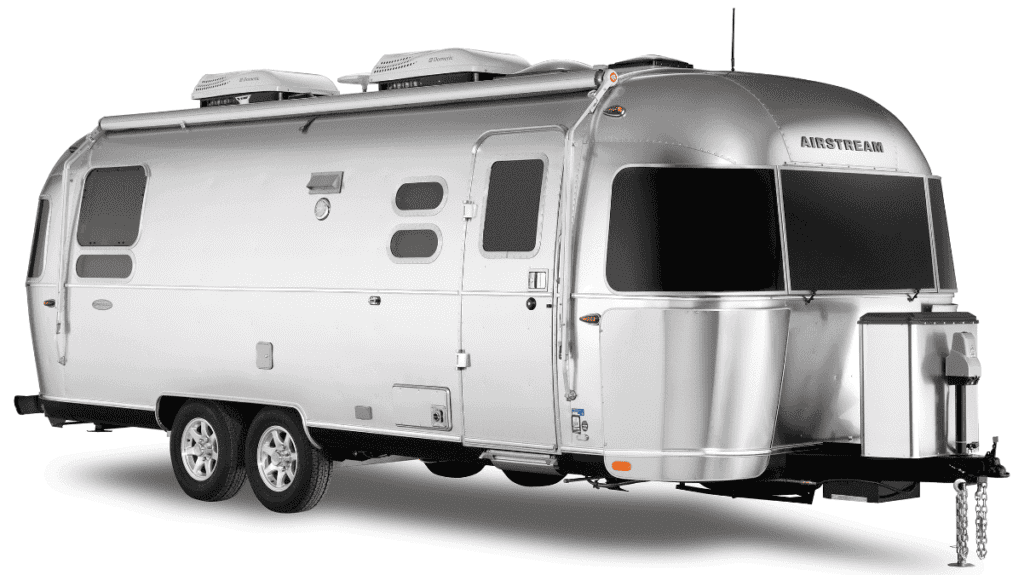
When you think luxury camper, Airstream is one of the first travel trailer brands that usually comes to mind. They produce some of the most recognizable RVs in the industry. Airstreams are priced in the high-end range. But ask any Airstream owner and they will tell you that the value you get for your money is well worth the price.
Their iconic models include the Classic, Globetrotter, Tony Bahama, Flying Cloud, and others. Now owned by Thor Industries, Airstream continues to lead the industry with a reliable, iconic, and distinctive design.
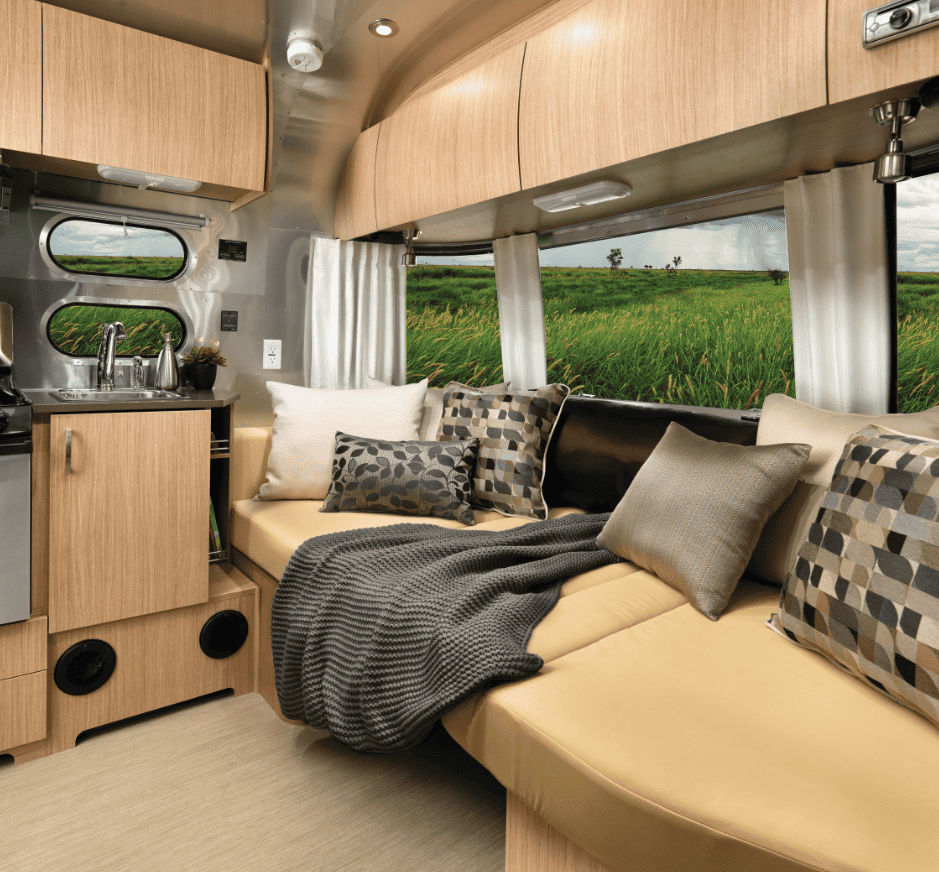
Why is the Airstream Flying Cloud one of the best travel trailers?
Few travel trailer brands evoke a sense of nostalgia, quality, and adventure as instantly as Airstream. Over the years, this iconic brand has been synonymous with the romance of the open road. The Airstream Flying Cloud travel trailers are a perfect embodiment of this legacy, earning it our number one spot on the list of the best travel trailers.
Crafted with both beginners and experienced RVers in mind, the Flying Cloud merges vintage appeal with modern comforts, creating a unique experience that sets it apart in the RV landscap
With a starting price of $94,400, it is not for everyone. But the first thing that strikes you about the Flying Cloud is its unmistakable design, which aligns with the higher-end price tag. With its distinctive aluminum shell, not only does the Flying Cloud turn heads at every campsite, but it also offers durability and a lighter towing weight. A wide variety of tow vehicles can haul one, from full-size pickups to larger SUVs with adequate towing capacity..
Sleep Capacity: 4-8
Length: 23 to 30 feet, gvwr: 6,000 to 8,800 pounds, 8 floor plans as of 2023.
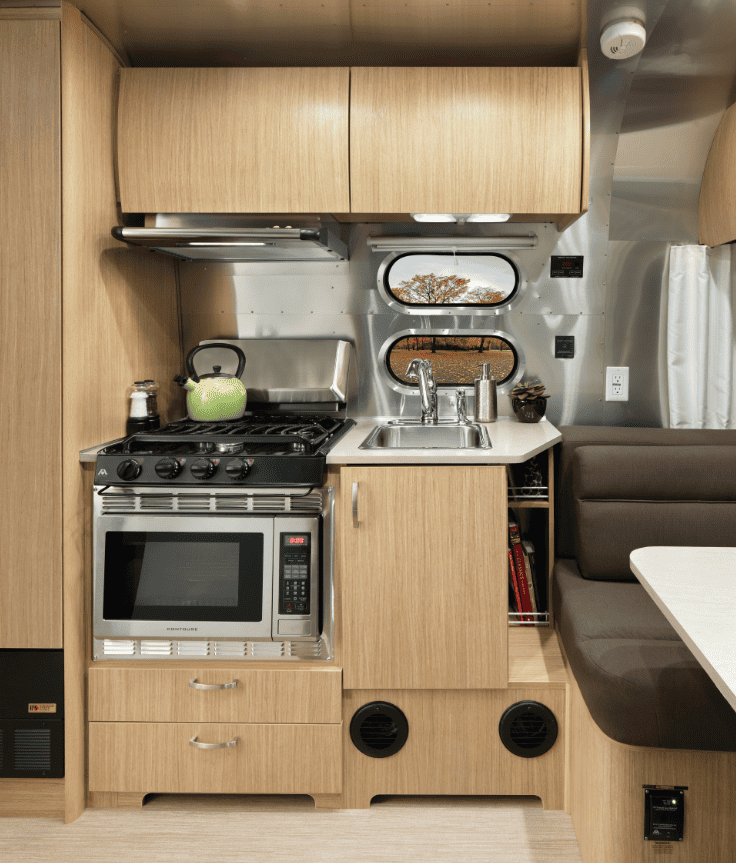
Constructed with a handcrafted riveted aluminum shell, it’s more than just pretty. All Airstream designs offer exceptional durability, weather resistance, and a lighter towing weight, ensuring longevity and ease of towing. The Flying Cloud model is loaded with features that exude quality, from the high-end kitchen appliances to the porcelain toilet and more.
Flying Cloud Features Include:
Quietstream climate control, ultraleather seating, high-end kitchen appliances, seating that converts to sleeping, memory foam mattress, handcrafted cabinetry, retractable awning, rear-view monitoring system, roller blinds and blackout curtains, moen faucets and much more.
Depending on the layout you choose, you can opt for comfortable twin beds or a spacious queen bed, both featuring a memory foam mattress for a restful night’s sleep. A full bathroom featuring a stand-up shower, a porcelain toilet, and cleverly designed storage adds another layer of convenience to your journey.
The Airstream Flying Cloud is our number one choice for the best travel trailers of 2023. It beautifully combines timeless style, superior build quality, and modern convenience in a travel trailer package that combines the joy, freedom, and adventure of life on the road with you.
Airstream Flying Cloud Floor Plans and Specs
#2. grand design rv imagine.
Grand Design RV is another one of the best travel trailer brands. They have a loyal and raving fan base that considers their travel trailers some better overall brands in the industry.
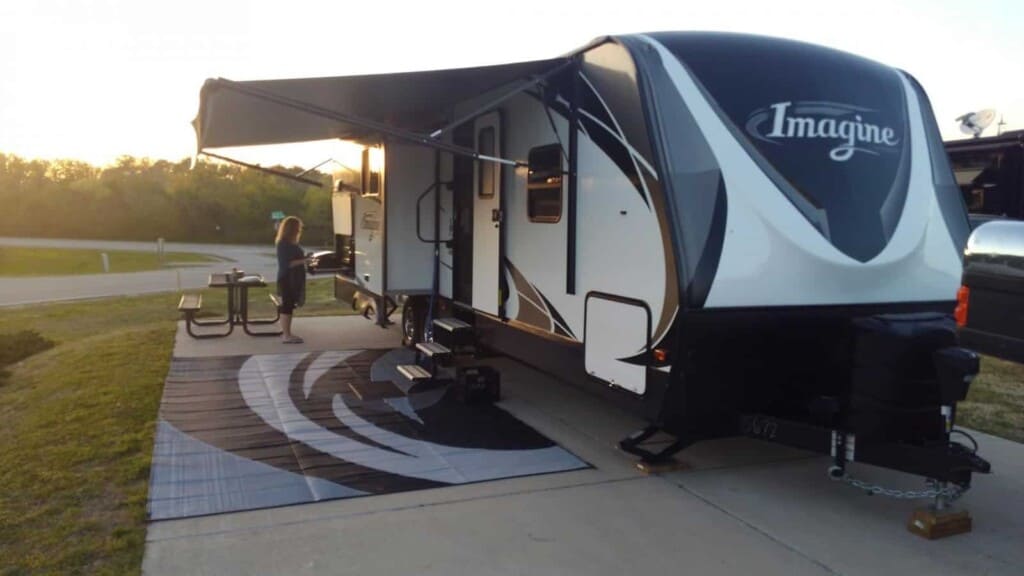
I have seen many owner reviews of Grand Design campers who rave about the quality of these units and the outstanding customer service. For me, a list of the best travel trailer brands would not be complete without Grand Design.
The company is located in Middlebury, IN. All their towables and fifth wheels come with a 3-year limited structural warranty. Imagine XLS is one of my favorites due to its excellent styling, features, and amenities. Grand Design has only been around since 2001 and today it operates as an independent business within Winnebago Industries. This line of campers is definitely on our short list of the best travel trailer brands in 2023.
Why I Recommend the Grand Design Imagine
The Imagine travel trailer line is my preferred bumper-pull from this RV manufacturer. There are several reasons I like the Imagine trailer. First off, it comes in 21 different floor plans. Even the smallest model comes with a queen-sized bed. There is no way I would want a travel trailer with anything smaller than a queen bed.
Grand Design Imagine Specifications
11 different floor plans in 3 lines, length: from 19 ft 11-inches to 36-feet 11-inches, one-piece roof membrane with 12-year warranty, arctic 4-seasons package, aluminum framed fully laminated sidewalls, uvw: 3,560 lbs to 8,394 lbs, gel-coated fiberglass exterior, double-insulated floor, roof, and front cap, heated and enclosed dump valves, factory installed rv solar power system.
The Imagine is also loaded with a ton of standard features. Here are just a few of the ones that stand out for me and for what I’m looking for:
Solid hardwood drawer fronts
Upgraded residential furniture, large double door refrigerator, large panoramic windows, residential quality countertops, 3-burner range with oven.
Grand Design Imagine Floor Plans & Specs
#3. oliver legacy elite 2.
The Oliver brand makes high-quality luxury fiberglass trailers in their Tennessee manufacturing facility. The company, which was started by twin brothers Jim and John Oliver, was formed in 2008.
Oliver manufactures fiberglass trailer with a blend of luxury and resilience that’s hard to beat. Imagine a travel trailer built like a fortress, designed to withstand whatever Mother Nature might throw at it. That’s what Oliver offers – each trailer is constructed with a double-hull fiberglass shell. This gives superior protection against all weather conditions. It’s not inexpensive, but is a testament to the brand’s commitment to quality and durability.
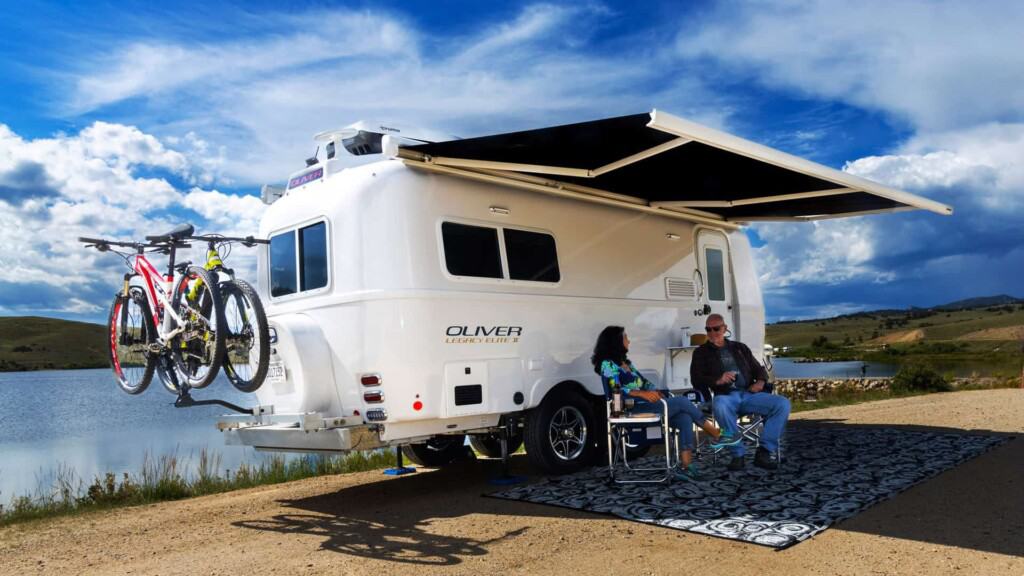
The company gets that we’re all different and have our own ideas about what makes the perfect RV. That’s why they offer a wide range of customization options. Whether it’s a specific floor layout, an advanced solar power system, or leather upholstery, Oliver makes it happen. It’s like getting a tailor-made suit, but this one’s an RV made to fit your camping style and needs.
The Oliver Legacy Elite 2
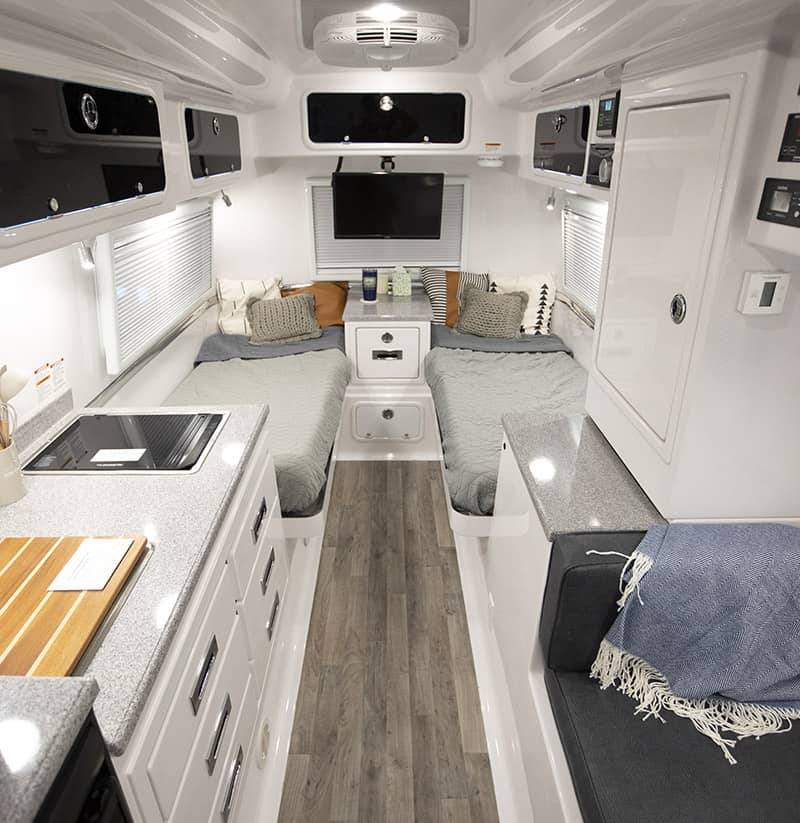
The Oliver Legacy Elite 2 pictured above is my favorite model and probably one of their top-rated all-fiberglass campers. I like the Elite 2 for several reasons. I like that it has a dry weight of just 4,600 pounds. It can be towed with a good truck or full-size SUV. Keep in mind that 4,600 pounds is just the dry weight. For towing, you need to consider cargo weight too.
The Legacy Elite 2 comes in two-floor plans. One with twin beds and the with a dinette to 75″ x 79″ bed conversion. This model is loaded with standard features.
Oliver Legacy Elite 2 Specifications
Full custom molded interior and exterior insulated shells, plumbing, holding tanks, and drain pipes are enclosed between shells with heat to diminish the risk of freezing, quad shocks on dual dexter leaf spring axles, “nev-r-adjust” electric brakes for exceptional control and braking, molded vanity, norcold 3-way refrigerator 4.5 cubic ft. (12v, 11ov, lp), 15′ dometic awning, 22″ flat screen lcd tv, custom mounted speakers (4).
Oliver Travel Trailers are worth the money if you are shopping for a new RV. Their unique blend of luxury, superior construction, thoughtful design, customizability, and top-tier customer service, makes these fiberglass trailers a trustworthy companion on your road adventures.
Oliver Legacy Elite 2 Floor Plans & Specs
#4. winnebago industries – micro minnie.
Another of our selected best travel trailers is Winnebago. With a history spanning over 50 years, Winnebago is a well-known and respected brand in the RV industry. Headquartered in Forest River, Iowa, the company builds a huge selection of RVs, including high-quality motorhomes, campers, fifth wheels, and toy haulers.
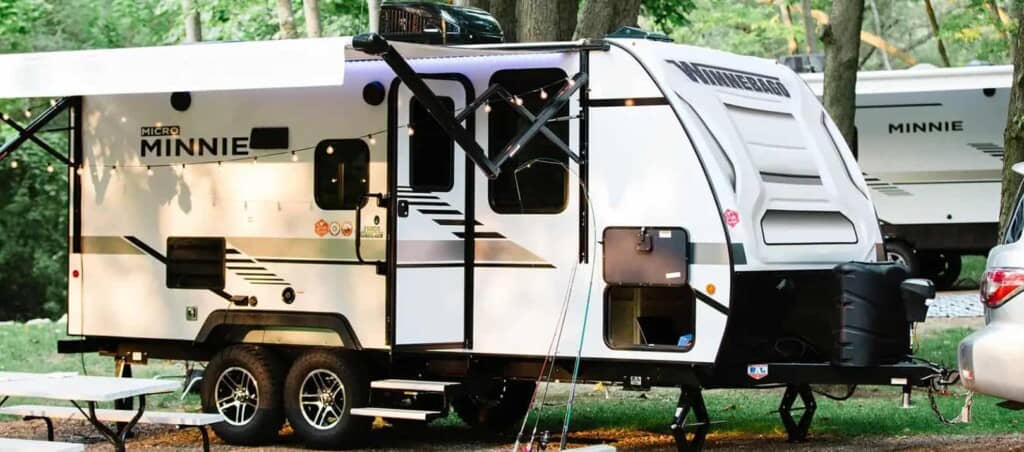
Winnebago makes five popular travel trailer models as of 2023. One of the best travel trailer brands for new RVers and experienced ones alike is the Micro Minnie (which replaced the older Minnie Drop model that made our former list of the best travel trailers.
What I Like About the Micro Minnie
When it comes to striking a balance between compactness and living comfort, the Micro Minnie travel trailers hit the nail right on the head. These little marvels of RV engineering manage to pack a ton of amenities into a small, easy-to-tow package, proving that you don’t have to go big to enjoy the perks of home on the road.
Despite their size, Micro Minnies don’t skimp on the essentials. Step inside to enjoy a fully-equipped kitchen that comes with a double-door refrigerator, a three-burner stove, and even a microwave. So, whether you’re warming up last night’s leftovers or cooking a full-course meal, you’ve got everything you need right there.
Winnebago Micro Minnie Specifications
11 floor plans, exterior lengths from 20’5″ to 25’5″, interior height: 6’4″, exterior height: 10’5″, dry weight: 3,755 to 4,651, gvwr: 5,500 to 6,000 lbs., gray water holding tank capacity: 25 gal., black water holding tank capacity: 25 gal..
A key aspect of Micro Minnies’ appeal is their towability. With a Gross Vehicle Weight Rating (GVWR) of 5,500 to 6,000 pounds, depending on the model, they can be comfortably towed by a variety of vehicles. Mid-size SUVs, pickup trucks, and some of the beefier crossovers make suitable companions for these compact travel trailers.
Winnebago Minnie Drop Floor Plans & Specs
#5. happier camper hc1.
If you’re looking for an ultralight travel trailer that brings a smile to your face and makes RVing a breeze, Happier Camper travel trailers are it. These compact and retro lightweight travel trailers are winning the hearts of people who want a small trailer that can be towed by a typical passenger car.
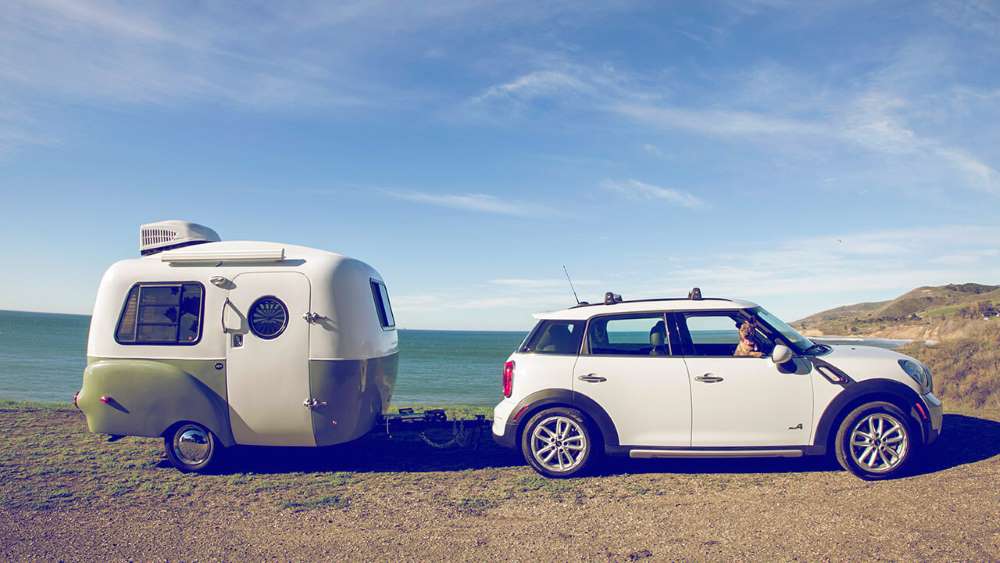
Happier Camper trailers are incredibly versatile. Their “Adaptiv” furniture anf cabinetry are made as modular cubes. This lets you customize the layout to suit your specific needs for any camping trip. The modular system includes lightweight cubes that can be rearranged to create a comfortable sleeping area, a cozy dining space, or even a mobile office for those who can’t leave work behind.
Each trailer’s retro-inspired design pays homage to the iconic campers of the past while incorporating modern amenities. With their vibrant colors, rounded shapes, and nostalgic appeal, Happier Camper trailers turn heads wherever they go. Plus, their lightweight construction makes them a breeze to tow, even with smaller vehicles.
Why The Happier Camper HC1?
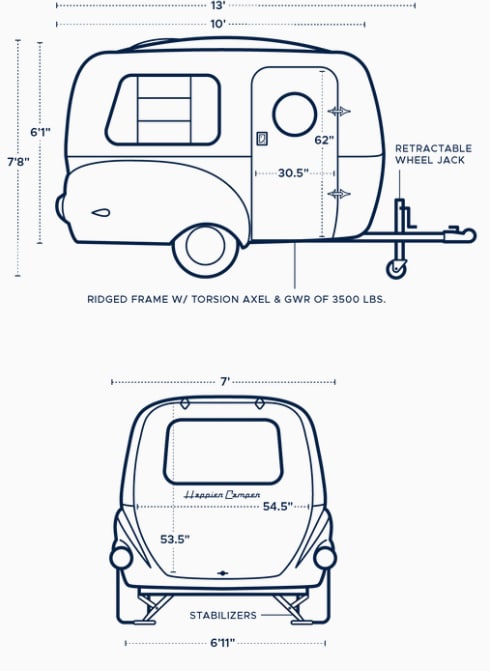
Happier Camper trailers are also built to last. Crafted with high-quality materials and attention to detail, these trailers offer durability and reliability on the road. From the sturdy fiberglass shell to the energy-efficient appliances, every aspect of a Happier Camper trailer is thoughtfully designed for your comfort and convenience.
A notable Happier Camper HC1 feature is the expansive rear hatch that lets you easily load up a couple of bikes; even a kayak if water sports are your favorite outdoor activity. This is an awesome feature for such a small camper.
Happier Camper HC1 Specifications
100% double-hull insulation fiberglass, length: 10′ (shell), 13.5′ with hitch, width: 6′ 11″, exterior height: 7′ 4″, inside height: 6′ 1″, dry weight: 1,100 lbs., gvwr: 3,500 lbs., adaptive modules are all 20″ x 20″ and of varying height, rear hatch door: 54.5” w x 53.5” h.
One thing to keep in mind with the Happier Camper is that it does not have a typical toilet setup. The Happier Camper has a “ Dry Flush” toilet for RVs . That is the only drawback I see to this camper trailer. Remember, it is small, so don’t expect much room, but that is how it’s been designed. It’s modern, and makes exceptional use of the small interior.
Happier Camper Floor Plans & Specs
#6. starcraft rv autumn ridge.
Another of our picks with a long history in the RV industry, Starcraft, started making metal farm equipment in 1903. In 1968 they began manufacturing campers. Today, what sets Starcraft apart from other small, affordable trailers is its smart construction. Made with TuffShell, Starcraft’s unique fiberglass wall construction, all Starcraft trailers give superior durability while remaining lightweight. This combination not only extends the lifespan of the RV but also makes towing a breeze, whether you tow with a full-size pickup or a mid-size SUV.
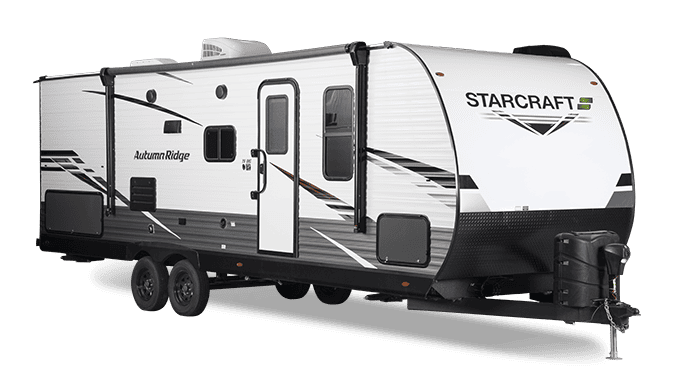
Step inside an Autumn Ridge, and he homey atmosphere helps you feel right at home wherever you park. Their kitchens are a standout, complete with a three-burner stove, a microwave, and a double-door refrigerator – all you need to whip up delicious meals on the road or at the campsite . After dinner, you can relax in the comfortable seating area, perhaps catch a show on the LED TV.
What Makes The Autumn Ridge a Best Travel Trailer?
Prior to the Autumn Ridge, the 2019 Starcraft Mossy Oak travel trailer was my preferred choice. This was a spacious camper available in 11-floor plans, including several travel trailer models with bunk beds . The Mossy Oak came in lengths from 23’4″ to 36’5″, making it the best predecessor of the Starcraft Autumn Ridge. This new model has many choices for RV buyers, with features that will make you want to own one too.
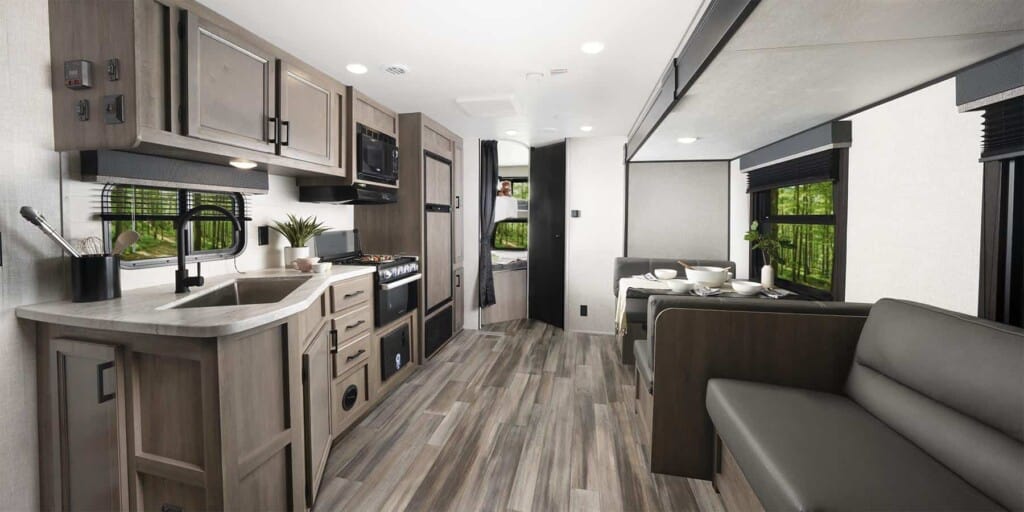
Starcraft RV Autumn Ridge Specifications
7 single-axle floorplans, plus, 7 dual-axle floorplans, lengths: 19′ 3″ to 33′ 10″, gvwr: 3750 lbs. to 7,500 lbs., inside height: 6′ 9″ to 8; 4″, fresh water tank: 26 to 58 gal., gray water tank: 19.9 to 39 gal., blackwater tank size: 19.9 to 39 gal., self-adjusting electric brakes and e-z lube® axles, thermal-seal enclosed, insulated underbelly.
The Autumn Ridge by Starcraft RV offers an excellent balance between comfort, durability, and towability. Its impressive features, combined with the ease of towing, make it a great choice
Autumn Ridge Floor Plans & Specs
#7. lance camper 1685 travel trailer.
Lance Campers have a reputation for being very well-built and an owner base that loves the customer support offered by the company. Definitely one of the better RV brands in the industry, the designs are extremely practical and well done. Lance Campers are built with top-grade materials such as Dual Layer Azdel composite composite panels, an eco-friendly, toxin-free composite panel superior to wood.. These trailer are also built with a one-piece Energy Star Rated Synthetic Membrane Roof.
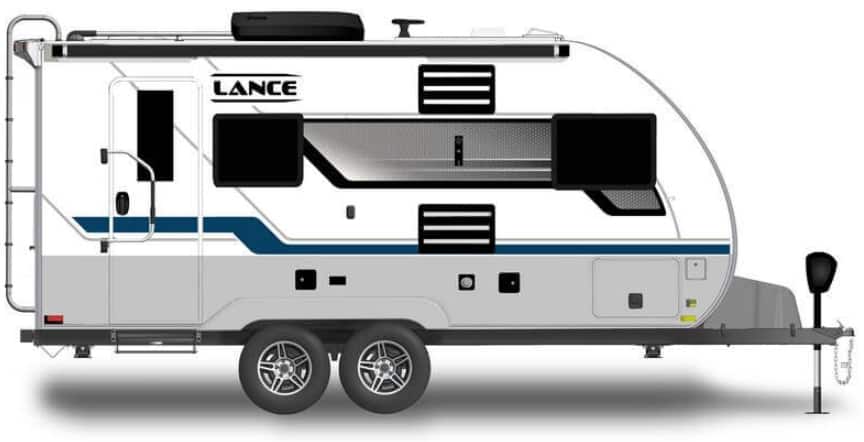
Definitely one of the best travel trailers in 2023 (and for many years prior), Lance Camper models are renowned for their quality construction and thoughtful design. Crafted with lightweight yet robust aluminum-framed bodies, and insulated, laminated walls, Lance Camper trailers are designed to endure the elements. Their sturdy construction make them easy to tow with a variety of vehicles, from mid-sized SUVs to full-sized trucks.
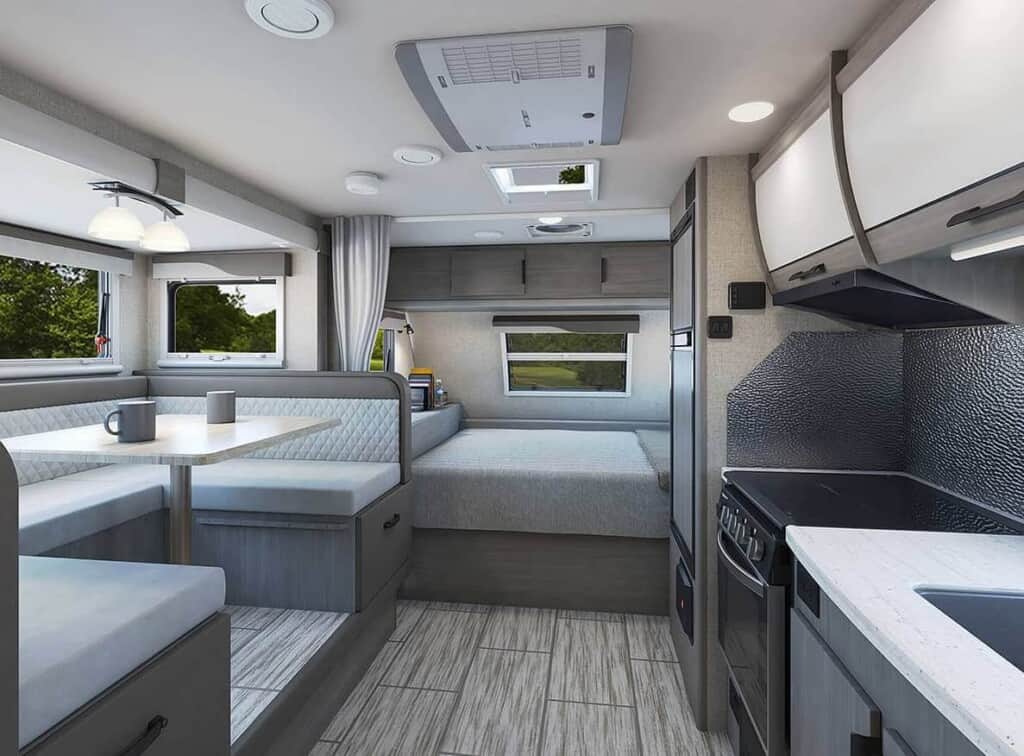
Lance is confident about their RVs. In addition to the 1-year limited warranty on every trailer or truck camper they make, the company also offers a 2-year structural warranty on all models. Overall I consider Lance one of the Top 5 best travel trailer brands in the industry.
What I Like About The Lance Camper 1685
Of the 12 models of travel trailers Lance Campers makes in 2023, I like the 1685 model est. There are several reasons. The 1685 is one of their lightest travel trailer models, featuring a dry weight of just 4,690 pounds. The interior is roomy and has lots of storage space available, and the floor plan is intelligently designed and laid out for maximum space efficiency. It includes a wet bath which I have stated before, is one of my personal preferences in any RV we buy.
Lance Camper 1685 Specifications
Gvwr: 6300 lbs, gross dry weight: 4690 lbs., hitch dry weight: 575 lbs., overall length: 21’5”, exterior height: 10’2”, convertible dinette bed: 54” x 78”, fresh tank: 45 gal., grey tank: 40 gal., black tank: 40 gal., refrigerator: 6 cu. ft..
For a small travel trailer, the Lance Camper 1685 is outfitted with generous holding tank capacities. This reduces the frequency of water refills and dump station visits.
Lance Camper 1685 Floor Plans & Specs
#8. shasta rv 18fq.
A division of Forest River, Shasta travel trailers have been a reliable companion for road travelers since 1941. If you’ve been camping a long time, the toaster-like look of the original Shaster brings back memories. What I love about Shasta trailers is they’re a great buy for the money.
Shasta trailers offer a wide range of towing capacities. Because these campers are crafted with a sturdy, lightweight aluminum exterior, they are durable but don’t add extra weight. Whether you already own a large truck for towing, or a family SUV, these campers are a great choice for anyone just starting their RV journey. Experienced RVers looking for an upgrade also find them a great fit.
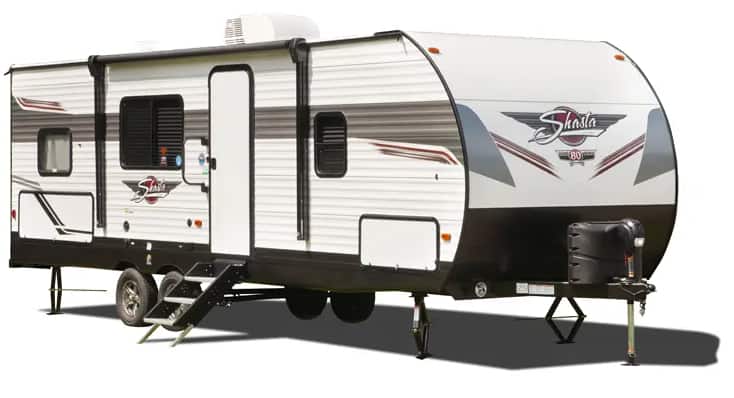
Why You Should Consider the Shasta 18FQ
Over the years, Shasta has trimmed their travel trailer line to just the Shasta model, which is available as a typical pull-behind and a travel trailer tow hauler. The pull-behind is available in a whopping 14 different floor plans. Of all those plans, my favorite is the 18FQ.
The 18FQ is very well laid out. Stepping inside, you can’t help but appreciate the attention to detail. Kitchens come equipped with a three-burner cooktop, a generous refrigerator, and a microwave oven, giving you all the conveniences of a home kitchen on the road. The 18FQ includes a 60″ x 74″ bed mattress with overhead storage space above and a clothes wardrobe on either side. It has a dry bath with a separate toilet and shower, medicine cabinet and a linen closet.
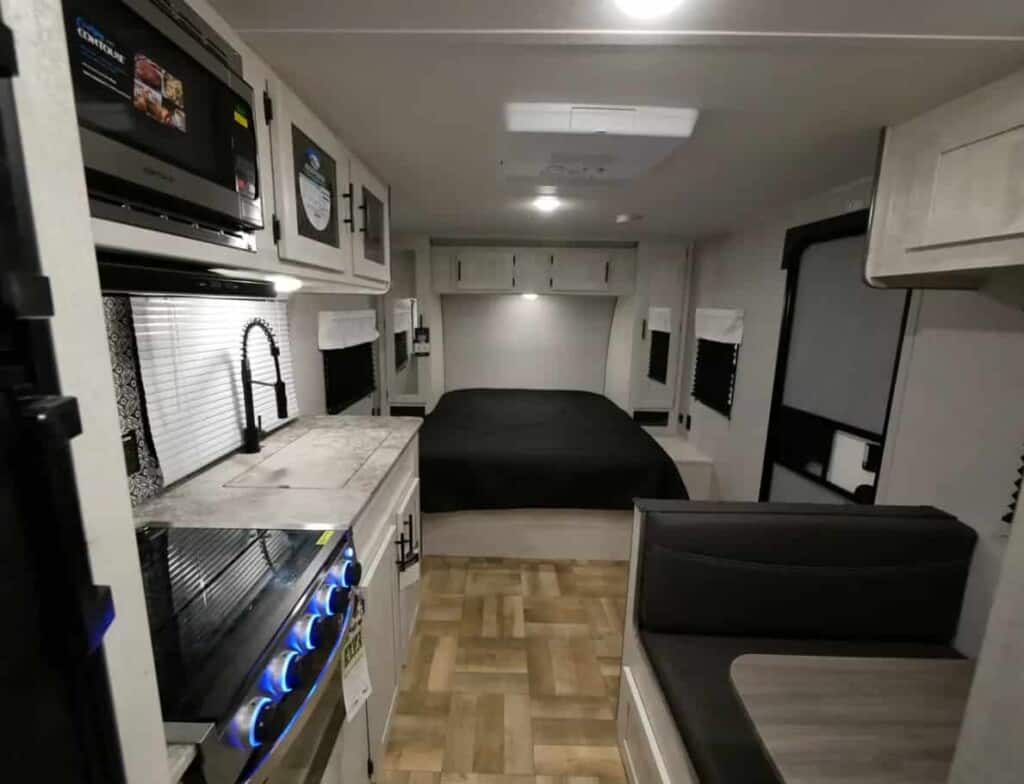
Shasta 18FQ Specifications
Gvwr: 5,050 lbs,, gross dry weight: 3,489 lbs., hitch dry weight: 375 lbs., overall length: 23’1”, exterior height: 10’6”, r-7 fiberglass insulation in walls, floor and roof, .024/.030 aluminum exterior skin, black tank: 30 gal., 3-burner cook top stove with glass cover.
Comfortable sleeping arrangements, quality upholstery, and thoughtful layouts in Shasta trailers set up a homely environment that helps you relax after a day of exploration. You’ll keep comfy in any season with the 18FQ’s efficient climate control system, featuring ducted heating and optional air conditioning units. If you’re in search of a reliable, value-packed travel trailer that can match your love for the open road, a Shasta travel trailer is worth considering.
Shasta RV 18FQ Floor Plans & Specs
#9. jayco jay flight slx.
With over 50 years of industry experience, Jayco has been one of the better brands in the RV industry. They have a loyal following and have always been very responsive to their customers. In 2016 Jayco was purchased by Thor Industries, which owns Airstream, among many other companies. Jayco’s quality, service, and customer responsiveness remain intact after the purchase by one of the world’s largest RV industry manufacturers.
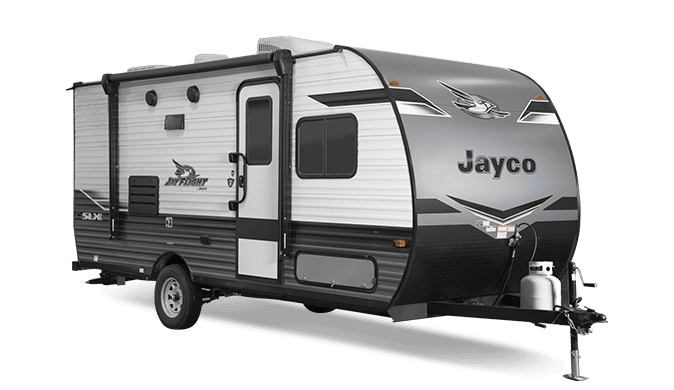
he Jay Flight SLX series is one of Jayco’s top-selling lines. These campers tick all the boxes for both beginner and experienced RVers, by making travel trailers that are easy to tow, durable, and feature-packed.
Why I Like The Jay Flight SLX
Of all the travel trailer models Jayco manufactures, I prefer the Jay Flight SLX. First off, it’s not a huge camper and very light for its size. This makes the SLX very manageable when it comes to towing. In 2023 the Jay Flight SLX is available in 5 floorplans. The floorplan choices offer something for every RVer, including bunkhouse and queen bed walk around models. Two models have slideouts.
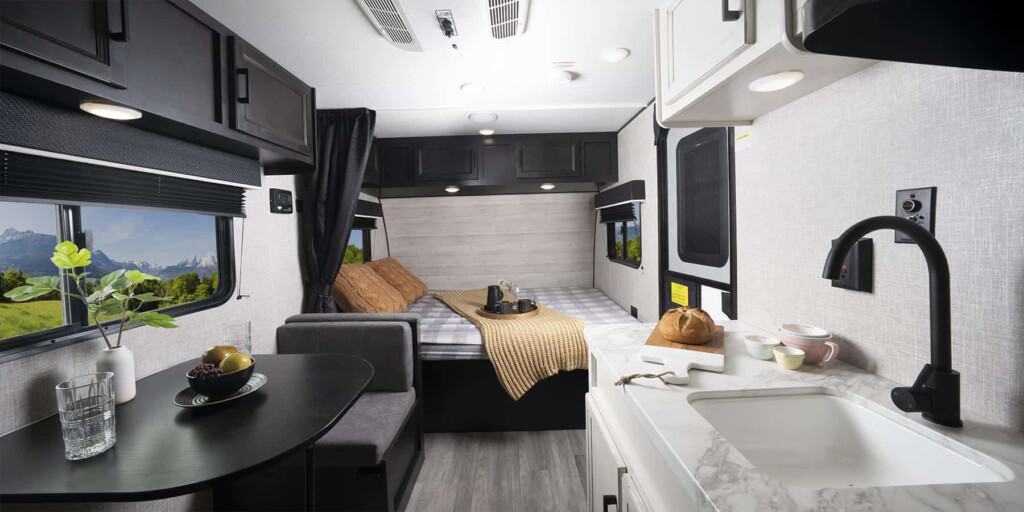
Some of the models feature a Simmons queen-size mattress which is a very comfortable camping mattress. I like that every Jay Flight SLX features a dry bath which is always nice. The bunk beds included in some models have a 4-inch mattress and a weight capacity of 300-pounds.
The galley has standard features such as two-range burners, a three cubic-foot fridge, a microwave, and solid-surface countertops. Chances are you are going to find a plan that works for your camping needs
Jayco Jay Flight Specifications
Unloaded vehicle weight: 2,415 – 2,890 lbs., cargo carrying capacity: 615 – 860 lbs., gross vehicle weight rating: 2,995 – 3,750 lbs., exterior length: 16′ 6″ to 21′ 8″, exterior height w/ a/c: 111 – 1/4″ to 111- 3/4″, interior height (living area): 73″, magnum truss™ roof system & diflex ii material, wall-mounted 8,000-btu a/c, grey tank: 20 gal., black tank: 20 gal., 2-burner cook top stove with microwave, 7 cu. ft. gas/electric refrigerator.
The Jayco Jay Flight SLX offers a perfect entry point for beginner RVers, and a refreshing alternative for more experienced ones, thanks to its balance between ease-of-use, comfort, and construction quality.
Jayco Jay Flight SLX Floorplans & Specs
#10. forest river alpha wolf.
The Forest River RV brand is one of the largest RV manufacturers in the United States. Their Cherokee line of Alpha Wolf travel trailers are the leader of the pack. That’s because when it comes to construction, the Alpha Wolf doesn’t cut corners. Built on a rugged and lightweight aluminum frame, Forest River designs Alpha Wolf for easy towing. They meet the needs of a variety of vehicles, from pick-ups to larger SUVs.
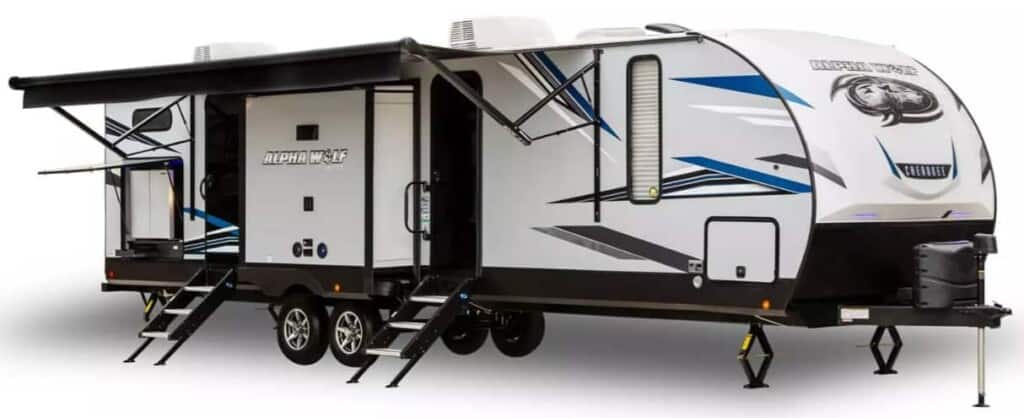
To protect against the elements, Forest River makes the Alpha Wolf with a protective exterior of glossy fiberglass and sealed underbelly for all-weather camping. An oversized, lighted, and adjustable power awning extends your living space outdoors. There’s an outdoor kitchen with an ice maker, perfect for entertaining, cooking and dining.
Want more reasons to look into Alpha Wolf travel trailers? Get the insiders story from one of the best owner forums in the industry, Forest River Owner’s Forums .
Cherokee Alpha Wolf Specifications
In 2023 you have seven floorplans to choose from with this camper. Here is a partial list of the line-up’s specifications:
Hitch Weight: 570 lbs to 1,026 lbs
Dry weight: 5,795 lbs to 6,780 lbs, cargo carry weight: 1,246 lbs to 1,805 lbs, exterior length: 31′ 6″ to 36′ 8″, total exterior height w/ a/c: 11’0″, exterior width: 96″, gray water tank: 35 to 70 gal., black water tank: 35 to 70 gal., fresh water tank: 49 gal., 1x engineered wood “supertruss” roof structure with 3/8″ decking, “toughbend” rigid skirt metal design.
Alpha Wolf trailers offer a variety of features that can be tailored to your camping needs, and of course budget. Check out the Alpha Wolf 2023 models for a list of floor plans and related options.
T he Forest River Alpha Wolf Floor Plans & Specs
Best travel trailer brands summary.
So there you have it, ten of the best travel trailer brands in the 2023 RV market . Every brand has its advocates as well as critics. The crucial takeaway here is to do your own in-depth research.
Choosing the ideal travel trailer brand isn’t a task to be rushed. Buying the best RV needs time and thorough investigation. But rest assured, the reward of reliable, enjoyable RV travel makes the effort worthwhile.
A final note: don’t forget to evaluate the dealership as well as the brand. The RV dealer is your main point of contact for post-purchase service, and RV warranty work that might be required. Ultimately, the best travel trailer will align with your individual camping needs, accommodate your family, and fit within your budget.
If you enjoyed this post Please Share:
Related posts:.

The Best Trailer Tow Vehicle (That’s Not a Truck)

What is the Life Expectancy of a Travel Trailer?
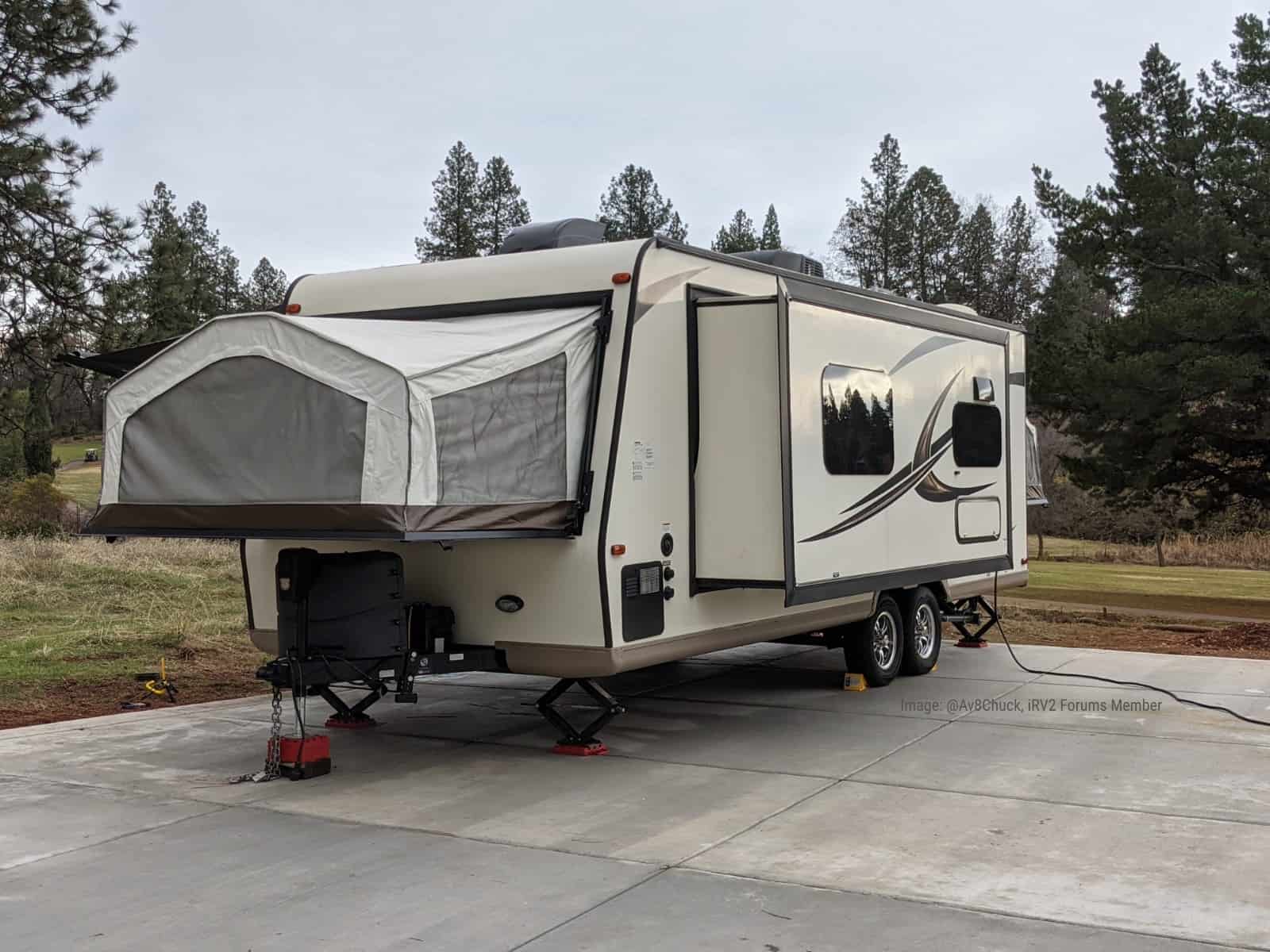
Expandable Travel Trailers: Why Hybrid Travel Trailers a Great Choice
About the author:.


This post may contain affiliate links or mention our own products, please check out our disclosure policy .
Top 10 Best Travel Trailers
Published on October 29th, 2021 by Contributor, Let's RV This post was updated on November 15th, 2021
Shopping for a travel trailer can be difficult, especially if you’re new to RVing or have very little experience. The RV industry puts out hundreds of different travel trailer brands, models, floor plans and of course features.
Aside from forums and a few articles scattered throughout the internet, there isn’t a lot of information readily available as to which manufacturers offer the best travel trailers and brands; but who has the time to sift through thousands of different posts and articles looking for the right information?
So, what manufacturer really makes the best travel trailer brand? Even with thorough research, this can be a difficult question to answer.
DON’T MISS OUT ON LET'S RV UPDATES
Sign up for the newsletter today.
Please enter a valid email address.
An error occurred. Please try again later.

Thank you for subscribing to the Let's RV newsletter, keep your eye on your inbox for updates.
We’ve sifted through the necessary information and have compiled a list of, what we believe to be, the top rated travel trailers for RV camping.
There is a commonly used saying in the RV industry, “Buy your second travel trailer first.”
Once you decide that you want to buy a travel trailer, you have hundreds if not thousands of options to choose from including brands and models, the number of people the travel trailer sleeps, the floor plan and the features each brand has to offer. For example, if you plan on camping in the winter, you’ll want a travel trailer with a cold-weather package. These are the 10 best travel trailers.
1. Airstream Classic
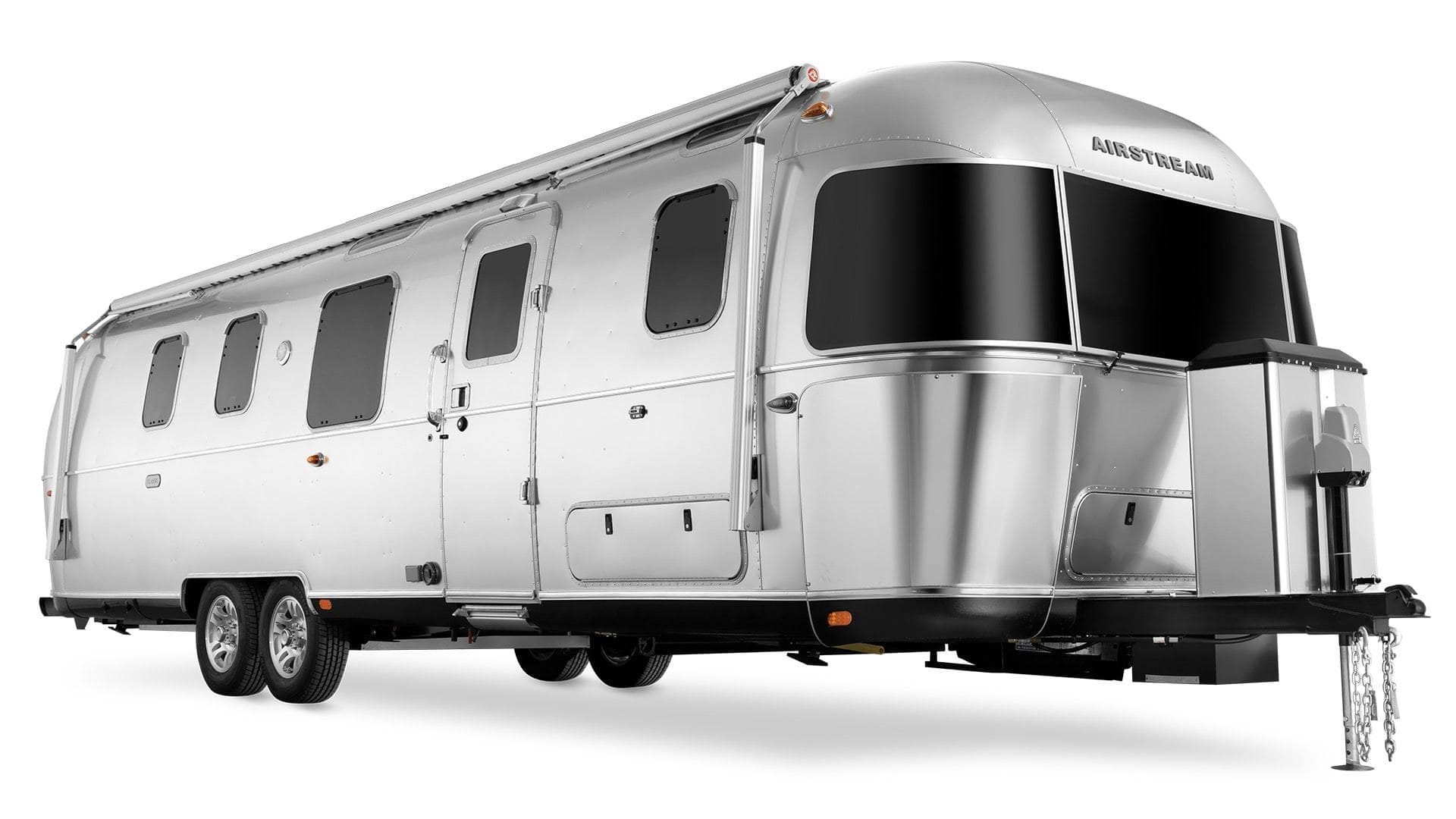
The Airstream Classic comes in two sizes: 30 feet and 33 feet. Both have similar floor plans with either twin beds or a queen bed in a separate bedroom.
Enjoy the classic round tube-style travel trailer with all of the newest amenities, including a luxurious bathroom, a kitchen with top-of-the-line appliances and a touch-screen control panel.
Standard equipment includes:
- A 270w solar package with an interior monitor;
- A flush system for the black tank to make cleaning the tank easier;
- A heated and insulated enclosed underbelly so you can stay warm and comfortable during the winter; and
- A rearview monitoring system to help you back up.
2. Northwood Arctic Fox
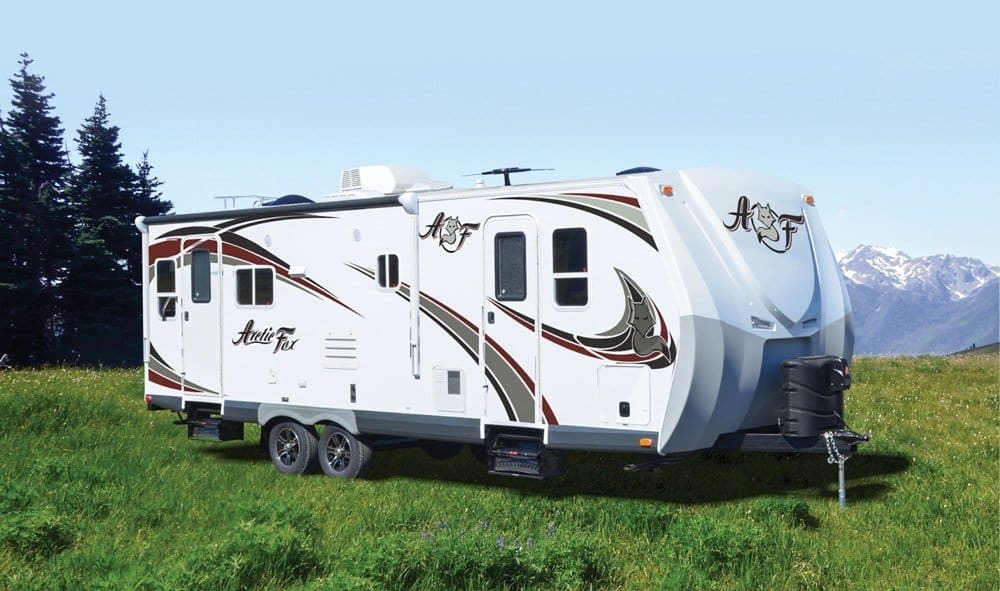
You have the option of choosing from six different floor plans when you chose the Northwood Arctic Fox travel trailer.
Floor plan sizes range from 22 feet to 32 feet. The 22-footer is the only model that does not have slideouts. Standard features include an off-road chassis, thick-walled, fully welded frame construction for durability, one-piece fiberglass exterior walls, four-season insulation, including R-18 ceiling insulation, and shocks on all four wheels.
- A 45-watt solar panel and a sidewall solar port to conserve your batteries and generator;
- A 12-volt power tongue jack to make hitching up easier;
- Night shades;
- Solid surface kitchen counter tops;
- A 10 cubic-foot fridge with a cold weather kit; and
- A built-in laundry chute.
3. Keystone Cougar
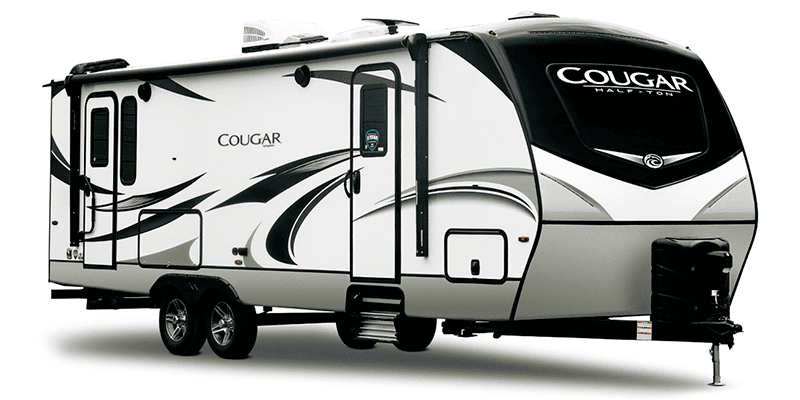
Keystone offers 13 different floor plans for their Cougar travel trailers, ranging from 22 to 34 feet long. All floor plans have good sized slides, which means more comfort and floor space so that you won’t feel cramped if you happen to get stuck inside on your camping trip.
The 22-footer sleeps up to four people and the 34-footer sleeps up to nine people. Enjoy a 7.5-inch command center master control panel, an auto-leveling system, and a climate guard package that keeps you comfortable, whether the temperature is near 0 or a smoldering 110 degrees.
- 3/8-inch walkable deck roofing;
- Seamless counter tops;
- A 15,000 BTU ducted air conditioner; and
- Insulated slide floors and underbelly.
4. Jayco White Hawk
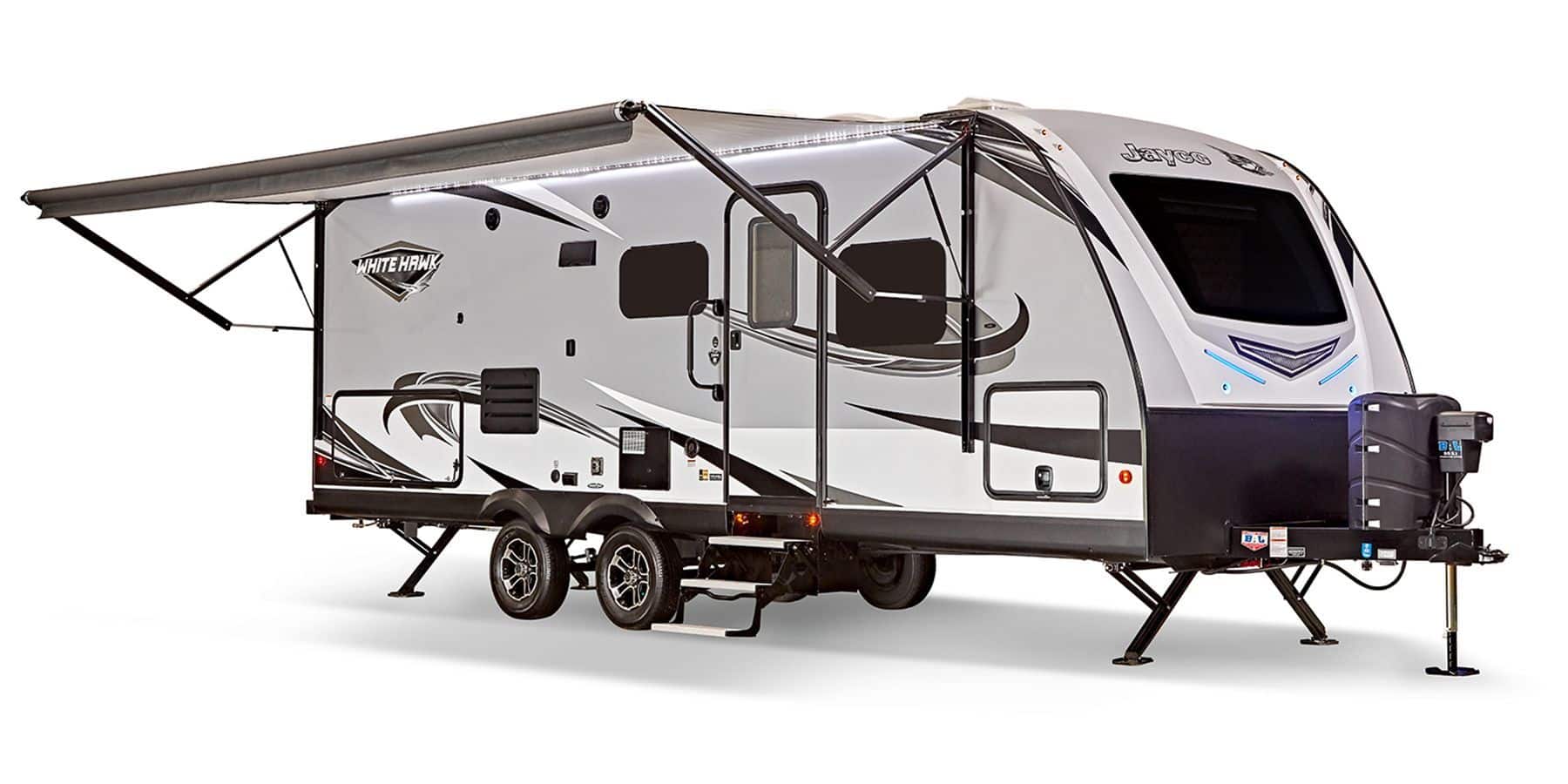
Choose from 12 floor plans ranging from 23 to 32 feet. All models have at least one slideout, making the Jayco White Hawk spacious for your family. The Customer Value Package and the Luxury Package are mandatory on any White Hawk model and include a 40- or 50-inch LED TV, 13,500 or 15,000 BTU air conditioning unit, a roof ladder, power awning, upgraded insulation in the enclosed underbelly and backup assist lighting.
- 5/8-inch tongue-and-groove plywood decked flooring for stability;
- Dark tinted windows made from safety glass;
- The JAYCOMMAND “Smart RV” system;
- Marine-grade exterior speakers; and
- Teddy bear “soft-touch” bunk mats in models with bunks.
5. Grand Design Reflection
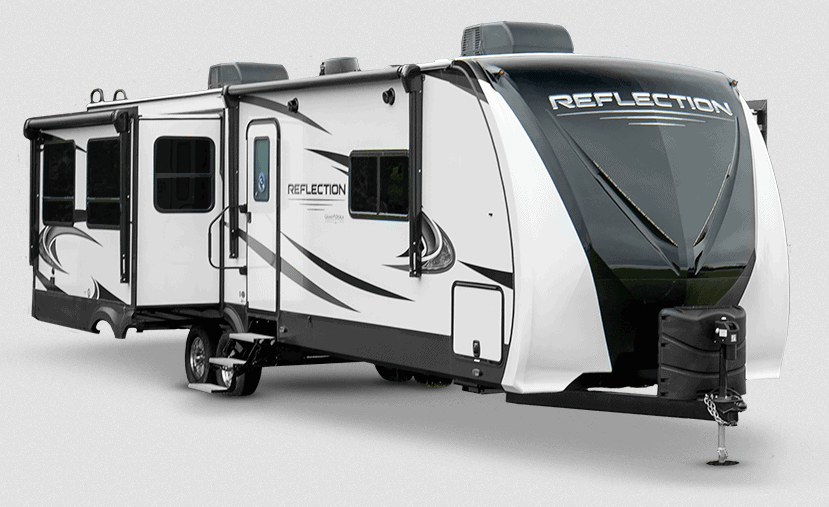
The Grand Design Reflection features three floor plans with 33, 37 and 38 feet. All three feature theater seating and a large 30-inch by 36-inch shower with a skylight. The entertainment center in all three models feature a 40-inch TV. The spacious bedroom has television hookups, which includes cable and satellite prep.
- A high-capacity water pump;
- Solid hardwood drawer fronts and residential panel cabinet doors;
- Panoramic slide room windows;
- LED lighting with motion sensors;
- Underbed storage;
- 5-inch truss rafters;
- A one-piece TPO roof membrane with an 18-year warranty; and
- Residential framed roof.
6. Forest River Wildcat Maxx
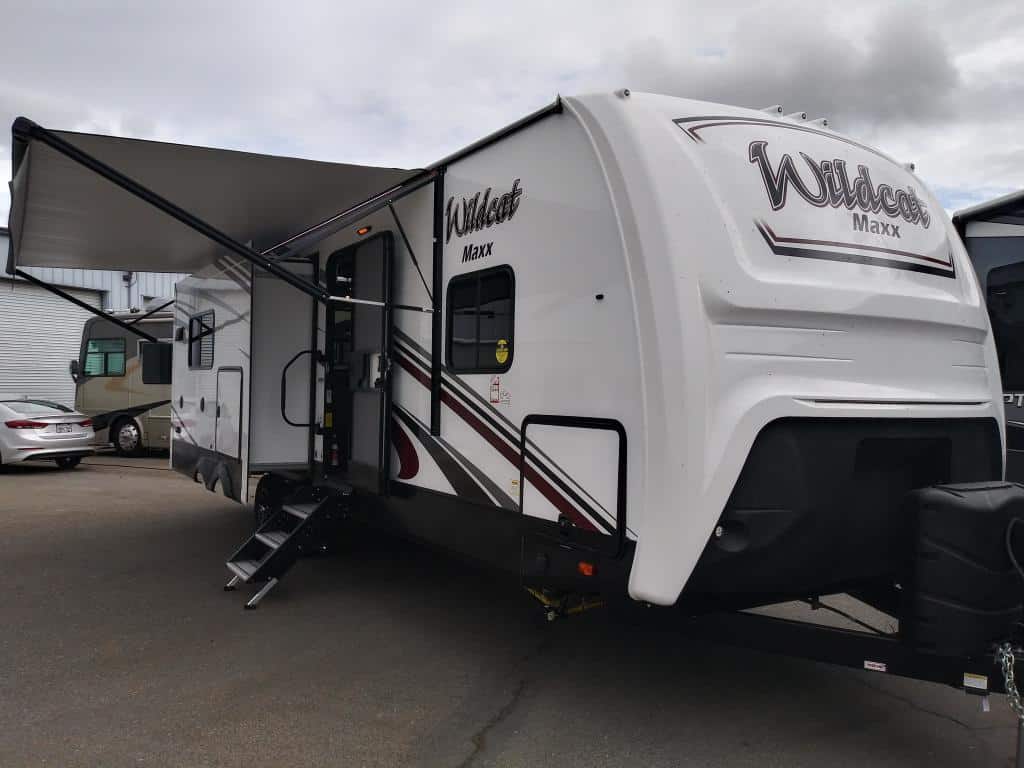
photo courtesy of DonsRV
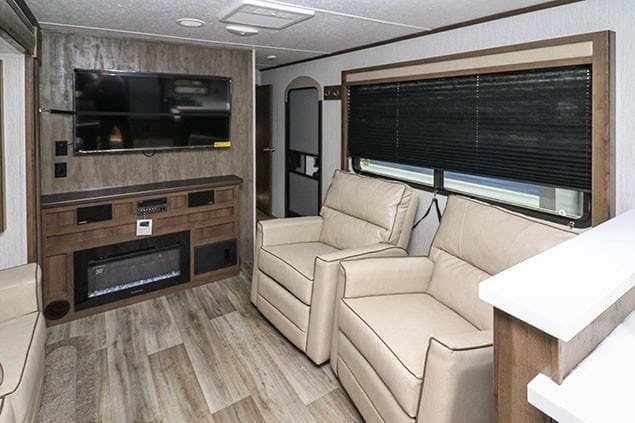
The Wildcat Maxx by Forest River has nine travel trailer floor plans for you to choose from. All floor plans feature at least one slideout so that you are not crowded while you are inside. The Wildcat Maxx features a heavy-duty I beam chassis and a one-piece roof membrane for stability and longevity. The interior height of all floor plans is 7 feet. Roof rafters are 16-inch on center and are 5-inch engineered and fabricated for longevity.
- R-7 fiberglass insulation and a 12-volt tank heater for each holding tank;
- R-10 high-density block foam insulatin in the side walls, including the slideout walls and ceilings;
- Vented attic;
- 35,000 BTU furnace; and
- The Strongarm Stabilizer Jack System.
7. Casita Heritage
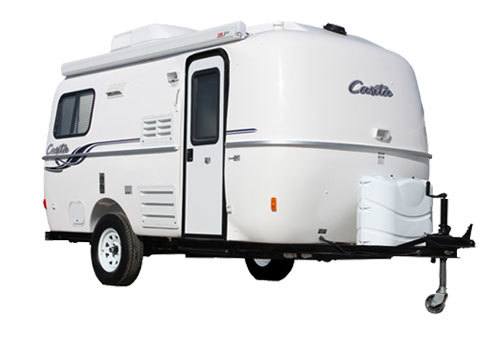
The Casita Heritage comes as a 16- or 17-foot standard or deluxe model. All models feature outside storage compartments, an automatic change-over regulator, LED running/stop/tail lights; deluxe insulation, wardrobe closets in the deluxe models, and custom wall material insulation.
Standard features include:
- A two-burner cooktop;
- A three-way fridge (4.0 cubic feet in the 17-footer and 1.9 cubic feet in the 16-footer);
- Sewer hose storage;
- GFI electrical circuits; and
- Smoke and LP gas detectors.
8. Heartland Mallard
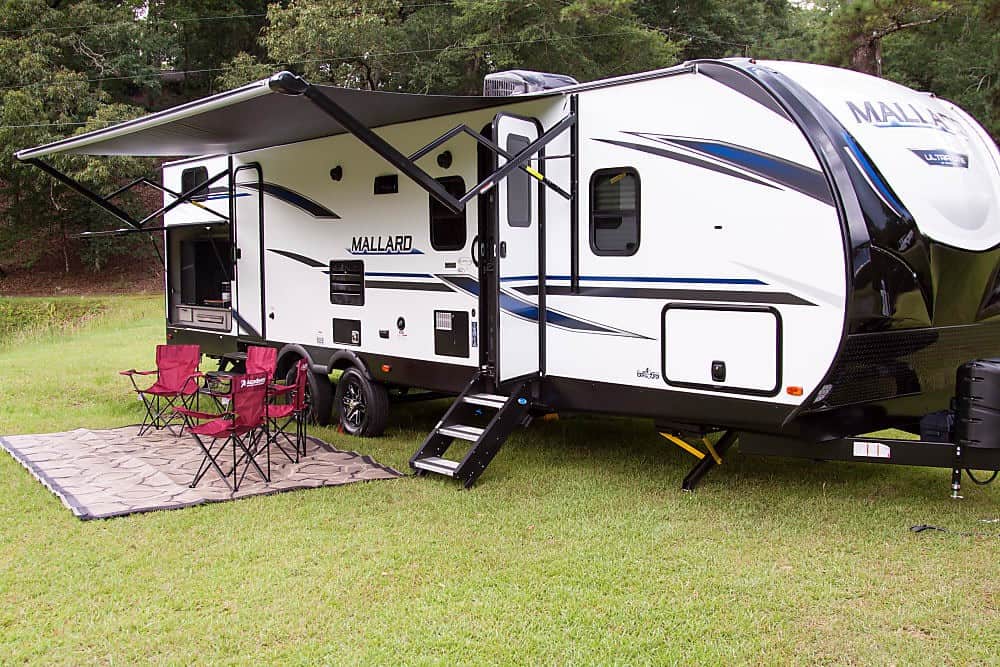
Photo courtesy of Outdoorsy
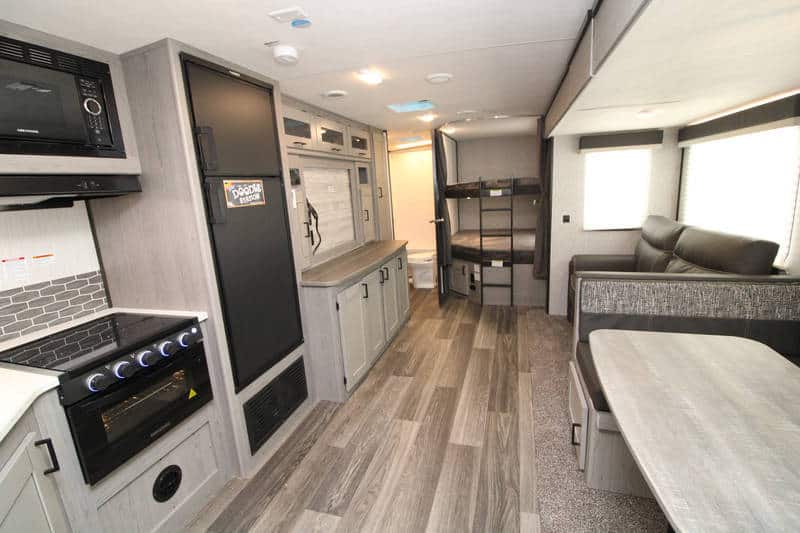
The Heartland Mallard has 16 floor plans for you to choose from, ranging from 22 feet through 40 feet. The smaller models sleep up to six while the largest model sleeps at least nine people. Furnaces range from 18,000 BTU in M185 to 30,000 BTU in the M335. The fridge runs on LP or electricity. All models feature king-size beds and King Kong sized pass-through storage.
- Power stabilizer jacks;
- A 4-inch fully walkable vacuum bonded roof;
- Power awning with LED lights;
- Tinted safety windows;
- An enclosed underbelly heated with forced air;
- Deep bowl kitchen sinks; and
- A skylight in the shower.
9. Dutchmen Coleman Lantern
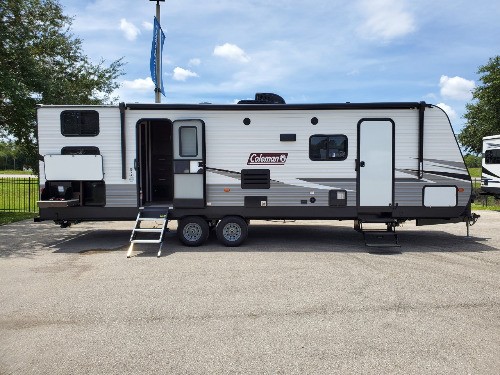
Photo courtesy of Camping World
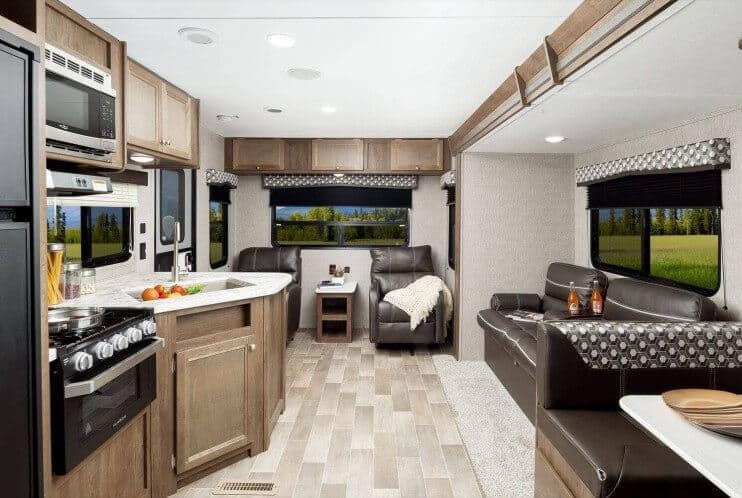
The Dutchmen Coleman Lantern gives you 17 floor plans to choose from, including three toy hauler models. All models have slideouts except the 251TQ. A 120-volt exterior outlet lets you plug in anything you need outside. The bunk beds have 12-volt USB power outlets. The dinette features extra storage.
- A foot pedal flush toilet;
- A solar power charging connection;
- Interior power command center; and
- A black tank flush system.
10. Keystone Hideout
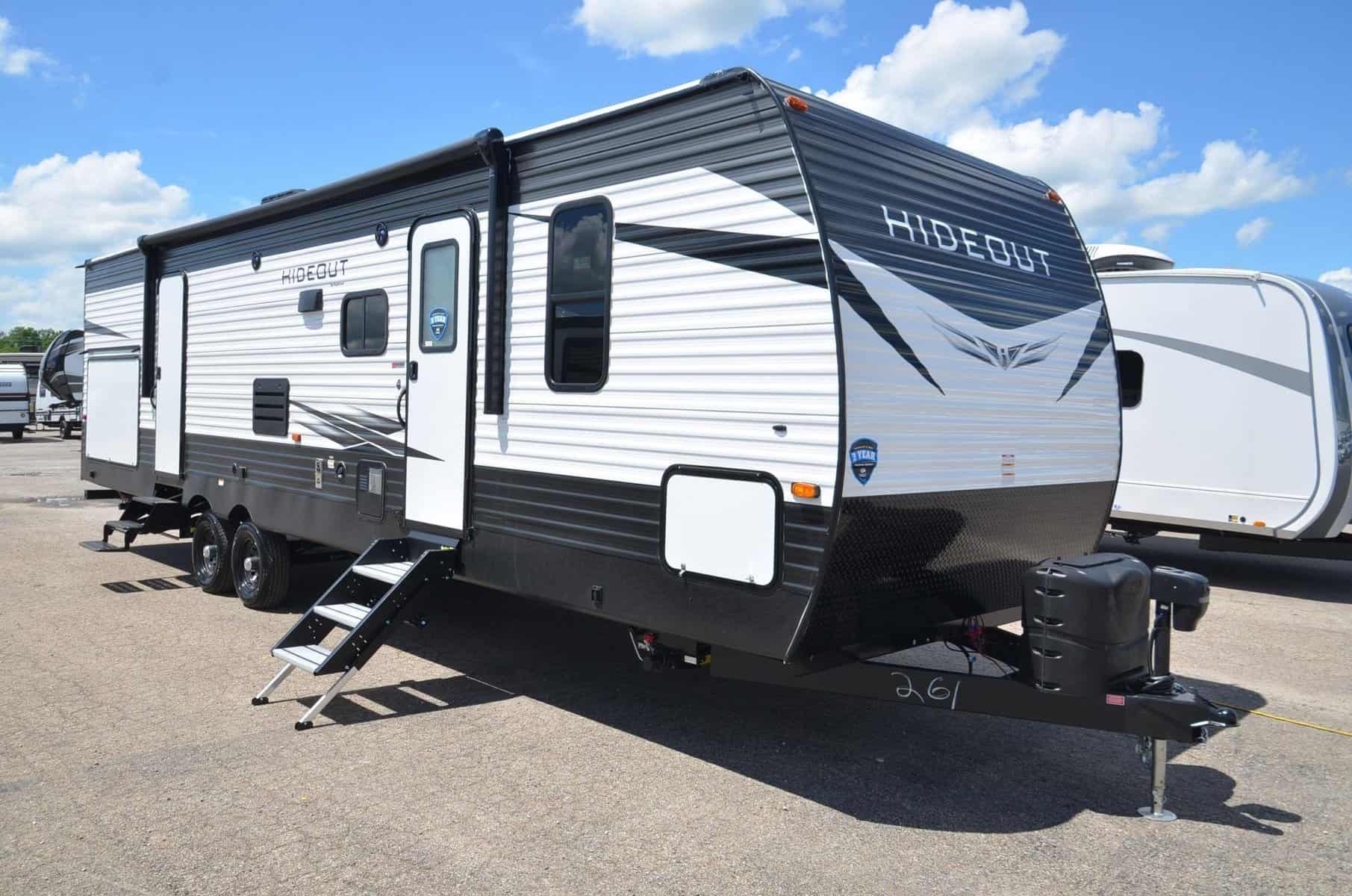
Photo courtesy of Holman RV
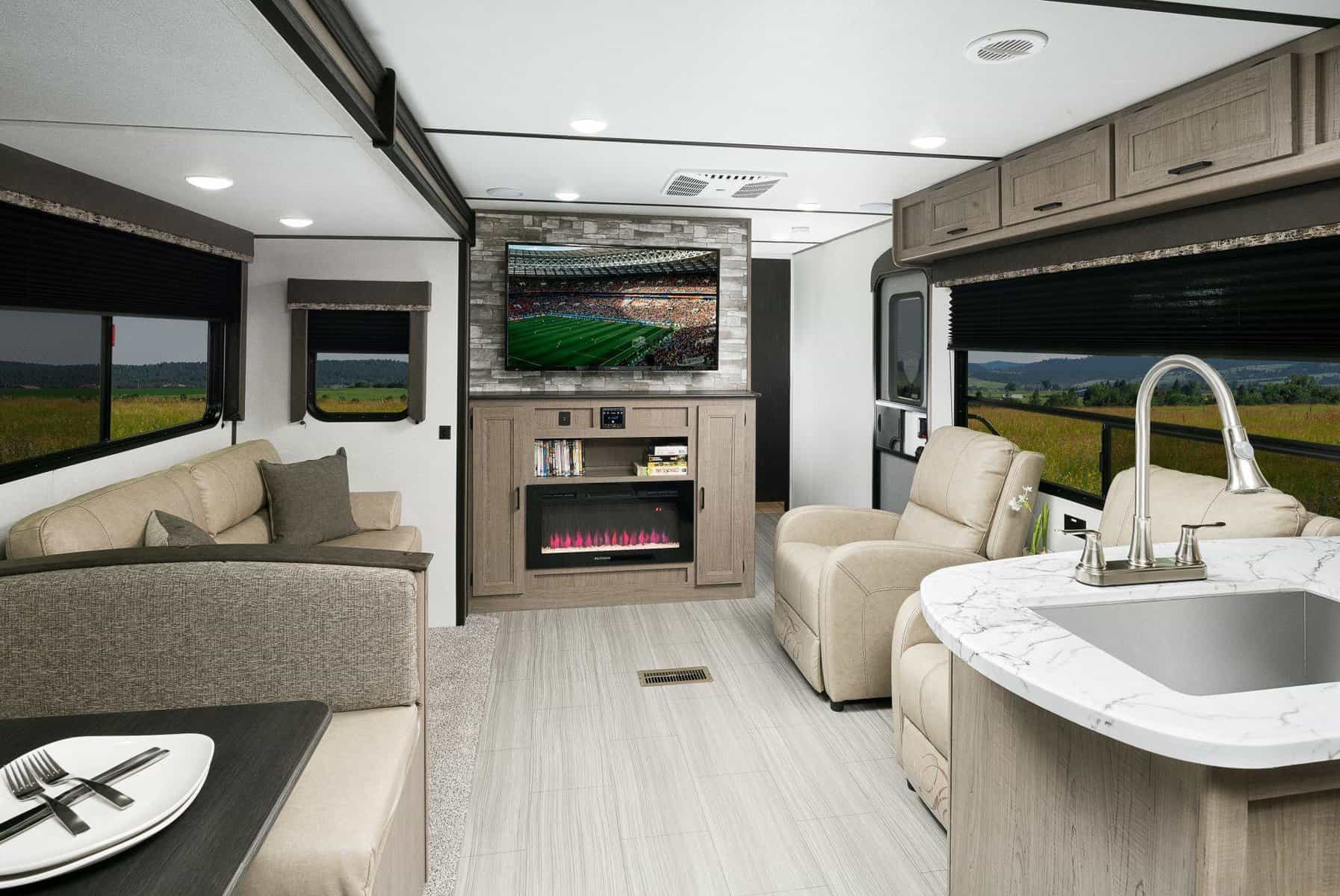
The Keystone Hideout has 37 floor plans for you to choose from. Many have slideouts to make the RV more spacious. But, if you are single or you are a couple that is just starting out RVing, you will find the RVs without slideouts very spacious. Enjoy features such as an exterior shower, exterior speakers, and on some models, an exterior kitchen.
- Bluetooth/DVD/CD/MP3 player;
- Monitor panel;
- 50-amp service;
- High-rise kitchen faucet;
- 20,000 BTU furnace;
- 8,000 or 13.5k BTU air conditioner;
- Porcelain foot-flush toilet;
- Hidden laundry chute;
- Smoke and CO2 detectors;
- Zone switch lighting;
- A central vacuum; and
- Hidden hinge pantry.
Share this post:
Related posts:.
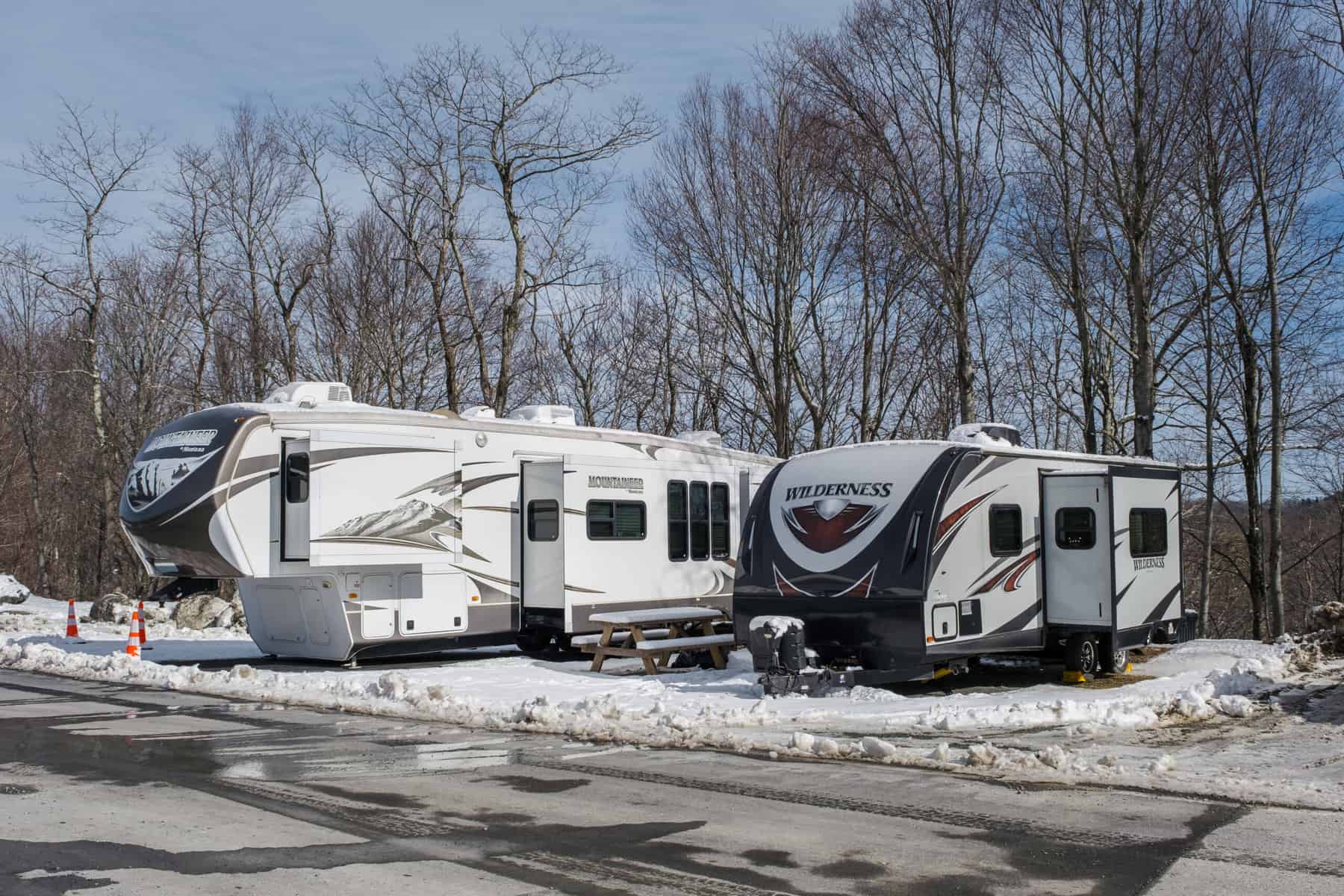
The Truth About Four Season Travel Trailers
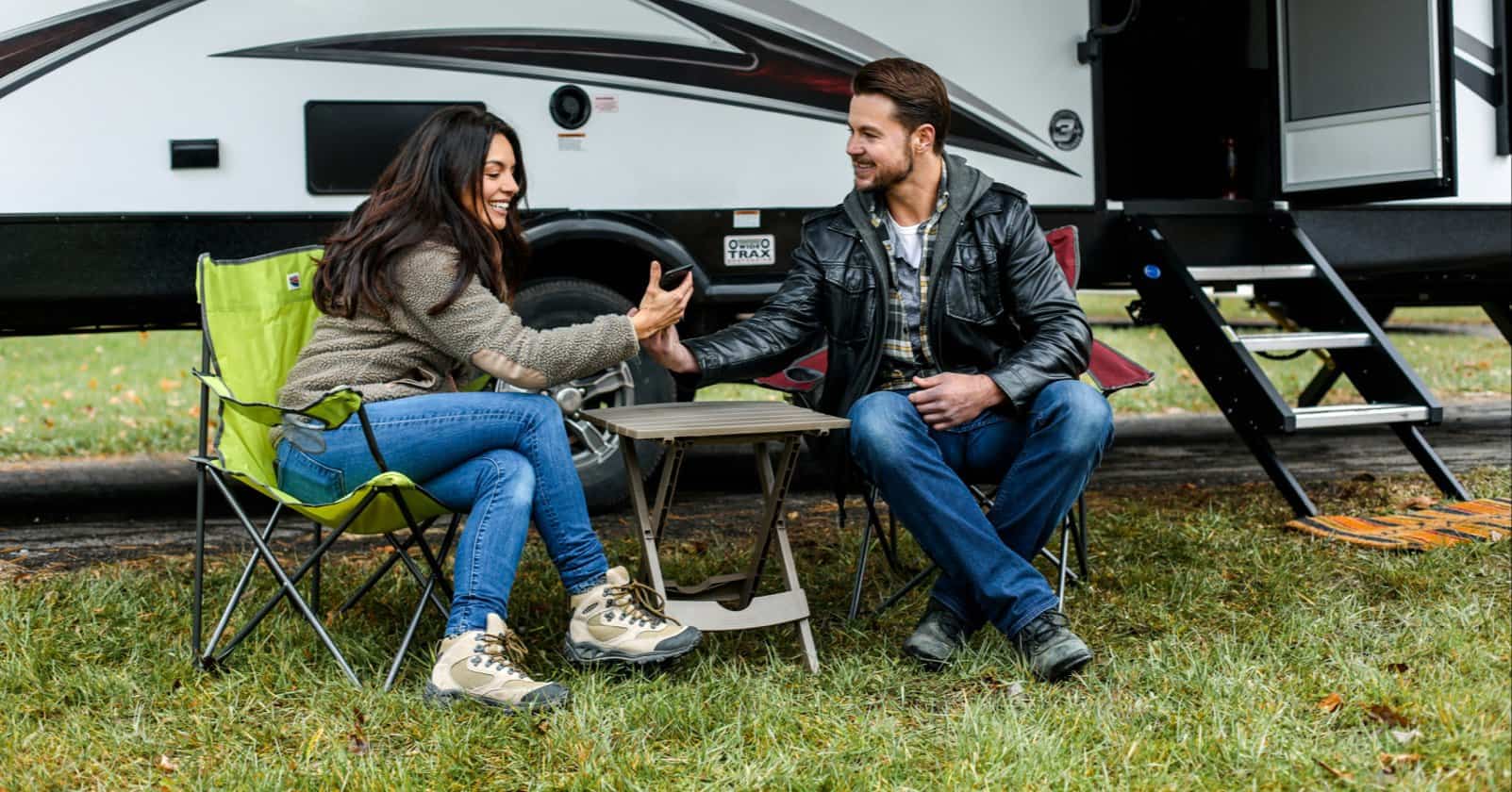
Our Top Lightweight Travel Trailers with Full Bathrooms in 2024
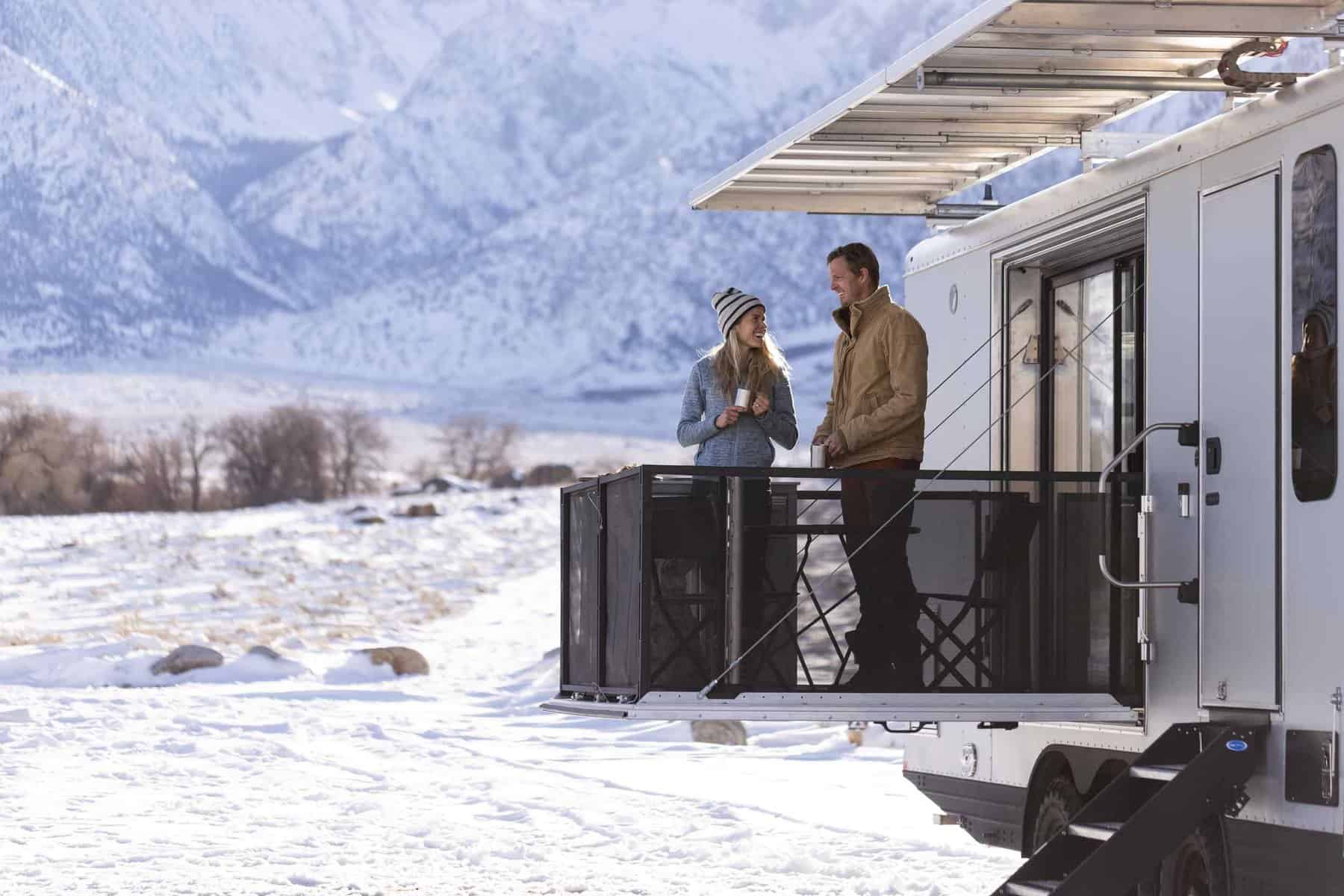
2024’s Best Small Camping Trailers
About the author:, leave a comment cancel reply, welcome please follow these guidelines:.
- Be kind and respectful.
- Keep comments relevant to the article.
- Avoid insults, threats, profanity, and offensive remarks.
- Refrain from discussing gun rights, politics, or religion.
- Do not post misleading information, personal details, or spam.
We may hide or remove comments at our discretion.
I have read and accepted the Comment Guidelines and Privacy Policy *
This site uses Akismet to reduce spam. Learn how your comment data is processed .
Follow Let's RV
- Search Please fill out this field.
- Manage Your Subscription
- Give a Gift Subscription
- Newsletters
- Sweepstakes
13 Best Travel Trailers for Road Trips and Camping
Hit the open road and camp in comfort with the best travel trailers.
Elizabeth Rhodes is a special projects editor at Travel + Leisure , covering everything from luxury hotels to theme parks to must-pack travel products. Originally from South Carolina, Elizabeth moved to New York City from London, where she started her career as a travel blogger and writer.
:max_bytes(150000):strip_icc():format(webp)/elizabeth-rhodes-25083778bc654f69b30ce8417affc82c.jpg)
With so many brands, sizes, and amenities to choose from, it can be difficult to know which travel trailer is right for your next adventure in the great outdoors . Paige Bouma, executive vice president of sales and operations of Trader Interactive, knows a thing or two about RV travel. She has been taking RV vacations with her family for years, often traveling for 30 weekends a year. According to Bouma, towable RVs (like travel trailers) are great for camping , and there are a number of choices to consider. "Families looking to experience the great outdoors have several choices when it comes to trailers they can tow behind their car, SUV, or pickup," she said. "The traditional travel trailer comes in a variety of lengths and weights, and provides a multitude of amenities and a sleeping capacity for any size family to go camping."
With this in mind, we've rounded up 13 of the best travel trailers so you can plan your next road trip . Whether you're a first-timer looking for tips to get started or a frequent traveler trying to decide on your next RV rental , this list includes fan favorites like Airstream, Winnebago, and Jayco travel trailers, ranging from luxury vehicles to small and lightweight campers.
1. Airstream Classic Smart Trailer
Airstream travel trailers are among the most luxurious, spacious, and advanced towable RVs. They say not to mess with a good thing, but Airstream's new and improved Classic Travel Trailer is an exception. This elegant and roomy travel trailer is best for long trips, with lots of space and innovative amenities, like a heated bathroom and handcrafted cabinetry. Now, this iconic trailer has smart-control technology, allowing you to adjust the lights, awning, and air-conditioning as well as monitor propane, battery, and tank levels from your phone. This trailer can be between 30 and 33 feet long and can sleep up to five people with four different floor plans. Airstream is currently working on more improvements for future RVs, including off-road capabilities and advanced electric vehicle compatibility.
2. Winnebago Micro Minnie
Winnebago travel trailers are beloved in the RV world, and the Winnebago Micro Minnie is one of their most popular options, even winning the RV News Top Lightweight Towable Trailers Award in 2021. This compact, seven-foot-wide trailer offers a number of floor plans to choose from, with features like a spacious kitchen with a sink, a double-door refrigerator, a microwave, and a cooktop. Each floor plan also has windows designed for cross ventilation. With a starting weight of 3,360 pounds , the Micro Minnie is the perfect tow for electric vehicle owners. It also comes solar-ready, with a spacious, walkable roof. With certain packages, the trailer even includes off-road tires, perfect for the boondock explorer. Once you've settled into your campground, take the fun outside with its patio speakers and a power awning featuring LED lighting.
3. Jayco Jay Flight
The Jayco Jay Flight has been a family favorite for years. This travel trailer has a large range of floor plans, offering options with luxurious kitchens featuring stainless steel appliances, comfortable seating, spacious lounge areas, and more. Jayco's elite package offers solar prep, which, depending on your rig, comes with corresponding batteries, inverters, and Go Power! kits for sidewall and roof-mount prep. It's important to keep in mind that certain floor plans may exceed an electric vehicle's towable weight limit. Jayco prides itself on its craftsmanship and construction so you know this trailer can handle any adventure you embark upon.
4. TAB Teardrop Camper
If you're looking for a small travel trailer, the TAB Teardrop Trailer might be the best choice for you. This nuCamp RV is perfect if you're traveling alone or with a partner. It is compact, but still has amenities such as a wet bath, a kitchen, and a dining area that converts to beds. Available with the TAB Teardrop Trailer is the Boondock Package, which includes everything for your off-roading needs, including the Boondock Aluminum Platform, aggressive off-road tires, heady duty entry door step, and much more. The Convenience Package comes with a solar roof package, perfect for electric vehicles.
5. Happier Camper Traveler
The new, lightweight Traveler trailer from Happier Camper has vintage vibes and flexible, modular seating to accommodate the needs of anyone hitting the road. This travel trailer has a floor grid and Adaptiv components so you can customize your space with areas for sleeping, dining, lounging, and more. Plus, it's towable by standard cars so you don't need a large SUV. The Happier Camper Traveler is 17 feet long with 85 square feet of walkable floor space — the layout is up to you, thanks to the modular design.
6. KZ Durango Half-Ton
The KZ Durango Half-Ton RV is a fifth wheel trailer that offers eight unique floor plans, complete with a washer and dryer, maple-glazed farmhouse-style carpentry, an electric fireplace, a double-door refrigerator, and so much more. KZ offers an "Off The Grid" package, which includes solar panels for their already solar-ready roof. The Durango Half-Ton is perfect for full-time traveling or a weekend getaway with the whole family.
7. Casita Spirit
As far as lightweight travel trailers go, the Casita Spirit is a great option for families on the go. This trailer can sleep three to five people, with dinettes that convert into double and single beds. The Spirit comes in two 17-foot models, while add-on options include roller shades, a furnace, and more. Casita offers a plethora of internal and external add-ons, including — but not limited to — solar panels, a surge protector, and an Anderson "No Sway" Distribution Hitch, as well as a maintenance tool kit to be used inside or outside the trailer.
8. Keystone Hideout
Keystone touts the Hideout as a perfect travel trailer for first-timers. The Hideout has several sizes and floor plans, and it comes with a three-year limited structural warranty, LTE and Wi-Fi antenna, tinted windows, high-quality kitchen appliances, and more. Most floorplans are towable by standard cars, however, the model's heft makes it durable to sustain off-road bumps and swerves. The Hideout features a walkable roof and multiple options for SolarFlex™ solar panels, providing high-quality energy great for electric vehicles.
9. Forest River Alpha Wolf
The lightweight Alpha Wolf trailer from Forest River's Cherokee line was named "Best in Show" by RV News in 2018. According to the Forest River site, the Cherokee Alpha Wolf "offers the best mix of floor plan diversity and top-shelf amenities while at the same time creating a tougher, lighter, better insulated shell." The interiors of this travel trailer look beautiful and modern while providing areas to cook, relax, and dine. Alpha offers multiple packages to personalize your trailer experience, including the Juice Package for all your solar needs.
10. Grand Design Reflection
If you're looking for a towable luxury RV with great value, the Reflection by Grand Design might be right for you. This trailer offers a beautifully designed kitchen, a spacious shower with a glass door, and more. The RV comes with a mandatory Solar Package, 4-Season Protection Package, Peace of Mind Package, and the Ultimate Power Package, with additional add-on packages available to make your Reflections RV experiences as comfortable as possible. This RV is great for owners of electric SUVs and for those who wish to go off-road.
11. Opus OP 15 Hybrid
Looking for a spacious, lightweight, off-road trailer? Then look no further than the Opus OP 15. This hybrid, family-friendly trailer comes fully loaded with a king-size bed, twin bunk beds, an indoor bathroom, a four-burner stove, off-road and alloy tires, and solar panels. The interior is decorated with bamboo cabinetry and features 6'6'' of headroom. The Opus OP 15 was designed specifically to be an off-road, off-grid getaway while remaining easy to use for families and first-timers.
12. Alto Series F2414
Alto's Series F2414 travel trailer is designed to make hitch traveling with an electric vehicle easier than ever before. The trailer comes packed with four beds that can be converted to dining/lounge areas, a full kitchen, a small bathroom, and furniture that can be moved for outdoor fun. It sleeps five comfortably, six with the purchase of an additional electric bed. The interior design takes some inspiration from European trailers while maintaining an all-American flair. Solar panels can be purchased for an additional cost. The F2414 is towable by most SUVs.
13. Polydrops P17A
If you're looking to travel in something high-tech that will undoubtedly turn heads, look no further than Polydrop's P17A1 trailer. This California-made vehicle is specifically engineered to be the most aerodynamic travel trailer on the market. Its unique design and lightweight frame lend it to unlimited possibilities. The P17A's minimalist design comes fully insulated with built-in solar panels, storage, built-in speakers, a kitchenette, an awning, a control panel (for LEDs, air conditioning, chargers, and more), and a full-size mattress. This trailer was made to work hand-in-hand with electric vehicles, with its design specifically created to use less electricity, allowing for more travel and less charging time. Though one of the smaller trailers on this list, the P17A1 is sure to impress even the most traditional trailer travelers.
Related Articles

Best Travel Trailers – Complete Buyer’s Guide
Also referred to as towable RVs, travel trailers offer you the comfort of your home while you are on the road. However, choosing the best travel trailer for yourself from a variety of thousands can be difficult.
They're perfect for a trip to the beach, mountains, or just to get away from the city and chill in an RV park. Whatever the reason, a travel trailer will be one of the best decisions you can make for your family’s enjoyment.
Travel trailers differ from motorhomes in that they're towable. However, they're similar design to 5th wheels , and although they're not as luxurious, they can be as spacious as and much cheaper than fifth wheels .
Today, there are so many types of trailers, so you need to be careful when looking to buy one. There are a number of things to consider, and it's always a good idea to rent the model you intend to buy beforehand.
That said, to help you select the best travel trailer for your next road trip, this article will be of great help. You will also find a helpful buying guide below to further assist you in decision making.
What is a Travel Trailer?
A travel trailer acts as a towable unit that consists of solid walls, along with other features such as kitchens, living rooms, and plenty of storage and cupboards.
The purpose of a travel trailer is to offer homey comfort to you when you are on the road. Compared to other RVs such as 5th wheels , travel trailers are smaller in size but offer very similar designs and features.

- Radius entry door
- Full LED lighting interior
- Rooms have electric slide doors
- Comes with solar panel and Wi-Fi prep
- Exterior is made with high-grade aluminum
- Number of Floorplans: 17
- Length: 22 to 30 feet
If you are a little tight on the budget, but still don’t want to compromise on your comfort during the traveling experience, then the Shasta travel trailers are your best pick.
These trailers are all affordable and also more lightweight and well-built. They feature well-lit interiors and exteriors, with the exterior being built with high-grade aluminum to ensure longevity.
Also, the trailers feature back-up camera prep, along with Wi-Fi options and solar panel prep as well. The entry doors are the most distinctive feature of these trailers since the radial entrance with a protective screen makes it stand out.
Extra features that further make this the best choice include safety features, including smoke detector, LP leak detector, and fire extinguisher.
Best Bunkhouse Travel Trailer: Jayco Eagle HT

How Long Do Travel Trailers Last?
A good, reliable travel trailer will last somewhere between 10 and 12 years, but it depends on how often you use it and how well you look after it.
What Does GVWR Mean on a Travel Trailer?
GVWR stands for Gross Vehicle Weight Rating . This is the maximum weight that the trailer can take while operating. This weight will also include the trailer’s own components, such as wheels.
Should You Cover Your Travel Trailer?
If you are traveling to an area with lots of rain or unpredictable weather, it is advised to cover it with various types of covers found on the market. These will protect it from the harsh elements of nature, including rain, snow and strong sunshine.
The Best Travel Trailers - Perfect Companions for Road Trips
So, there you have it: the best travel railers. It's important to note, however, that there are many different travel trailer sizes and designs that suit different people.
Overall, if you are searching for a travel trailer, you will have to make several considerations before you can make the final choice. The best trailer is the one that meets your needs, gives you comfort on your traveling days, and does not require lots of maintenance.
All of the above are recommended, but don't let this be your final stop. it's essential that you get the right one, because you'll hopefully be spending a lot of time in yours. Whichever trailer you go for, however, we're sure you've made the right decision and will start making many amazing memories. Happy camping!
Travel Trailer Buyer Guides
If you are looking for more travel trailer-specific guides, here they are:
- Forest River Travel Trailers Reviews
- For Jeep Wranglers
- For Retired Couples
- Lightweight
- Travel Trailer Insurance
- Travel Trailers Under 3000 Lbs
- Under 4000 Lbs
- Under 5000 Lbs
- Under 8000 Lbs
- Vintage Travel Trailer Manufacturers
- Wheel-Bearing Grease
- Jayco Travel Trailers
- Best Brands
- Bunkhouse Under 30 Feet
- Travel Trailer Accessories
- Dry Camping
- For Families
- For Full-Time Living
- Four-Season
- Half-Ton Towable
- Remodels-Before and After
- Travel Trailers Under 2000 Lbs
- Travel Trailer With Bunk Bed
Share to Pinterest


What Is a Travel Trailer? Your Ultimate Guide to Exploring the World on Wheels
Are you ready to embark on an extraordinary adventure, exploring the wonders of the world while having the comforts of home right at your fingertips? If so, a travel trailer might just be the perfect companion for your travel dreams. In this comprehensive guide, we invite you to delve into the exciting world of travel trailers and discover the endless possibilities they offer for unforgettable journeys.
A travel trailer is a towable recreational vehicle that combines the convenience of a home with the freedom of the open road. It allows you to create your own unique travel experiences, enabling you to discover new destinations, connect with nature , and forge lasting memories with loved ones. From weekend getaways to cross-country road trips, travel trailers offer a flexible and customizable travel option that caters to your specific needs and desires.
In this article, we will take you on a captivating journey through the world of travel trailers, covering everything from defining what a travel trailer is to exploring the various benefits, types, and essential considerations when choosing one. We will delve into the maintenance and care required to keep your travel trailer in optimal condition, as well as campground considerations to ensure memorable and enjoyable stays. Moreover, we will discuss travel trailer safety measures and highlight the accessories and upgrades that can enhance your overall travel experience.
But that’s not all. We will also dive into the RV community and the abundance of resources available to travelers like you. From RV clubs and online forums to RV-specific publications, apps, and events, we will guide you on how to tap into a network of like-minded individuals, gain valuable insights, and connect with fellow travel enthusiasts who share your passion for adventure.
Whether you are a seasoned RVer or a novice contemplating your first travel trailer purchase, this guide will equip you with the knowledge, tips, and inspiration needed to make informed decisions and embark on unforgettable travel experiences. We believe that the journey itself is as important as the destination, and with a travel trailer, every mile becomes an opportunity for discovery, growth, and creating cherished memories.
So, let the anticipation build, imagine the open road stretching out before you, and get ready to unlock the freedom of travel with a travel trailer. It’s time to embark on a remarkable adventure where the possibilities are endless, and the memories are yours to make. Let’s dive into the world of travel trailers and begin a journey of a lifetime.

Table of Contents
- 1 Defining a Travel Trailer
- 2 Benefits of Travel Trailers
- 3 Types of Travel Trailers
- 4 Essential Considerations When Choosing a Travel Trailer
- 5 Maintenance and Care
- 6 Campground Considerations
- 7 Travel Trailer Safety
- 8 Accessories and Upgrades
- 9 RV Community and Resources
- 10 Frequently Asked Questions
- 11 Final Thoughts
Defining a Travel Trailer
A travel trailer, also known as a caravan or an RV (Recreational Vehicle) , is a portable living space that offers the comforts of home while on the road. It is a towable unit designed to be hitched to a compatible vehicle, such as a pickup truck or SUV, and can be detached at the destination for independent exploration and camping.
Construction and Design : Travel trailers are constructed with a solid frame and typically feature an outer shell made of lightweight materials such as aluminum or fiberglass. This design ensures durability while minimizing overall weight for easier towing. The interior of a travel trailer is thoughtfully designed to maximize space and functionality, with careful consideration given to the layout and placement of furniture, appliances, and storage areas.
Amenities and Facilities : Travel trailers are equipped with a range of amenities and facilities, providing a comfortable living space for travelers. Common features include:
Sleeping Quarters : Travel trailers typically include one or more sleeping areas, ranging from cozy bunk beds and convertible dinettes to queen or king-sized beds . Some models may offer dedicated bedrooms with privacy curtains or sliding doors, allowing occupants to have their own personal space.
Kitchen Facilities : Most travel trailers have a kitchen area equipped with essential appliances for meal preparation. These may include a stove or cooktop, oven, microwave, refrigerator, and sink. Some trailers may even have additional features like a pantry, ample counter space, and overhead cabinets for storage.
Bathroom Amenities : Travel trailers often feature a bathroom with a toilet , sink, and shower. While the size of the bathroom may vary depending on the trailer’s model and layout, they are designed to provide the convenience of private facilities while on the road.
Living and Dining Areas : The living area of a travel trailer typically includes comfortable seating options such as sofas, recliners, or convertible dinettes. These spaces serve as a place to relax, socialize, and enjoy meals. Many trailers also incorporate entertainment features like a TV , stereo system, or multimedia connections to enhance the on-the-road experience.
Storage : Travel trailers offer various storage options to accommodate personal belongings, camping gear, and supplies. This includes overhead cabinets, under-bed storage compartments, closets, and exterior storage compartments. Adequate storage is essential for organizing and keeping the living space clutter-free during your travels.
Self-Contained Living : One of the key advantages of a travel trailer is its self-contained nature. This means it is equipped with systems that enable self-sufficiency while on the road. These systems include:
Electrical Systems : Travel trailers have electrical systems that allow for powering lights, appliances, and other electrical devices. They typically feature a power cord for connecting to external power sources, such as campground electrical hookups, as well as a battery system for operating the trailer’s electrical components when not connected to a power source.
Water and Plumbing Systems : Travel trailers have water and plumbing systems that provide access to clean water for cooking, cleaning, and bathing. They are equipped with freshwater storage tanks, water pumps, and faucets . The plumbing system also includes a wastewater holding tank and a toilet that can be flushed into the tank.
Heating and Cooling : Travel trailers often come with heating and cooling systems to maintain a comfortable interior temperature regardless of the weather. This may include a furnace for heating during colder seasons and air conditioning units or fans for cooling in warmer climates.
Towing and Hitching : Travel trailers are towed by a compatible vehicle using a hitching system . The hitch connects the trailer to the towing vehicle, providing stability and allowing for safe towing. It is important to ensure that the towing vehicle has the appropriate towing capacity, and that the hitch and towing setup are properly installed and maintained.
In summary, a travel trailer is a portable and self-contained living space that provides the comforts of home while on the road. With well-designed interiors, essential amenities, and systems for self-sufficiency, these versatile trailers offer travelers the freedom to explore new destinations while enjoying the convenience and familiarity of their own personal space.
Benefits of Travel Trailers
Mobility and Flexibility : Travel trailers offer unparalleled mobility and flexibility, allowing you to embark on adventures to various destinations with ease. Unlike fixed accommodations like hotels or vacation rentals, travel trailers give you the freedom to change your travel plans at will. Whether you’re craving a peaceful retreat by the beach, a scenic mountain getaway, or an urban exploration, you can simply hitch up your trailer and hit the road, giving you the flexibility to adapt your itinerary based on your preferences and discoveries along the way.
Home Away from Home Comfort : One of the major advantages of travel trailers is the comfort and convenience they provide. These portable living spaces are equipped with amenities and utilities comparable to a small apartment. You’ll have your own private sleeping quarters with comfortable beds, a fully equipped kitchen where you can prepare your favorite meals, a bathroom with the convenience of a shower and toilet, and a cozy living area to relax and unwind. This home-away-from-home experience ensures that you can enjoy your travels with all the comforts and familiarities you desire.
Cost-Effective Travel : Travel trailers can be a cost-effective option for your adventures. By having your own accommodation on wheels, you eliminate the need for costly hotel reservations, which can quickly add up, especially during peak travel seasons. Additionally, having a kitchen in your travel trailer allows you to cook your own meals, saving money on dining out expenses. Furthermore, you have the flexibility to choose affordable campgrounds or boondocking options (camping for free on public lands), reducing accommodation costs even further. Overall, travel trailers offer a more budget-friendly way to explore new destinations without compromising on comfort.
Customization and Personalization : Travel trailers come in a wide range of sizes, layouts, and designs, allowing you to choose the one that best suits your needs and preferences. Whether you’re traveling solo, with a partner, or with your entire family, there is a travel trailer that can accommodate your specific requirements. You have the freedom to select a compact and lightweight trailer for easy towing and maneuverability, or opt for a larger model with additional space and amenities. This customization option enables you to create a travel experience tailored to your unique lifestyle and travel goals.
Connection with Nature : Travel trailers provide a unique opportunity to connect with nature. With the ability to camp in serene and picturesque locations, you can wake up to breathtaking views, enjoy outdoor activities right at your doorstep, and experience the beauty of nature in a more intimate and immersive way. Whether it’s camping by a tranquil lake, nestled among towering trees, or overlooking a majestic mountain range, travel trailers allow you to embrace the great outdoors and create lasting memories surrounded by nature’s wonders.
Bonding and Family Time : Travel trailers provide an excellent platform for bonding and spending quality time with loved ones. Whether you’re embarking on a family vacation or a couple’s retreat, the close quarters of a travel trailer promote togetherness and shared experiences. From cozy movie nights in the living area to outdoor adventures and campfire gatherings, travel trailers foster a sense of camaraderie and create lasting memories that strengthen family ties and relationships.
Independence and Self-Sufficiency : Travel trailers offer a sense of independence and self-sufficiency during your travels. You have control over your schedule, destinations, and the overall pace of your journey. With your self-contained living space, you can easily access basic necessities like food, water, and restrooms, even in remote locations. This self-sufficiency allows you to embrace the spirit of adventure, explore off-the-beaten-path destinations, and experience the joy of true freedom on the open road.
In summary, travel trailers offer a myriad of benefits for adventurers seeking a unique and comfortable way to explore the world. From the freedom of mobility and the comforts of home to cost-effective travel and connection with nature, these versatile trailers provide a gateway to unforgettable experiences and unforgettable memories. So, hop in your travel trailer, embrace the open road, and embark on a journey filled with adventure, freedom, and the joy of discovering new horizons.
Types of Travel Trailers
Conventional Travel Trailers : Conventional travel trailers, also known as bumper pull trailers, are the most common type of travel trailer. They feature a box-like structure and come in various sizes, from small and lightweight models to larger, more spacious options. These trailers are towed using a standard hitch system, typically mounted on the rear bumper or frame of a tow vehicle. Conventional travel trailers offer a wide range of floor plans and layouts, accommodating different numbers of occupants. They are equipped with essential amenities, including sleeping quarters, kitchen facilities, bathroom amenities, and living spaces, making them a popular choice for many travelers.
Fifth Wheel Trailers : Fifth wheel trailers are larger and offer increased stability and towing capacity compared to conventional travel trailers. They are designed to be towed by pickup trucks equipped with a specialized fifth-wheel hitch installed in the bed of the truck. The unique feature of fifth wheel trailers is their raised forward section that extends over the towing vehicle, providing increased interior living space. These trailers often include additional levels and slide-outs, which expand the living area when parked. Fifth wheel trailers are a popular choice for those seeking a more spacious and luxurious travel experience, and they often boast amenities such as separate bedrooms, larger kitchens, and enhanced storage options.
Toy Haulers : Toy haulers are designed for adventure enthusiasts who want to bring along their recreational toys such as motorcycles, ATVs, bicycles, or other outdoor equipment. These trailers combine living space with a dedicated garage area located at the rear. The garage area is equipped with a ramp for easy loading and unloading of toys. When the toys are removed, the space can be transformed into additional living or sleeping quarters. Toy haulers offer the versatility to enjoy outdoor activities while on the road, making them a favorite choice among adrenaline-seeking travelers.
Teardrop Trailers : Teardrop trailers are compact and lightweight, making them easy to tow and maneuver. These trailers feature a distinctive teardrop shape and have a streamlined design. While they may appear small from the outside, teardrop trailers are ingeniously designed to maximize space efficiency. They typically offer sleeping quarters for two people, as well as basic kitchen amenities such as a small cooking stove and a storage area for camping gear. Teardrop trailers are ideal for travelers who prefer simplicity, easy towing, and a minimalist camping experience.
Pop-up Trailers : Pop-up trailers, also known as tent trailers or folding campers, are a unique type of travel trailer that offers a combination of comfort and compactness. These trailers feature collapsible sections that can be expanded or folded down for towing and storage. When expanded, they provide spacious interiors with sleeping quarters, kitchen facilities, and dinette areas. Pop-up trailers are generally lighter and more affordable compared to other types of travel trailers. They are suitable for those who enjoy camping in nature while still having the comforts of a traditional trailer.
Each type of travel trailer offers its own advantages and features, allowing travelers to choose the one that best fits their needs, preferences, and travel style.
In conclusion, the various types of travel trailers provide a range of options to cater to different travel preferences and requirements. Whether you’re looking for a compact and lightweight option, a spacious and luxurious model, or a trailer that accommodates your outdoor toys, there’s a travel trailer type that suits your needs. Select the perfect travel trailer for your adventures and embark on a memorable journey that combines the comforts of home with the freedom to explore the world on wheels.

Essential Considerations When Choosing a Travel Trailer
Towing Capacity : Before selecting a travel trailer, it is crucial to determine the towing capacity of your vehicle. Consult your vehicle’s manufacturer specifications or consult with a professional to ensure that your towing vehicle can safely and effectively tow the weight of the trailer you intend to purchase. Consider factors such as gross vehicle weight rating (GVWR), tongue weight, and braking requirements to ensure a safe towing experience.
Size and Layout : Consider the size and layout of the travel trailer that best fits your needs and preferences. Think about the number of occupants who will be using the trailer and their sleeping arrangements. Assess the floor plan and interior features to ensure they align with your lifestyle and provide the necessary comfort and functionality during your travels. Consider factors such as the kitchen size, bathroom amenities, seating and dining areas, and storage capacity to determine if they meet your requirements.
Budget and Affordability : Set a budget for your travel trailer and consider both the initial cost and ongoing expenses. In addition to the purchase price, factor in costs such as insurance, fuel consumption, campsite fees, maintenance, repairs, and potential upgrades. Assess the overall affordability of different travel trailer options, taking into account your financial capabilities and the long-term costs associated with owning and operating a travel trailer.
Research and Inspections : Before making a purchase, conduct thorough research on different travel trailer models, manufacturers, and reputable dealerships. Read customer reviews and seek recommendations from experienced travelers to gather insights and feedback. Visit dealerships to inspect the trailers in person, paying close attention to the build quality, materials used, and overall condition. Ask about warranties and after-sales support to ensure you have adequate protection and assistance after the purchase.
Weight and Towing Equipment : Consider the weight of the travel trailer, including its unloaded weight and gross vehicle weight rating (GVWR). Ensure that your towing vehicle is capable of safely towing the trailer’s weight. Additionally, evaluate the towing equipment needed, such as the hitch system and any additional accessories required for safe and efficient towing. Consult with professionals or experienced individuals to ensure that the towing setup is properly installed and compatible with your vehicle and travel trailer.
Storage and Parking : Consider your storage and parking options for the travel trailer when not in use. Determine if you have sufficient space at your residence or if you need to explore off-site storage solutions. Take into account local regulations or homeowners’ association rules that may restrict the parking or storage of travel trailers. Adequate storage and parking arrangements will help protect your investment and provide convenient access when you’re ready to hit the road.
Lifestyle and Travel Goals : Assess your lifestyle and travel goals when choosing a travel trailer. Consider the frequency of your travels, the types of destinations you plan to visit, and the duration of your trips. Determine if you prefer a more minimalist camping experience or if you desire a trailer with ample space and luxurious amenities. By aligning your travel trailer choice with your lifestyle and travel goals, you can enhance your overall travel experience and ensure that the trailer meets your specific needs.
In conclusion, choosing a travel trailer requires careful consideration of factors such as towing capacity, size and layout, budget, research, weight, storage, and your personal lifestyle and travel goals. By taking the time to assess these essential considerations, you can select the travel trailer that best suits your needs, ensuring a comfortable, enjoyable, and safe journey as you embark on memorable adventures on the open road.
Maintenance and Care
Owning a travel trailer requires regular maintenance and care to ensure its longevity, performance, and the safety of your travels. By following these essential maintenance tasks, you can keep your travel trailer in optimal condition:
Pre-Trip Inspection : Before each trip, conduct a thorough inspection of your travel trailer. Check the exterior for any signs of damage, such as cracks, dents, or leaks. Inspect the tires for proper inflation and signs of wear. Verify that all lights are functioning correctly, including taillights, brake lights, and turn signals. Examine the hitch and safety chains to ensure they are secure. This pre-trip inspection will help identify any potential issues that need to be addressed before hitting the road.
Wheel Bearings and Suspension : The wheel bearings of your travel trailer need regular attention to ensure proper function and minimize the risk of breakdowns. Consult your travel trailer’s manual for recommended maintenance intervals and procedures for greasing or repacking the wheel bearings. Additionally, inspect the suspension system for signs of wear or damage. Keeping the wheel bearings and suspension in good condition will contribute to a smoother and safer towing experience.
Electrical and Plumbing Systems : The electrical and plumbing systems of your travel trailer require regular maintenance to ensure their functionality. Inspect the electrical connections, including the battery, wiring, and outlets, for any signs of damage or corrosion. Test all interior lights, appliances, and electrical components to ensure they are working properly. For the plumbing system, check for leaks, verify proper operation of faucets and toilets, and inspect water lines and fittings. Regularly sanitize the freshwater system to maintain water quality and prevent contamination.
Cleaning and Upkeep : Proper cleaning and upkeep of your travel trailer are essential to maintain its appearance and functionality. Clean the exterior regularly using RV-specific cleaning products and a soft brush or sponge. Pay attention to areas prone to dirt and grime buildup, such as the roof, awning, and windows. Inspect and clean the interior, including floors, furniture, and appliances, regularly. Take care of upholstery and fabrics by vacuuming and using appropriate cleaners. Regular cleaning not only keeps your travel trailer looking its best but also helps prevent long-term damage from dirt, debris, and moisture.
Winterizing : If you live in an area with cold winters or plan to store your travel trailer during the winter months, proper winterization is crucial . This process protects your trailer’s plumbing system from freezing and potential damage. It typically involves draining the water from the system, adding antifreeze to the plumbing lines , and ensuring all water tanks and pipes are empty. Follow the manufacturer’s guidelines or consult a professional to winterize your travel trailer properly.
Regular Servicing : Schedule regular servicing and inspections with a reputable RV service center. This allows trained professionals to conduct comprehensive checks of your travel trailer, identifying any underlying issues and performing necessary maintenance tasks. Servicing may include brake checks, bearing inspections, propane system checks, and overall safety inspections. Regular servicing can help identify potential problems early on, preventing costly repairs and ensuring the safety and reliability of your travel trailer.
Storage Considerations : When not in use, proper storage is vital to protect your travel trailer from the elements and potential damage. If possible, store your trailer in a covered storage facility to shield it from harsh weather conditions and UV exposure. If outdoor storage is the only option, invest in a quality trailer cover to provide an extra layer of protection. Before storing, thoroughly clean the interior and exterior, remove all perishable items, and ensure all systems are properly turned off.
By following these maintenance and care tips, you can ensure that your travel trailer remains in optimal condition, ready for your next adventure. Regular inspections, cleaning, servicing, and winterization will contribute to the longevity, performance, and enjoyment of your travel trailer, allowing you to make the most of your time on the road.
Campground Considerations
Choosing the right campground is an important aspect of traveling with a travel trailer. Consider the following factors when selecting a campground for your travel adventures:
Campground Types : There are various types of campgrounds to choose from, each offering different amenities, facilities, and experiences. Some common campground types include:
- Private Campgrounds : Private campgrounds are typically owned and operated by individuals or companies. They often offer a wide range of amenities such as full hookups (water, electricity, and sewer connections), shower facilities, laundry services, swimming pools, playgrounds, and organized activities. Private campgrounds tend to provide a more developed and comfortable camping experience, making them suitable for those seeking convenience and additional services.
- State and National Parks : State and national parks offer scenic locations and a closer connection with nature. These campgrounds often have beautiful surroundings, hiking trails, and other outdoor recreational activities. They may have limited amenities compared to private campgrounds but provide a more rustic and immersive camping experience. State and national parks are ideal for those who appreciate natural beauty and enjoy outdoor adventures.
- RV Parks : RV parks specifically cater to RV and travel trailer owners. They offer sites with designated parking spaces, often equipped with full hookups, picnic tables, and sometimes additional amenities such as Wi-Fi, cable TV, and communal facilities. RV parks are convenient for travelers who prefer a community atmosphere and easy access to RV-specific amenities.
- Boondocking and Dry Camping : Boondocking , also known as dry camping or dispersed camping , refers to camping in undeveloped areas without hookups or designated campsites. This form of camping allows travelers to enjoy solitude and natural settings. It often requires self-sufficiency in terms of water, electricity, and waste management. Boondocking is perfect for those who seek seclusion, enjoy off-grid experiences, and have the necessary equipment and skills for self-contained camping.
Amenities and Facilities : Consider the amenities and facilities available at different campgrounds. Determine what is important to you and aligns with your travel trailer needs. Some common amenities to consider include:
- Hookups : Full hookups provide convenient access to water, electricity, and sewer connections at your campsite. This allows you to have running water, power for appliances and electronics, and the ability to empty waste tanks directly at your site. Partial hookups or no hookups may require more self-sufficiency in terms of water conservation, battery power, and waste management.
- Restroom and Shower Facilities : Campgrounds may offer communal restroom and shower facilities. Consider the cleanliness and proximity of these facilities to your campsite, especially if your travel trailer has limited bathroom amenities or if you prefer using campground facilities.
- Laundry Services : If you plan on longer trips, having access to laundry facilities within the campground can be convenient. This allows you to refresh your clothes and linens during your travels.
- Recreation Areas and Activities : Some campgrounds provide recreational areas, such as swimming pools, playgrounds, sports courts, or hiking trails. Consider the availability of such amenities if you enjoy outdoor activities or have children who need entertainment options.
- Wi-Fi and Cell Reception : Depending on your connectivity needs, consider the availability of Wi-Fi and cell reception at the campground. Keep in mind that remote or wilderness campgrounds may have limited or no connectivity.
Campground Regulations and Policies : Familiarize yourself with the regulations and policies of the campgrounds you are considering. Check for restrictions on generator usage, quiet hours, pet policies, and specific rules for campfire and grill usage. Understanding and respecting campground rules will contribute to a harmonious camping experience for both yourself and fellow campers.
Reservation Systems : Some campgrounds operate on a first-come, first-served basis, while others require advance reservations. Determine the reservation system of your preferred campgrounds and plan accordingly. Popular campgrounds, especially during peak seasons, may require reservations well in advance to secure a spot.
Location and Surroundings : Consider the location and surroundings of the campgrounds. Think about the type of environment you prefer, such as coastal areas, forests, mountains, or deserts. Take into account proximity to attractions, natural wonders, or outdoor activities that align with your travel interests. Choosing a campground in a location that offers the scenery and experiences you desire will enhance your overall travel experience.
By considering these campground factors, you can choose a campground that aligns with your preferences, travel style, and the amenities and facilities you require. Whether you seek convenience and comfort or a more rustic and secluded camping experience, selecting the right campground will contribute to the success and enjoyment of your travel trailer adventures.
Travel Trailer Safety
Safety is paramount when towing and using a travel trailer . Prioritizing safety precautions and following best practices will ensure a smooth and secure travel experience. Consider the following essential safety measures:
Proper Loading and Weight Distribution : Proper loading and weight distribution are crucial for safe towing. Distribute the weight evenly within the travel trailer, placing heavier items low and towards the front. Avoid exceeding the trailer’s weight capacity and the towing vehicle’s towing capacity. Consult the trailer and vehicle manuals for weight limitations and ensure the load is within these specifications. Improper loading can cause instability, sway, and handling issues, increasing the risk of accidents.
Trailer Sway Prevention : Trailer sway occurs when the trailer starts to oscillate from side to side. It can be caused by factors such as improper loading, strong crosswinds, or sudden steering maneuvers. To prevent or minimize trailer sway:
- Ensure proper weight distribution and load balance.
- Use weight distribution hitches and anti-sway devices , such as sway control bars or electronic sway control systems.
- Reduce speed, especially during windy conditions.
- Avoid sudden steering inputs or abrupt lane changes.
- Stay calm and avoid overreacting if sway occurs, gradually reducing speed and allowing the trailer to stabilize.
Safe Towing Speeds : Adhere to safe towing speeds, as recommended by the trailer and towing vehicle manufacturers. Traveling at excessive speeds can reduce control and increase the risk of accidents, especially during braking or emergency maneuvers. Adjust your driving speed to road and weather conditions, maintaining a safe distance from other vehicles. Slow down when going downhill to maintain control and prevent excessive strain on the towing vehicle’s brakes.
Navigating Road and Weather Conditions : Be cautious when driving in different road and weather conditions. Allow for increased stopping distances on wet or slippery roads. Reduce speed and exercise caution in adverse weather, such as heavy rain, snow, or high winds. Windy conditions can have a significant impact on trailer stability, so it’s crucial to maintain a firm grip on the steering wheel and adjust your driving accordingly.
Towing Mirrors : Ensure you have adequate visibility while towing. Use properly installed and adjusted towing mirrors to extend your field of vision, enabling you to see the sides and rear of the travel trailer. Towing mirrors help you monitor traffic, ensure safe lane changes, and maintain awareness of your surroundings.
Emergency Preparedness : Be prepared for unexpected situations while on the road. Carry a roadside emergency kit that includes essentials such as a spare tire, jack, lug wrench, jumper cables, emergency triangles or flares, flashlight, and basic tools. Familiarize yourself with the location of trailer-specific emergency equipment, such as fire extinguishers and emergency exits. Have a plan in place for communication and assistance in case of breakdowns or accidents.
Propane Safety : If your travel trailer uses propane for appliances, ensure propane safety measures are followed. Regularly inspect the propane system for leaks, damaged lines, or fittings. Familiarize yourself with the operation of propane appliances and ensure they are turned off during travel or when not in use. Use propane detectors within the travel trailer to alert you to any gas leaks.
Security Measures : Take security measures to protect your travel trailer from theft or unauthorized access. Use hitch locks , wheel locks, or coupler locks to secure the trailer when parked or unattended. Consider investing in an alarm system or tracking device for added security. Store valuables out of sight and lock all doors and windows when leaving the trailer.
Regular Maintenance and Inspections : Regular maintenance and inspections are essential for travel trailer safety. Keep up with routine maintenance tasks such as tire checks, brake inspections, and lighting system tests. Inspect the trailer’s exterior for any signs of damage, ensuring that all connections, hitch components, and safety chains are secure. Regularly inspect and maintain the trailer’s electrical, plumbing, and propane systems. Address any issues promptly to prevent potential safety hazards.
By prioritizing travel trailer safety, following best practices, and staying proactive in maintenance and preparation, you can enjoy a safe and secure travel experience. Safe towing practices, proper load distribution, awareness of road and weather conditions, and adherence to safety guidelines will contribute to a smooth and worry-free journey with your travel trailer.
Accessories and Upgrades
Accessories and upgrades can enhance the functionality, comfort, and enjoyment of your travel trailer. Consider the following options to personalize and optimize your travel experience:
Leveling Systems : Leveling systems are essential for ensuring a stable and comfortable camping setup. Manual or electric leveling jacks can help you achieve a level position at your campsite, even on uneven terrain. These systems make it easier to stabilize the travel trailer and prevent it from rocking or swaying when parked.
Awning : An awning provides shade and protection from the sun, rain, and other elements. It creates an outdoor living space, extending the usable area of your travel trailer. Consider options such as retractable awnings with adjustable angles, integrated LED lighting, or attachable sun shades to customize your outdoor comfort.
Solar Panels : Solar panels can provide renewable energy to power your travel trailer’s electrical systems, reducing the reliance on traditional power sources. They are especially useful for boondocking or camping in remote areas without access to electrical hookups. Solar panels help recharge batteries, run lights and appliances, and maintain power for extended periods.
Bike Racks and Cargo Carriers : If you enjoy cycling or need extra storage space for outdoor gear, consider installing a bike rack or cargo carrier to your travel trailer . Bike racks allow you to safely transport bicycles, while cargo carriers provide additional storage capacity for items like camping equipment, coolers, or folding chairs.
Backup Camera : Installing a backup camera system can greatly enhance safety and ease of maneuvering when towing a travel trailer. It provides a clear view of the area behind the trailer, making it easier to back up, park, or navigate tight spaces. Backup cameras help prevent accidents and provide peace of mind during your travels.
Upgraded Mattresses : Sleep comfort is essential during your travels. Consider upgrading the mattresses in your travel trailer to higher-quality options that provide better support and a more restful sleep. Upgraded mattresses can significantly improve the overall camping experience, ensuring you wake up refreshed and ready for your adventures.
Additional Storage Solutions : Travel trailers often have limited storage space. Consider adding additional storage solutions to maximize the available space. This can include hanging organizers, storage bins, or under-bed storage compartments. Customizable storage solutions help keep your belongings organized and easily accessible during your travels.
Smart Home Integration : For those seeking a tech-savvy camping experience, consider integrating smart home technology into your travel trailer. This may include smart thermostats, lighting systems, security cameras, or voice-activated assistants. Smart home integration enhances convenience, energy efficiency, and control over various aspects of your travel trailer’s systems.
Upgraded Entertainment Systems : Enhance your entertainment options by upgrading the audiovisual systems in your travel trailer. This can include installing high-quality speakers, larger TVs, or multimedia centers with Bluetooth connectivity. Enjoy your favorite movies, music, or games while on the road or during downtime at the campsite.
When considering accessories and upgrades for your travel trailer, prioritize options that align with your specific needs, preferences, and travel style. Whether it’s improving comfort, increasing storage capacity, enhancing safety, or integrating technology, these additions can personalize and optimize your travel trailer, making each journey a more enjoyable and convenient experience.
RV Community and Resources
Being part of the RV community provides a wealth of resources, support, and opportunities for connection with fellow travelers. Consider the following aspects of the RV community and available resources:
RV Clubs and Associations : Joining RV clubs and associations allows you to connect with like-minded individuals who share a passion for RVing. These clubs often offer benefits such as access to exclusive campgrounds, discounts on camping fees, educational resources, and organized events and rallies. Popular RV clubs include Good Sam Club, Escapees RV Club, and Family Motor Coach Association (FMCA).
Online Forums and Social Media Groups : Online forums and social media groups dedicated to RVing provide platforms for asking questions, seeking advice, sharing experiences, and connecting with other RV enthusiasts. These online communities offer a wealth of knowledge and support. Platforms like RV.net, iRV2.com, and various Facebook groups cater to specific topics or regions, making it easy to find information relevant to your interests and location.
RV Shows and Events : Attending RV shows and events can be a great way to learn about the latest RV models, accessories, and industry trends. These gatherings often feature vendor exhibits, seminars, and workshops on various RV-related topics. RV shows provide an opportunity to connect with industry experts, fellow RVers, and potential suppliers for your travel trailer needs.
RV-Specific Publications and Websites : Numerous publications and websites provide valuable information, tips, and resources for RVers. Magazines like “RV Travel,” “Trailer Life,” and “MotorHome” offer articles on RV maintenance, travel destinations, and product reviews. Websites such as RVshare, RV Trip Wizard, and RV Life offer trip planning tools, campground directories, and travel inspiration. These resources help you stay informed and make informed decisions regarding your travel trailer and RV lifestyle.
RV-Specific Apps : RV-specific mobile applications can assist you in various aspects of your travel trailer adventures. Apps like Campendium, AllStays, and RV Parky provide comprehensive campground directories, user reviews, and information on amenities and pricing. Navigation apps like RV Trip Wizard, CoPilot RV, and Google Maps offer RV-friendly routing, taking into account factors such as bridge heights, weight restrictions, and narrow roads. These apps make it easier to find suitable campgrounds, plan routes, and navigate the road with confidence.
RV Rental and Sharing Platforms : If you’re considering renting out your travel trailer or seeking to rent one for your travels, RV rental and sharing platforms provide opportunities to connect with potential renters or find available trailers. Platforms such as RVshare, Outdoorsy, and RVezy facilitate peer-to-peer rentals, allowing you to earn income from your travel trailer or find a rental that suits your needs.
RV Blogs and YouTube Channels : Many RV enthusiasts share their experiences, tips, and insights through blogs and YouTube channels. Following popular RV bloggers and YouTubers allows you to gain inspiration, learn about travel destinations, and acquire practical advice. Some notable RV bloggers and YouTubers include “Gone with the Wynns,” “The RV Geeks,” and “Less Junk, More Journey.”
The RV community and available resources offer a wealth of knowledge, support, and opportunities for connection. By engaging with RV clubs, online communities, publications, apps, and events, you can tap into a vast network of fellow RVers and access valuable information to enhance your travel trailer experience. Embrace the RV community and resources to make the most of your adventures on the road.
Frequently Asked Questions
As you delve into the world of travel trailers, you may have various questions about their use, maintenance, and practicality. In this section, we address some of the most commonly asked questions to provide you with a better understanding of travel trailers and help you make informed decisions. From licensing requirements to maintenance tips, we cover a range of topics to assist you on your travel trailer journey. Read on to find answers to frequently asked questions that can help you navigate the exciting world of travel trailers with confidence.
What is the difference between a travel trailer and a motorhome?
A travel trailer is a towable recreational vehicle that requires a separate towing vehicle, such as a truck or SUV, to move it. It does not have an engine of its own. On the other hand, a motorhome, also known as an RV or motor coach, is a self-contained vehicle that combines living quarters and an engine in a single unit. Motorhomes are drivable and do not require a separate towing vehicle.
Do I need a special license to tow a travel trailer?
In most cases, a standard driver’s license is sufficient to tow a travel trailer. However, it’s important to check the specific requirements and regulations of your country or state. Some jurisdictions may have additional licensing requirements based on the weight or length of the trailer. Be sure to familiarize yourself with the towing laws and licensing requirements applicable to your area.
How do I determine the towing capacity of my vehicle?
To determine the towing capacity of your vehicle, refer to the manufacturer’s specifications, which can usually be found in the owner’s manual or by contacting the manufacturer directly. Pay attention to the gross vehicle weight rating (GVWR), maximum towing capacity, and tongue weight limits. It’s crucial to ensure that your vehicle is capable of safely towing the weight of the travel trailer you intend to use.
How do I maintain and winterize my travel trailer?
Proper maintenance and winterization are essential to protect your travel trailer. Follow the manufacturer’s guidelines and recommendations for regular maintenance tasks, such as inspecting the trailer, greasing wheel bearings, and checking electrical and plumbing systems. To winterize your travel trailer, drain the water from the system, add antifreeze to plumbing lines, and ensure all water tanks and pipes are empty. Consider consulting a professional or referring to detailed guides for specific instructions based on your travel trailer model.
Can I boondock or camp off-grid with a travel trailer?
Yes, travel trailers provide the flexibility to boondock or camp off-grid. Boondocking refers to camping in undeveloped areas without hookups or designated campsites. With self-contained amenities such as freshwater tanks, batteries, and propane systems, travel trailers allow you to enjoy off-grid camping experiences. However, it’s important to be mindful of local regulations and practice responsible boondocking, including proper waste disposal and leave-no-trace principles.
What are the advantages of a travel trailer over other forms of accommodation?
Travel trailers offer several advantages over other forms of accommodation. They provide the flexibility to change travel plans and explore various destinations with ease. Travel trailers offer a home-away-from-home experience with comfortable sleeping quarters, kitchen facilities, bathrooms, and living spaces. They can be more cost-effective compared to traditional accommodations, especially during peak travel seasons. Travel trailers also foster a closer connection with nature, allowing you to camp in picturesque locations and experience the great outdoors.
How do I find suitable campgrounds for my travel trailer?
Finding suitable campgrounds for your travel trailer can be done through various resources. Online campground directories and apps provide comprehensive information on campgrounds, including amenities, pricing, and user reviews. Additionally, consider joining RV clubs or online communities where fellow RVers can offer recommendations based on their experiences. Plan your route in advance, research different campgrounds along your journey, and make reservations when necessary, especially during peak seasons.
How do I stay safe while towing a travel trailer?
To stay safe while towing a travel trailer, ensure proper loading and weight distribution, avoiding exceeding weight limits. Utilize sway control devices and follow safe towing speeds. Adjust your driving according to road and weather conditions, allowing for increased stopping distances. Use towing mirrors for improved visibility and practice defensive driving techniques. Regularly inspect and maintain your travel trailer and tow vehicle, addressing any issues promptly.
Can I live full-time in a travel trailer?
Yes, many people choose to live full-time in travel trailers, embracing a nomadic or minimalist lifestyle. Full-time RV living requires careful planning, downsizing belongings, and considering practicalities such as health insurance, mail forwarding services, and long-term campground options. It can be an affordable and adventurous way to explore different locations while enjoying the comforts of home.
Can I tow a travel trailer with a smaller vehicle?
The ability to tow a travel trailer with a smaller vehicle depends on several factors, including the towing capacity of the vehicle, the weight of the trailer, and the tongue weight. Smaller vehicles may have lower towing capacities, limiting the size and weight of the travel trailer they can safely tow. It’s crucial to consult your vehicle’s specifications and consider the limitations before towing a travel trailer to ensure safe and efficient towing.
By addressing these frequently asked questions, you can gain a better understanding of travel trailers and make informed decisions regarding their use, maintenance, and travel experiences. Always consult manufacturer guidelines, local regulations, and professional advice when necessary to ensure a safe and enjoyable travel trailer journey.
Final Thoughts
Travel trailers offer a world of adventure, freedom, and comfort on the open road. As you’ve discovered throughout this article, travel trailers provide a versatile and customizable way to explore new destinations, create lasting memories, and forge connections with nature and fellow travelers. From defining what a travel trailer is to exploring the benefits, types, and considerations when choosing one, we have covered the key aspects to help you embark on your travel trailer journey.
Travel trailers offer the convenience of having your own home-away-from-home, complete with sleeping quarters, kitchen facilities, and bathroom amenities. They provide a sense of familiarity and comfort wherever your travels may take you. Whether you’re planning weekend getaways, extended road trips, or even a full-time RV lifestyle, travel trailers offer the flexibility and freedom to make it happen.
To make the most of your travel trailer experience, it’s important to consider factors such as towing capacity, size and layout, budget, and research. Pay attention to safety measures, such as proper loading and weight distribution, sway prevention techniques, and safe towing speeds. Regular maintenance and care will ensure the longevity and optimal performance of your travel trailer, while selecting suitable campgrounds and exploring the vibrant RV community will enhance your travel adventures.
Accessories and upgrades allow you to personalize your travel trailer, adding comfort, convenience, and entertainment options that align with your travel style and preferences. By taking advantage of available resources, such as RV clubs, online communities, publications, and apps, you can tap into a wealth of knowledge and connect with fellow RV enthusiasts who share your passion.
As you embark on your travel trailer journey, remember that it’s not just about the destination but also about the experiences and memories you create along the way. Embrace the freedom of the open road, immerse yourself in nature’s beauty, and cherish the moments of connection with loved ones and fellow travelers.
Whether you’re seeking adventure in national parks, exploring quaint towns, or simply enjoying the serenity of remote campsites, travel trailers open a world of possibilities. So, fuel up your towing vehicle, pack your essentials, and set off on an extraordinary journey with your travel trailer as your trusted companion.
Safe travels and may your travel trailer adventures be filled with unforgettable moments and the joy of discovery!
About The Author
Karan Riley
Leave a comment cancel reply.
Save my name, email, and website in this browser for the next time I comment.
- How to Tie a Tie
- Best Coffee Beans
- How to Shape a Beard
- Best Sweaters for Men
- Most Expensive Cognac
- Monos vs Away Luggage
- Best Luxury Hotel Chains
- Fastest Cars in the World
- Ernest Hemingway Books
- What Does CBD Feel Like?
- Canada Goose Alternatives
- Fastest Motorcycles in the World
The Manual may earn a commission when you buy through links on our site.
RV shopping 101: A simple, yet complete guide for first-time RV, camper, and travel trailer buyers
Shopping rvs and travel trailers isn't easy. here's everything to consider to find the right one for you.
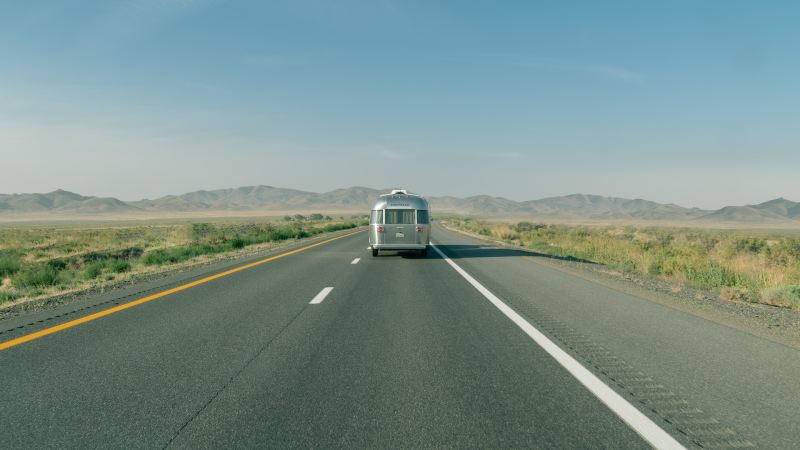
If you’re among the majority of prospective first-time RV buyers, welcome to the not-so-secret club. For decades, that club consisted of retirees and crunchy, outdoor-loving travelers who’d rather spend their vacation time relaxing in nature than drunk on yet another Caribbean cruise . These days, however, more Americans than ever are itching to create their own Great American Road Trip , and that often begins with buying their own RV or travel trailer.
To tow or not to tow
Shopping for your first rv trailer, which type of rv trailer is right for you, how to inspect an rv or travel trailer before you buy, the bottom line.
Shopping for RVs, in general, and travel trailers, in particular, can be a challenge, especially if you’re new to the game. It’s not unlike buying a new car, so it pays to know what to look for before you head to the dealership or to meet that random seller you found on Facebook Marketplace. If you’re ready to take the plunge into trailer travel, we’re here to make the process a bit less confusing with a simple yet complete beginner’s guide to RV travel trailer buying.
Drivable motorhomes (known as “Class A” and “Class B” RVs) are one option, but these tend to be more expensive and only suitable for one purpose (e.g., you’re unlikely to take a 27-foot Winnebago on a grocery run to Target). For well-heeled and full-timing RVers, this can be the best option. These days, the living quarters of most drivable models are comparable to those of most modern, upscale apartments. For those who can afford it and plan to spend considerable time on the road, this is almost certainly the way to go.
The more versatile and less expensive alternative, however, is typically a towable RV travel trailer. This category includes everything from tent-sized teardrop trailers to slightly larger, lightweight travel trailers to full-featured, ultra luxe Airstreams. It’s a solution that allows for hitching up when you’re ready to travel and unhitching to use your SUV or truck like normal once you’re set up at camp.
This is great when you’re at home and not traveling, but also after arriving at your destination. It’s far more convenient to detach the trailer and take just your tow vehicle into town for errands or to explore the surrounding area.
If you’re shopping for RV trailers for the first time, the process can feel intimidating. It’s not quite as difficult as buying a new house, but it’s harder than shopping for a new car. The most obvious things to consider include:
- What’s my budget?
- What style of RV travel trailer is right for me?
- What size trailer should I buy?
- Where can I store my RV when I’m not traveling?
The list of questions doesn’t — or shouldn’t — end there, though. If this is your first time towing anything, you also need to think about:
- Is my current vehicle capable of safely towing the trailer I’m considering?
- If not, should I buy a new vehicle or shop for a different trailer?
- Will I need any new equipment (like a sway bar, a weight distribution hitch, an electronic brake controller, etc.) to tow a trailer safely?
- Do I feel confident towing a trailer?
- What do I need to know to set up and break down my trailer once I get where I’m going?
The answers to many of these questions are unique to you and your situation. First, let’s explore the different types of RV trailers and the pros and cons of each. Once you zero in on the right kind of trailer, the answer to every other question will quickly fall into place.
Like most things related to travel and the outdoors, there is no “best” RV trailer. The model that works best for you depends on the size of your family, the type of camping you prefer, where you’ll be taking it, and the capabilities of you and your tow vehicle. While some defy categorization, most RV travel trailers fall into one of five categories. From the smallest and most basic to the largest and most luxurious, those are:
Pop-up and folding RV trailers
Folding trailers are generally the lightest, most compact, and most basic of all RV trailers. As the name implies, they collapse or “fold” down as short as four feet high. Coupled with sides that typically consist of a soft, tent-like material, they make for easy towing, in some cases, by a mid-sized sedan. Some brands, like , add rigid walls, so they’re better suited for more extreme climates that require heat or air conditioning.
- Inexpensive (some used models can be had for a few thousand dollars)
- Extremely lightweight and agile for easy pulling, even for first-time RVers
- Aerodynamic profile with negligible effect on your vehicle’s fuel economy
- Available hard-sided models are almost as versatile as a traditional travel trailer
- Soft-sided versions offer limited insulation from noise or extreme temperatures
- Most don’t have a private bathroom or any bathroom at all
- The tent fabric is not as durable and requires more maintenance than hard-sided alternatives
- Soft sides offer limited security from break-ins or wildlife (especially hungry bears)
Traditional , hard-sided travel trailers are the most popular RV trailers on the road. The main reason is that this category varies widely in size, versatility, and design. They range from teardrop trailers to tiny, ultra-light trailers (like the fiberglass models from and ) to middle-of-the-road general-purpose models (think Winnebago) to swanky, luxurious alternatives like those offered by Airstream and Bowlus . All but the lightest models typically require at least a larger sedan or mid-sized SUV with increased towing capacity.
- Fully enclosed living space with hard-sided walls offers better insulation from sound and outside temperatures
- More secure than traditional camping tents or pop-up trailers
- Minimal setup time (compared to pop-up RV trailers)
- Available in a wide variety of sizes, designs, and prices
- Many models offer private bathrooms with showers
- Require proper vehicle to tow
- Larger models can significantly impact fuel economy
- Safe towing practices require a learning curve for new RV owners
- The most luxurious models can cost more than a single-family home
Fifth-wheel RV trailers
One option available exclusively to pickup truck owners is to buy a fifth-wheel RV trailer. The unique design of these extends over the truck bed, making better use of the trailer’s overall space than most traditional travel trailers. They’re often larger and heavier than conventional towable RVs and require a special mount inside the truck bed to tow. Typically, this means having at least a half-ton pickup to accommodate the payload. The largest fifth-wheel RV trailers require a pickup with dual rear wheels (a.k.a. a “dually”).
- More spacious floor plans to accommodate a whole family — some offer a dedicated bedroom
- Much more closet and storage space than traditional RV trailers
- Usually more luxurious with residential fixtures, finishes, and amenities
- Fifth-wheel hitches make for more stable towing than typical travel trailers
- Requires special equipment, including a heavy-duty pickup truck with a proper towing setup
- Taller form factor can be tricky to tow under bridges and other tight spaces
- Limits the use of the truck bed with the trailer attached
Toy haulers
Toy haulers, sometimes called sport-utility trailers, are among the most unique and versatile RVs on the road. They’re essentially traditional trailers with a fold-down ramp that leads to an open, garage-like space for storing outdoor “toys” like ATVs, motorcycles , or just about anything, really. The front half houses living amenities like a kitchenette, a fold-down bed, a dining area, or a bathroom with a shower.
- More versatile, usable storage space than any other type of trailer
- Garage space can be used as a “porch” for festivals and other outdoor events
- Living space is limited when toting outdoor toys
- Heavier toys can severely affect balance and handling when towing
- Can require a special tow vehicle, depending on what you’re planning to haul
Truck campers
Though not technically RV “trailers,” modern truck campers are one alternative for buyers seeking a non-drivable RV. Because they slot neatly into the bed of a pickup truck, they’re among the most compact RV models. That smaller size, however, also makes for significantly smaller living quarters that are usually only suitable for two to three people.
- In-bed design eliminates the need for traditional “towing”
- Less of an impact on fuel economy than a towable trailer
- Allows for more extreme offroading or overlanding opportunities
- Some purpose-built models fit perfectly inside factory pickup beds, like the Toyota Tacoma
- Tight living quarters
- Height can make it difficult for children and those with mobility issues to get in
- Semi-permanent installation can be a pain to remove
- Often as expensive as a traditional travel trailer
So you’ve done your research, figured out what type of travel trailer is best for you, and found a few available models to scope out. Now what? As with any big purchase — cars and homes come to mind — it’s critical to perform a thorough inspection before making the deal. Here are the key points to pay attention to:
- Check the condition of the trailer’s overall structure, looking for any signs of damage, including cracks or leaks.
- Inspect the seams and seals around windows, doors, and other openings for noticeable deterioration or wear.
- Check the condition of the roof, paying careful attention to sagging, water damage, or loose seams.
- Examine the tires for wear and ensure they are in good condition, properly inflated, and have adequate tread depth.
- Look for signs of rust or corrosion on the frame and undercarriage.
- Inspect the cleanliness and condition of the interior for odors, stains, or signs of water damage. This is often your best indication of how well (or not) the current owner maintained the trailer.
- Test all the appliances, including the refrigerator, microwave, oven, stove, and air conditioning/heating units, to ensure they are in good working order.
- Check the plumbing system by running the faucets, flushing the toilet, and checking for leaks or water pressure issues.
- Test the electrical system by turning on lights, fans, and other electrical components.
- Examine the flooring, walls, and ceiling for signs of damage or serious wear.
Of course, the best option is to hire a professional, like an RV mechanic, to do the inspection for you. Paying a few hundred dollars for their time could save you thousands in future repairs down the road.
Most first-time RV buyers can only guess how they’ll use their first travel trailer. The only way to know for sure is to spend time traveling in and living with it, which is why your first RV probably won’t be your last. Recreational trailer owners notoriously joke about how many models they had to go through before finding “The One.”
Once you’ve narrowed your search, consider renting each RV model on your shortlist. Sites like Outdoorsy make it possible to rent the exact travel trailer you’re shopping for — right down to the size and exact model year — before committing to buy. So, you can take your significant other, family, friends, and pets along for a weekend away to be sure the trailer you’re shopping for is the right one for you.
Editors’ Recommendations
- Scout debuts Yoho, its first pop-up truck camper, with more models to come
- Mammoth Overland’s ultra-rugged TL travel trailer has an insane amount of space
- 6 RV camper styles perfect for every family and budget
- HYK Outdoors’ clever new teardrop camper trailer is made with eco-friendly cork
- SylvanSport’s multifunction GO camper trailer gets an off-grid makeover for tackling the toughest terrain

Nothing captures the spirit and feel of the Great American Road Trip like an all-aluminum travel trailer. The iconic “silver bullet” design has endured as a symbol of escape and hitting the open road for the better part of a century. Now, Bowlus — an under-the-radar luxe RV brand you may not have heard of — is upending nearly 100 years of history with yet another stunning retro-modern trailer.
Get the full details on the all-new 2025 Bowlus Rivet travel trailer Bowlus just announced the addition of the to its line-up of unique travel trailers. The one-of-a-kind design combines elements of classic aluminum RVs, vintage airplane aesthetics, and a dash of luxury yacht for good measure. It takes all the upscale elements of the brand’s ultra-luxe travel trailers and adds rugged, go-anywhere capability, allowing owners to get far, far off the beaten path.
Compact campervans are getting all the love right now as the go-anywhere adventure vehicles. But, when you’re looking to get seriously off the beaten path, a high-clearance, four-wheel-drive truck is the only way to go. For overlanding pickup owners, slide-in truck bed campers are the easiest all-in-one solution. Thankfully, Tufport just announced their first entry into the Overlander camper space, and it’s a stunner.
Get the low-down on Tufport’s Overlander truck camper The all-new Overlander is built to be a rugged, off-road-ready home away from home for ultra-minimalist overland travelers. The Sea to Sky model—the first model in the Overlander truck camper series—features everything you need and nothing you don’t. Stepping inside through the large rear access door reveals a wall-mounted couch that transforms into a twin bed for maximum live/work/sleep flexibility. Immediately across is a wide galley kitchen with spacious countertops, a vertical pantry cabinet, and plenty of extra storage throughout. An over-cab sleeping area serves as the main “bedroom.” Screened, tinted windows and a roof vent bring plenty of natural light into the space and allow it to feel more airy. It also feels surprisingly roomy at 72 inches wide with 65 inches of interior headroom.
For the first time in 100 years, the Klamath River is free to flow due to the removal of four dams. This environmental milestone, which is the largest dam removal project in the U.S., has reopened over 400 miles of habitat for many fish species. Consequently, fishing enthusiasts in Oregon and Northern California can't wait to get their feet wet.
Benefits of freeing the Klamath River This development promises several benefits. Firstly, the increase in salmon and steelhead populations can make the Klamath River a more fruitful fishing ground. These species, especially salmon, are highly sought after for their sporting qualities and are considered a prized catch due to their size, strength, and fighting ability.
Your privacy is important to us. This website uses cookies to enhance user experience and to analyze performance and traffic on our website. By using this website, you acknowledge the real-time collection, storage, use, and disclosure of information on your device or provided by you (such as mouse movements and clicks). We may disclose such information about your use of our website with our social media, advertising and analytics partners. Visit our Privacy Policy and California Privacy Disclosure for more information on such sharing.
- Owner Login
- Dealer Login
- Toy Haulers
- Fifth Wheels
- Travel Trailers
- Destination Trailers
- Tent Campers
Helpful Tools
- Find A Dealer
- RV Definitions
- Our Company
- Owners Page
- Forest River Corporate Home
- Privacy Policy
- Terms of Use
- Accessibility
- Forest River Apparel
travel trailers
Home > travel trailers
Filter Results
Request a quote, request a quote for, get update alerts, get update alerts for, alert sections.
- Specifications
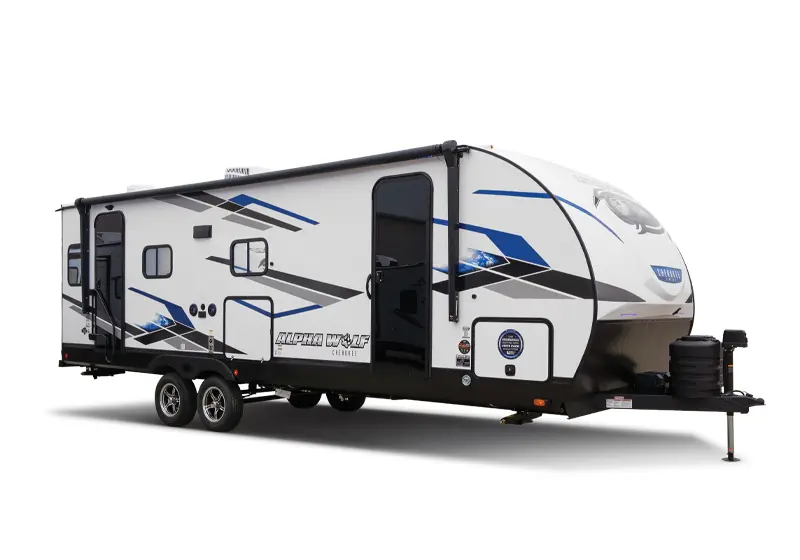
Alpha Wolf Touring Edition
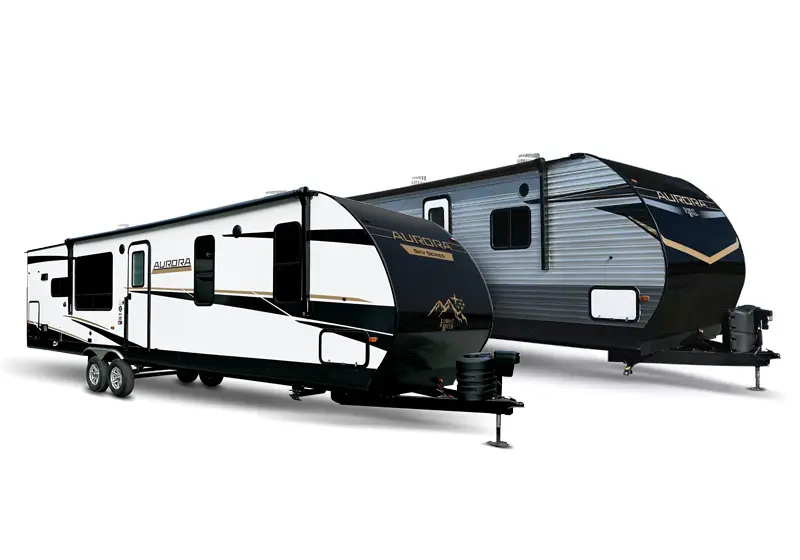
Campsite Reserve
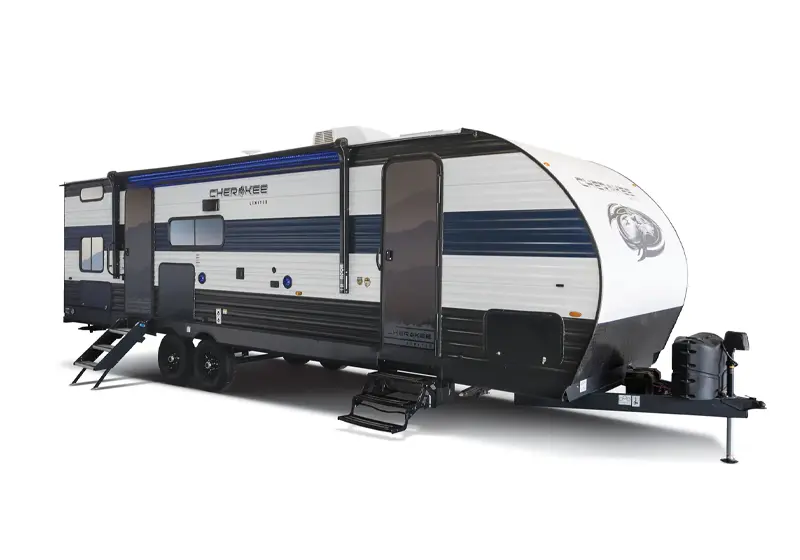
Cherokee Black Label
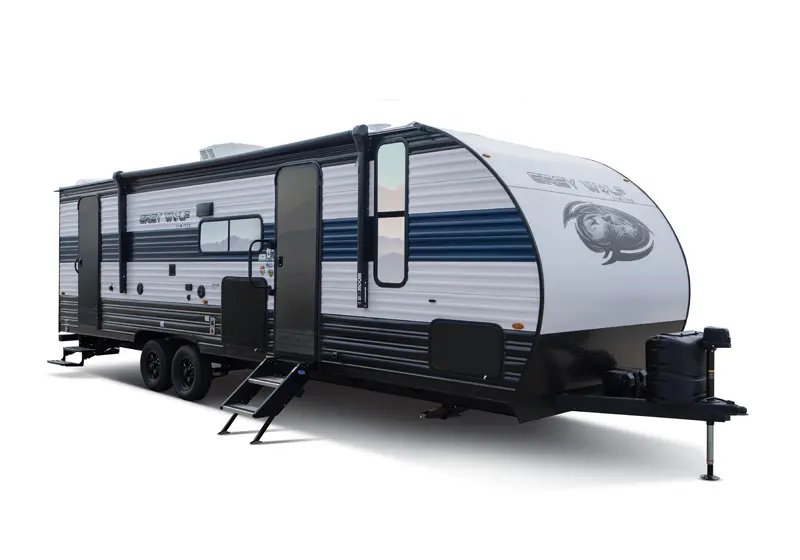
Cherokee Grey Wolf
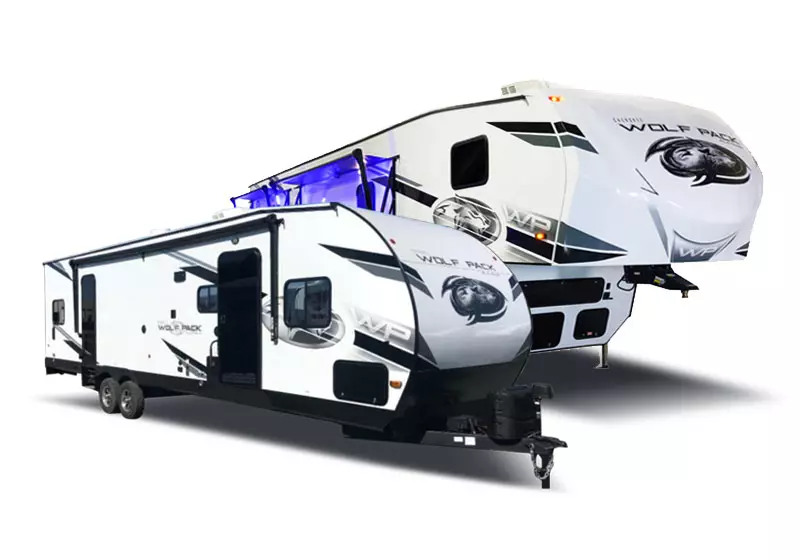
Cherokee Wolf Pack
Cherokee Wolf Pack Gold Series
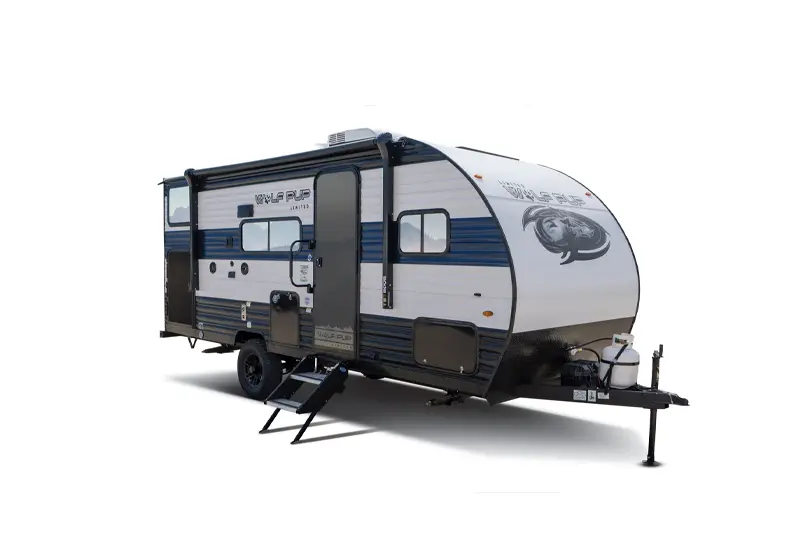
Cherokee Wolf Pup
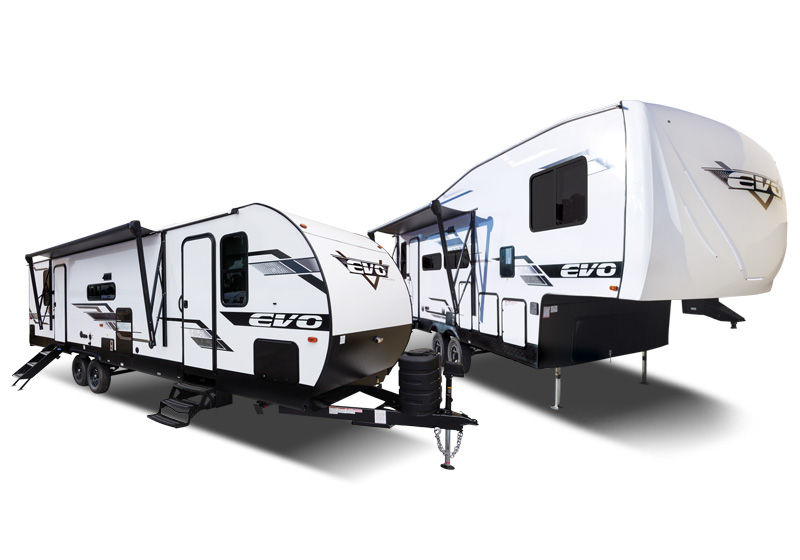
Flagstaff Classic Travel Trailers
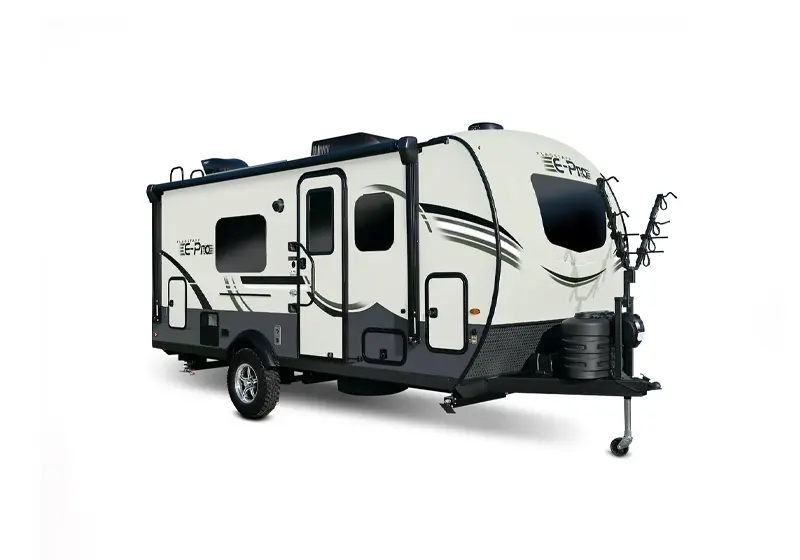
Flagstaff E-Pro
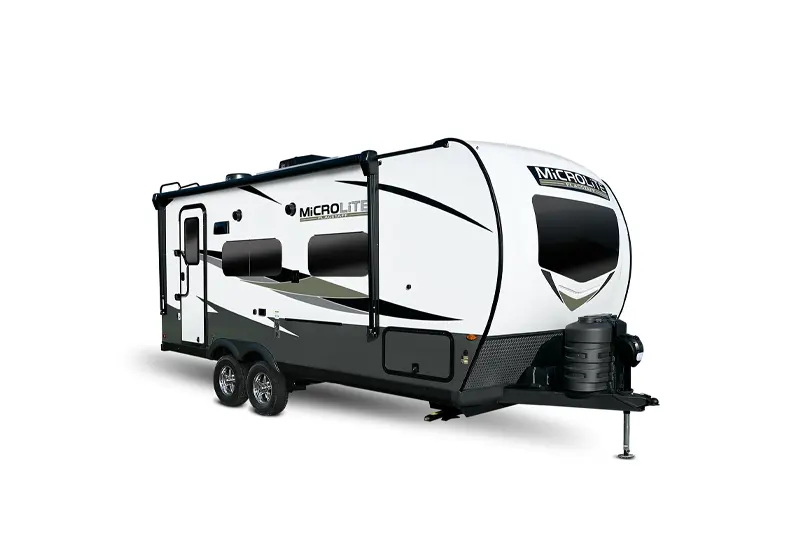
Flagstaff Micro Lite
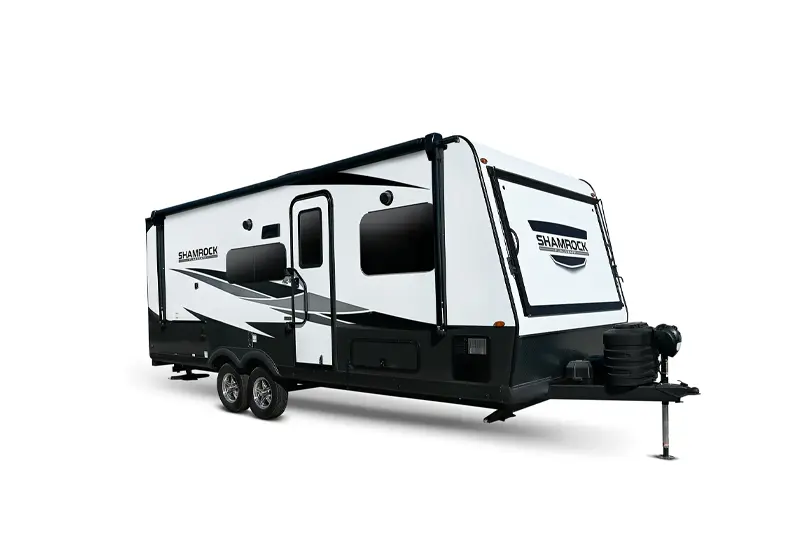
Flagstaff Shamrock
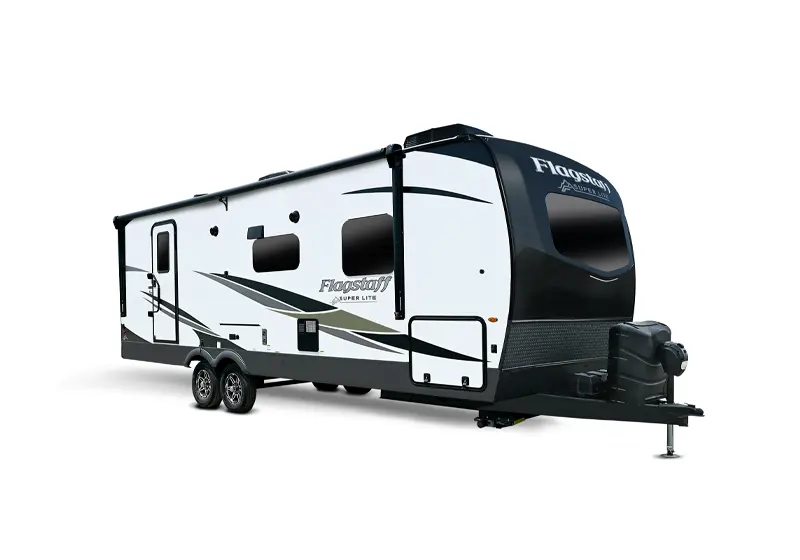
Flagstaff Super Lite Travel Trailers
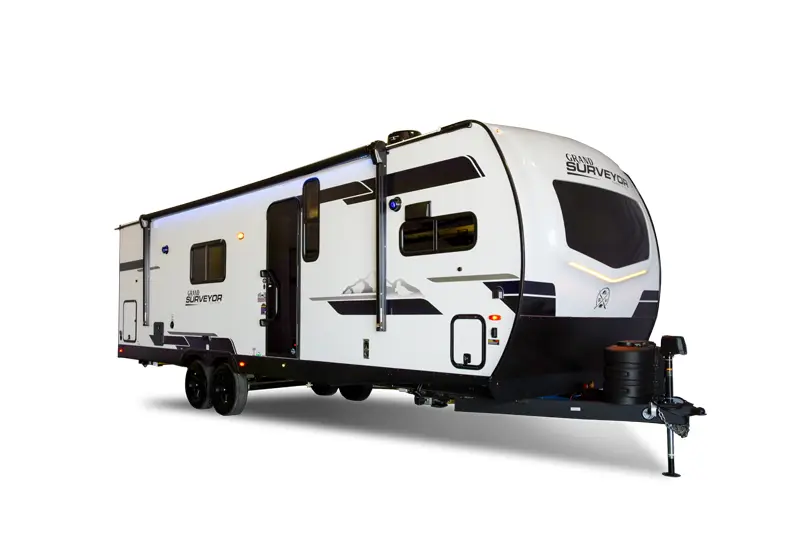
Grand Surveyor
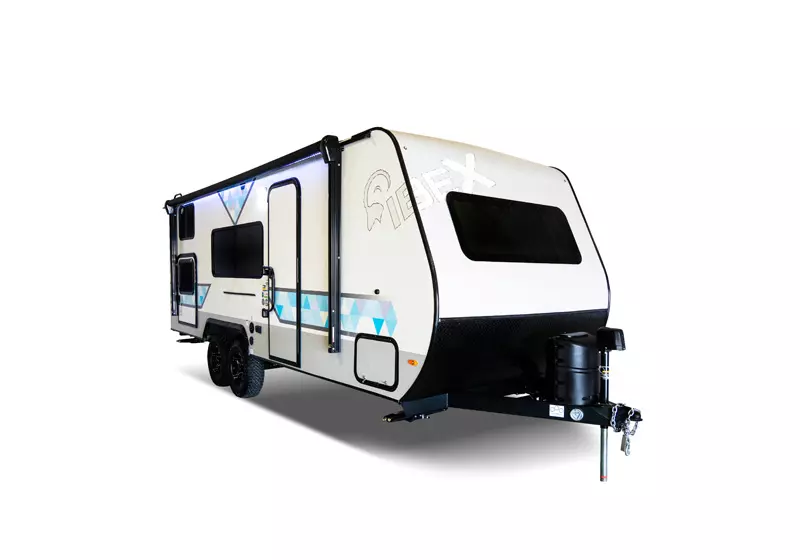
No Boundaries
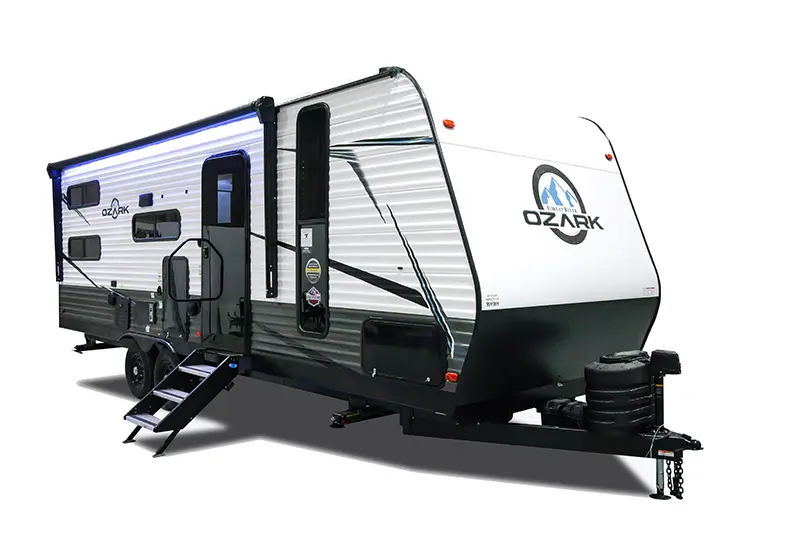
Rockwood Geo Pro
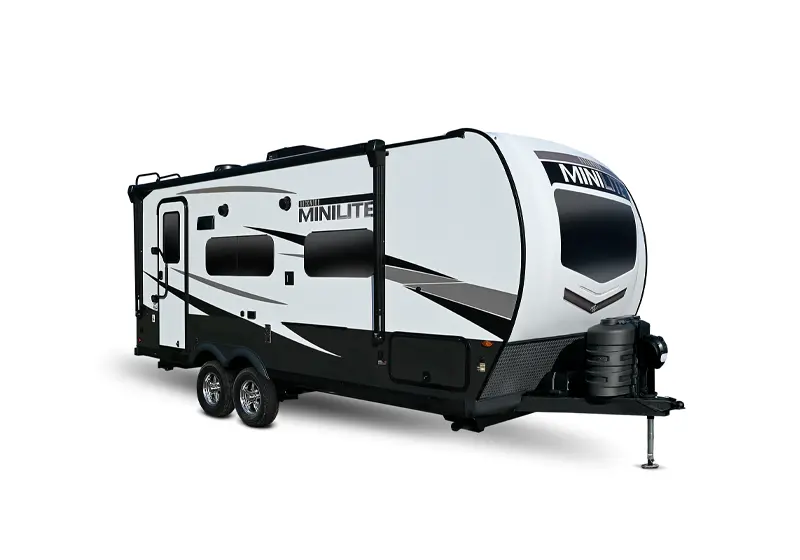
Rockwood Mini Lite
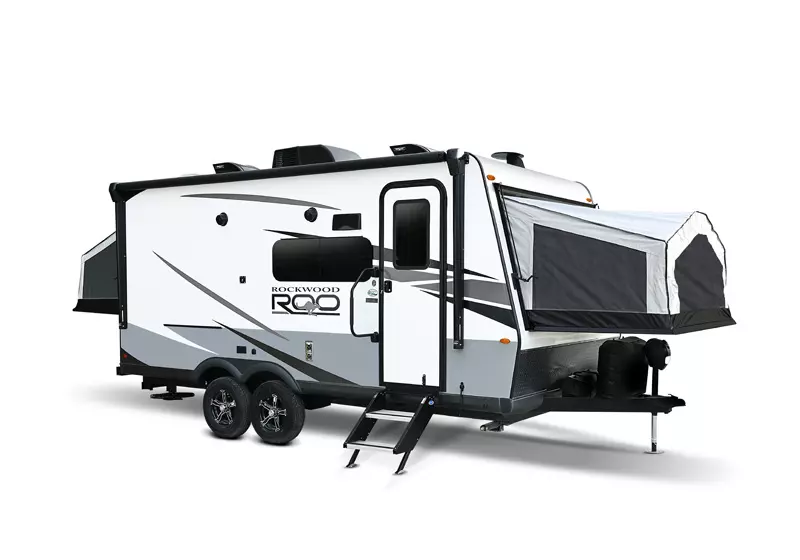
Rockwood Roo
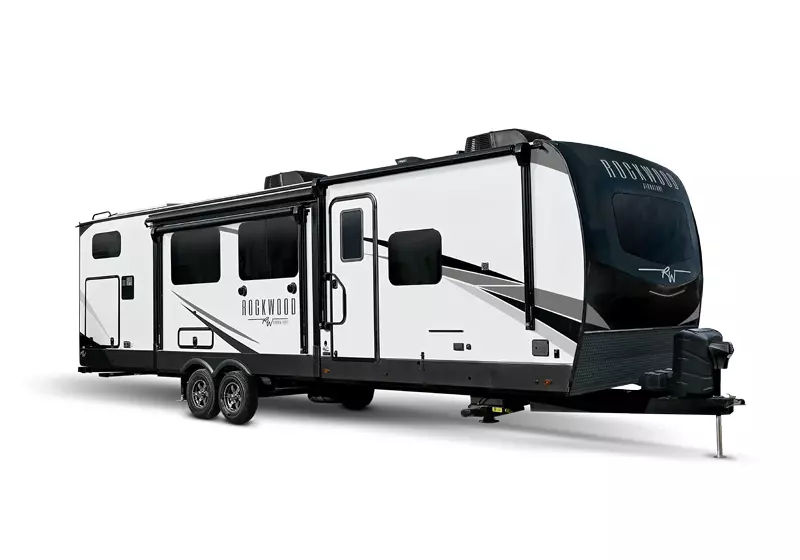
Rockwood Signature Travel Trailers
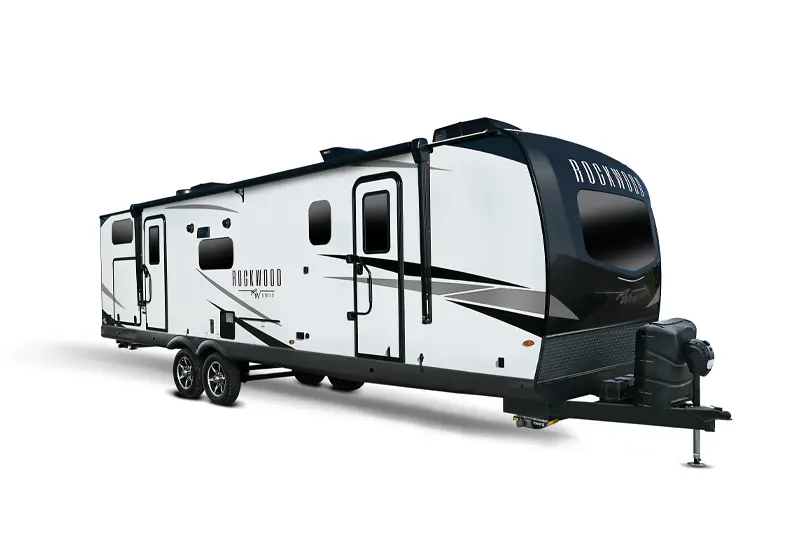
Rockwood Ultra Lite Travel Trailers
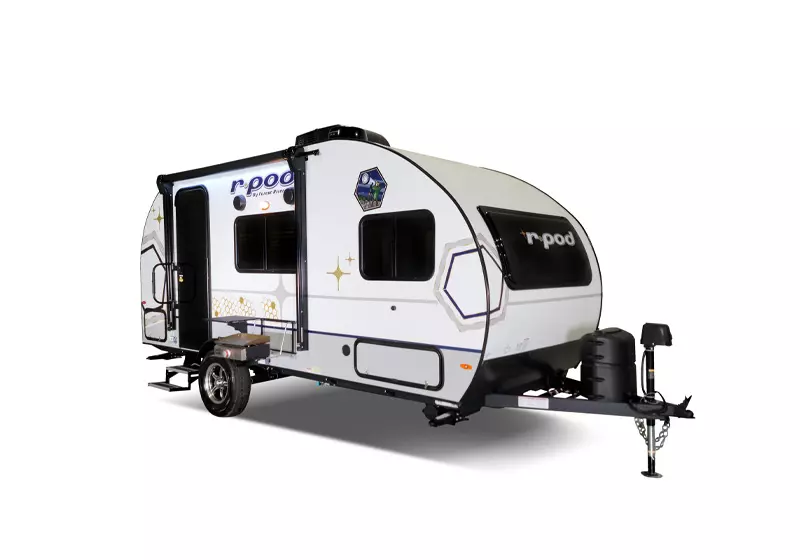
Salem Cruise Lite
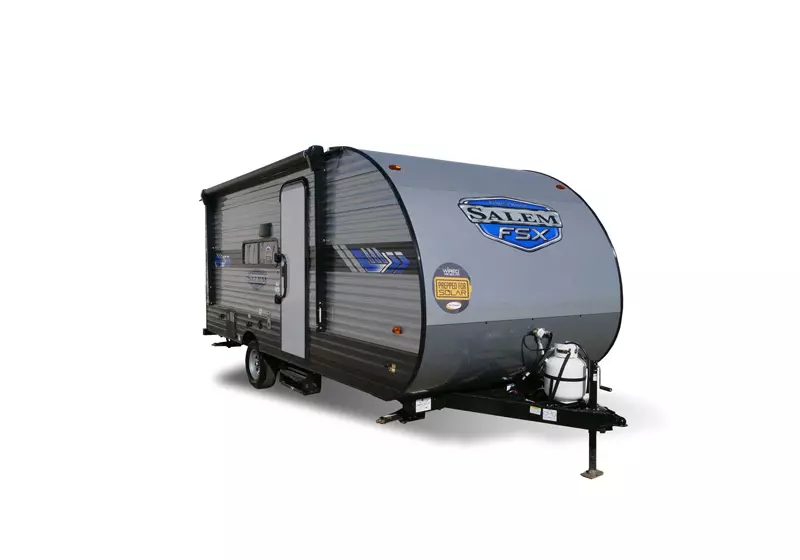
Salem Hemisphere Travel Trailers
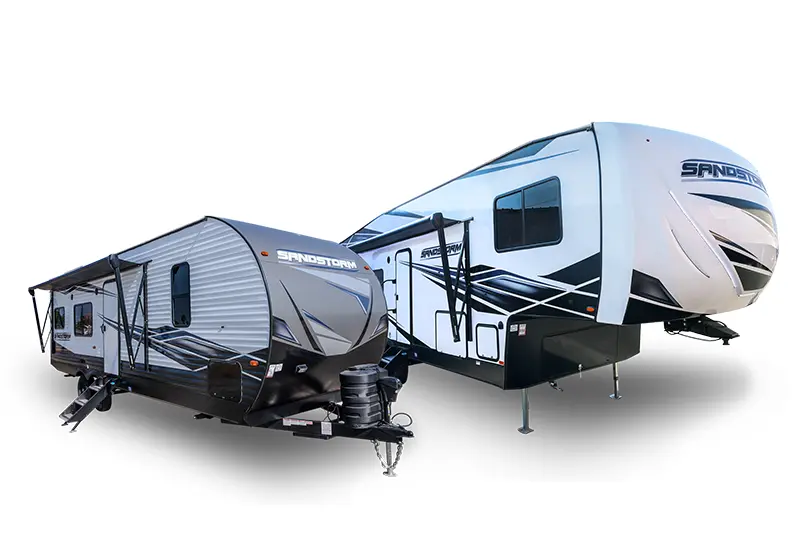
Surveyor Legend
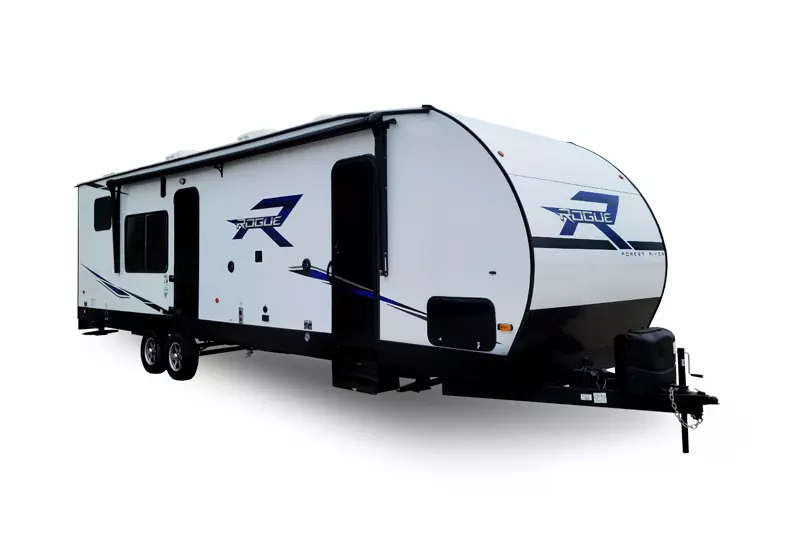
Vengeance Rogue SUT
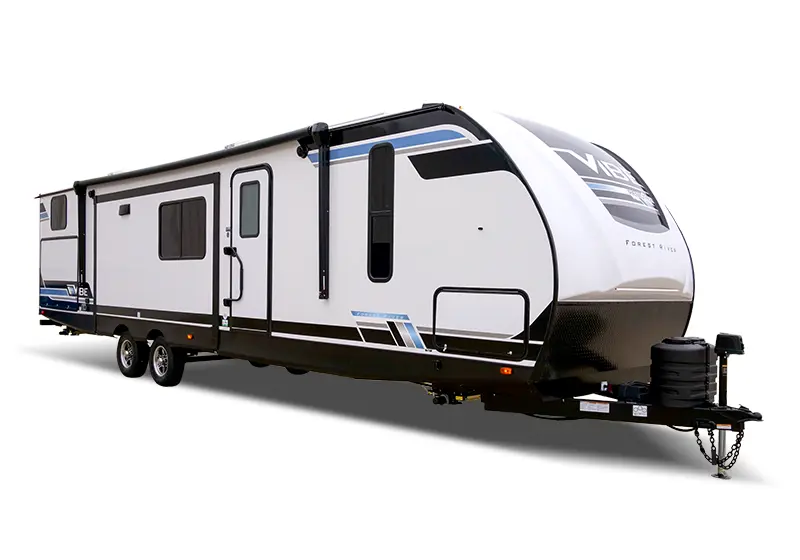
Viking 9000 Series & 12000 Series
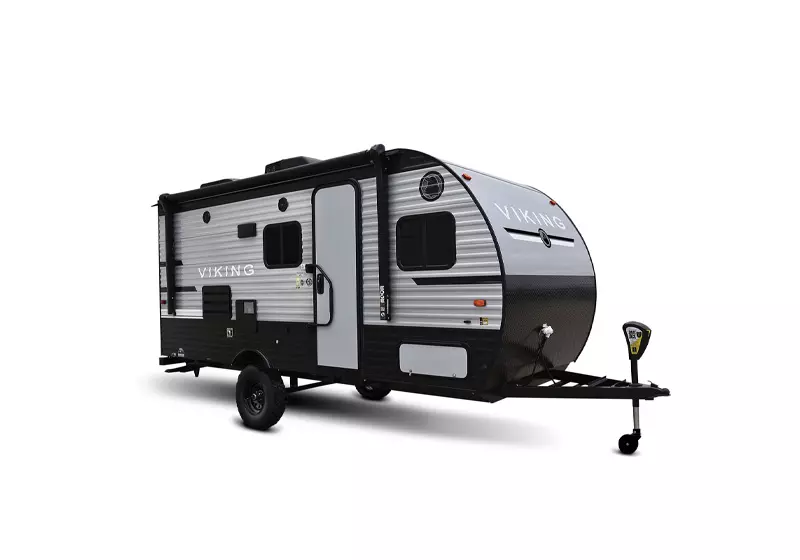
Viking Travel Trailers
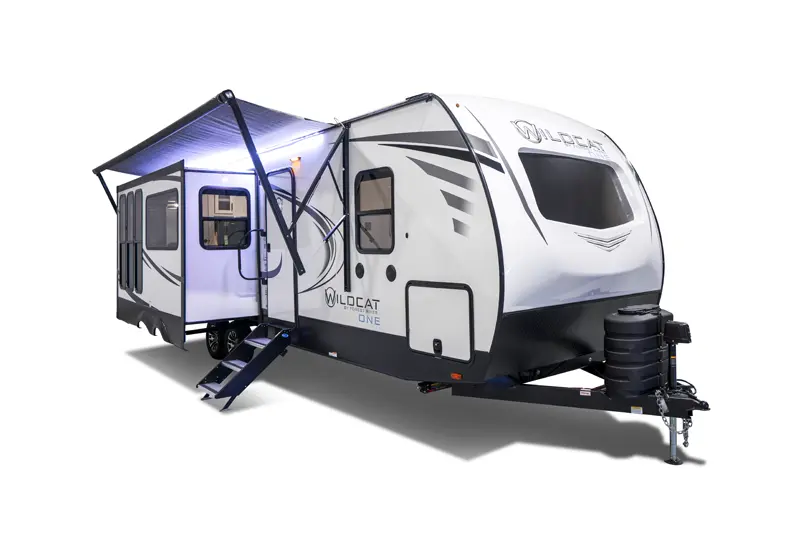
Wildcat Travel Trailers
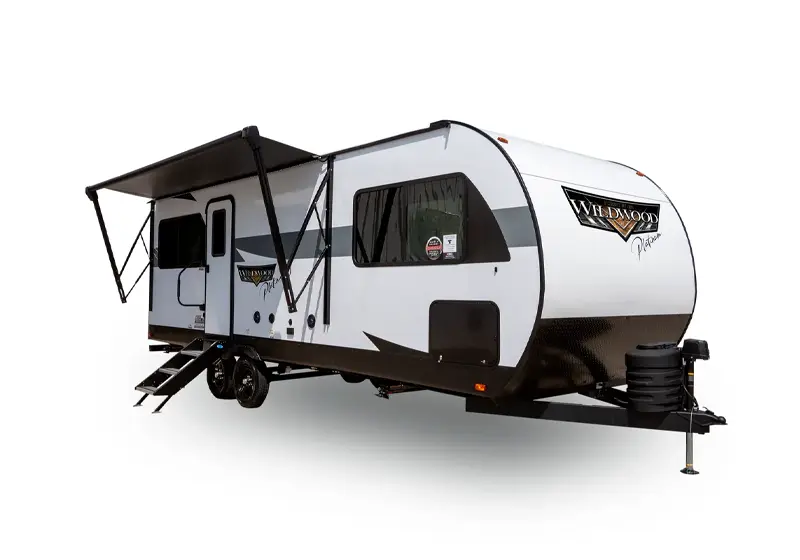
Wildwood FSX
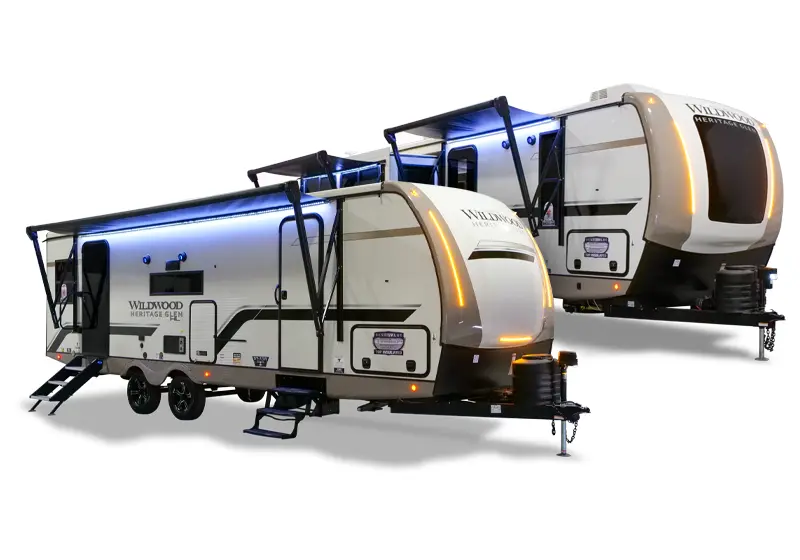
Wildwood Heritage Glen Travel Trailers
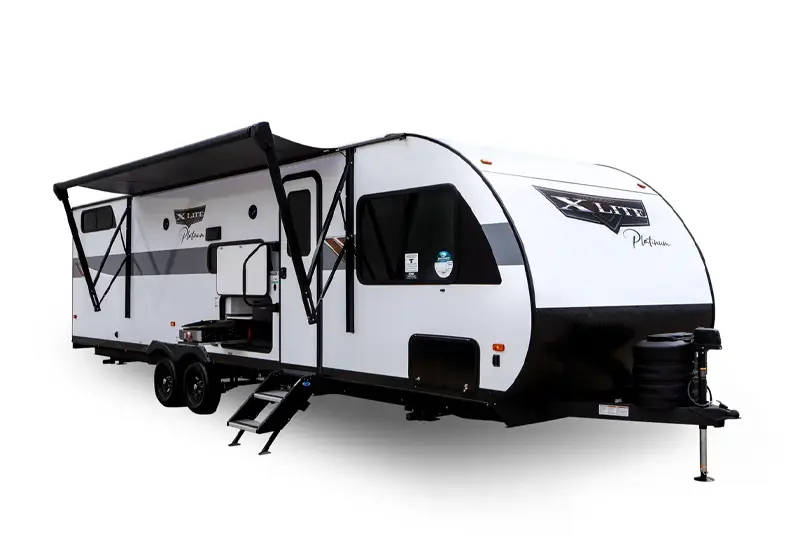
Wildwood X-Lite
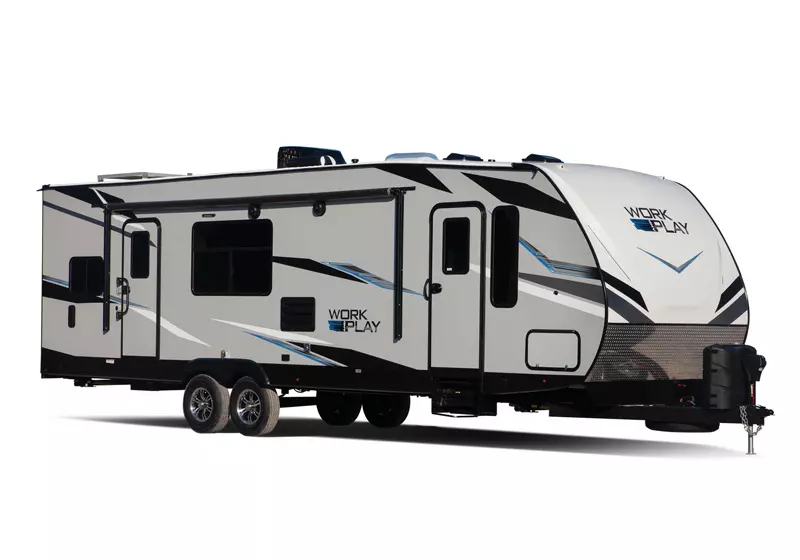
Work and Play
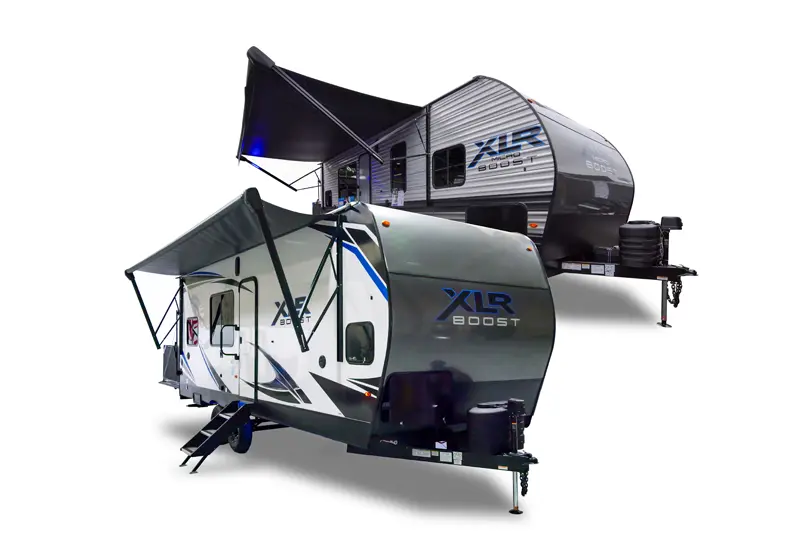
XLR Hyperlite
Please select your region.
Alpha Wolf has floorplans and standard features designed for the area where they are sold. Please select your region from the map below.
Alpha Wolf Touring Edition has floorplans and standard features designed for the area where they are sold. Please select your region from the map below.
Aurora has floorplans and standard features designed for the area where they are sold. Please select your region from the map below.
Campsite Reserve has floorplans and standard features designed for the area where they are sold. Please select your region from the map below.
Cherokee has floorplans and standard features designed for the area where they are sold. Please select your region from the map below.
Cherokee Black Label has floorplans and standard features designed for the area where they are sold. Please select your region from the map below.
Cherokee Grey Wolf has floorplans and standard features designed for the area where they are sold. Please select your region from the map below.
Cherokee Wolf Pack has floorplans and standard features designed for the area where they are sold. Please select your region from the map below.
Cherokee Wolf Pack Gold Series has floorplans and standard features designed for the area where they are sold. Please select your region from the map below.
Cherokee Wolf Pup has floorplans and standard features designed for the area where they are sold. Please select your region from the map below.
Evo has floorplans and standard features designed for the area where they are sold. Please select your region from the map below.
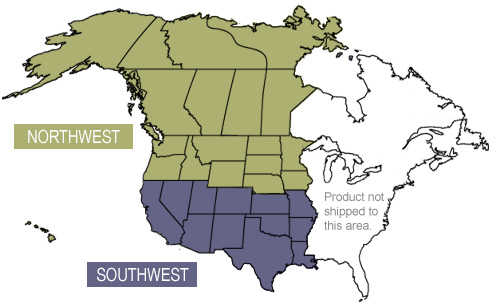
Evo Northwest has floorplans and standard features designed for the area where they are sold. Please select your region from the map below.
Evo Southwest has floorplans and standard features designed for the area where they are sold. Please select your region from the map below.
Flagstaff Classic Travel Trailers has floorplans and standard features designed for the area where they are sold. Please select your region from the map below.
Flagstaff E-Pro has floorplans and standard features designed for the area where they are sold. Please select your region from the map below.
Flagstaff Micro Lite has floorplans and standard features designed for the area where they are sold. Please select your region from the map below.
Flagstaff Shamrock has floorplans and standard features designed for the area where they are sold. Please select your region from the map below.
Flagstaff Super Lite Travel Trailers has floorplans and standard features designed for the area where they are sold. Please select your region from the map below.
Grand Surveyor has floorplans and standard features designed for the area where they are sold. Please select your region from the map below.
Ibex has floorplans and standard features designed for the area where they are sold. Please select your region from the map below.
Nightfall has floorplans and standard features designed for the area where they are sold. Please select your region from the map below.
No Boundaries has floorplans and standard features designed for the area where they are sold. Please select your region from the map below.
Ozark has floorplans and standard features designed for the area where they are sold. Please select your region from the map below.
Rockwood Geo Pro has floorplans and standard features designed for the area where they are sold. Please select your region from the map below.
Rockwood Mini Lite has floorplans and standard features designed for the area where they are sold. Please select your region from the map below.
Rockwood Roo has floorplans and standard features designed for the area where they are sold. Please select your region from the map below.
Rockwood Signature Travel Trailers has floorplans and standard features designed for the area where they are sold. Please select your region from the map below.
Rockwood Ultra Lite Travel Trailers has floorplans and standard features designed for the area where they are sold. Please select your region from the map below.
r-pod has floorplans and standard features designed for the area where they are sold. Please select your region from the map below.
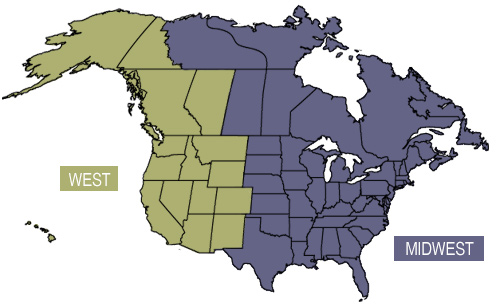
r-pod West Coast has floorplans and standard features designed for the area where they are sold. Please select your region from the map below.
Salem has floorplans and standard features designed for the area where they are sold. Please select your region from the map below.
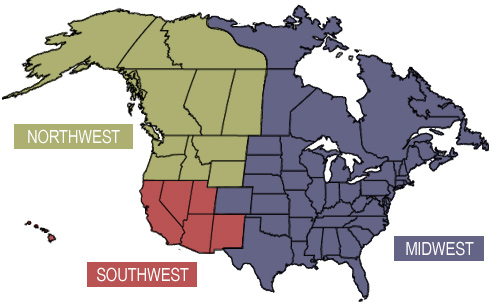
Salem Cruise Lite has floorplans and standard features designed for the area where they are sold. Please select your region from the map below.

Salem Cruise Lite Northwest has floorplans and standard features designed for the area where they are sold. Please select your region from the map below.
Salem Cruise Lite Southwest has floorplans and standard features designed for the area where they are sold. Please select your region from the map below.
Salem FSX has floorplans and standard features designed for the area where they are sold. Please select your region from the map below.

Salem FSX Northwest has floorplans and standard features designed for the area where they are sold. Please select your region from the map below.
Salem Hemisphere Travel Trailers has floorplans and standard features designed for the area where they are sold. Please select your region from the map below.
Salem Northwest has floorplans and standard features designed for the area where they are sold. Please select your region from the map below.
Salem Southwest has floorplans and standard features designed for the area where they are sold. Please select your region from the map below.
Sandstorm has floorplans and standard features designed for the area where they are sold. Please select your region from the map below.
Shockwave has floorplans and standard features designed for the area where they are sold. Please select your region from the map below.
Stealth has floorplans and standard features designed for the area where they are sold. Please select your region from the map below.
Surveyor Legend has floorplans and standard features designed for the area where they are sold. Please select your region from the map below.
Vengeance Rogue SUT has floorplans and standard features designed for the area where they are sold. Please select your region from the map below.
Vibe has floorplans and standard features designed for the area where they are sold. Please select your region from the map below.
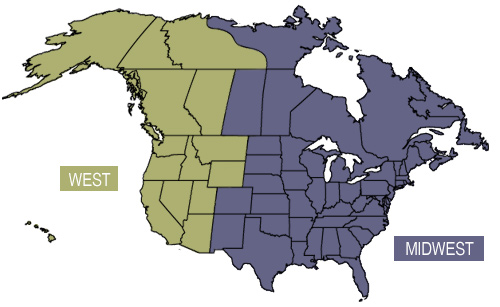
Vibe West has floorplans and standard features designed for the area where they are sold. Please select your region from the map below.
Viking 9000 Series & 12000 Series has floorplans and standard features designed for the area where they are sold. Please select your region from the map below.
Viking Travel Trailers has floorplans and standard features designed for the area where they are sold. Please select your region from the map below.
Wildcat Travel Trailers has floorplans and standard features designed for the area where they are sold. Please select your region from the map below.
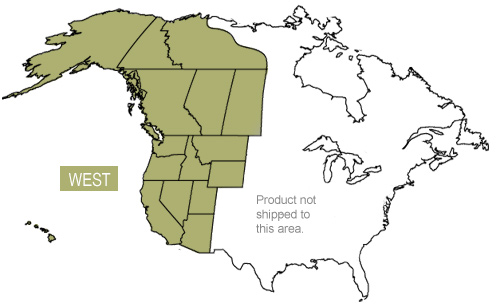
Wildwood has floorplans and standard features designed for the area where they are sold. Please select your region from the map below.

Wildwood FSX has floorplans and standard features designed for the area where they are sold. Please select your region from the map below.

Wildwood FSX Northwest has floorplans and standard features designed for the area where they are sold. Please select your region from the map below.
Wildwood Heritage Glen Travel Trailers has floorplans and standard features designed for the area where they are sold. Please select your region from the map below.
Wildwood Northwest has floorplans and standard features designed for the area where they are sold. Please select your region from the map below.
Wildwood Southwest has floorplans and standard features designed for the area where they are sold. Please select your region from the map below.
Wildwood X-Lite has floorplans and standard features designed for the area where they are sold. Please select your region from the map below.

Wildwood X-Lite Northwest has floorplans and standard features designed for the area where they are sold. Please select your region from the map below.
Wildwood X-Lite Southwest has floorplans and standard features designed for the area where they are sold. Please select your region from the map below.
Work and Play has floorplans and standard features designed for the area where they are sold. Please select your region from the map below.
XLR Boost has floorplans and standard features designed for the area where they are sold. Please select your region from the map below.
XLR Hyperlite has floorplans and standard features designed for the area where they are sold. Please select your region from the map below.
Travel Trailer Vs. Camper: What’s the Difference?

About the Author
Tom Davidock
If you’re beginning your search for a Recreational Vehicle (RV) and are trying to sort out the differences between the various options, you’re not alone. One common point of confusion that many people have is the difference between a camper and a travel trailer. These two terms often spark confusion and are occasionally used interchangeably, “camper” and “travel trailer.”
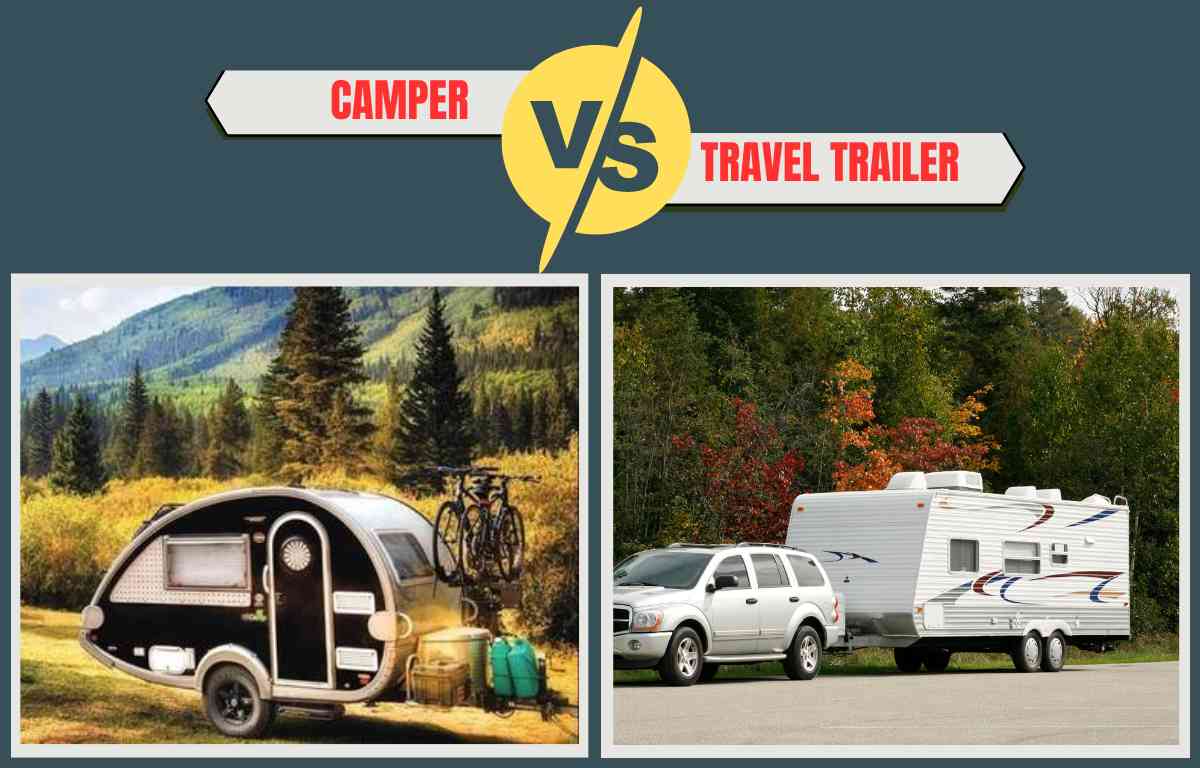
While these terms might seem synonymous, they denote distinct categories of RVs, each offering its own set of features, advantages, and charm. However, don’t worry too much about the terminology. The best way to find the perfect RV is to see it in person and decide if it fits your needs and travel style. In this article, we’ll look at the nuances between campers and travel trailers and shed some light on their terminology, design, functionality, and what sets them apart.
Defining the Terminology: Camper and Travel Trailer
Before we delve into the distinctions, let’s look at the core definitions of “camper” and “travel trailer.” Aside from truck campers, both can fall under the category of towable RVs.
Camper: A camper is a term often used as an umbrella category encompassing various types of recreational vehicles (RVs) that are designed for temporary accommodation and travel. Specifically, a camper can refer to a smaller type of RV that can be towed behind a vehicle or affixed to the bed of a pickup truck, creating a self-contained living space. You may also hear campers referred to as camping trailers or camper trailers. Still, regardless of name, these compact units typically provide essential amenities, including sleeping space and basic kitchen facilities, making them ideal for those seeking a cozy and efficient camping experience.
Travel Trailer: On the other hand, a travel trailer is a larger type of RV designed to be towed behind a vehicle, such as a truck or SUV. These trailers offer a spacious living area, a kitchenette, bathroom facilities, and sleeping quarters. Available in various sizes and layouts, travel trailers provide flexibility, allowing you to detach the trailer from the towing vehicle once your campsite is established and allowing you the freedom to explore your surroundings independently. Not to be confused with a 5th wheel, a travel trailer is towed from the bumper of a vehicle.
While the terms “camper” and “travel trailer” might sound interchangeable, their specific meanings highlight the contrasting nature of these two categories of RVs. While a travel trailer can be a large RV, a camper, by definition, is typically quite a bit smaller and won’t have the extra space afforded by their bigger RV counterparts. Let’s dig a little deeper into the various types of trailers and campers.

The Different Types of Campers
Campers come in various shapes and sizes, each tailored to different preferences and travel styles. Let’s take a closer look at some of the different types of campers available in recreational vehicles.
Pop-Up Campers:
Pop-up campers, also known as tent trailers, are a popular choice for those seeking a lightweight and compact RV. A pop-up trailer features collapsible walls, which can be expanded when parked to provide additional living space. When folded down, they become more streamlined and easier to tow, making them suitable for various vehicles. Pop-up campers are especially favored by campers who value versatility and convenience. Despite their relatively modest size, these campers can offer sleeping areas, basic kitchen facilities, and sometimes even bathroom amenities.
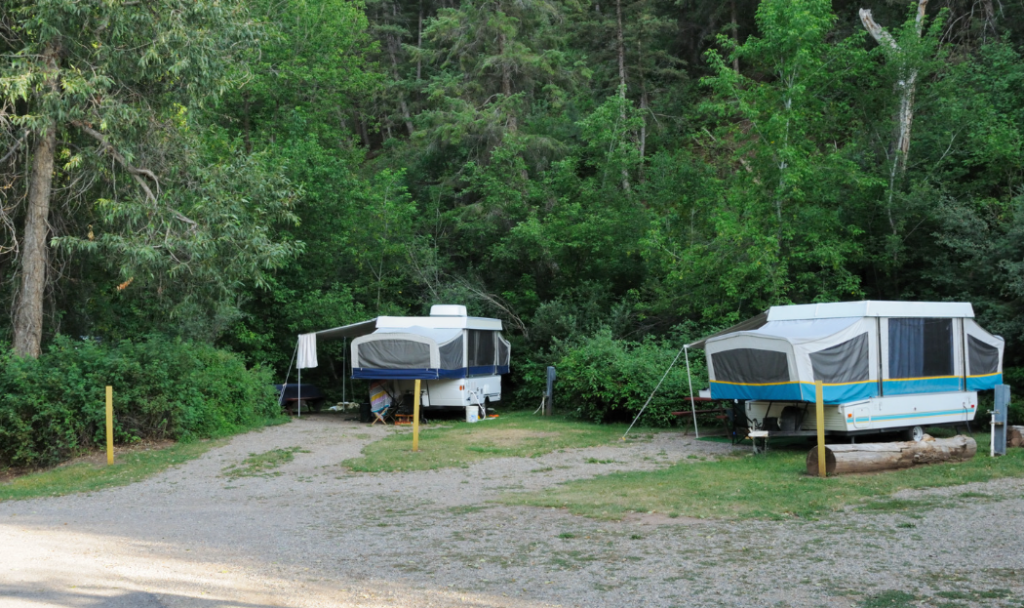
Truck Campers:
A Truck camper, also called a slide-in camper, is designed to fit directly onto the bed of a pickup truck. This unique design allows for easy installation and removal, providing a self-contained living space that travels with the truck. Truck campers offer a compact and efficient layout, making them an excellent choice for solo travelers, couples, or those who prioritize mobility. Despite their smaller footprint, truck campers often include sleeping areas, a kitchenette, and bathroom facilities, allowing you to enjoy the comforts of home while on the road.
Teardrop Trailers:
Teardrop trailers are known for their distinct teardrop-shaped design, prioritizing aerodynamics and efficiency. These compact campers are perfect for individuals or couples seeking a cozy and minimalistic camping experience. While they may appear small on the outside, teardrop trailers often feature ingenious interior layouts that maximize space. They typically include sleeping quarters, a small kitchen area, and sometimes basic amenities. Teardrop trailers are easy to tow and maneuver, making them an ideal choice for those who value simplicity and style. Some manufacturers will put these in the category of small travel trailers.
Off-Road Campers:
As the name suggests, off-road campers are designed to tackle rough terrains and adventurous trails. These campers have robust suspensions, reinforced frames, and off-road tires, allowing you to explore remote and challenging destinations. Off-road campers often come with features such as higher ground clearance, heavy-duty construction, and specialized amenities for outdoor enthusiasts. These are great options if you plan to travel on rough terrain or maneuver down narrow roads in more remote areas.

The Different Types of Travel Trailers
Travel trailers come in various shapes and sizes, each catering to different preferences, group sizes, and travel experiences. Let’s delve into some different types of travel trailers, each offering unique features and advantages.
Conventional Travel Trailers:
Conventional travel trailers are the quintessential choice for many RV enthusiasts. They come in various sizes, layouts, and floor plans, making them versatile for individuals, couples, families, and even larger groups. From compact units with all the essentials to spacious models with slide-out extensions, conventional travel trailers offer an array of amenities. They typically include sleeping quarters, a kitchenette, dining areas, and bathroom facilities.
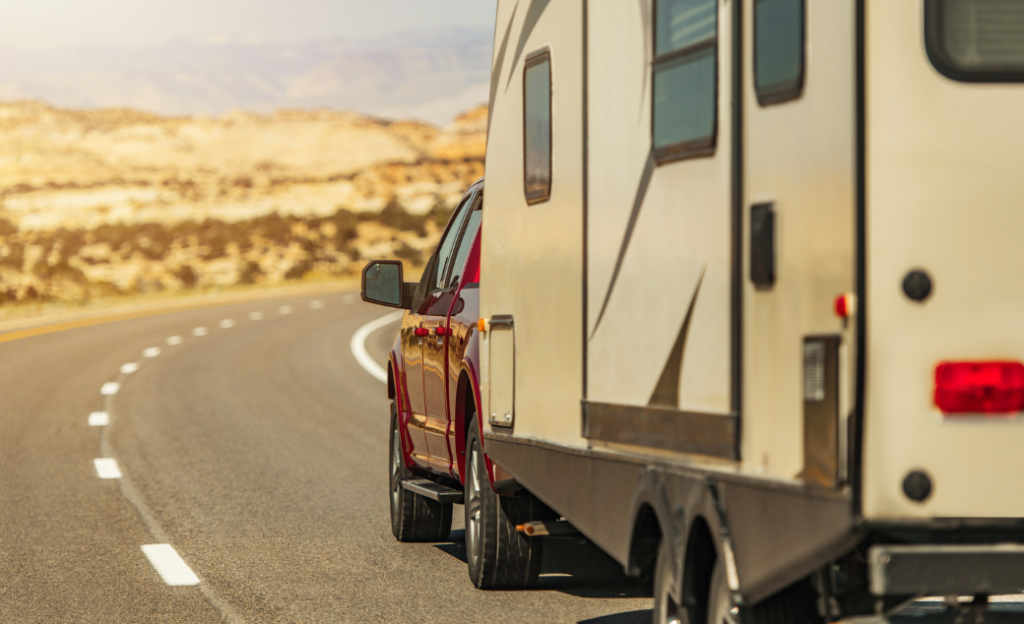
Toy Haulers: Blending Adventure and Comfort
Toy haulers are travel trailers designed with a twist— they come equipped with a garage area at the rear, which can be used to transport motorcycles, ATVs, bicycles, or other adventure gear. This unique feature combines the convenience of an RV with the ability to bring along your favorite outdoor toys. Toy haulers often feature fold-down beds, convertible seating, and ample storage space.
Ultra-Light Travel Trailers: Towable with Ease
Ultra-light travel trailers are engineered to be lightweight and easy to tow, making them an excellent choice for those with smaller tow vehicles or who want improved fuel efficiency. These trailers are designed with lightweight materials and streamlined construction, allowing you to hit the road without needing a heavy-duty truck. Despite their compact size, ultra-light travel trailers offer essential amenities, including sleeping quarters, kitchen facilities, and sometimes even bathroom amenities.

Luxury Travel Trailers: Embracing Elegance
For travelers who seek the epitome of comfort and style, luxury travel trailers offer a lavish experience on the road. These trailers feature high-end amenities, upscale finishes, and a focus on sophisticated design. From luxurious furnishings to gourmet kitchens and spacious living areas, luxury travel trailers provide a home-away-from-home experience.
Similarities Between Camper and Travel Trailer
Campers and travel trailers accomplish the same goals in the diverse landscape of RVs, offering travelers the freedom to explore the world while enjoying the comforts of home. While these two categories might have distinct features and designs, they share an essence that draws enthusiasts to both options. When differentiating between the two, it’s essential to highlight the significant similarities that make them both appealing choices for those seeking a mobile lifestyle.
Home Away from Home:
At their very heart, campers and travel trailers offer a familiar refuge amidst the unfamiliarity of new landscapes. Whether you’re traversing mountains, lounging by serene lakes, or nestled in your local RV park, these vehicles provide a cozy space to sleep, eat, or relax each day.
Sleeping Quarters:
Both campers and travel trailers accomplish one of the primary goals of an RV, providing comfortable sleeping quarters. Whether you’re traveling solo, as a couple, or with family and friends, these vehicles cater to varying numbers of occupants with their diverse floor plans. From snug sleeping areas to spacious master bedrooms, the sleeping arrangements allow you to wake up refreshed and ready for the day’s escapades.

Kitchen and cooking:
Both campers and travel trailers will offer some type of kitchen facilities that allow you to cook on the go. From preparing your morning coffee to crafting gourmet campfire dinners, the equipped kitchenettes in both options empower you to savor culinary delights while surrounded by breathtaking landscapes. While the size of the kitchen and available amenities will vary with the size of the RV, this shared feature is something you can expect in either option.
Bathroom Amenities:
Most campers and travel trailers will provide some type of bathroom facilities. Depending on their size and layout, both offer bathroom amenities ranging from basic toilet facilities to more comprehensive setups that include showers. Small campers may be limited in bathroom options, with very small ones only offering a portable toilet and outdoor shower. However, having these amenities within reach eliminates the dependency on external facilities.
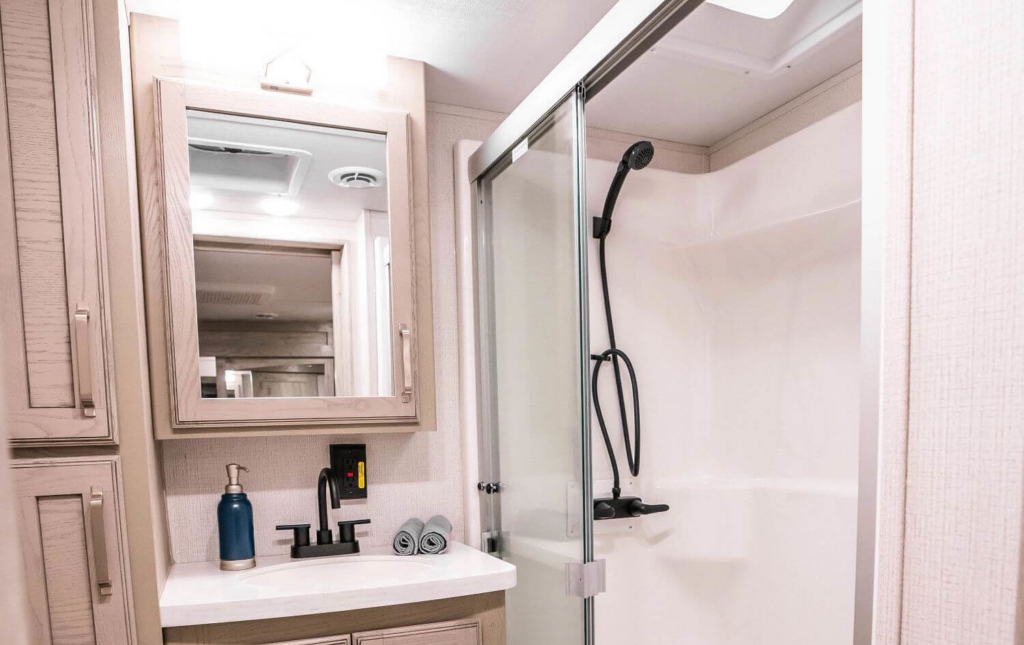
Flexibility and Exploration:
Both campers and travel trailers embrace the spirit of adventure by granting you the freedom to change your destination and itinerary as your wanderlust dictates. Whether you’re traversing remote camping spots, exploring national parks, or simply embarking on a spontaneous road trip, the flexibility these options provide ensures you can adapt your journey to your desires and discoveries.
Differences Between Camper and Travel Trailer
While these two categories share commonalities that make them both alluring options for travelers, it’s essential to recognize their distinct characteristics and functionalities. Let’s delve into the key differences that set campers and travel trailers apart, helping you make an informed decision when selecting the ideal RV for your adventures.
1. Design and Size:
Campers: Campers are smaller and designed to be affixed to the bed of a pickup truck or towed by a smaller vehicle. Their size is inherently limited due to the dimensions of the truck bed or the smaller size of the vehicle towing it. This design makes campers an excellent choice for solo travelers, couples, or those who prefer a more minimalist approach to camping.
Travel Trailers: In contrast, travel trailers encompass a broader spectrum of sizes and layouts. From compact units to expansive models with slide-out extensions, travel trailers often offer more spacious living areas, separate sleeping quarters, and comprehensive kitchen and bathroom facilities. This versatility makes them a better option for individuals, families, and larger groups seeking varying comfort levels.
2. Towing and Mobility:
Campers: Campers are usually easy to tow and usually offer an easier learning curve for folks unfamiliar with towing an RV. For truck campers, they provide a seamless integration with the towing vehicle, as they become a single unit when attached to the bed of a truck. This configuration enhances maneuverability, especially in tight spaces, and simplifies the overall towing experience. Since the campers are usually smaller, they will also improve fuel efficiency when getting to and from the campsite. A small camper will also offer better gas mileage for your tow vehicle. A small camper will be a great choice if you want to be nimble and take spontaneous road trips.

Travel Trailers: Travel trailers are designed to be towed behind a separate vehicle, such as an SUV or truck. This towing setup allows for greater mobility once you’ve reached your destination. You can unhitch the travel trailer and use your vehicle independently to explore local attractions, run to the grocery store, or embark on day trips. Larger travel trailers will require some practice when towing and maneuvering the vehicle. Unless you have a smaller trailer, It will take some skill to maneuver through parking lots or a tight campsite. Also, due to their large size, your fuel economy when towing will be much less than with a camper.
3. Living Space and Amenities:
Campers: Due to their smaller size, campers have a more compact layout that generally results in limited interior space. While they offer sleeping quarters and basic kitchen facilities, the overall living area is more confined than travel trailers. This is one of the main differences when shopping for your first RV.
Travel Trailers: Their larger dimensions typically provide more spacious living areas. Depending on the model, they can include features like separate bedrooms, comfortable seating arrangements, full kitchens with appliances, and even more luxurious amenities. Many travel trailers will offer slide outs, providing much more space when set up at the campground. The extra room allows for greater comfort and a more home-like atmosphere.
4. Storage:
Campers: Campers have a more limited storage capacity due to their compact size. While they offer some storage solutions, you’ll need to be selective about the items you bring along on your journey. Unlike a large travel trailer, campers will have fewer options to transport or store their camping gear or supplies.
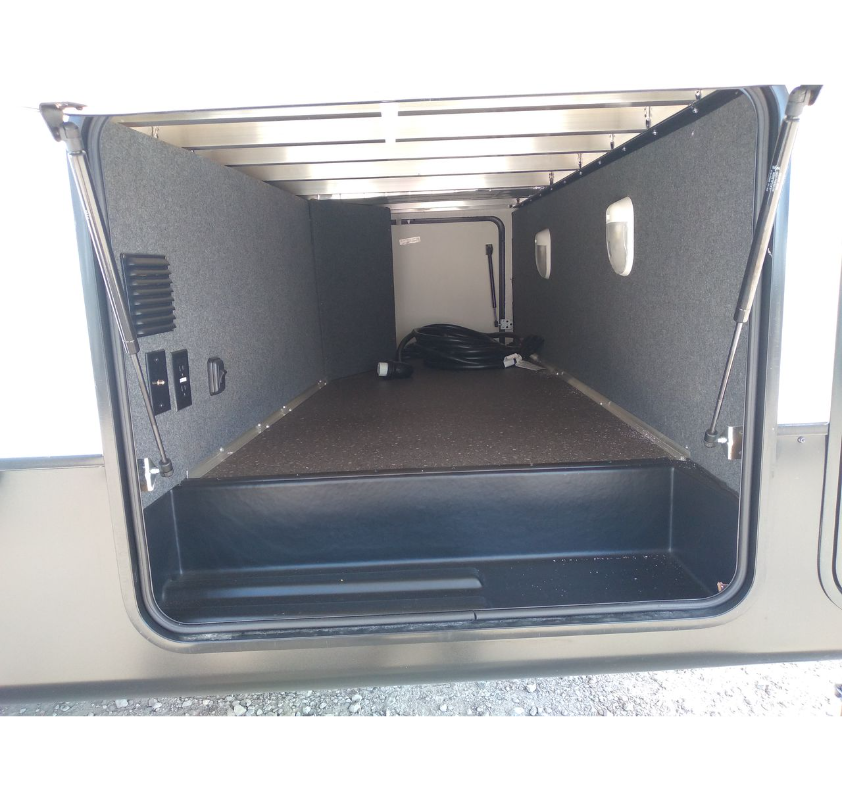
Travel Trailers: The larger dimensions of travel trailers usually translate to more storage space. These trailers often feature ample cabinets, closets, and storage compartments, allowing you to bring a wider variety of gear, equipment, and personal items. While smaller travel trailers won’t have much space, they’re still usually a better choice for a large family with more things to bring along.
5. Tow Vehicle Requirements:
Campers: If you choose a towable camper, you won’t need as big of a tow vehicle. An SUV can usually tow a small teardrop trailer or pop-up camper. However, truck campers usually require a larger pickup truck due to their design that attaches directly to a bed of a truck. The camper’s weight and dimensions will influence the specific truck requirements.
Travel Trailers: Travel trailers can be towed by a broader range of vehicles, including SUVs, half-ton trucks, and some larger crossover vehicles. The towing capacity and appropriate hitching system will vary based on the size and weight of the travel trailer.
By understanding these key differences, you can better evaluate whether a camper or a travel trailer aligns with your travel style, group size, and preferences. Each option offers distinct advantages that cater to various needs, ensuring you can embark on your journeys with the perfect RV companion.
Comparing Campers, Travel Trailers, Fifth Wheels, and Motorhomes
Travel trailers and campers are just two categories of RVs. If you’re looking at different options with more features, two significant contenders in this realm are fifth wheels and motorhomes. These options offer distinct advantages, designs, and functionalities that set them apart from campers and travel trailers. Let’s delve into how fifth wheels and motorhomes differentiate themselves from campers and travel trailers, allowing you to make an informed decision that aligns with your travel aspirations.
Fifth Wheels:
Fifth wheels are a unique category of RVs that require a special hitch installed in the bed of a pickup truck. This hitching mechanism provides enhanced stability during towing, making fifth wheels attractive for those seeking a smoother towing experience. Fifth wheels often boast more living space than traditional travel trailers due to their design extending over the truck bed. This design allows for additional slide-out rooms, creating a spacious, home-like interior. The hitching system also results in a tighter turning radius, allowing for greater maneuverability when navigating tight spaces. Fifth wheels are a popular choice for long-term travelers or those who prioritize ample living space while on the road.
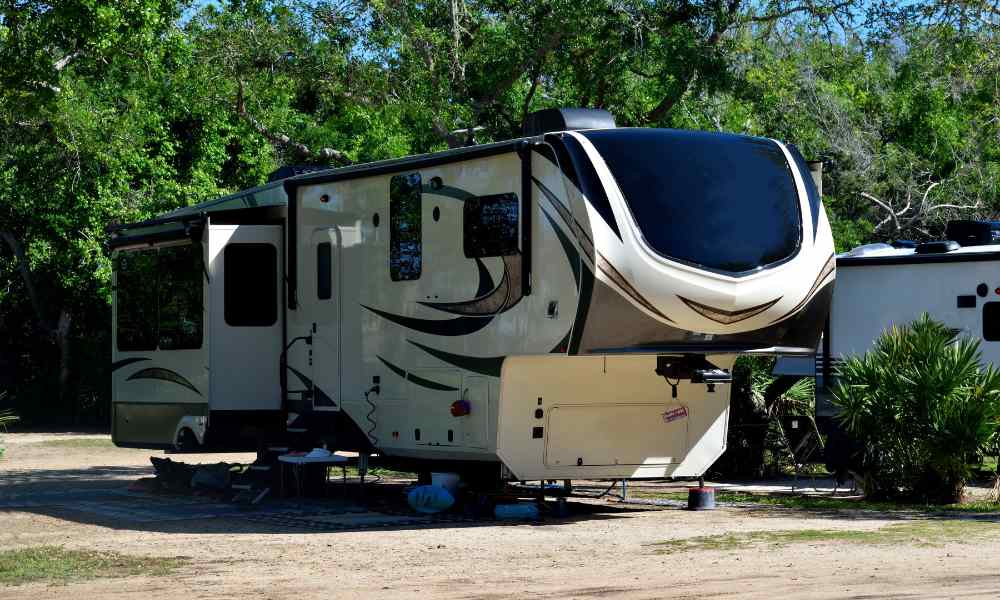
Motorhomes:
In contrast to both campers and travel trailers, motorhomes are self-contained units with their own engines. This all-in-one design seamlessly combines the living area with the driving space, eliminating the need to tow a separate vehicle. Motorhomes come in different classes—Class A, Class B, and Class C—each offering varying sizes, layouts, and amenities. Class A motorhomes are the largest and most luxurious, resembling a bus in appearance and offering expansive living spaces. Class B motorhomes, or camper vans, are compact yet versatile, ideal for couples or solo travelers seeking mobility. Class C motorhomes fall in between, often built on a van chassis with a distinctive cab-over design, providing additional sleeping or storage space. Motorhomes provide the convenience of having everything in one unit, making them a popular choice for those who want to seamlessly transition from driving to living without disconnecting or hitching. However, since you have an engine, maintenance costs will usually be higher for motorhomes.
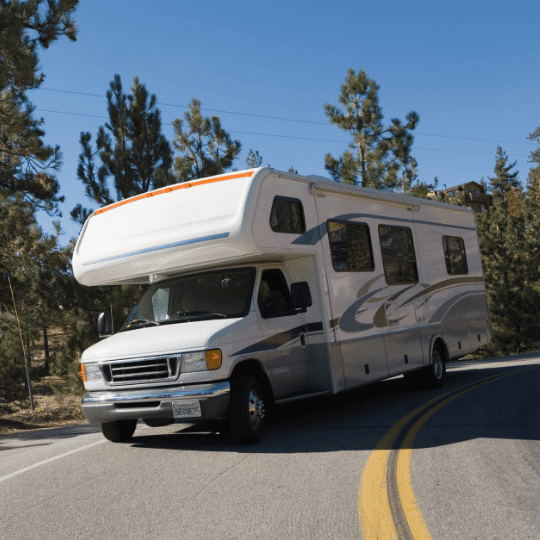
In Summary: Finding Your Perfect Match
The world of RVs offers various options, each catering to different preferences, group sizes, and travel styles. While campers and travel trailers provide a sense of home on wheels, fifth wheels offer enhanced stability and spacious interiors. At the same time, motorhomes bring together convenience and comfort in an all-in-one package. Understanding the distinctions among these options empowers you to select the perfect companion for your journeys. Whether you’re drawn to the compact mobility of campers, the spacious elegance of fifth wheels, the versatility of travel trailers, or the seamless convenience of motorhomes, each choice promises a unique adventure on the open road. The decision ultimately rests upon your priorities, travel aspirations, and the experiences you seek to create.
Leave a Reply Cancel reply

Motorhome Vs Travel Trailer: Pros and Cons
By: Author Zachary Friedman
Posted on Last updated: March 7, 2024
Categories Motorhomes and RVs
Home » Camping » Motorhomes and RVs » Motorhome Vs Travel Trailer: Pros and Cons
RVs come in a wide range of designs. In this guide, I’ll outline the differences and list the pros and cons of camping in a motorhome vs travel trailer. I’ll cover comfort, space, amenities, ease of driving, price, maintenance, fuel efficiency, and much more. I’ll also talk a bit about the different classes of motorhomes and types of travel trailers available.
Generally, motorhomes are easier to drive and easier to set up. They offer more luxurious amenities. Motorhomes also allow you to tow a trailer. Travel trailers are cheaper and lower maintenance.
Motorhomes are the better choice for luxury travelers, full-time RV living, those who need to tow a trailer, and frequent campers. Travel trailers are the better choice for those on a tight budget, those who already own a tow vehicle, off-road campers, and those who only camp occasionally.
Over the past 10 years, I have camped both types of RVs extensively. I prefer motorhomes because you can pass between the cab and living space. It’s convenient. In this guide, I’ll share my experience.

Motorhome Pros
- Easier to drive
- The amenities are accessible while you drive
- Motorhomes are more luxurious
- More storage space
- Setting up and breaking down camp is faster and easier
- You can tow a trailer
- Passengers can ride in the living space
- Motorhomes are better for camping with kids and pets
- More comfortable in poor weather
Motorhome Cons
- Motorhomes are more expensive
- Motorhomes require more maintenance
- Can be less spacious
- It’s hard to drive around for sightseeing unless you bring a tow vehicle
- Less fuel efficient
- Motorhomes depreciate faster
Travel Trailer Pros
- Travel trailers are cheaper
- Less maintenance is required
- Can be more spacious
- You can unhook it and have a separate vehicle to drive around camp
- More fuel efficient
- Trailers don’t depreciate as fast
- More versatile
- Better for off-road camping
Travel Trailer Cons
- Harder to drive
- Less comfortable during travel days
- Lower quality fittings and fixtures
- Less storage space
- Setting up and breaking down camp is more time-consuming
- Harder to park
- Passengers can’t ride in the trailer
- Not less convenient for traveling with kids
- You have to go outside to pass between the cab and living space
Motorhome Classes

A motorhome is an RV with both a living space and an engine. It offers both transportation and accommodation in the same vehicle. There is a steering wheel and gas pedal as well as a bed, kitchen, and bathroom built in. You can walk between the cab and the living space.
Motorhomes come in three classes: Class A, Class B, and Class C.
- Class A motorhomes: Class As are the largest and most luxurious type of motorhome. They measure anywhere from 25 to 45 feet long. They are built on heavy-duty commercial truck chassis. They are basically a bus.
- Class B motorhomes : Class B RVs are the smallest of the three motorhome classes. They usually measure between 18 to 24 feet long. These motorhomes are built into a van. They are sometimes called camper vans.
- Class C motorhomes: Class C RVs are kind of a cross between class As and Bs. They range from 20 to 35 feet in length. These RVs are built on a cutaway van chassis with a fiberglass or aluminum box built on the back. Class C RVs are recognizable by their cab-over bed.
Motorhomes offer a wide range of amenities. Most motorhomes come with multiple sleeping spaces, a full kitchen, a full bathroom, an entertainment system, and some built-in storage space. Most motorhomes can accommodate 4-8 people.
Some popular motorhome manufacturers include Winnebago, Thor, Fleetwood, Tiffin, Newmar, Coachmen, and Four Winds.
For more in-depth info, check out my guide to Class B Vs Class C motorhomes and Class A Vs Class C motorhomes .
What is a Travel Trailer?

A travel trailer is a towable RV. Travel trailers attach to a tow vehicle with a ball hitch. Travel trailers can measure anywhere from 10-40 feet in length. They weigh between 1,000 and 12,000 pounds, depending on the size.
Travel trailers come in a wide range of shapes, sizes, and designs Different models offer different amenities and features. Some common types of trailers available include teardrop trailers, pop-up trailers, fifth-wheel trailers, toy haulers, and off-road trailers. Travel trailers are also known as caravans, campers, or towable RVs.
Unlike motorhomes, travel trailers need to be pulled by a tow vehicle. They don’t have their own motor. Larger trailers require a full-sized pickup truck, van, or SUV to tow them. Smaller trailers can be pulled with a compact truck, SUV, or even a sedan in some cases.
When you reach the campground or RV park, you can unhitch the trailer. This allows you to use the tow vehicle to go sightseeing or run errands without the RV.
Travel trailers come with a range of amenities. Smaller models may only come with a sleeping space. Mid size models may have a kitchenette and a wet bath. Larger models come with full-size beds, a fully equipped kitchen, a full bathroom, a living space, a dining space, an entertainment system, outdoor amenities, storage space, and more.
Small travel trailers trailer accommodate 2-4 people. Larger trailers can accommodate 6-10 people.
Motorhomes Vs Travel Trailer s

Ease of Driving
Motorhomes are easier to drive than travel trailers. The driving experience is similar to driving a large truck or van. If you’ve driven a moving van, you can drive a motorhome.
Motorhomes are easier to drive for a few reasons. First, they are shorter than a travel trailer and tow vehicle combo. It’s easier to maneuver a shorter vehicle. Motorhomes also don’t require towing (unless you bring a boat or tow vehicle). This makes them easier to back up. You don’t have to worry about trailer sway. Turning is easier as well. If you don’t have experience with driving with a trailer, a motorhome is easier to drive.
Travel trailers can be a bit harder to drive because they require towing. There is a learning curve to towing. You have to learn how to turn correctly so you don’t cut a corner. You have to learn how to balance the trailer so it doesn’t sway. Wind can also cause sway. A sway bar can help. Backing is also more difficult with a trailer. It’s kind of counterintuitive.

Some people find driving with a travel trailer to be easier. The reason is that the driving experience is more familiar. You’re driving a regular pickup or SUV. Motorhomes can have different control placements. Particularly class A motorhomes. Many people also find 5th wheels to be easier to maneuver than standard travel trailers. Personally, I find that driving a motorhome is easier.
Of course, the size of the motorhome or travel trailer also plays a big role in how difficult it is to drive. Driving a class B camper van is the same as driving a standard van or SUV. Driving a class A motorhome is like driving a bus. Towing a small teardrop trailer is much easier than towing a 40 foot fifth wheel.
One of the main reasons I prefer motorhomes is because they are easier to drive. I really don’t like driving with a trailer.
Winner: Motorhomes are often easier to drive than travel trailers.

Travel Days
Travel days in a motorhome are much more comfortable and convenient. The reason is that motorhomes allow passengers to move freely in the living space and access the amenities while on the move. The bathroom, kitchen, beds, living area, dining area, and entertainment systems can all be used while the driver is driving.
This makes the journey much more enjoyable for everyone. If someone has to use the bathroom, they don’t have to wait until the driver pulls over. They can just get up and go. If someone wants to grab a drink or a snack, they can go to the fridge. The passengers can chat with the driver or bring them a snack. This makes motorhomes the best choice for long road trips.

Travel days with a travel trailer are a bit less convenient. Everyone has to ride in the tow vehicle. In most jurisdictions, it’s illegal to ride in a trailer while it is being towed. Even if it is allowed, it’s best not to have passengers in the trailer while driving because it’s dangerous.
This means the amenities in the trailer are not accessible during travel days. If someone needs snacks, wants to rest, or needs to use the bathroom, you will have to pull over and find a place to park. This means you’ll have to stop more frequently, which makes travel times longer. It’s also a hassle to find a place to park a large trailer.
Winner: Travel days are more comfortable and convenient with a motorhome.
Interior Living Space
Both motorhomes and travel trailers come in a wide range of sizes. There are compact teardrop trailers and Class B motorhomes that can only fit 1-2 people. There are also 40 foot fifth-wheel trailers and Class A motorhomes that can accommodate 6-10 people.
Travel trailers are usually more spacious than comparably sized motorhomes. This is because they don’t have a cab and motor taking up space. The entire interior space can be used as a living space.
Large travel trailers offer the most spacious interiors of all RVs. They come with separate living, dining, and sleeping areas, as well as full-size kitchens and full bathrooms. These trailers feel like an apartment on wheels.
Fifth-wheel trailers have high ceilings and multi-level floor plans. There is a room over the truck bed. This is usually a private bedroom. Large trailers also offer slide-outs to increase the interior space. This makes trailers ideal for large families.

Motorhomes are a bit smaller inside. Depending on the class and design, the cab and motor could take up around 5 feet of space. Motorhomes often feel a bit less spacious than travel trailers for this reason. They offer the same amenities but feel a bit more cramped.
Large class A motorhomes can be roomy. They often feature multiple slide-outs. This significantly increases the interior space. Class A motorhomes usually have a separate living area, kitchen, and bedroom.
There are also small teardrop trailers and pop-up trailers and class B motorhomes. These RVs usually only have a bed and kitchenette. Some have a bathroom while others don’t.
Winner: A large travel trailer is more spacious than a large motorhome. Both are available in a range of sizes.
Features and Amenities
Motorhomes and travel trailers offer similar amenities. The amenities vary based on the size and class of the RV.
Both types of RVs have come with kitchens that include a refrigerator, stove, sink, countertop space, and cabinetry. Larger models may include an oven, microwave, and dishwasher.
As for the sleeping space, motorhomes and travel trailers offer a queen or king sized bed. Smaller models may only have a convertible dinette or sofa. Larger RVs have a large permanent sleeping space in addition to convertible spaces.
Most RVs come with a bathroom with with a toilet, sink, and shower. Some smaller models, like Class B motorhomes or teardrop trailers, may not have a bathroom. Some just have a wet bath.

Many larger RVs come with outdoor amenities such as a retractable awning, an outdoor kitchen, and external storage compartments. Larger RVs also come with some type of entertainment system including TVs and surround sound. These features are common on both motorhomes and travel trailers.
Class A motorhomes often come with a built in generator. Large models may have a washer and dryer. These features are not common in travel trailers.
I enjoy all of the features and amenities of motorhomes. It’s nice having a home away from home. Having a full kitchen is really important for me.
Winner: Both a motorhome and a travel trailer offer the same amenities. The amenities offered will vary depending on the size of the RV.
Luxury and Comfort
Motorhomes are more luxurious than travel trailers. Class A motorhomes are the most luxurious type of RVs. They usually feature a higher-end fit and finish. They use premium materials like granite or quartz countertops, hardwood cabinetry, tile flooring, and leather upholstery. They are often equipped with top-of-the-line appliances, mattresses, and entertainment systems. They may also come with luxury features like heated floors, jetted bathtubs, and even on-board washer and dryers.

Travel trailers usually are usually built from more budget-friendly materials. The fit and finish may not feel quite as luxurious. The appliances and furnishings may be more basic. Cheaper materials may be used for the flooring, countertops, and upholstery. The light fixtures and faucets may be lower-end.
It’s important to note that there are exceptions. Fifth-wheels can be just as luxurious as class A motorhomes. Class C motorhomes often have a similar build quality to travel trailers.
Winner: In general, motorhomes are more luxurious than travel trailers.
Storage Space
Motorhomes offer a good amount of storage space. Class A motorhomes have a ‘basement’ storage area. This is a large compartment under the living area. This space is perfect for stowing bulky items like outdoor furniture, bicycles, firewood, a generator, etc. You access the basement storage through hatches in the sides of the RV. Class C motorhomes have smaller exterior compartments.
Inside a motorhome, you’ll find cabinets and closets for storing clothes, food, and other essentials. There may also be some hidden storage compartments, such as under the bed.
With a motorhome, you can also tow a trailer. This can add more storage capacity. You could tow a large cargo trailer and carry whatever you need.
Travel trailers often have less built-in storage space. There are cabinets and closets inside but there are usually fewer exterior compartments.
One advantage of travel trailers is that you can use the vehicle for storage space. If you’re towing with a pickup truck, the truck bed is free. You could also mount a roof rack on your vehicle for more space.
Smaller RVs, such as Class B motorhomes or teardrop trailers, don’t offer much storage space. You will have to be more selective about what you pack if you use a small RV. Some models are compatible with roof racks. These can expand the storage space.
Winner: Motorhomes usually offer more storage space than travel trailers.
Getting Around While Camping
One of the biggest advantages of travel trailers is that you have a separate vehicle to drive around. Once you’ve set up camp, you can unhitch your trailer from your vehicle. This leaves you with a regular pickup truck or SUV to drive around when you go sightseeing or run errands. This makes it much easier to explore.
With a motorhome, you’re stuck with a large vehicle. Finding a place to park a motorhome is a challenge due to its large size. It’s also more stressful to drive a large vehicle through cities or in tight spaces. You might not want to go out exploring as often.
To solve this problem, many motorhome owners tow a smaller vehicle behind the motorhome. This tow vehicle is often referred to as a “toad”. You can leave the motorhome parked at the campsite and use the smaller vehicle for sightseeing or running errands.
There are drawbacks to this. Towing a vehicle behind a motorhome makes the motorhome a bit harder to drive. Also, not all vehicles can be towed due to the design of their transmission. Towing can damage some vehicles.
This is one thing I don’t like about motorhomes. It’s a hassle to go sightseeing. I bring an e-bike with me for transportation.
Winner: It’s easier to get around camp with a travel trailer because you have a separate vehicle to drive around.
Motorhomes are more expensive than travel trailers. A small Class B or C motorhome may start at around $60,000. Mid-range models go for $80,000-$150,000. High-end Class A motorhomes cost $250,000 to $1 million or more.
Travel trailers are more affordable. Small travel trailers, such as pop-up campers and teardrop trailers, start at around $12,000. Mid-range models go for $40,000-$80,000. Larger, more luxurious models such as fifth wheels, can cost $100,000-$150,000 or more.
Motorhomes are more expensive because they are more complex. They have an engine and drivetrain. They are motor vehicles. This increases the manufacturing cost substantially.

If you go with a travel trailer, it’s important to factor in the cost of a tow vehicle. A vehicle that is suitable for towing, such as a heavy-duty pickup truck or large SUV, can cost $40,000-$80,000 or more. There are smaller and more affordable vehicles that can tow smaller trailers. Of course, you can always buy used to save some money.
If you’re on a tight budget, a great way to save money on an RV is to buy used. RVs depreciate quickly.
Winner: Travel trailers are cheaper than motorhomes.
Maintenance
Both motorhomes and travel trailers require regular maintenance.
Motorhomes require more maintenance than travel trailers. This is because a motorhome has a motor and drivetrain components that require regular maintenance. They are vehicles. On a motorhome, you’ll have to regularly change the oil, air filters, belts, etc. If you tow a vehicle with your motorhome, you’ll have to maintain that vehicle as well.

Because they don’t have an engine, travel trailers are lower maintenance. There is still maintenance you’ll have to do. You’ll have to maintain the brakes, wheels, tires, and lights. You’ll have to regularly maintain the HVAC, plumbing, electrical systems, and appliances. You’ll have to inspect the roof and seals to prevent water damage and leaks. These are maintenance jobs that all RVs require.
Winner: Travel trailers require less maintenance than motorhomes.
Gas Mileage
Motorhomes get worse gas mileage than a truck towing a travel trailer. On average, Class A motorhomes get 6 to 10 miles per gallon. Smaller class B and C motorhomes can get around 10-12 mpg. Diesel motorhomes can get better gas mileage than gas models.
The weight and size of a travel trailer significantly reduces the gas mileage of the tow vehicle. A big truck towing a large travel trailer or 5th wheel may only get 8-10 mpg. A fuel-efficient tow vehicle with a lightweight travel trailer may get 12 to 15 mpg. You’ll get a bit better gas mileage if you tow with a diesel truck rather than a gas truck.
If you want better fuel efficiency, you’re best bet is to use a small, lightweight, and aerodynamic trailer such as a teardrop trailer or pop up trailer. Pull the trailer with a fuel-efficient vehicle, like a hybrid SUV. You could achieve over 25 mpg this way.
Fuel efficiency plays a major role in the cost of ownership of your RV. Imagine you’re taking a 1,000 mile trip. If you drive a motorhome that gets 10 mpg, you’d need 100 gallons of fuel. At $3.50 per gallon, that’s $350. If you use a travel trailer and your tow vehicle gets 15 mpg, you’d only need 67 gallons of fuel. This would cost you $235 at $3.50 per gallon. You would save $115 on this 1,000-mile trip alone. Over the life of the RV, you could save thousands of dollars in fuel.
Winner: It’s hard to pick a winner in this category because fuel efficiency varies so much. In most cases, you can get better fuel efficiency when towing a travel trailer.
Campsite Set-up and Breakdown With an RV or Travel Trailer
Setting up a motorhome when you reach your campsite is faster and easier than setting up a travel trailer. Most large motorhomes come with an automatic leveling system. If your motorhome doesn’t have automatic leveling, you’ll have to do it manually.
Once your motorhome is leveled, you’ll hook up to water, sewer, and electricity if the site has them. Next, you’ll open your slide-outs. If you’re traveling with a towed vehicle, you’ll also need to unhitch it and park it. The breakdown process is pretty much the same in reverse.

Setting up a travel trailer is often a bit more time-consuming. First, you’ll have to park the trailer. This can be a challenge if you have a large trailer or if you’re an inexperienced driver. Backing a large trailer into a tight campsite is difficult.
Next, you need to unhitch the trailer from the tow vehicle and stabilize it with jacks. Most trailers require manual leveling. Finally, you can hook up the utilities and extend the slide outs.
Breaking down the campsite is pretty much the same in reverse. You’ll also have to hook the trailer back up to your tow vehicle. Unhooking and hooking the trailer is a step you don’t need to deal with when you drive a motorhome.
Setting up and taking down camp is my least favorite part of camping. I love being able to pull up to camp in my motorhome and just start cooking a meal.
Winner: Motorhomes make setting up and breaking down camp a bit easier.
Motorhomes are easier to park than travel trailers. This is mostly due to their shorter length. They require fewer parking spaces. A Class B or a small class C motorhome can fit in a standard parking space. Class As and larger class Cs take up multiple parking spaces. Motorhomes are also easier to back up because they don’t have a trailer.

Travel trailers are harder to park. The combined length of a trailer and tow vehicle make it hard to find a spot that is large enough. You’ll need multiple parking spaces. The trailer also makes backing up more difficult. Backing into a tight parking space with a trailer requires some skill.
There are some major drawbacks to driving an RV that is hard to park. First, you’ll waste more time just looking for parking. Driving an RV that is difficult to park also makes it harder to be spontaneous. You need to plan stops more carefully. Having to find parking for a large RV can be anxiety-inducing. You can’t just pull over and grab a coffee. You have to consider where you’re going to park.
I prefer smaller motorhomes because they are easy to park. I spend some time in cities. It’s much less stressful parking a small rig.
Winner: Motorhomes are often easier to park than travel trailers.
Off-Road Driving With a Travel Trailer Vs Motorhome
Travel trailers can perform better off-road than motorhomes. There are trailers that are specifically designed for off-road use. These are usually called off-road trailers or overlanding trailers.
These off-road trailers feature a reinforced chassis, higher ground clearance, heavy-duty off-road tires, and sometimes even independent suspension. These features make off-road trailers capable of negotiating surprisingly rough terrain.

You can tow these trailers with a 4×4 off-road capable tow vehicle, such as a Jeep, 4Runner or a 4×4 pickup. A capable off-road vehicle paired with an overlanding trailer can handle surprisingly rugged terrain.
Of course, not all travel trailers are suitable for off-road travel. A 40 foot fifth wheel or travel trailer won’t perform any better than a large motorhome off-road. These vehicles aren’t designed for off-road use. They can handle some dirt and gravel roads.
Motorhomes are less suited for off-road use. Their size makes navigating tight, uneven areas challenging. They can handle some smooth dirt and gravel roads but that’s about it.
There are some Class B camper vans that are designed for off-road use. These motorhomes might come with knobby tires, off-road suspension, a lift, and 4 wheel drive. There are also larger off-road RVs such as the EarthRoamer. These are extremely capable overlanding vehicles but they are expensive.
If you’re planning on using your RV for off-road travel, look for a model with large freshwater, greywater, and blackwater tanks. These allow you to stay out longer without having to refill or dump tanks.
Over the past year, I have gotten into off-road camping. I would like to upgrade to an off-road capable camper van.
Winner: An off-road travel trailer is the better choice if you plan to camp off-road. There are 4×4 off-road motorhomes available as well.
Riding in the RV
When you drive a motorhome, everyone rides in the RV. This is extremely convenient. Everyone has access to the bathroom, kitchen, living area, and sleeping areas.
When you use a travel trailer, everyone has to ride in the tow vehicle. In most jurisdictions, it’s illegal for passengers to ride in the trailer. These laws are in place for safety reasons. This is less convenient. You have to pull over anytime someone needs to use the bathroom.
There are some exceptions. In some states, it is legal for passengers to ride in a fifth-wheel trailer. Even when it’s legal for passengers to ride in the trailer, it’s best not to let them. It is very dangerous in the event of an accident.
Winner: With a motorhome, passengers can ride in the RV.
Motorhomes allow you to tow. For example, you could tow a car. You could tow a boat for fishing, sailing, or watersports. You could also tow a cargo trailer packed with outdoor gear like kayaks, surfboards, dirt bikes, ATVs, or a golf cart.
Motorhomes also have a heavy towing capacity. Smaller motorhomes usually have a towing capacity of 5,000-8,000 lbs. Large diesel class A and super C motorhomes can tow 10,000-20,000 lbs. There are heavy-duty super C class motorhomes that can tow up to 40,000 pounds. These are like semis.

When you use a travel trailer, you can’t tow anything else. You’re already towing the trailer. Towing a second trailer (known as triple towing) is possible but it is difficult and illegal in many places. This means you can’t bring a boat or other toys with you.
When towing a travel trailer, you can use the truck bed for hauling recreational gear like dirt bikes, smaller ATVs, kayaks, etc. You can also use a roof rack on your vehicle to haul large items.
Another option is to use a toy hauler trailer. These are trailers that have a garage built in. Toy hauler class A motorhomes are also available.
Winner: Motorhomes allow you to tow a trailer.
Camping With Kids
Motorhomes are more convenient for families with kids. This is because kids can use the bathroom, get up and stretch their legs, play games, or grab a snack without needing to pull over. This can make long drives much more pleasant for both parents and children. Kids don’t get as tired and restless while riding in a motorhome because they’re not all stowed up for the entire journey.
The downside is safety. Riding in a motorhome is not as safe as riding in a regular vehicle. Many motorhomes don’t have seat belts in the living space. Sometimes there are seatbelts built into a dinette or a couch. These aren’t as secure as the seatbelts you’d find in a car.
There also aren’t airbags in the living space of most motorhomes. Most class A motorhomes don’t even have airbags in the cab. Motorhomes also aren’t crash tested.
You may be able to use car seats to improve safety. If you’re planning to travel with small kids, make sure the motorhome is compatible with car seats.
In a moving motorhome, there’s also a risk of injury from falls or loose items. Particularly during unexpected stops or during an accident.
Travel trailers are safer when on the road. Everyone must ride in the tow vehicle. Everyone will wear a seatbelt. There are airbags. -The vehicle is crash tested. This makes it much safer.
Of course, all of the amenities of the travel trailer are inaccessible while driving. If your kids need to use the bathroom or grab a snack, you’ll need to pull over. This is a major inconvenience.
Winner: Motorhomes are more convenient for families with kids. Travel trailers are safer.
Camping With Pets
Motorhomes are more comfortable for pets during travel. Pets can either roam freely or stay in a crate inside the motorhome. This can make the trip less stressful for both you and your pets.
You can also easily care for your pets while you’re traveling. If your pets need food or water, you can bring them some or just leave food and water out for them. It’s also easy to keep the motorhome a comfortable temperature for your pets.
In addition, motorhomes have more space for pet supplies. You can store large bags of dog food or dog crates in the basement storage area. It’s easy to carry enough supplies for your whole trip. You’ll also have space for your pet’s favorite bed, toys, and treats.

When you use a travel trailer, pets should ride in the vehicle with the rest of the family. You can carry your pets in a crate or allow them to roam freely in the trailer if you choose. This can be convenient. It is legal in most states for pets to ride in a travel trailer.
It’s not recommended to let your pet ride in the trailer. The reason is that travel trailers can get ery hot or very cold depending on the weather. It’s hard to regulate the temperature in the trailer during a long travel day. Second, in the event of an accident or quick stop, pets in the trailer could be injured. Of course, they can also damage to the trailer. If your dog gets stressed, it could start chewing on the upholstery.
Winner: Motorhomes are more convenient for pet owners.
RV Depreciation
Motorhomes depreciate faster than travel trailers. This is because motorhomes have a motor and mechanical parts. These parts wear out over time. The general rule of thumb is that a new motorhome can depreciate anywhere from 20% to 30% the moment it’s driven off the lot. It will depreciate 6% to 10% each year.
Travel trailers depreciate more slowly because they don’t have an engine or mechanical parts that wear out with mileage. Of course, travel trailers do still depreciate. A new travel trailer depreciates 15% to 20% when you drive it off the lot. After this, the trailer will depreciate by around 5% per year.
The exact depreciation rate depends on the type of RV, how well you treat it, and where you live. Larger and more expensive RVs depreciate faster than smaller RVs. This is because there is less demand for large luxury motorhomes. After around 5-8 years, depreciation slows down.
Depreciation matters because it affects the resale value of your RV. A faster depreciation rate means that when you decide to sell your motorhome or travel trailer, you won’t get back as much of the initial purchase price. If you don’t plan to keep your RV very long, you’ll want to consider depreciation.
Depreciation can be a good thing if you plan to buy a used RV. The fast depreciation means you can often find great deals on used models.
Winner: Travel trailers depreciate faster than motorhomes.
RV Insurance
Both motorhomes and travel trailers require insurance. The cost of RV insurance depends on the size of the rig and its value.
Motorhomes are more expensive to insure than travel trailers. There are a couple of reasons for this. First, motorhomes are more expensive. Second, motorhomes are more complex. They have their own motor. This drives up insurance costs. If your motorhome gets totaled, it will cost more for the insurance company to replace it. Premiums are higher.
The average annual insurance cost for motorhomes ranges from around $1,000-$2,000 per year. , Insurance cost can vary widely based on the size of the motorhome, its age, how often it’s used, and its value. A million dollar class A motorhome will be much more expensive to insure than a $50,000 class C RV.
Travel trailers are less expensive to insure. This is because they are simpler and less valuable. In addition, they do not require their own motor vehicle liability insurance. The tow vehicle insurance covers that.
On average, travel trailer insurance costs $200-$1000 per year. This varies based on the trailer’s size, age, value, and use.
Winner: Travel trailers are cheaper to insure than motorhomes.
At some point, your RV will break down and need some repairs. You’ll also need to get some routine maintenance done from time to time.
With travel trailers, one of the key advantages is that they are separate from the tow vehicle. If your trailer breaks down, you can leave it at the repair shop and stay in a hotel or your vehicle. If your tow vehicle needs repairs, you can park your travel trailer at a campsite and stay in it until your vehicle is repaired. This makes repairs a bit more convenient.

The logistics of motorhome repairs are a bit more challenging. If your motorhome needs to be repaired, you will have to find alternative accommodation and transportation. Motorhomes can also be more expensive to repair. You need to go to a specialty shop that can accommodate large vehicles.
Winner : Repairs are a bit less of a hassle when you use a travel trailer.
Versatility and Flexibility
Travel trailers can be more versatile. The main reason is that you can disconnect the tow vehicle at camp and use the vehicle for excursions like sightseeing, buying groceries, or even off-roading. You can set up your campsite and still have the freedom to explore.
The tow vehicle can be used when you’re not camping. For example, you can use it for hauling cargo, commuting, or towing other trailers. You can use the tow vehicle as your daily driver.
Motorhomes aren’t quite as versatile. They are only useful for camping. If you want to explore the local area, you’ll need to tow a separate vehicle.
One area where a motorhome offers more flexibility is towing. You can bring a boat or recreational equipment. You could also live out of your motorhome.
Winner: A travel trailer and tow vehicle the more versatile.
Poor Weather
Motorhomes are more comfortable for camping in poor weather. This is because you can pass between the cab and the living area. You don’t have to go outside. For example, if you arrive at camp and it’s rainy and cold, you can walk from the cab to the living space, cook yourself a meal, bathe, and go to bed. You never have to set foot outside.
When you use a trailer, you have to go outside to move between the truck and the trailer. This is annoying if it’s cold and rainy.
Winner: Motorhomes are more comfortable for camping in poor weather.
Day Tripping
Trailers are better for day-tripping because you always have a regular vehicle with you. Once you park the travel trailer at the campsite, you have a normal vehicle to drive around.
Day tripping in a motorhome is a hassle. It’s a big vehicle to drive around and park. You would have to hook up and unhook every day.
If you want to day trip with a motorhome, you’ll want to tow a vehicle.
This is one thing I don’t like about motorhomes. Sometimes, it’s a hassle to drive it around sightseeing.
Winner: Day tripping is easier with a travel trailer.

Who Should Choose a Motorhome?
- Those who value comfort and luxury and lots of amenities
- Those who value the convenience of being able to pass between the cab and living space
- Frequent travelers
- Those who need lots of storage space
- Living full-time
- Those who don’t already own a vehicle capable of towing or don’t have use for one
- Those who value ease of driving
- People traveling with pets or kids
Who Should Choose a Travel Trailer?
- Those who are on a tight budget
- Those who already own a truck capable of towing
- Off-Road campers
- Those who value the versatility of being ale to leave the trailer at camp
- Those who only take the occasional camping trip

What’s Better a Motorhome or a Travel Trailer?
Neither is really better. Motorhomes are better for full-time living. They offer more storage space. They also offer the convenience being able to pass between the cab and living space. They are also more luxurious. Motorhomes are more expensive.
Travel trailers offer flexibility and affordability. They’re separate from your vehicle. You can leave the trailer at camp and use your truck to explore. They do require a capable towing vehicle. Maneuvering them can also be challenging.

My Experience
Personally, I prefer the experience of motorhomes. Having the ability to pass between the driving and living areas and have passengers in the living area while traveling greatly increases comfort and convenience for everyone.
I have experienced being both the passenger and driver. As a passenger, it’s so nice being able to get up and stretch my legs or use the bathroom while traveling. This makes travel days much less tiring.
As a driver, I find motorhomes a little easier to drive and park. It’s also nice to have the ability to tow a boat with a motorhome.
There are cases where I would prefer to use a travel trailer. For example, I have recently started doing more off-road camping. Towing a small off-road travel trailer with a 4×4 vehicle would be a great way to explore more remote areas.
Final Thoughts
Both RV options offer benefits and drawbacks. Motorhomes offer a luxurious, all-in-one camping solution. They are comfortable and convenient but they are expensive vehicles.
Travel trailers offer flexibility and can often be a more affordable choice. Trailers can make driving and maneuvering a bit more difficult. You also can’t tow a boat.
Whichever type of RV you choose, I hope this guide has helped you in making your decision.
Do you camp in a motorhome or travel trailer? Share your experience in the comments below!
Pin it for later!

More Camping Guides from Where The Road Forks
- Class B Vs Class C Motorhomes
- Truck Campers Vs Camper Vans
- Truck Campers Vs Travel Trailers
- Pros and Cons of Van Life
- 5th Wheel Vs Travel Trailer
- Sleeping in a Car Vs Tent
- Rooftop Tents Vs Ground Tents
Zachary Friedman is an accomplished travel writer and professional blogger. Since 2011, he has traveled to 66 countries and 6 continents. He founded ‘Where The Road Forks’ in 2017 to provide readers with information and insights based on his travel and outdoor recreation experience and expertise. Zachary is also an avid cyclist and hiker. Living as a digital nomad, Zachary balances his professional life with his passions for hiking, camping, cycling, and worldwide exploration. For a deeper dive into his journey and background, visit the About page. For inquiries and collaborations, please reach out through the Contact page. You can also follow him on Facebook.
Sharing is caring!
Sign me up for the newsletter!

- Find a Location
16 Best Travel Trailers of 2023: Ultimate Buying Guide
The Coleman Lantern LT 17B is a 21.5-foot-long travel trailer that sleeps five and weighs just over 3,000 pounds dry . This small package camper offers a queen bed, two bunk beds, and a dinette. The two-burner stove and microwave make for simple cooking, and the fireplace and air conditioner allow you to camp comfortably in cool and warm climates.
For those who need a little more space, the Coleman Lantern 285BH offers just under 33 feet of travel trailer and sleeps up to eight campers. In addition to the queen bed and double bunks, a reclining sofa and booth dinette give your family the convenience of camping without sacrificing living space. Pass-through storage and plenty of cabinet space ensure you won’t forget the necessities, either.
Heartland Mallard
Heartland’s Mallard concept allows you to camp in style and comfort with various unique floor plans to fit your needs. These popular Heartland travel trailers are ultra-light and feature an open concept that marries convenience with function.
Heartland Mallard M335
For those seeking a more open floorplan for their travel trailer, the Heartland Mallard M335 fits the bill. Thanks to three slide-outs and a king-size bed, it comfortably sleeps three people.
This rear living room travel trailer allows you to entertain a group of friends or family in style. Its kitchen features a large microwave, an eight cubic-foot refrigerator, and a kitchen island with plenty of counterspace and a full-size sink.
Heartland Mallard IDM185
Need something a little smaller but with extra sleeping space?
The Heartland Mallard IDM185 offers two single bunks, a queen bed, and a dinette that can fold down for extra sleeping space. A small bathtub helps the kiddos stay clean after a long day of outdoor fun
Forest River Ozark
The Ozark line of travel trailers from Forest River is lightweight and easy to tow, but they don’t sacrifice amenities. Our two picks from this brand pack plenty of features and show why they’re some of the nicest travel trailers you can buy.
Forest River Ozark 1530VBK
The Forest River Ozark 1530VBK is an excellent fit for smaller families who don’t mind getting cozy. This 18-foot-long trailer weighs just under 3,000 pounds, but don’t let its short length deceive you.
Two flip-down bunks and a queen bed give you the sleeping space you need, while the kitchen countertop and two-burner stove make cooking for your campsite convenient. A relatively roomy bathroom—complete with a 36 in. x 24 in. shower—rounds out the benefits of this top travel trailer.
Forest River Ozark 2800THKX
For those who need a travel trailer with toy-hauling capabilities, the Forest River Ozark 2800THKX is a 33-foot, 7-inch long camper that combines many of the best features of travel trailers with excellent storage for your ATV or bike. This family-friendly toy hauler sleeps six.
Other features include a full bathroom with linen space, plenty of kitchen counterspace, washer and dryer prep, and a stove with an oven. This model is excellent for families or friends who want to take their toys – and the comforts of home – on the road.
Heartland Pioneer
Heartland builds many of the top travel trailers, including their Pioneer model. The Pioneer starts at 22’5-3/4” and 3,690 pounds. It provides many unexpected amenities, such as an eight-cubic-foot gas/electric refrigerator. Some floorplans even include fireplaces.
Heartland Pioneer RL250
Heartland’s Pion eer RL250 is a rear-living model with a dry weight of 6,134 pounds. This 30.5-foot-long travel trailer sleeps five. Thanks to a slide-out with a sofa and dinette, you can provide plenty of entertaining space for you and your guests. The angled kitchen and double sink make cooking and cleaning easy and convenient.
Heartland Pioneer RD210
The Heartland Pioneer RD210 is a more compact model from Heartland that doesn’t sacrifice comfort. This camper sleeps four thanks to a queen bed in the front and a folding dinette and sofa in the rear.
While it doesn’t have a slide-out, there’s still plenty of seating. Campers can also use the three-burner stove, oven, and double sinks.
East to West
East to West makes two different models that made our list of best travel trailers. These campers feature standard features like king-size beds, enclosed underbelly, and plenty of storage.
East to West Silver Lake 27KNS
The Silver Lake 27KNS is a spacious travel trailer that sleeps up to eight people. It’s equipped with modern amenities, including shaker-style cabinets, a booth dinette, oven and stove, microwave, double bunk beds, and a bathroom with plenty of residential-sized shower space.
East to West Della Terra 29KS2
The East to West Della Terra 29KS2 is 32 feet long and comfortably sleeps four people. It has two slide-outs and an island kitchen with ample counterspace for your cooking and entertaining needs. The Della Terra also provides excellent storage space, with plenty of cabinets.
Explore all East to West Della Terra RVs.
Coleman Rubicon
Coleman’s Rubicon line of lightweight travel trailers offers flexible floorplans you can tow with most vehicles, making them some of the most recommended travel trailers available.
Coleman Rubicon 1200RK
The Coleman Rubicon 1200RK is relatively affordable, making it great for couples new to RVing who want to take a travel trailer on their journeys. It’s 13’5” long and weighs just over 1,600 pounds. This means you won’t have to invest in a full-size super-duty truck to tow it where you want to go.
Other convenient features include a fireplace, outdoor camp kitchen, side mount A/C unit, and the ability to park inside a garage.
Coleman Rubicon 1628BH
For those needing more space and features than the Rubicon 1200RK, the Rubicon 1628BH might be for you. This travel trailer sleeps up to five people and comes equipped with a queen bed, a set of bunks, a kitchenette, and a booth dinette.
Dutchmen Atlas
The Atlas travel trailer from Dutchmen is another well-loved model that can sleep up to eight people, depending on the floor plan. Most Atlas models have slide-outs that expand the space and allow you to entertain with many of the comforts of home.
Dutchmen Atlas 2922BH
The Dutchmen Atlas 2922BH is a 33’10” trailer that weighs just over 7,000 pounds. This model comfortably sleeps eight, thanks partly to its slide-out sofa sleeper.
In addition, the 2922BH provides two double beds in the bunk room and a queen bed up front. An L-shaped kitchen with a refrigerator, microwave, stove, and double sink makes cooking and prep a breeze. The bathroom is relatively roomy for a camper and even offers a mirror medicine cabinet.
Explore all Dutchmen Atlas RV models.
Dutchmen Atlas 3202BH
At 36’10”, the Dutchmen Atlas 3202BH is another bunkhouse-style model that comfortably sleeps up to 12, making it one of the biggest travel trailers on our list. A double slide-out with home theater seating and a u-shaped dinette gives you plenty of space to entertain, whether cooking meals or catching a movie after a long day outdoors.
Dutchmen Atlas 2202RB
For those who want a 26’10” option, the Dutchmen Atlas 2202RB comfortably sleeps three people. The 2021 model features a single slide-out that accommodates the sofa with a chaise lounge and refrigerator.
In addition, a three-burner stove, oven, and microwave give you plenty of cooking options. One of the best features of this Atlas floor plan is the bathroom, with a residential shower and plenty of space to move around.
Starcraft Superlite
The Starcraft Superlite features fiberglass walls to lighten the trailer but keep it going strong for years. Other standard features include low-maintenance roofs, dual liquid propane tanks, and residential vinyl flooring that is easy to clean.
Starcraft Autumn Ridge 26BH
The Starcraft Autumn Ridge 26BH is 29’6” long and weighs 4,640 pounds. It comfortably sleeps eight people and offers a surprisingly roomy camping experience for its size.
This model offers privacy with two separate sleeping compartments: a queen-sized bed up front and double bunks in the back. The bathroom with tub/shower makes this a perfect unit for those with kids who may need a soak after a long day of hiking outdoors.
Shop the Best New and Used Travel Trailers
Finding the perfect vehicle for outdoor excursions has never been easier. Simply visit one of Camping World’s RV dealerships where our friendly and knowledgeable staff can help answer any questions and help you find the perfect travel trailers to meet your needs. Visit us today or use the list above as a guide to get started.
Popular Types of Travel Trailers
Different types of travel trailers make sense for varying needs. For some people, a tiny teardrop camper makes for comfortable camping. Others might require a full-size model with many of the same comforts of home.
Homes on Wheels

When people picture the absolute nicest travel trailers , they probably imagine the “homes on wheels” concept. These fully equipped models come with bathrooms, kitchens, bedrooms, and — in some cases — home theaters and fireplaces. While these travel trailers can put you in the lap of luxury, they’re often the most expensive options.
Teardrop campers get their name from their distinctive shape. These small, lightweight travel trailers usually have enough space for two people to sleep and a few basic amenities like a small kitchenette, storage space, and maybe even a toilet or shower.
Teardrop campers are popular because of their size, ease of towing, and affordability. They’re great for people who want to camp in remote locations or places where traditional RVs might not fit or be allowed.
Toy Haulers

Toy hauler campers are travel trailers that carry recreational “toys” like ATVs, bicycles, and motorcycles. The rear part of the trailer resembles a garage area with a ramp for loading and unloading. Toy haulers, including those that mid-size SUVs can tow, can come in different sizes. Some are fifth wheel models with multiple slide-outs and other amenities, including sleeping areas, kitchenettes, and bathrooms.
The combined living space and garage functions make toy haulers great for outdoor enthusiasts who want to travel to participate in activities like off-roading or motocross. Toy haulers are often heavier than other travel trailers due to the added weight of the garage. Make sure your vehicle can safely tow the trailer and your equipment.
Pop-up campers are travel trailers that are lightweight and easy to tow. They usually feature collapsible walls and roofs that can be raised to provide headroom and living space. A collapsed pop-up camper is much smaller than a traditional travel trailer. This makes them easier to tow and store than other types of popular travel trailers.
Pop-up campers are an excellent fit for budget-conscious campers who want convenience without the expense or weight of larger models. They’re a perfect fit for off-road adventures, too. If there’s a downside, it’s that they don’t provide much insulation or protection from the elements compared to other models.
Pros and Cons of Travel Trailers
Like any camping equipment, owning a travel trailer has pros and cons. Before you buy one of the popular travel trailers on our list, consider the following:
Pros of Travel Trailer Ownership
- Lots of space: Travel trailers can offer lots of living space. This makes them an excellent choice for families or friend groups who want to travel together.
- Great amenities: The best travel trailers typically have features like full-size beds, kitchenettes with sinks and stove top burners, microwaves, refrigerators, A/C and heating systems, and slide-outs that can expand the living area.
- Flexibility for traveling: Unlike motorhomes, you can unhitch your travel trailer from the tow vehicle once you reach your destination. This lets you explore the surrounding area without taking the whole camp along for the ride.
- Affordability: Compared to drivable motorhomes, travel trailers tend to be more affordable in both purchase price and maintenance costs.
Cons of Travel Trailer Ownership
- Towing challenges: A travel trailer requires the right tow vehicle with enough power to pull the weight. Inexperienced drivers may find maneuvering on the road or backing up into tight spaces challenging. For more information on determining if your vehicle will work, check out our tow guide .
- Storage space: Larger travel trailers require a lot of space. In most cases, HOA or municipal regulations prohibit storing them on your property. That means finding and paying for a permanent storage location.
- Maintenance costs: Travel trailer maintenance costs can add up quickly, like any vehicle or home on wheels.
Frequently Asked Questions About Travel Trailers
Before we wrap up, let’s address some common questions about travel trailers:
What is the most reliable brand of travel trailers?
While all the travel trailers on our list are great options, reading reviews and talking to people who know the products well is important. Jayco, Thor, Coleman, and Winnebago have spent decades building their reputation for quality travel trailers.
Is it worth it to own a travel trailer?
Whether or not you view the travel trailer as a good investment depends on your unique situation. Every family is different. If you want to explore the great outdoors regularly but not at the expense of home comforts, a travel trailer can offer the right balance of amenities and flexibility.
Travel trailers do require maintenance and a suitable vehicle to tow them around. If you don’t like the idea of dealing with a trailer, other RV options—including Class C RVs and camper vans—may be a better fit.
What is the average lifespan of a travel trailer?
Travel trailer lifespans depend on many factors, mainly usage, maintenance, and storage conditions. You can enjoy your travel trailer anywhere from 10 to 20 years with proper care and maintenance. If you don’t maintain it or frequently expose it to harsh weather or neglect, it can severely limit your use time.
How much should I spend on a travel trailer?
How much you spend on a travel trailer depends on what you think is essential. You can find used, lower-end models for under $10,000. Larger travel trailers with luxury amenities can cost upwards of $100,000. Consider your budget and what features are essential, and don’t forget to factor in storage fees.
If you’re curious about the affordability of a travel trailer or payment plans, ask about RV financing .
What questions do you have about some of the best travel trailers? Let us know in the comments below.
Leave Your Comment Cancel Reply
Save my name, email, and website in this browser for the next time I comment.
Shop By RV Type

Your Adventure Awaits
Copyright © 2023 cwi, llc all rights reserved.
- RV Glossary |
- Privacy Policy |
- California Privacy Rights |
- Do Not Sell or Share My Personal Information |
- Targeted Advertising Opt Out |
- Terms of Use

Today’s News
- Startup Aims to Reinvigorate Dealers’ Aged Inventory June 27, 2024
- Thor Motor Coach Shares Class C RV Updates for 2025 June 27, 2024
- RV Tech Institute Analyzing, Elevating 2025 Curriculum June 27, 2024
- Florida RV Trade Association Moving into New Office June 27, 2024
- Voyager RV Makes Big Donation to Three Local Charities June 27, 2024
- California County OKs ‘Low Impact Camping’ Ordinance June 27, 2024
- Suburban Offers Bottle Adapter for Elite Series Griddles June 27, 2024
- NRVTA Names Kelly Bradley as Chief Operating Officer June 27, 2024
- CCRVA Encourages Owners to Support Tax Amendments June 27, 2024
- OEM Showcase: Closer Look at Lance 805 Truck Camper June 27, 2024

- News Archives
- Digital Editions
- Top 50 Dealers Awards

- Today’s News
- Top 50 Dealer Awards
Officials Frustrated with Unused FEMA Trailers in Florida
FEMA trailers sitting near the Punta Gorda Airport are raising concerns, according to a report by WINK , a CBS television affiliate based in Fort Myers covering Southwest Florida.
The Charlotte County Airport Authority is getting hit with code violations, saying the trailers need to go.
FEMA now has less than ten days left to remove these trailers, or else this case could wind up before a special magistrate.
Since Hurricane Ian, dozens of FEMA trailers have sat on land that FEMA leases from the airport.
“Because we own 2,000 acres with highway access, we are often asked by agency partners to provide land for staging vehicles before and after storms,” said Kaley Miller, director of marketing and communications at the airport.
Shaun Cullinan, a Charlotte County Planning and Zoning official, added, “We had worked with the state and federal agencies in order to get them there for disbursement to residents impacted by it.”
But after Idalia, Cullinan said things changed.
“It more became then they were starting to distribute it out to other places throughout the state, and it wasn’t necessarily for Charlotte County citizens,” he explained.
Click here to read the full report by WINK .

© 2023 G&G Media Group LLC
Navigate Site
- Privacy & Policy

7 Best RV Insurance Companies of 2024
Money’s main takeaways.
- RV insurance is essential for both full-time RV living and occasional trips.
- Premiums are based on factors like your driving record and RV type, age and condition.
- Our top picks include Good Sam, National General and Auto-Owners Insurance.
Why Trust Us?
Money’s editorial team has evaluated RV insurance providers since 2016. Our research and analysis take into account customer satisfaction, financial stability, coverage options and availability, among others. Read the full methodology to learn more.
- Reviewed 15+ companies
- Conducted over 1,000 hours of research
- Prioritized coverage, discounts, customer sentiment, the NAIC complaint index and financial stability
Our Top Picks for the Best RV Insurance Companies
Note: The following companies are listed in alphabetical order.
- Auto-Owners Insurance – Best for Customer Service
- Good Sam – Best RV Insurance Agency
- National General – Best for Full Replacement Cost Coverage
- Nationwide – Best for Multiple Discounts
- Progressive – Best for Disappearing Deductibles
- Roamly – Best for Renting Out Your RV
- RVInsurance.com – Runner-Up for Best RV Insurance Agency
Best RV Insurance Reviews
- Premium reduction if RV is equipped with safety features
- Towing and roadside assistance in all 50 states and Canada
- Mobile app for Apple and Android
- No online quotes
Why we chose this company: Auto-Owners is our pick for personalized customer service because of its network of independent agents, online customer center and mobile app. Customers can access claims, billing and other important policy documents on their phone, tablet or computer.
Auto-Owners has an impressive customer service record, with fewer complaints with the National Association of Insurance Commissioners (NAIC) than most competitors. It also ranked above average in the southeast region in J.D. Power’s 2022 Auto Insurance Customer Satisfaction study.
Unlike other companies, Auto-Owners only sells its insurance products through independent agents. Instead of contacting the company online, you work directly with local agencies that can better advise you regarding specific insurance requirements in your area. For example, bodily injury and property damage liability limits set by law vary by state.
Learn more: Auto-Owners RV insurance review
See rates on Auto-Owners’s Secure Website >>
- Offers full-timer coverage
- Manage your policy online without agent contact
- Discounts on campsites, gear stores, fuel, and more
- Not a direct insurer
Why we chose this company: Good Sam Insurance Agency is the best option for those who need help selecting coverage. It connects you with some of the best RV insurance companies to help you get the right coverage level for your needs.
Good Sam works with renowned insurance providers like Progressive, Foremost, Safeco, and National General to offer a range of standard coverage options. Additionally, through its partnership with MexicoInsuranceOnline.com, the agency connects clients to Mexico-based insurers and offers tailored add-ons for cross-border travel, whether for single-day or extended stays.
The company also extends a storage discount, allowing policyholders to suspend collision and liability coverage when their RV or trailer remains unused for over 30 days, reducing monthly premiums. Furthermore, Good Sam assists in crafting personalized policies for full-time RVers.
Learn more: Good Sam RV insurance review
See rates on Good Sam’s Secure Website >>
- Coverage for specialized equipment like solar panels
- Pause your coverage when your RV is in storage
- Experts help you find a new RV after a total loss
- Low mileage discount
- Eligibility, benefits, coverage and discounts vary per state
- Limited information about policies on its website
Why we chose this company: Full replacement cost coverage can usually only be bought during an RV’s first model year. National General, on the other hand, lets you get the rider within an RV’s first five model years.
With full replacement cost coverage — also called total loss replacement — your RV is replaced with a new or similar one if it’s totaled or stolen, potentially reimbursing you for the original purchase price. This is typically only available for newly purchased motorhomes or travel trailers up to one or two model years old. If you buy a used RV or don’t insure your new one as soon as possible, you risk it being considered ineligible.
With National General, RVs are eligible during their first five model years, regardless of ownership (some companies limit this type of coverage to original owners). It also offers the flexibility to pause coverage during storage, helping you save on premiums while protecting against theft, fires, weather damage, and more.
Learn more: National General RV insurance review
See rates on National General’s Secure Website >>
- Free annual reviews to reevaluate coverage and discounts
- Optional towing coverage includes lodging, transportation and meals
- Various policies available for easy bundling and savings
- Many customer complaints about the claims process
Why we chose this company: Nationwide Insurance offers over 10 different discounts, including discounts for staying claim-free during the previous policy period or installing safety devices, like smoke detectors.
Most RV insurers offer discounts, but Nationwide’s list is notably extensive. You can save by bundling your RV policy with home insurance, taking safety courses, joining an RV organization like the National RV Association, paying your annual policy upfront or opting for Nationwide’s full-time RV insurance package.
Note that not all discounts are listed on Nationwide’s website, and some only come up during the quoting process. For example, according to a customer service representative, the company also offers discounts to customers whose vehicles have safety features such as tire-pressure monitoring systems or fiberglass bodies.
Learn more: Nationwide RV insurance review
See rates on Nationwide’s Secure Website >>
- Accident forgiveness for claims under $500
- Horse trailer coverage up to $50k
- Pet injury coverage available
- Add-on coverage available for roof malfunction
- Standard plan excludes personal property and emergency expenses
- Rates differ based on whether you buy online or through an agent
- Discounts aren't available in all states
Why we chose this company: Progressive offers disappearing deductibles, accident forgiveness and an extensive array of discounts.
With Progressive, you can save on premiums if you’re the RV’s original owner or pay your policy in advance, among other discounts. However, Progressive stands out from competitors because it offers both disappearing deductibles and accident forgiveness.
Unlike competitors, Progressive doesn’t cap its diminishing deductible benefit at $500. Instead, it reduces your deductible by 25% each claim-free period, up to $0 after four periods. While it costs extra, the feature is included with comprehensive and collision coverage for vehicles valued at $25,000 or more. Accident forgiveness for claims of $500 or less is included at no cost.
See rates on Progressive’s Secure Website >>
- Specializes in RV insurance
- Coverage even when renting out your RV
- Policies for full-time RVers are available
- Covers Canada rentals
- Only offers RV policies
Why we chose this company: Insurers typically decline coverage if you rent your RV to someone else. With Roamly, you can rent out your RV and still be covered for liability and damage to the vehicle.
Rented RVs require comprehensive commercial insurance due to their higher risk exposure when compared to personal vehicles. Failing to insure your motorhome or camper when renting it out can lead to denied claims, especially if the renter lacks coverage.
With Roamly, your RV remains covered when listed on rental platforms like Outdoorsy (owned by Roamly). Renters booking your RV through Outdoorsy can opt for a renters protection package, including trip protection, interior damage and travel medical insurance. Roamly’s policies cover rented RVs for their actual cash value during the rental period and provide $1 million in liability insurance protection per trip.
Learn more: Roamly RV insurance review
See rates on Roamly’s Secure Website >>
- Specialists can help you find a policy
- Policies available for all types of RVs
Why we chose this company: RVInsurance.com can help you find a suitable policy, whether you use your RV for vacationing or as your residence.
RVInsurance.com works with Foremost, National General and Safeco. These companies cover all RV types, from motorhomes to campers. They offer several policy add-ons, such as full replacement cost, full-timers liability coverage and roadside assistance.
You can get a quote online, but calling to speak with an insurance specialist lets you compare policies in more detail.
See rates on RVInsurance.com’s Secure Website >>
Other RV Insurance companies we considered
During our research for the best recreational vehicle insurance providers, we narrowed down our initial list to 7 companies. The following didn’t make our final cut, not because they were lacking, but because other competitors had more standout features.
- Covers motorhomes, travel trailers and campers
- Includes roadside assistance, hotel discounts and more
- Coverage for lodging and transportation if your RV is damaged
- Coverage options are not standard across regions
- RV policy not available nationwide
- Limited information available online
AAA offers coverage for different types of RVs and some of its policies also cover personal effects such as electronics. However, it didn’t make our list because it doesn’t offer coverage in all 50 states.
See rates on AAA’s Secure Website >>
- Discount if you transfer from another insurance company
- Discounts for drivers 55 years or older
- Gas price locator to help you find the cheapest gas
- Limited information on company website
- Online quotes not available
Allstate’s policies include emergency travel expenses if you’re over 50 miles from home when your RV breaks down and the issue is covered under the policy. Allstate is not on our main list because it only provides quotes through its sales agents and the information on its website is limited.
See rates on Allstate’s Secure Website >>
- Total windshield replacement deductible is only $50
- Personal effects replacement limits up to $100,000
- Free accident forgiveness after 5+ years
- Offers limited information on its website
- Enhanced RV coverage unavailable in HI, MA, MI and NC
- Total loss replacement coverage availability varies
While Geico offers coverage options comparable to those of other companies on our list (such as total loss replacement, emergency expenses coverage and vacation liability), its policies aren’t available nationwide. Its website also lacks crucial details, such as available discounts.
See rates on Geico’s Secure Website >>
- Loan or lease protection coverage available
- Deductibles diminish by $100 per year up to $500
- Insures motorhomes valued at up to $1 million
- Coverage available for custom equipment
- Only covers vehicles used 250 days or less per year
- Limited information available on website
- No online quotes available
Safeco covers class A, B and C motorhomes valued at up to $1 million, but only if used recreationally. It didn’t make our list because its website doesn’t offer much information and coverage is limited to vehicles used less than 250 days a year.
See rates on Safeco’s Secure Website >>
- Coverage for emergency expenses if camper is damaged or destroyed
- Pays for transportation of damaged RV to storage, repair shop or home
- Full-timer coverage for trailers, motor homes, luxury coaches and more
- Special policies for USAA members
- Not available in DC or Hawaii
- Limited information on website
Foremost, a subsidiary of Farmers Insurance, has policies for full-timers as well as stationary travel trailers. It also covers personal-use motor homes that you occasionally rent, lease or loan. Unfortunately, this policy doesn’t cover the vehicle while it’s rented, leased or loaned.
See rates on Foremost’s Secure Website >>
- Offers storage-only insurance during the off-season
- Policy extends to travel anywhere in Canada
- Insures equipment permanently attached to your RV
- No information regarding discounts
Despite offering coverage in Canada, Farmers Insurance fell short of our list due to limited information regarding specific coverages and discounts on its website . This lack of transparency makes it challenging for consumers to assess the scope and value of its policies.
See rates on Farmers’ Secure Website >>
- Multi-vehicle, safe driver and original ownership discounts
- Coverage for all RV classes, including slide-on campers
- Members get a 5% discount on policies
- Policies only available to military families
- 5% members discount not available in all states
USAA offers RV insurance through an alliance with Progressive, which covers almost all types of RVs. The drawback to USAA’s policies is that they’re only available to military families.
See rates on USAA’s Secure Website >>
Country Financial
- Multi-policy discount
- Mobile app for Apple and Android devices
- Only available through agents
- Operates in only 19 states
Country Financial’s RV insurance policies fall under home or auto insurance. That can be a drawback for consumers who already have a preferred auto or home insurer. Another notable snag in its coverage is that it’s available in only 19 states.
See rates on Country Financial’s Secure Website >>
National Interstate
- Options for RV full-timers
- 25% deductible discount for each consecutive claim-free year
- Windshield replacement coverage
- Coverage for commercial RVs
- Website lacks information about terms and discounts
National Interstate has policy options for RV full-timers and covers commercial RVs. This insurer is not featured on our main list because its website doesn’t provide details regarding policies or discounts.
See rates on National Interstate’s Secure Website >>
The Hartford
- Lifetime guarantee for repairs done in authorized repair shops
- 24/7 claims submission
- RV replacement if it's totaled in the first 15 months
- Only available to AARP members
- Not available in U.S. territories
The Hartford allows policyholders to customize their RV insurance coverage, and its lifetime guarantee for repairs in authorized shops is a highlight of its policies. However, coverage is only available to AARP members, which is a considerable drawback.
See rates on The Hartford’s Secure Website >>
RV Insurance Guide
Like auto insurance, RV insurance offers financial protection for accidents, injuries and other unforeseen events. It can cover repair costs, medical bills and liability expenses if you injure someone or damage their property.
While comprehensive policies covering collision, theft and personal belongings are widely available, occasional RV users may not need such extensive coverage. Read on for information on RV insurance costs, coverage options and tips for selecting the right policy for your needs.
Table of contents
How much is rv insurance, rv insurance options.
- How to buy RV insurance
Renting out your RV
According to Progressive, an RV insurance policy for a travel trailer (an RV you tow behind your vehicle) costs an average of $573 annually. In contrast, coverage for a motorhome costs an average of $958 per year.
Factors that affect your RV insurance premium
The following factors influence the cost of an RV insurance policy:
- The type of RV: Motorhomes are more expensive to insure than trailers (especially those with state-of-the-art components).
- Age and condition: Older trailers and motorhomes cost less to insure due to their reduced resale value.
- Type of RV insurance: A policy with just liability coverage is more affordable than a comprehensive one with collision and personal property coverage.
- Where you live: Your state and zip code affect your insurance rates. RVs in areas prone to extreme weather will be more expensive to insure.
- Driving experience and driving record: A first-time RV owner poses a higher risk than an experienced RVer. Insurers will also review your general driving record to determine an appropriate rate.
- Claims history: A lengthy claims history is a red flag to insurers. Drivers who have never filed a claim will get much better rates than those who have.
- Additional coverage: Purchasing add-ons such as roadside assistance, total loss replacement, vacation liability and full-timers coverage will increase your premium.
RV insurance discounts
While these may vary by company, most insurers offer rate discounts for:
- Bundling multiple policies
- Paying the total annual policy upfront
- Making monthly payments on time
- Staying claim-free during the previous policy period
- Being the vehicle’s original owner
- Installing safety features in your RV
- Having a favorable record of insurance losses
- Staying accident-free for at least three years
- Taking safety courses
- Being a member of an RV association
- Signing up for paperless billing
Drivers aged 50 and up can snag a lower rate, as can parents or guardians who opt not to insure drivers under 25 on their policy.
Insuring RVs requires special considerations because they can serve as both vehicles and primary residences. Some policies offer basic liability protection, while others provide broader coverage for personal effects and emergency expenses.
If your RV is self-propelled, it must meet your state’s minimum liability insurance requirements, whether you use it occasionally or as a residence. For towable RVs, the insurance policy on the towing vehicle may extend to cover liability, but typically does not include physical damage to the RV or attached accessories.
Best coverage for part-time RVers
People who use their motorhomes for weekend getaways should at least have basic liability coverage that meets their state’s minimum requirements.
Other types of RV insurance for part-time RVers include:
- Property damage liability coverage: Pays for damages you cause to another person’s property or vehicle.
- Bodily injury liability coverage: Helps pay the medical expenses of those you injure in an at-fault accident.
- Collision coverage: Covers repairs to your RV after an accident with another vehicle, whether you’re at fault or not.
- Comprehensive coverage: Pays for damages caused by theft, vandalism, natural disasters, fire and other non-collision accidents.
- Uninsured/Underinsured motorist coverage: Covers the cost of repairs to your RV and your medical payments if you’re in an accident caused by a driver without insurance or insufficient coverage.
- Personal Injury Protection (PIP): Covers medical expenses for you and your passenger in the event of an accident, no matter who is at fault. It may also cover lost wages.
- Campsite/vacation liability coverage: Helps pay for legal expenses if you’re deemed responsible for injuries or losses incurred by a non-family member within your campsite or RV.
- Roadside Assistance: Offers around-the-clock repairs, towing and emergency assistance should your RV experience a flat tire, battery discharge or other malfunction.
Best coverage for full-time RVers
For added peace of mind, full-time RVers should consider having a more comprehensive policy that includes some of the above-mentioned add-ons as well as any of the following:
- Personal property coverage: Covers the cost of replacing any damaged or stolen personal effects. Personal belongings coverage includes clothing, furniture, jewelry and computers, for example.
- Total loss replacement: Replaces your RV with an equal or similar model if your vehicle is stolen or totaled in an accident. The insurer may reimburse you for the original purchase price in other cases. Lenders may require this coverage if you finance your RV.
- Full-time RV liability coverage: Adds additional coverage for liability and medical expenses if you live in your RV for six months or more each year.
- Emergency expense allowance: Covers up to a specified amount of living and travel expenses like car rentals, lodging and food if your RV leaves you stranded, usually more than 100 miles away.
- Specialized coverage: Can replace appliances like awnings, satellite dishes, and solar panels and can even provide coverage for any pet injuries that happen in the vehicle.
- Loss assessment: Helps cover fees RV associations charge for damage to common areas in a campsite, for example.
What RV insurance doesn’t cover
RV insurance won’t cover the following:
- Normal wear and tear: RV insurance protects your vehicle against unexpected events, not routine maintenance or deterioration.
- Mold damage, fungi or rot: Insurers consider mold a sign of neglect and won’t cover damages unless it’s directly linked to water damage caused by a covered event.
- Certain types of water damage: RV insurance doesn’t cover water damage caused by regular wear and tear, freezing temperatures or manufacturer defects.
- Earthquake damage: RV insurance covers most natural disasters, including floods, storms and fires, but earthquake coverage varies by insurer.
How to Buy RV Insurance
Here are some tips on how to find and purchase the right RV insurance coverage for you.
1. Determine the coverage you need
Whether you use your RV for full-time living or occasional trips will determine the coverage options you need, whether liability only or additional coverage options such as collision, comprehensive or personal effects.
Remember that your auto insurance policy may cover towable campers or trailers but not motorhomes. And while it covers liability and damages to the RV, it generally excludes belongings or appliances inside. Homeowners insurance may also offer some coverage, but only when the RV is parked on the insured property.
2. Shop around for insurance quotes
RV insurance costs depend on your driving history, location, type of vehicle and usage and any optional riders you select. To get the most affordable premium for the coverage you need, compare quotes from multiple insurers. Consult an independent insurance agent if you don’t have time to shop around.
3. Look for discounts and consider bundling multiple policies
Most insurers offer multi-policy discounts, helping you save on premiums by combining your RV policy with auto, home, renters, boat or even life insurance policies . Bundling can also help you avoid the hassle of dealing with different companies when you have to file a claim. Other discounts vary by insurer, but could also result in significant savings.
4. Consider RV rental insurance
If you plan on renting an RV for a vacation, consider getting RV rental insurance. This type of policy usually provides liability, collision damage waiver and coverage for personal accidents or personal effects. You can purchase a policy through the rental company or your insurer.
However, remember that your current car or RV insurance policy may already extend some rental RV coverage. Coverage may not be available in some states or for trips longer than 30 days, so call your insurer to verify before heading out.
If you rent your RV to others, it’s considered a commercial-use vehicle, and your insurance policy won’t cover the renter. The person must obtain their own rental insurance. If you’re merely lending your RV to a friend or family member, your existing coverage may extend to them, depending on your policy.
Note that some states — including Arkansas and Wisconsin — require drivers to get special licenses to drive RVs. If you live in one of these states and lend your RV to someone, that person must have the required license if you want your insurance policy to cover them.
What kind of insurance do I need to rent out my RV?
To rent out an RV, you’ll need at least liability coverage, which pays for damages or injury you may cause to other people and their property in an at-fault accident. Except New Hampshire, all states and the District of Columbia, require that vehicles, including RVs, have liability coverage.
Insurance for towable RVs is another matter. When you tow your RV behind another vehicle instead of driving it, you only have to worry about having enough coverage to protect your belongings, not additional liability insurance.
RV Insurance FAQs
What states require trailer insurance.
Trailer insurance requirements vary by state and by type of trailer. Most local governments require liability insurance, while others also require uninsured motorist coverage.
Currently, only two states don't require any type of trailer insurance. You can drive an uninsured vehicle in Virginia if you pay an uninsured motorist fee. In New Hampshire, you can drive uninsured if you prove you have enough money to cover liability expenses in an at-fault accident.
Do you need trailer insurance?
You don't need insurance for a non-motorized trailer hooked to a towing vehicle. The vehicle's insurance coverage extends to the trailer attached to it. However, this coverage is typically limited to liability.
Talk to your auto insurance provider if you want to add property damage coverage for the trailer or purchase a separate RV insurance to ensure the trailer is insured against damage.
Who has the best RV insurance?
Does rv insurance cover water damage, what is vacation liability rv insurance, how we chose the best rv insurance.
- Coverage options and discounts: We picked companies that offer a comprehensive selection of coverage options and premium discounts.
- Customer satisfaction: We favored companies with above-average scores in J.D. Power’s U.S. Auto Insurance Study.
- Financial strength: We considered the financial strength of each insurer as evidenced by their A.M. Best rating. A.M Best is a credit rating agency that assesses the creditworthiness of insurance companies.
- Complaint index: We looked up every insurer’s complaint trend report from the National Association of Insurance Commissioners (NAIC) and favored those with few complaints.
Summary of Money’s Best RV Insurance of 2024
© Copyright 2024 Money Group, LLC . All Rights Reserved.
This article originally appeared on Money.com and may contain affiliate links for which Money receives compensation. Opinions expressed in this article are the author's alone, not those of a third-party entity, and have not been reviewed, approved, or otherwise endorsed. Offers may be subject to change without notice. For more information, read Money’s full disclaimer .
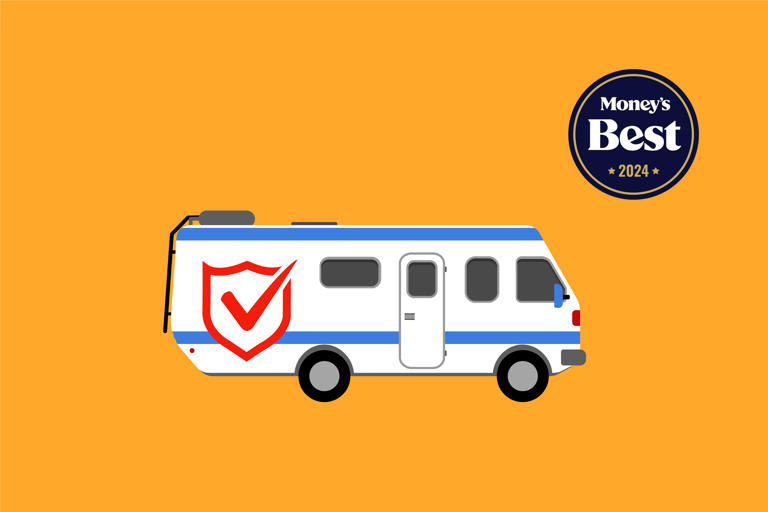
Posted 2024-06-26 06:51
Contact Information:
♥ 2018 Vibe 268RKS 34.5’ Travel Trailer w/Slide-out Room! - $19,999 (NelsonRV.com - 4060 N Flowing Wells Rd)

google map
more ads by this user
QR Code Link to This Post
post id: 7760537056
posted: 2024-06-26 06:51
updated: 2024-06-26 11:30
♥ best of [ ? ]
refresh the page.
♥ 2018 Vibe 268RKS 34.5’ Travel Trailer w/Slide-out Room! - rvs - by...
2018 Vibe 268RKS Travel Trailer Skylight, Black Tank Flush, Alloy Wheels, Spare Tire w/ Carrier, Outside Shower, Battery Disconnect, Fantastic Fan, Power Tongue Jack, E-Z Lube Axles, Self-Adjusting...

COMMENTS
A travel trailer is an RV that hitches to the bed of your truck and follows behind you. There are tiny RVs called teardrop trailers and those hold maybe one person to sleep in them. Is a travel trailer considered an RV? A travel trailer is considered a Recreational Vehicle. There are other kinds of RVs like a motorhome.
When it comes to travel trailer ratings, the best brands in 2024 are Airstream, Jayco, Forest River, Grand Design, and Oliver Travel Trailers. These brands have consistently delivered high-quality, reliable, and innovative travel trailers that cater to a wide range of needs and preferences. Whether you're a solo traveler, a couple seeking ...
Traveling by RV is a resurging trend amid the coronavirus pandemic, with families seeking an escape while maintaining social distancing. A motorhome or travel trailer allows you to see the country ...
Fuel Efficiency - Low mileage for motorhomes. But trailers reduce capacity and gas mileage for your tow rig. Fuel costs depend on the total miles driven. Insurance - Motorhomes cost more to insure than trailers. Yet, you need policies for both trailer and tow vehicles, so determine total insurance costs.
There is a reason why travel trailers are the most popular RV option. With a wide range of sizes from ultra-lite to half ton and floorplan options to fit many family sizes, you will find a Jayco Travel Trailer to accommodate all your travel needs. With Jayco's commitment to quality and craftsmanship, you can trust that our camping trailers will ...
Here's a unique addition to our list of the best lightweight travel trailers of 2022: the ultralight, 15-foot, all fiberglass Trillium Heritage Bunk 4500 camper from L'air Camper Company in Ontario, Canada. The L'air Trillium Heritage is an ultra-lightweight travel trailer that can be easily towed by many smaller SUVs and crossovers.
The best travel trailer brands offer the highest value for the price point with above-average durability, thoughtful design, and overall quality. 3. Customer-First Service. The best travel trailers in the world can't make up for a poor customer service experience. When investing in a travel trailer, you're not just buying an RV.
These are the 10 best travel trailers. 1. Airstream Classic. The Airstream Classic comes in two sizes: 30 feet and 33 feet. Both have similar floor plans with either twin beds or a queen bed in a separate bedroom. Enjoy the classic round tube-style travel trailer with all of the newest amenities, including a luxurious bathroom, a kitchen with ...
6. KZ Durango Half-Ton. Courtesy of KZ-RV. The KZ Durango Half-Ton RV is a fifth wheel trailer that offers eight unique floor plans, complete with a washer and dryer, maple-glazed farmhouse-style ...
Weight: 7000 to 8000 lbs. Our Review. The Jayco eagle travel trailer is best known for its competitive design that makes it one of the most long-lasting trailers in the market. The bunkhouse trailer has incredible features, which include glazed wooden interiors that ensure elegance and luxurious touch.
Defining a Travel Trailer. A travel trailer, also known as a caravan or an RV (Recreational Vehicle), is a portable living space that offers the comforts of home while on the road.It is a towable unit designed to be hitched to a compatible vehicle, such as a pickup truck or SUV, and can be detached at the destination for independent exploration and camping.
1. Airstream Flying Cloud - Travel Trailers. Best for: a luxury travel trailer for couples to families that will last for decades and has the best resale value. Overall Length: 23' to 30' (depending on model) GVWR: 6000 to 8800 lbs. MSRP: $94,400 to $124,500.
RV shopping 101: A simple, yet complete guide for first-time RV, camper, and travel trailer buyers Shopping RVs and travel trailers isn't easy.
Travel trailers are versatile campers and they come in a wide range of sizes, weights, and formats. Because of all these options, almost every kind of car can tow at least one type of travel trailer. This has made them popular choices in the RV community. The different types of travel trailers are: Classic Travel Trailers; Toy Haulers; Teardrop ...
Wildwood FSX. Wildwood Heritage Glen Travel Trailers. Wildwood X-Lite. Work and Play. XLR Boost. XLR Hyperlite. Find the Forest River Travel Trailer that is right for you. Choose from a set of desired features to get matching brands and floorplans.
Travel Trailer: On the other hand, a travel trailer is a larger type of RV designed to be towed behind a vehicle, such as a truck or SUV. These trailers offer a spacious living area, a kitchenette, bathroom facilities, and sleeping quarters. Available in various sizes and layouts, travel trailers provide flexibility, allowing you to detach the ...
Stock # 235152. 2023 Lance Travel Trailers 7000 Pounds Tow Rating 1985, <p>Optional Equipment Installed On This Unit: Convertible Sofa, Antenna Extender, Shock. Broadmoor RV SuperStore. Pasco, WA. $39,999.
A travel trailer is a towable RV. Travel trailers attach to a tow vehicle with a ball hitch. Travel trailers can measure anywhere from 10-40 feet in length. They weigh between 1,000 and 12,000 pounds, depending on the size. Travel trailers come in a wide range of shapes, sizes, and designs Different models offer different amenities and features.
TRAVEL TRAILERS For Sale. Camping World has more than 15,000 towable RVs available, including new and used Travel Trailers. These RVs have many floor plans available and range from small lightweight units under 20 feet weighing less than 2,500 pounds to large travel trailers of more than 40 feet. At Camping World, we want you to enjoy RV living with your significant other in a couples-only ...
Coleman, Dutchmen, East to West, Find Your RV, Forest River, Heartland, Small Camper, Starcraft, Travel Trailer. As the most popular type of RV, travel trailers offer an easy, accessible way to hit the road and chase outdoor experiences. The best travel trailers provide plenty of space, convenient amenities, and an all-important bathroom.
A travel trailer is the most popular RV type on the market and can work for virtually any budget. With over 200 floorplans ranging from 21 ft to 41 ft in length, Keystone RV Company has the perfect travel trailer floorplan for every camper.
The cost of your camper will vary depending on the size, layout, and features you select. Camping World offers a large variety of new and used travel trailers for sale, with options starting around $6,500 up to $50,000+ with customizable features and amenities. Because Camping World is the largest RV dealer in the US, we can leverage our ...
We can help with that too ― browse over 200,000 new and used RVs for sale nationwide from all of your favorite RV makes or types like Travel Trailer, Pop Up Camper, Fifth Wheel, Toy Hauler, Truck Camper, Class A, Class B, Class C, Fish House, Park Model or locate a specific RV Brand like Newmar RVs.
FEMA trailers sitting near the Punta Gorda Airport are raising concerns, according to a report by WINK, a CBS television affiliate based in Fort Myers covering Southwest Florida. The Charlotte County Airport Authority is getting hit with code violations, saying the trailers need to go. FEMA now has less than ten days left to remove these
We offer the best selection of Midwest Adventure Builds Travel Trailer RVs to choose from. Available Colors. Looking to buy a 2024 Midwest Adventure Builds Big Buggy rv? Browse our extensive inventory of new and used 2024 Midwest Adventure Builds Big Buggy rvs from local Midwest Adventure Builds dealers and private sellers. Compare prices ...
The lower ride height will definitely beat tugging the Capax forward at full 9.3-ft (2.8-m) camping height, but the biggest advantage of the drop-low design is being able to roll the trailer ...
According to Progressive, an RV insurance policy for a travel trailer (an RV you tow behind your vehicle) costs an average of $573 annually. In contrast, coverage for a motorhome costs an average ...
2018 Vibe 268RKS Travel Trailer Skylight, Black Tank Flush, Alloy Wheels, Spare Tire w/ Carrier, Outside Shower, Battery Disconnect, ... See this 2018 Vibe 268RKS Travel Trailer at NelsonRV.com - Nelson RV at 4060 N Flowing Wells Rd Tucson, AZ 85705 Call our office Tuesday-Friday 8:30 AM-4:30 PM & Saturday 9 AM - 2 PM at (520) 293-1010 or ...